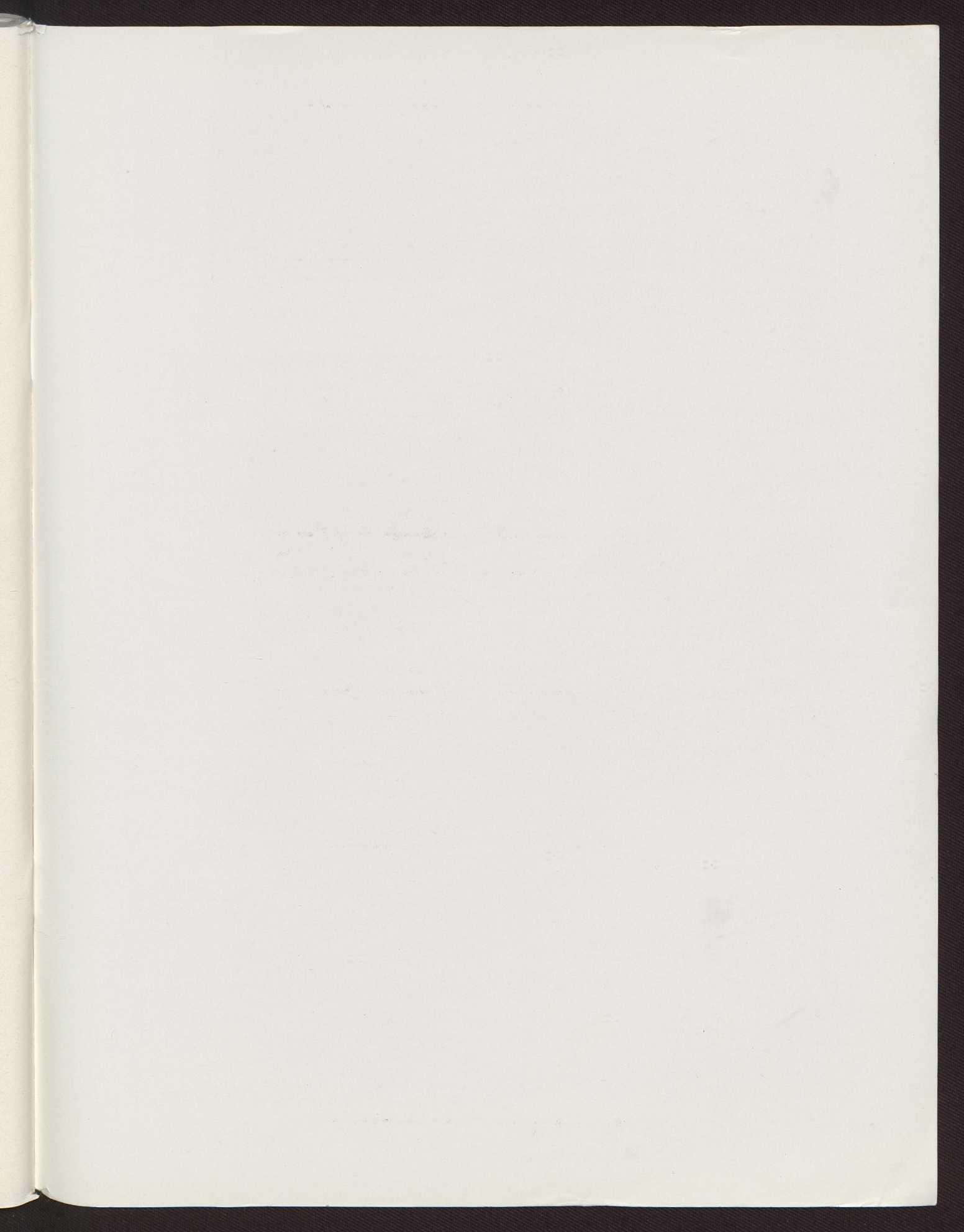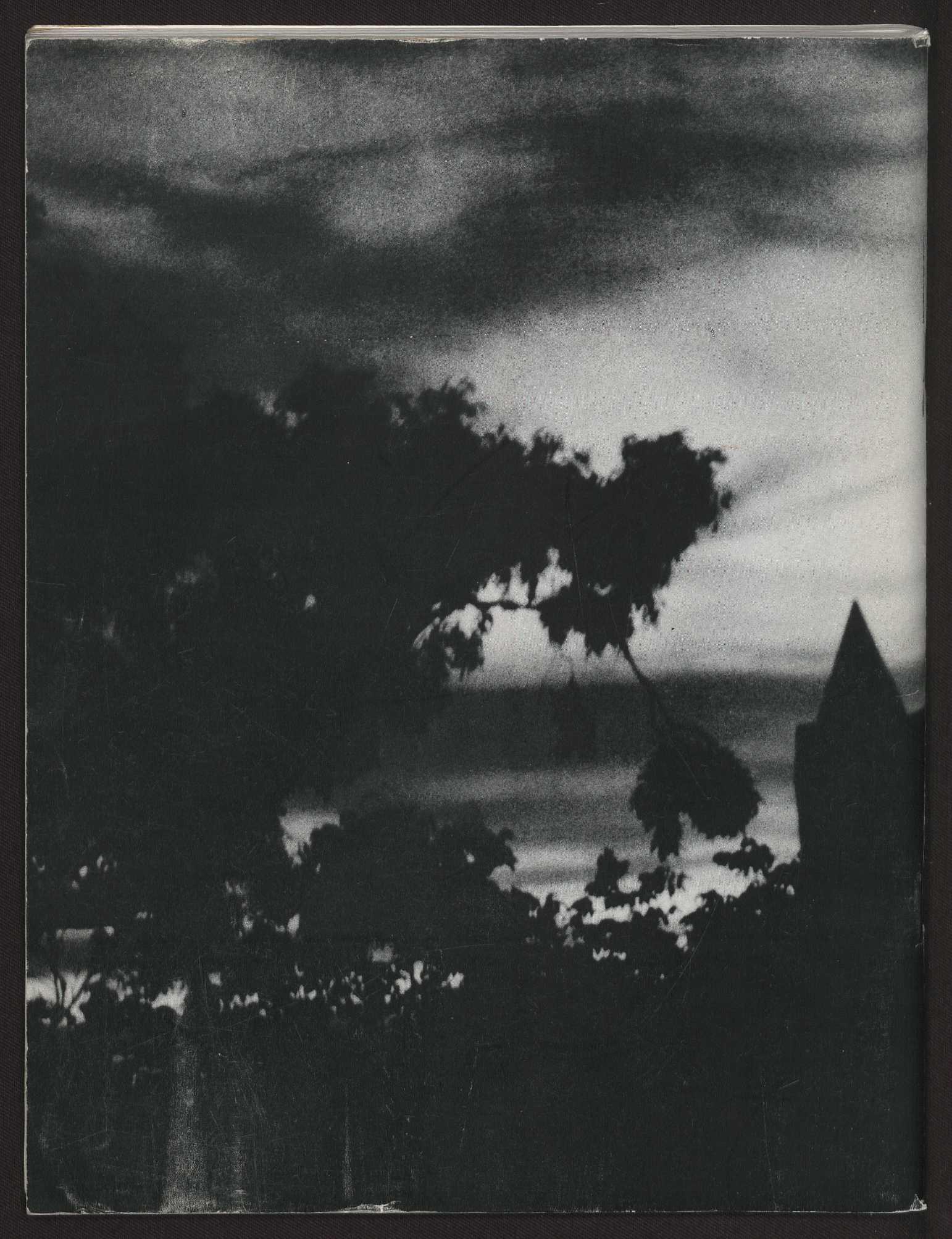




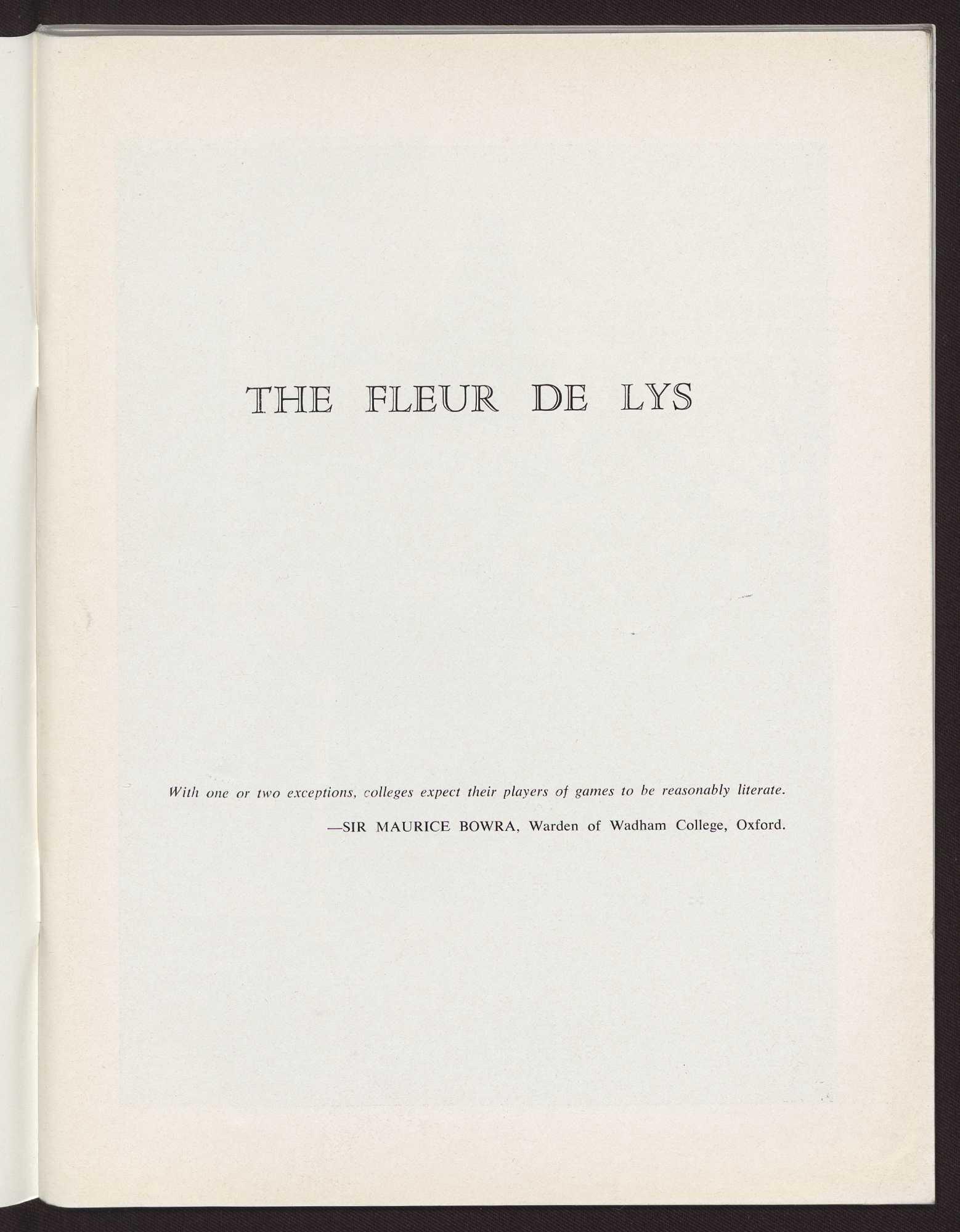
With one or two exceptions, colleges expect their players of games to be reasonably literate.
MAURICE BOWRA, Warden of Wadham College, Oxford.

On 8th November, 1965, Alan William Gunther, B.Com.(Melb.), B.A.(Cantab.), became Bursar of the College, a position long vacant.
The Bursar is 29. He was educated at Wangaratta High School and the University of Melbourne, where he graduated in Commerce. In 1963 he went to Pembroke College, Cambridge, where he read Economics, and he returned to Australia shortly before appointment as Bursar of Trinity. Apart from this office, Mr. Gunther is also Assistant Lecturer in Microeconomics in the University of Melbourne.
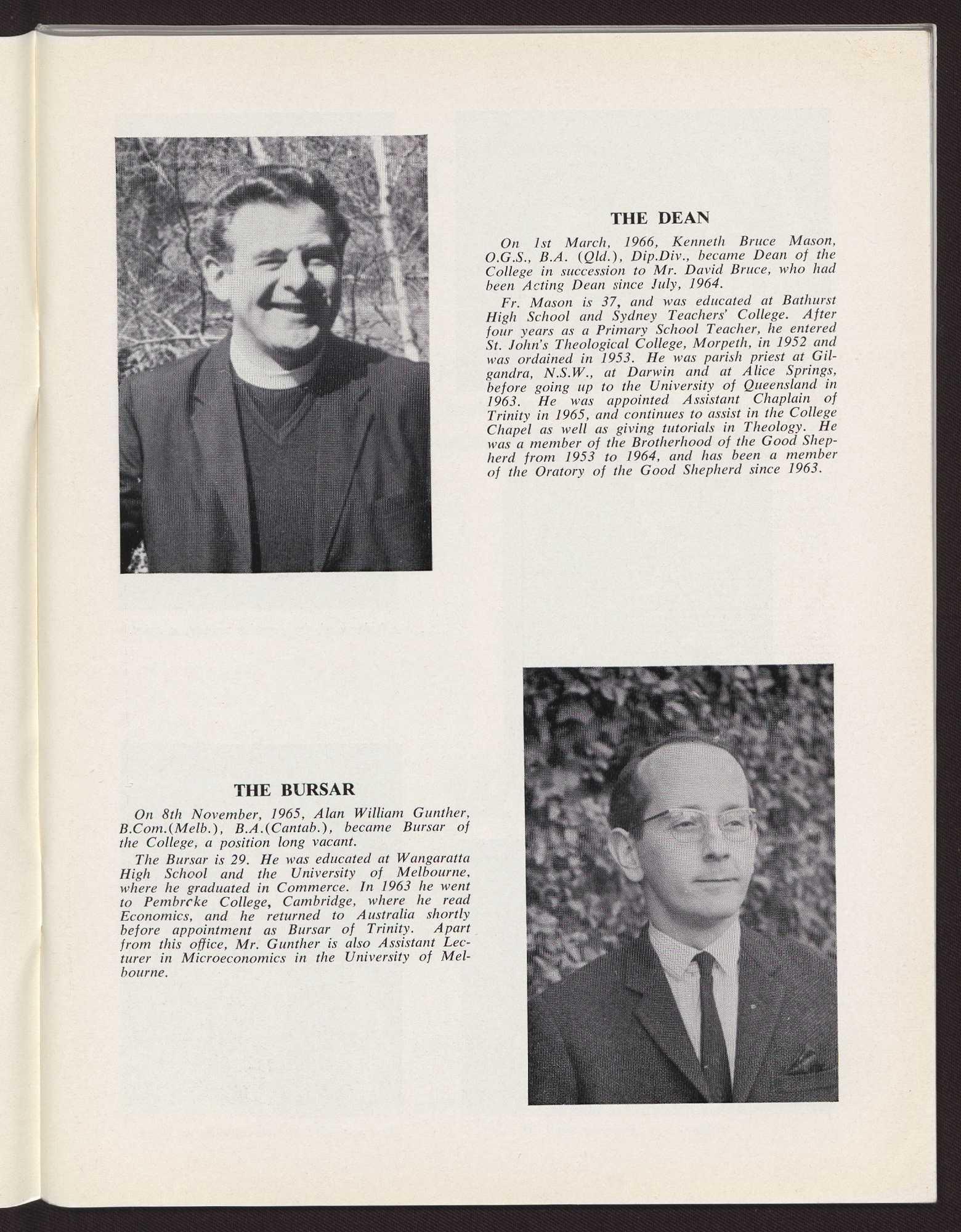
On 1st March, 1966, Kenneth Bruce Mason, O.G.S., B.A. (Qld.), Dip.Div., became Dean of the College in succession to Mr. David Bruce, who had been Acting Dean since July, 1964.
Fr. Mason is 37, and was educated at Bathurst High School and Sydney Teachers' College. After four years as a Primary School Teacher, he entered St. John's Theological College, Morpeth, in 1952 and was ordained in 1953. He was parish priest at Gilgandra, N.S.W., at Darwin and at Alice Springs, before going up to the University of Queensland in 1963. He was appointed Assistant Chaplain of Trinity in 1965, and continues to assist in the College Chapel as well as giving tutorials in Theology. He was a member of the Brotherhood of the Good Shepherd from 1953 to 1964, and has been a member of the Oratory of the Good Shepherd since 1963.
Two minutes to go, sir. I thought you'd like to know.
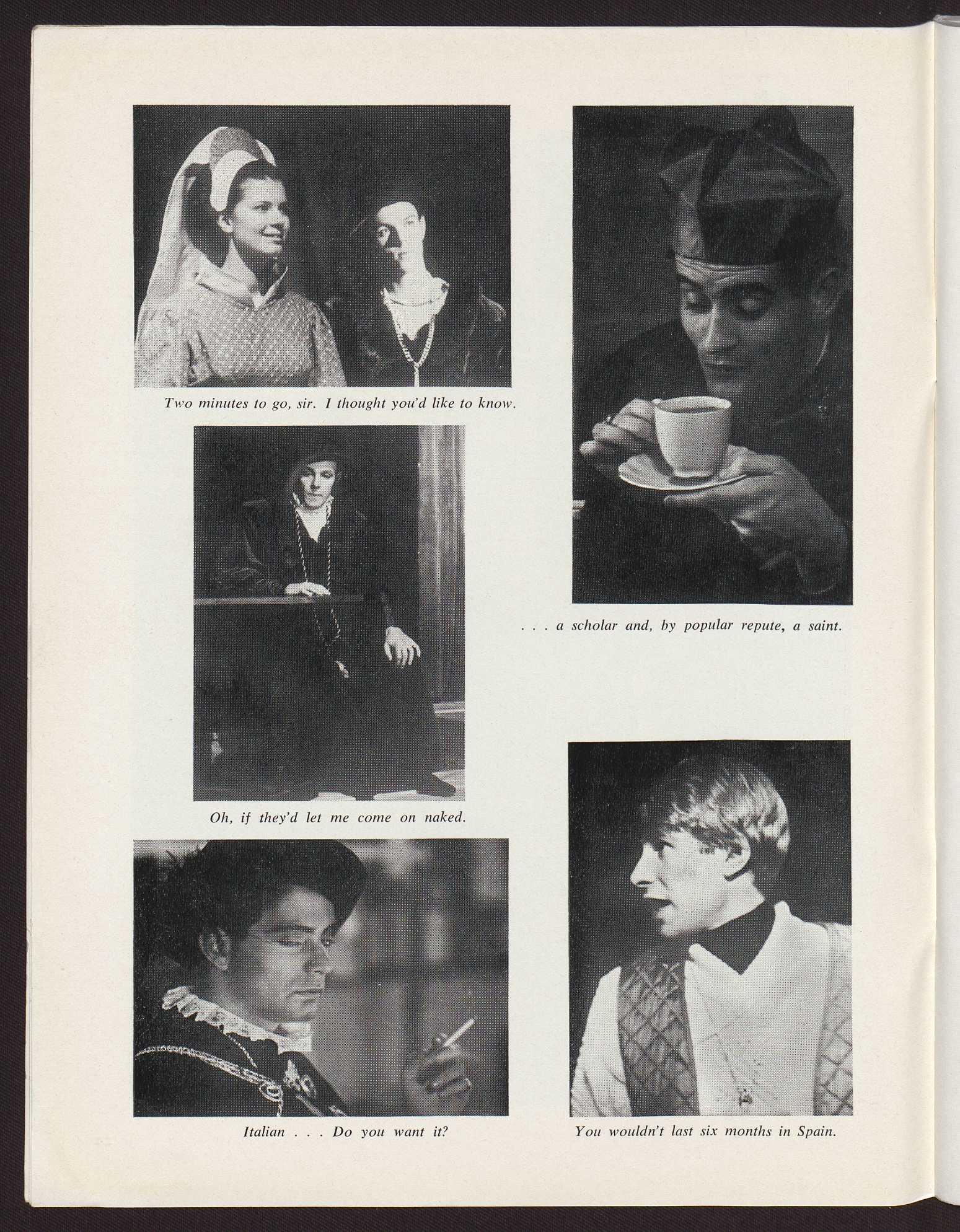
Oh, if they'd let na;
.. . a scholar and, by popular repute, a saint.
m Italian . . Do you want it? You wouldn't last six months in Spain.

November, 1966
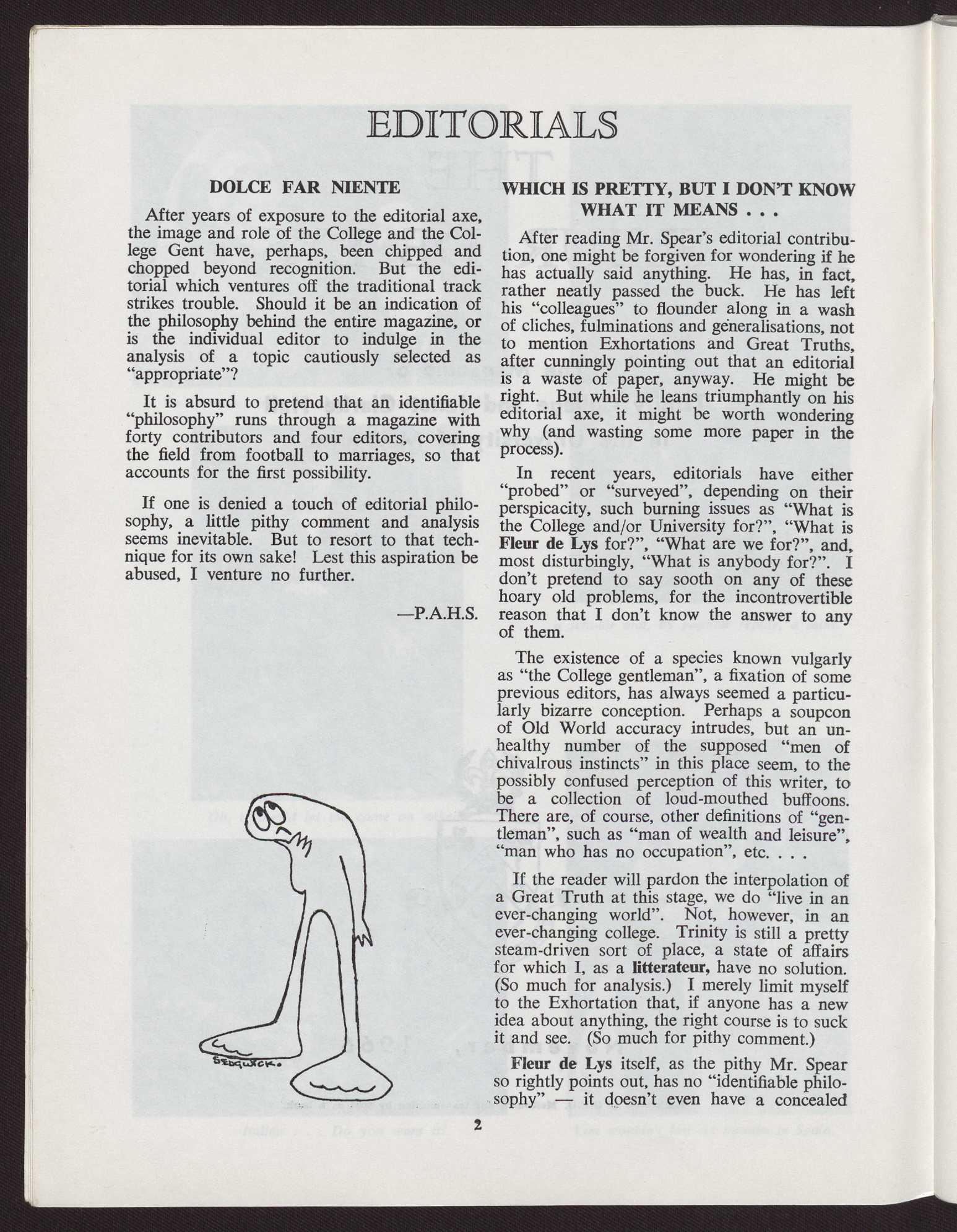
After years of exposure to the editorial axe, the image and role of the College and the College Gent have, perhaps, been chipped and chopped beyond recognition. But the editorial which ventures off the traditional track strikes trouble. Should it be an indication of the philosophy behind the entire magazine, or is the individual editor to indulge in the analysis of a topic cautiously selected as "appropriate"?
It is absurd to pretend that an identifiable "philosophy" runs through a magazine with forty contributors and four editors, covering the field from football to marriages, so that accounts for the first possibility.
If one is denied a touch of editorial philosophy, a little pithy comment and analysis seems inevitable. But to resort to that technique for its own sake! Lest this aspiration be abused, I venture no further.
—P.A.H.S.
After reading Mr. Spear's editorial contribution, one might be forgiven for wondering if he has actually said anything. He has, in fact, rather neatly passed the buck. He has left his "colleagues" to flounder along in a wash of cliches, fulminations and generalisations, not to mention Exhortations and Great Truths, after cunningly pointing out that an editorial is a waste of paper, anyway. He might be right. But while he leans triumphantly on his editorial axe, it might be worth wondering why (and wasting some more paper in the process).
In recent years, editorials have either "probed" or "surveyed", depending on their perspicacity, such burning issues as "What is the College and/or University for?", "What is Fleur de Lys for?", "What are we for?", and, most disturbingly, "What is anybody for?". I don't pretend to say sooth on any of these hoary old problems, for the incontrovertible reason that I don't know the answer to any of them.
The existence of a species known vulgarly as "the College gentleman", a fixation of some previous editors, has always seemed a particularly bizarre conception. Perhaps a soupcon of Old World accuracy intrudes, but an unhealthy number of the supposed "men of chivalrous instincts" in this place seem, to the possibly confused perception of this writer, to be a collection of loud-mouthed buffoons. There are, of course, other definitions of "gentleman", such as "man of wealth and leisure", "man who has no occupation", etc... .
If the reader will pardon the interpolation of a Great Truth at this stage, we do "live in an ever-changing world". Not, however, in an ever-changing college. Trinity is still a pretty steam-driven sort of place, a state of affairs for which I, as a litterateur, have no solution. (So much for analysis.) I merely limit myself to the Exhortation that, if anyone has a new idea about anything, the right course is to suck it and see. (So much for pithy comment.)
Fleur de Lys itself, as the pithy Mr. Spear so rightly points out, has no "identifiable philosophy" — it doesn't even have a concealed
one, Freudians please note. What it is, of course, is a collection of unwilling reports of everything of interest (and some things which aren't) which happened in Trinity and The Hall before the closing date for copy. As editors, we, the undersigned, are responsible for the printed word, but not for the activities necessitating description. Only that mythological beast, "The College", can be that responsible, or irresponsible, as the case may be. So, with the final Exhortation to the reader to don his rose-tinted lorgnette, my message to anyone who has read this far is "read on".
—M.D.
—Alice More.
The best way to indicate College life would probably be to describe in detail some College activity, like a College Dinner or a CRD. But the bounds of both propriety and tradition prevent me from doing this, according to Mr. Spear, who states that "the editorial which ventures off the traditional track strikes trouble". This seems to me to be impossible; for, by editing this magazine, the Editors have shown themselves to be committed to tradition, and any attempt to write a strange editorial for Fleur de Lys must be merely trying to widen its College world-view, and not aiming to destroy it. Tradition seems to lie at the basis of Trinity life, both in the highspots like Juttoddie and as a general graph against which to write one's sporting or spiritual activities. The question whether Trinity has any right to exist in a restless and much-moderner-thanJeopardy Australia is, although interesting, an irrelevant one; for in Trinity its irrefutable tradition is both a scapegoat and a deity — and how can a society exist without both of these?
The problems facing JCH are traditional ones, but not in the sense of "usual" questions, for since the Great Divorce JCH has found itself in the unenviable position of a middleaged woman suddenly estranged from a dominating husband and embarrassingly faced with the sight of younger single women settling
down happily and enthusiastically. JCH's present "tradition" largely derives from its past association with Trinity, but the noticeable decline in the number of Trinity men at the CRD may be an indication that not all the ladies of the Hall desire a continuation of the Entente tres Cordiale. The majority may; and, if so, pro-Trinity freshers and Committees in the next ten years may fill in the gaps around the connections which this magazine indicates. But, whatever happens, it is certain that JCH will never consent to a revival of the old state of adolescent dependence.
I am an Editor of Fleur de Lys on the grounds of my belief in the benefits of cooperation and mutual respect of these two Colleges; but as a student at the Hall I must realise that the day may conceivably come when Janet Clarke Hall stops looking on Trinity as a Big Brother whom we hope is watching us, and evolves an identity of its own which permits only a view of Trinity as a hang-out for blokes who may, or may not, be interesting to know.
—C.W.F.
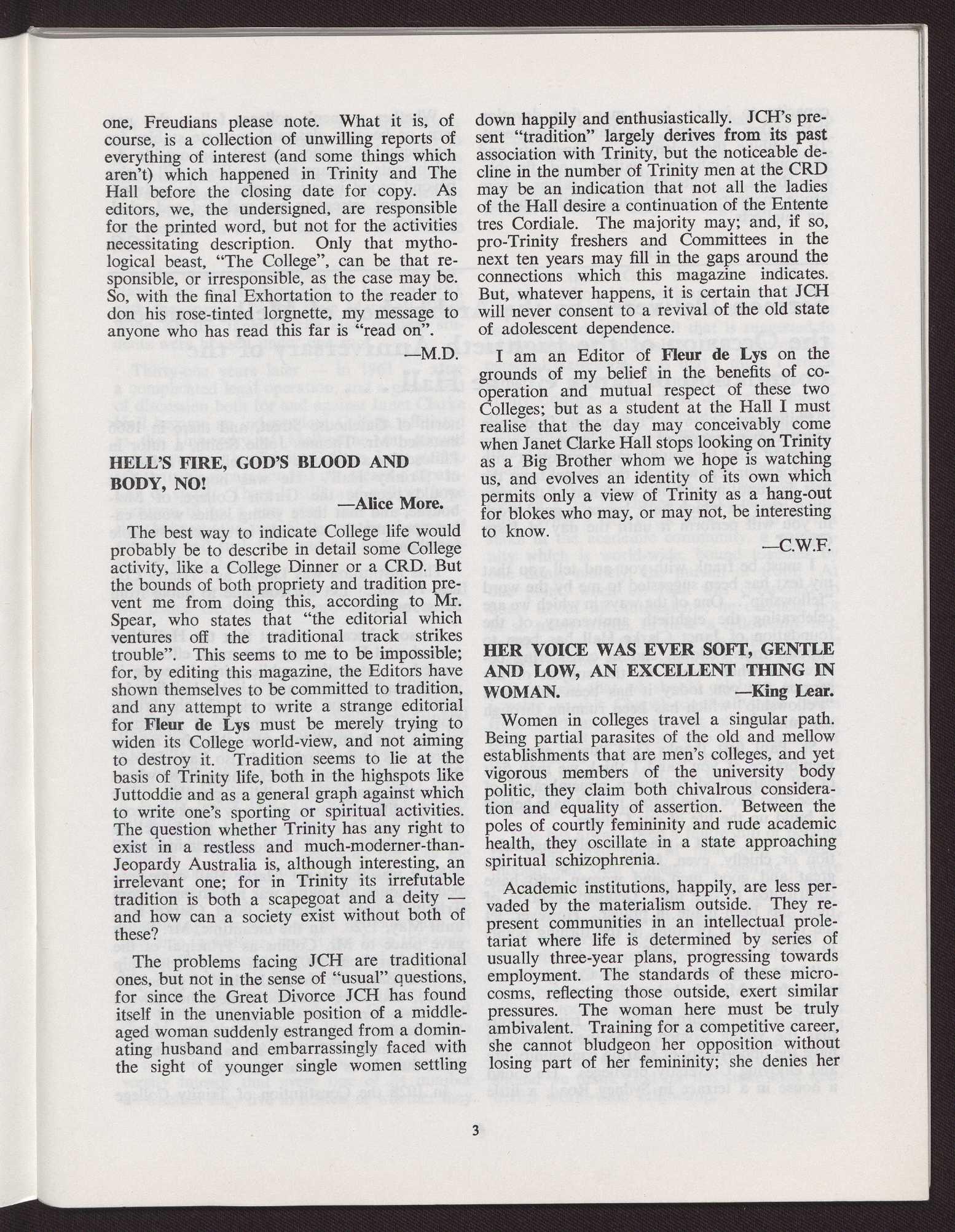
—King Lear.
HER VOICE WAS EVER SOFT, GENTLE AND LOW, AN EXCELLENT THING IN WOMAN.
Women in colleges travel a singular path. Being partial parasites of the old and mellow establishments that are men's colleges, and yet vigorous members of the university body politic, they claim both chivalrous consideration and equality of assertion. Between the poles of courtly femininity and rude academic health, they oscillate in a state approaching spiritual schizophrenia.
Academic institutions, happily, are less pervaded by the materialism outside. They represent communities in an intellectual proletariat where life is determined by series of usually three-year plans, progressing towards employment. The standards of these microcosms, reflecting those outside, exert similar pressures. The woman here must be truly ambivalent. Training for a competitive career, she cannot bludgeon her opposition without losing part of her femininity; she denies her
capacity to inspire in a man that devotion that makes his work a gallant achievement. To combine these demands a generosity and graciousness, infinitely patient and flexible. One thinks of eighteenth-century salons, where gentle manners blended subtly with penetrating intellects.
Whether women's colleges follow this pattern, or become glass-and-concrete stables for intellectual pedigrees, depends on outside developments. Perhaps men's colleges will evolve beyond proud isolation; certainly the universities cannot retreat to any secluded and scholarly niche.
—J.C.G.
Philippians 1: 3-6 — "I thank my God upon every remembrance of you, always in every prayer of mine for you all, making request with joy, for your fellowship in the Gospel from the first day until now; being confident of this very thing, that he which hath begun a good work in you will perform it until the day of Jesus Christ."
I must be frank with you and tell you that my text has been suggested to me by the word "fellowship". One of the ways in which we are celebrating the eightieth anniversary of the foundation of Janet Clarke Hall has been to appoint four Fellows, and in considering beforehand what should be the subject of my sermon for you today it has been this word "Fellowship" which has been running through my mind.
St. Paul first thanks God "upon every remembrance of you" and I think we may first of all thank God for every remembrance of those who have gone before us and have helped to build up the life of our College.
A sermon is not a place for self-congratulation or chiefly, even, for a catalogue of the great and good men and women who have contributed to our life. Detailed mention of them has been made in prayer. However, let me remind you of some of the turning points in the life of our College:
About the foundation of the College let me quote from Miss Joske's short history:
"Dr. Leeper returned from his trip, anxious that the young women in Melbourne should have the opportunity of sharing community life and enjoying University privileges. He found a house in a terrace in Sydney Road, a little
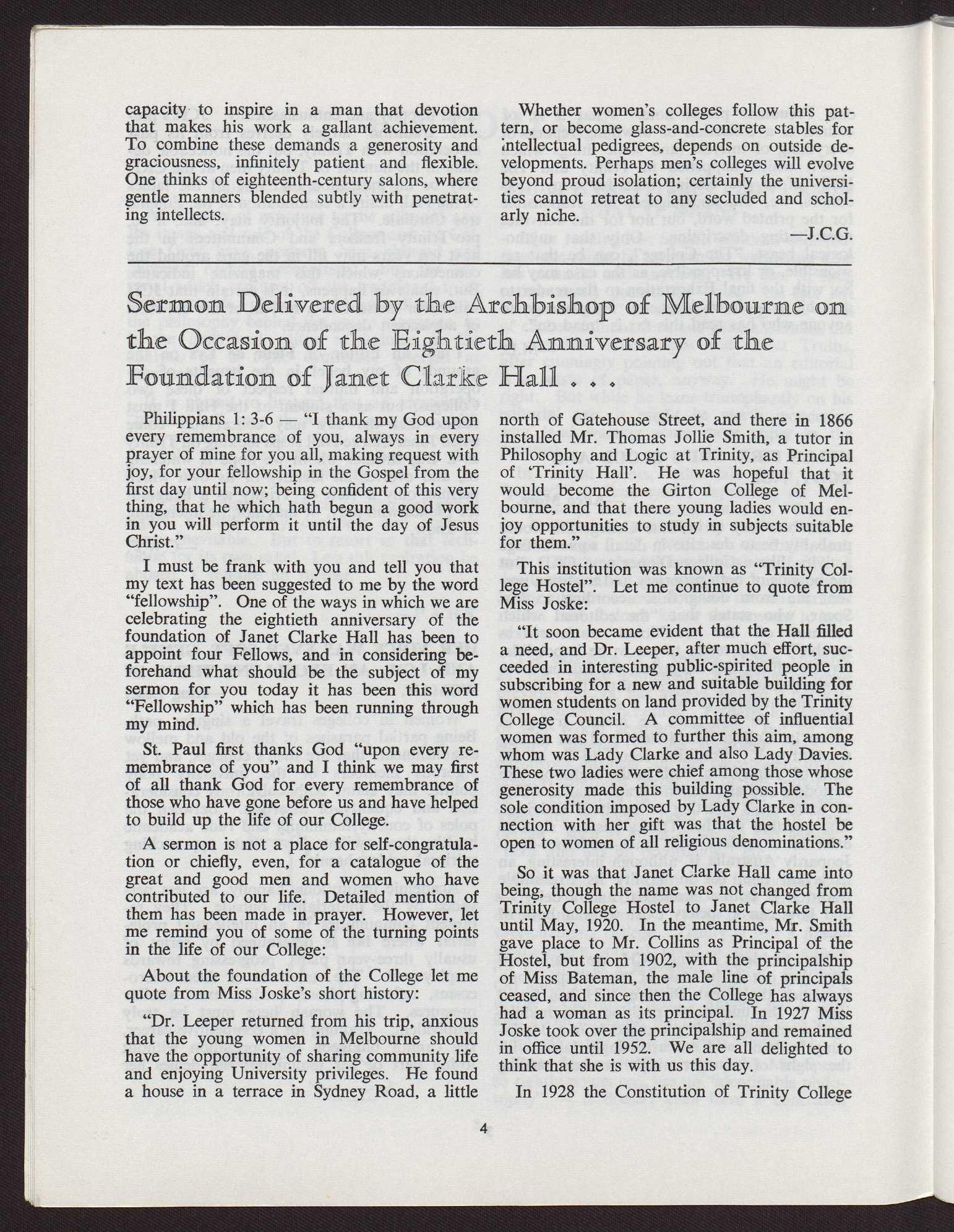
north of Gatehouse Street, and there in 1866 installed Mr. Thomas Jollie Smith, a tutor in Philosophy and Logic at Trinity, as Principal of `Trinity Hall'. He was hopeful that it would become the Girton College of Melbourne, and that there young ladies would enjoy opportunities to study in subjects suitable for them."
This institution was known as "Trinity College Hostel". Let me continue to quote from Miss Joske:
"It soon became evident that the Hall filled a need, and Dr. Leeper, after much effort, succeeded in interesting public-spirited people in subscribing for a new and suitable building for women students on land provided by the Trinity College Council. A committee of influential women was formed to further this aim, among whom was Lady Clarke and also Lady Davies. These two ladies were chief among those whose generosity made this building possible. The sole condition imposed by Lady Clarke in connection with her gift was that the hostel be open to women of all religious denominations."
So it was that Janet Clarke Hall came into being, though the name was not changed from Trinity College Hostel to Janet Clarke Hall until May, 1920. In the meantime, Mr. Smith gave place to Mr. Collins as Principal of the Hostel, but from 1902, with the principalship of Miss Bateman, the male line of principals ceased, and since then the College has always had a woman as its principal. In 1927 Miss Joske took over the principalship and remained in office until 1952. We are all delighted to think that she is with us this day.
In 1928 the Constitution of Trinity College
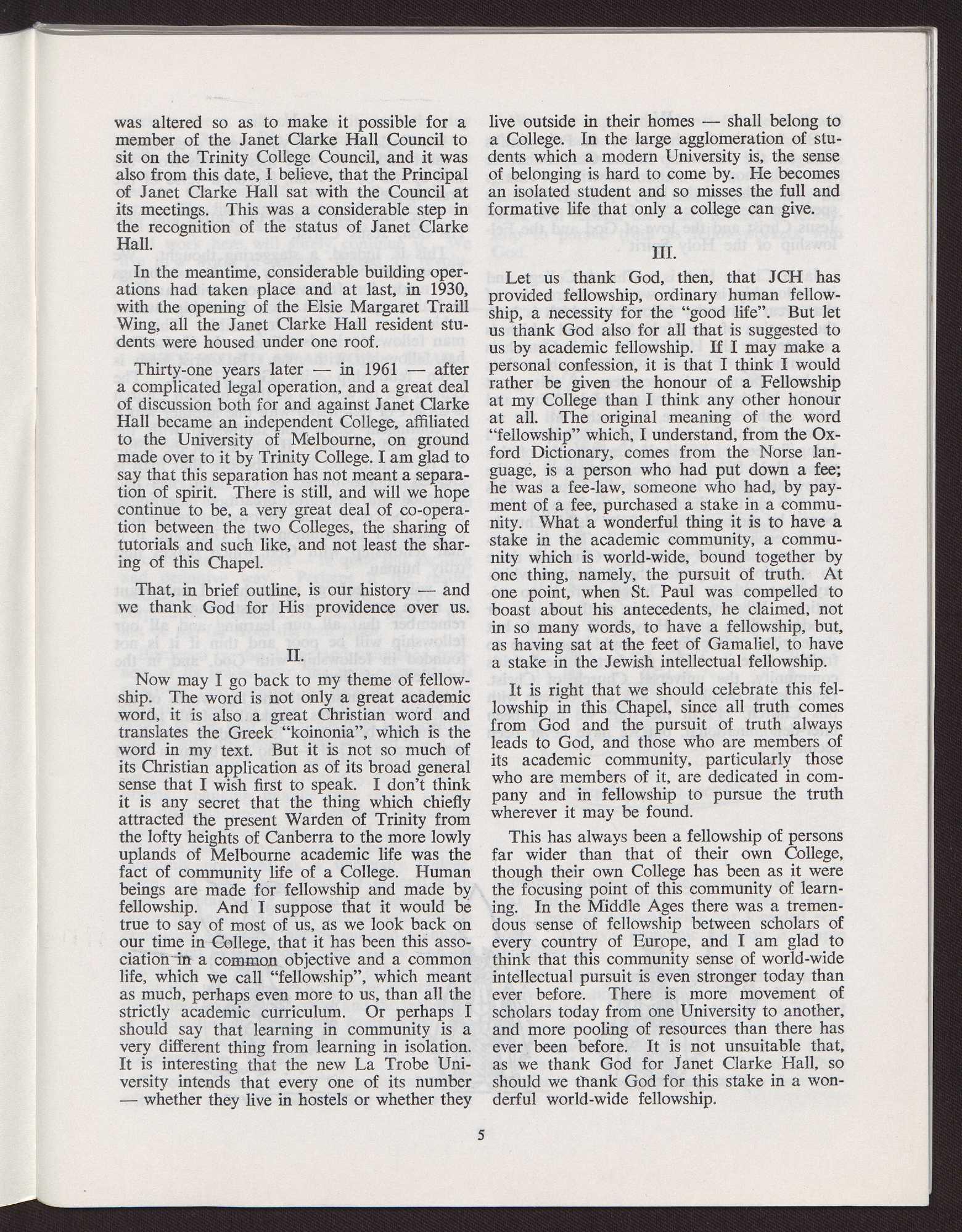
was altered so as to make it possible for a member of the Janet Clarke Hall Council to sit on the Trinity College Council, and it was also from this date, I believe, that the Principal of Janet Clarke Hall sat with the Council at its meetings. This was a considerable step in the recognition of the status of Janet Clarke Hall.
In the meantime, considerable building operations had taken place and at last, in 1930, with the opening of the Elsie Margaret Traill Wing, all the Janet Clarke Hall resident students were housed under one roof.
Thirty-one years later — in 1961 — after a complicated legal operation, and a great deal of discussion both for and against Janet Clarke Hall became an independent College, affiliated to the University of Melbourne, on ground made over to it by Trinity College. I am glad to say that this separation has not meant a separation of spirit. There is still, and will we hope continue to be, a very great deal of co-operation between the two Colleges, the sharing of tutorials and such like, and not least the sharing of this Chapel.
That, in brief outline, is our history — and we thank God for His providence over us.
Now may I go back to my theme of fellowship. The word is not only a great academic word, it is also a great Christian word and translates the Greek "koinonia", which is the word in my text. But it is not so much of its Christian application as of its broad general sense that I wish first to speak. I don't think it is any secret that the thing which chiefly attracted the present Warden of Trinity from the lofty heights of Canberra to the more lowly uplands of Melbourne academic life was the fact of community life of a College. Human beings are made for fellowship and made by fellowship. And I suppose that it would be true to say of most of us, as we look back on our time in College, that it has been this association-°in a common objective and a common life, which we call "fellowship", which meant as much, perhaps even more to us, than all the strictly academic curriculum. Or perhaps I should say that learning in community is a very different thing from learning in isolation. It is interesting that the new La Trobe University intends that every one of its number — whether they live in hostels or whether they
live outside in their homes — shall belong to a College. In the large agglomeration of students which a modern University is, the sense of belonging is hard to come by. He becomes an isolated student and so misses the full and formative life that only a college can give.
Let us thank God, then, that JCH has provided fellowship, ordinary human fellowship, a necessity for the "good life". But let us thank God also for all that is suggested to us by academic fellowship. If I may make a personal confession, it is that I think I would rather be given the honour of a Fellowship at my College than I think any other honour at all. The original meaning of the word "fellowship" which, I understand, from the Oxford Dictionary, comes from the Norse language, is a person who had put down a fee; he was a fee-law, someone who had, by payment of a fee, purchased a stake in a community. What a wonderful thing it is to have a stake in the academic community, a community which is world-wide, bound together by one thing, namely, the pursuit of truth. At one point, when St. Paul was compelled to boast about his antecedents, he claimed, not in so many words, to have a fellowship, but, as having sat at the feet of Gamaliel, to have a stake in the Jewish intellectual fellowship.
It is right that we should celebrate this fellowship in this Chapel, since all truth comes from God and the pursuit of truth always leads to God, and those who are members of its academic community, particularly those who are members of it, are dedicated in company and in fellowship to pursue the truth wherever it may be found.
This has always been a fellowship of persons far wider than that of their own College, though their own College has been as it were the focusing point of this community of learning. In the Middle Ages there was a tremendous sense of fellowship between scholars of every country of Europe, and I am glad to think that this community sense of world-wide intellectual pursuit is even stronger today than ever before. There is more movement of scholars today from one University to another, and more pooling of resources than there has ever been before. It is not unsuitable that, as we thank God for Janet Clarke Hall, so should we thank God for this stake in a wonderful world-wide fellowship.
But, let us widen the circle. St. Paul thanks God for the fellowship in the Gospel that he has with those to whom he writes. This is the Fellowship of the Holy Spirit of which we speak in the Grace: "the Grace of Our Lord Jesus Christ and the love of God and the Fellowship of the Holy Spirit".
Janet Clarke Hall is a Church College and its fellowship is, as it were, a microcosm of that great university fellowship, which is both the creation of the Holy Spirit and which is cemented by the Holy Spirit. This Church is a community of persons who know themselves to have been made members of this great family by the action of the Holy Spirit and who, at the same time, know that all the resources of intellect and emotion of brain and being, indeed of life itself, are the gifts of this same Holy Spirit and are gifts given in the fellowship of the Holy Catholic Church. This is not to say that the action of the Holy Spirit is bound by the boundaries of the visible Church: "extra ecclesiam mula salus." This is sometimes translated — outside the Church is there no salvation? I prefer the translation which says that without the Church there is no salvation. Wherever there is truth, beauty or goodness, there is the Holy Spirit at work, but these gifts of the Spirit would not come to fruition were it not for the fact of the Spirit's community, the universal Church of Christ. Don't let us despise our link as a college with this Church. From the start we have been inter-denominational, but we have never been secular.

V.
But I ask you to lift your sights even higher. I must add to my text these words from the first epistle of St. John, the third verse of the first chapter:
"Our fellowship is with the Father and with His Son, Jesus Christ."
This is, indeed, a staggering thought. We can understand very easily that human beings are made for fellowship one with another, and that apart from such fellowship human achievement would be impossible. This human fellowship is also divine. In Christ God has fellowship with man. In Christ man is given fellowship with God Himself The central act of worship of the Christian Church is an act of fellowship with one another which is contingent upon our fellowship with the Father and His Son. If you accept the Biblical revelation, and if you believe that man is created in the image of God and has had breathed into Him the breath, or the Spirit, of life, the consequence follows naturally: man is made for communion with God, and it is that fellowship with God which makes him truly human.
I will not enlarge upon this. I only want us to be sure that we put first things first and remember that all our learning and all our fellowship will be poor and thin if it is not founded in fellowship with God, and in the knowledge of God.
So let me finish with the last words of my text: St. Paul writes thankfully of his friends at Philippi because he is confident that he— that is to say, God — who has begun a good
work in them, will continue it until the day of Jesus Christ. We look forward to many, many years of service by this College to its members and by the members to their College and to the University and to the world at large. The first eighty years of a College are but a beginning, and God Who has begun a good work here will surely continue it. We live in a world of change, indeed, of revolution.
Some people think that committees are just some fabulous animal, shapeless, effortless and brainless, which enjoys being the centre of attention and speculation.
Others tend to look on committees as a purposeful and well-intentioned experiment in collective action.
Actually, we do not look upon ourselves — as committee members — in quite this exciting and definitive way. Perhaps if the reader would care to think of a board of directors, corporative, pressured, permanent, then he will not be too far from the half truth.
Burdened by the shame and unfinished business of its predecessor, the new committee is relatively uncommitted to any policy at the start of its year in office. It is only during the course of the year that it assumes any identification with the issues that concern the College. Committee work should ideally involve detaching controversy from day to day complaints, changing muddle into order, apathy and disenchantment into sensible recommendation, and establishing general principles— for in an institution so loosely principled and so randomly organised as a university college, there is a very great need for general principles. Establishing general principles really means planning, and at Trinity planning means organising a mass of undifferentiated opinions, values and humbug into some viable and intellectually honest argument or policy. It has to be this way because to achieve reform students need bargaining power, and the technique of persuasion does not come from flabby conceit or emotion, but from persistence and recommendation.
Of course, change can be pretty abrupt— witness if you will the amazing fee rise. It
We must expect that Janet Clarke Hall will change in some respects and we must have the faith to believe that He Who has begun a good work will continue it in change and through change — but that fundamentally the work will remain the same, namely in fellowship to pursue truth as fellow-workers with God.
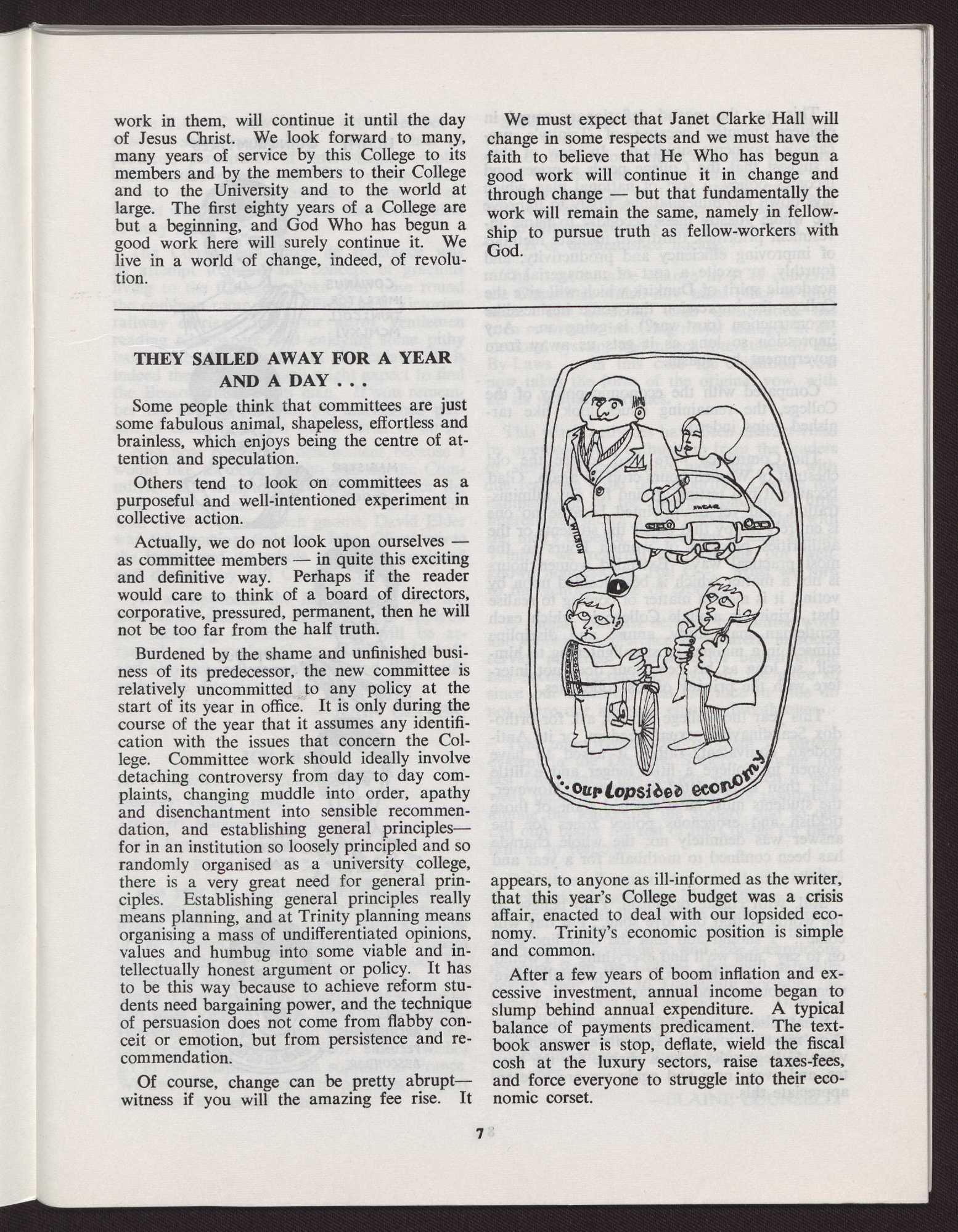
appears, to anyone as ill-informed as the writer, that this year's College budget was a crisis affair, enacted to deal with our lopsided economy. Trinity's economic position is simple and common
After a few years of boom inflation and excessive investment, annual income began to slump behind annual expenditure. A typical balance of payments predicament. The textbook answer is stop, deflate, wield the fiscal cosh at the luxury sectors, raise taxes-fees, and force everyone to struggle into their economic corset.
This was the second deflationary round in eighteen months because of Trinity's precarious payments situation. In view of this, I suggest that the College needs a prices and incomes policy, a sort of national plan which lays down recommendations, firstly to improve the whole ghastly mess, secondly to name investment priorities, thirdly to indicate methods of improving efficiency and productivity, and fourthly to excite a sort of managerial cum academic spirit of Dunkirk which will give the College the impression that some businesslike reconstruction (post-war?) is going on. Any impression so long as it gets us away from government by spasm.
Compared with the economic policy of the College, the remaining issues look like tarnished coins indeed.
The Committee were glad to see the old chestnut of Women hours crop up again. Glad because it is a testing ground for any administration, and yet disappointed because no one is entirely happy that either the students or the authorities perceive of women hours in the most practical way. Extended women hours is not a matter which is best decided upon by voting, it is more a matter of coming to realise that Trinity is a male College in which each gentleman may study, amuse and discipline himself in a manner most enlightening to himself, so long as his behaviour does not interfere with the privacy of his colleagues.
This year the College did not ask for orthodox Scandinavian sexual freedom, or its Antipodean equivalent, rather it asked to have women in College a little longer and a little later than is permitted at present. However, the students must have touched some of those ticklish and erogenous policy zones for the answer was definitely no; the whole charade has been confined to mothballs for a year and a day.
Still, with chaste optimism, I do believe in the words of that old love song, "our day will come". I should add that the next line goes on to say "and we'll find everything". I would not like to speculate on it, and certainly more women hours do not guarantee it.
What else happened in Trinity this year? (You must be joking.) It is always gratifying when College rules take a change for the better, and every now and again we are able to appreciate this.
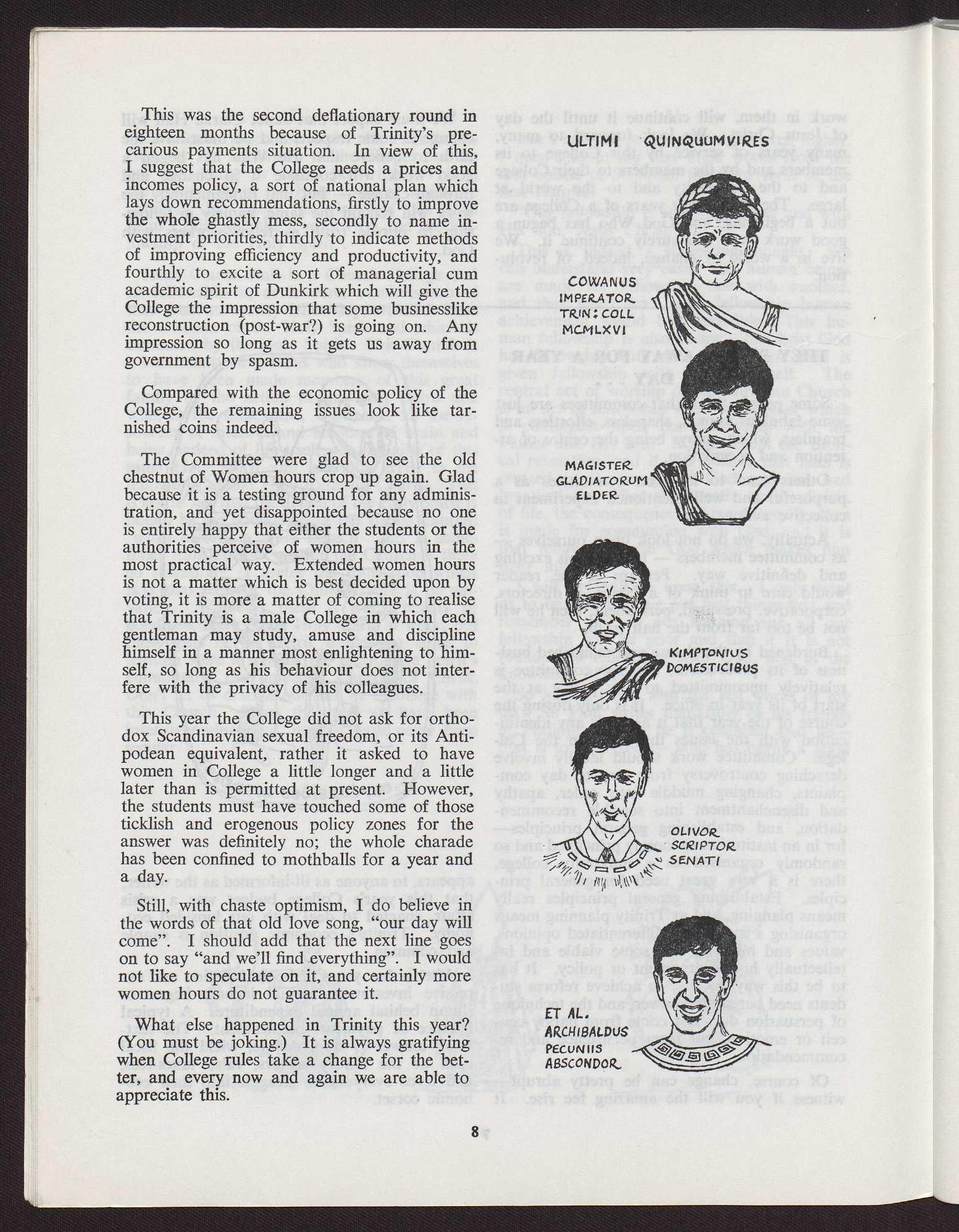
CO WA NUS IMPERATOR. TRIM I COLL MCMLXVI
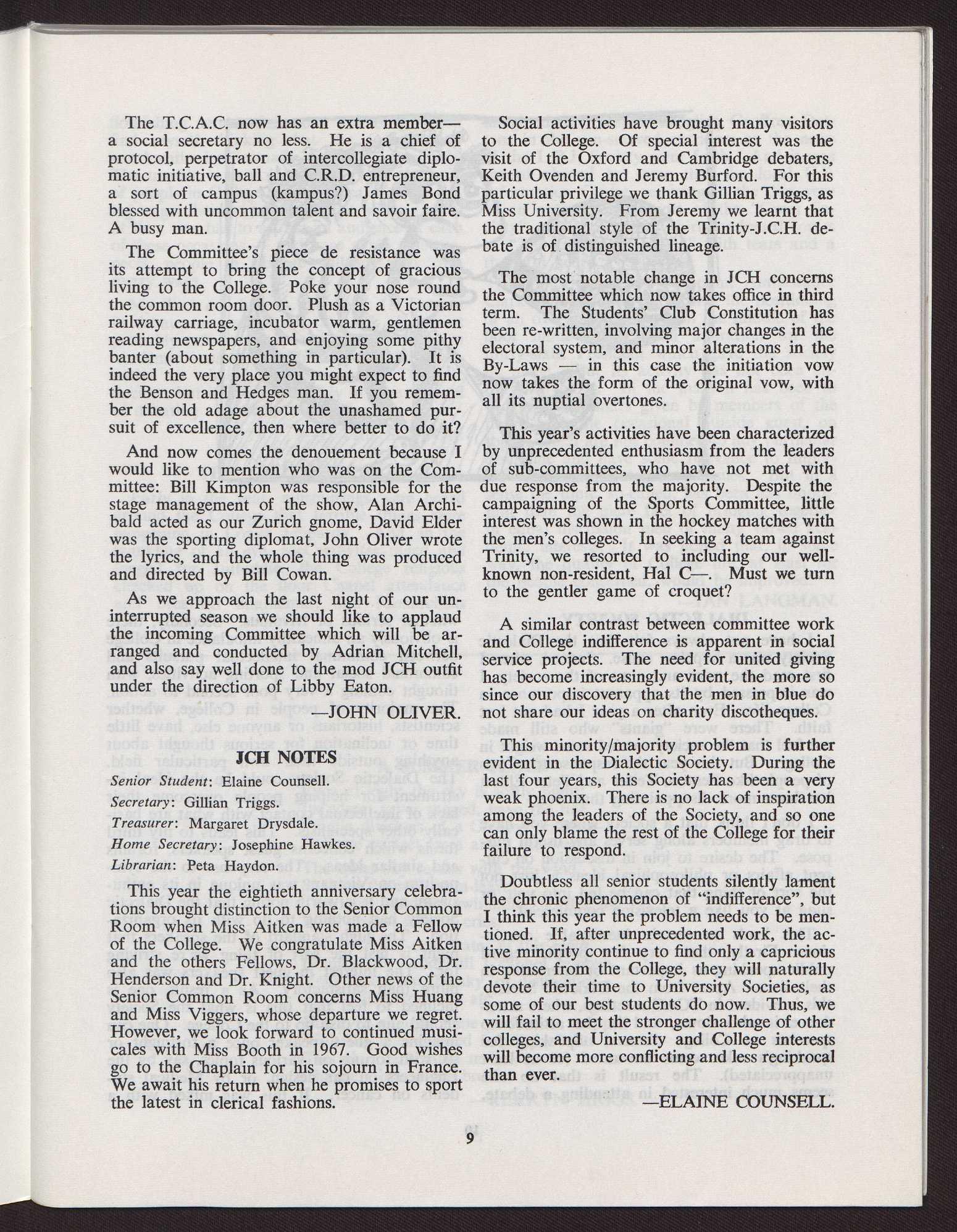
The T.C.A.C. now has an extra member— a social secretary no less. He is a chief of protocol, perpetrator of intercollegiate diplomatic initiative, ball and C.R.D. entrepreneur, a sort of campus (kampus?) James Bond blessed with uncommon talent and savoir faire. A busy man.
The Committee's piece de resistance was its attempt to bring the concept of gracious living to the College. Poke your nose round the common room door. Plush as a Victorian railway carriage, incubator warm, gentlemen reading newspapers, and enjoying some pithy banter (about something in particular). It is indeed the very place you might expect to find the Benson and Hedges man. If you remember the old adage about the unashamed pursuit of excellence, then where better to do it?
And now comes the denouement because I would like to mention who was on the Committee: Bill Kimpton was responsible for the stage management of the show, Alan Archibald acted as our Zurich gnome, David Elder was the sporting diplomat, John Oliver wrote the lyrics, and the whole thing was produced and directed by Bill Cowan.
As we approach the last night of our uninterrupted season we should like to applaud the incoming Committee which will be arranged and conducted by Adrian Mitchell, and also say well done to the mod JCH outfit under the direction of Libby Eaton.
—JOHN OLIVER.
Senior Student: Elaine Counsell.
Secretary: Gillian Triggs.
Treasurer: Margaret Drysdale.
Home Secretary: Josephine Hawkes.
Librarian: Peta Haydon.
This year the eightieth anniversary celebrations brought distinction to the Senior Common Room when Miss Aitken was made a Fellow of the College. We congratulate Miss Aitken and the others Fellows, Dr. Blackwood, Dr. Henderson and Dr. Knight. Other news of the Senior Common Room concerns Miss Huang and Miss Viggers, whose departure we regret. However, we look forward to continued musicales with Miss Booth in 1967. Good wishes go to the Chaplain for his sojourn in France. We await his return when he promises to sport the latest in clerical fashions.
Social activities have brought many visitors to the College. Of special interest was the visit of the Oxford and Cambridge debaters, Keith Ovenden and Jeremy Burford. For this particular privilege we thank Gillian Triggs, as Miss University. From Jeremy we learnt that the traditional style of the Trinity-J.C.H. debate is of distinguished lineage.
The most notable change in JCH concerns the Committee which now takes office in third term. The Students' Club Constitution has been re-written, involving major changes in the electoral system, and minor alterations in the By-Laws — in this case the initiation vow now takes the form of the original vow, with all its nuptial overtones.
This year's activities have been characterized by unprecedented enthusiasm from the leaders of sub-committees, who have not met with due response from the majority. Despite the campaigning of the Sports Committee, little interest was shown in the hockey matches with the men's colleges. In seeking a team against Trinity, we resorted to including our wellknown non-resident, Hal C—. Must we turn to the gentler game of croquet?
A similar contrast between committee work and College indifference is apparent in social service projects. The need for united giving has become increasingly evident, the more so since our discovery that the men in blue do not share our ideas on charity discotheques.
This minority/majority problem is further evident in the Dialectic Society. During the last four years, this Society has been a very weak phoenix. There is no lack of inspiration among the leaders of the Society, and so one can only blame the rest of the College for their failure to respond.
Doubtless all senior students silently lament the chronic phenomenon of "indifference", but I think this year the problem needs to be mentioned. If, after unprecedented work, the active minority continue to find only a capricious response from the College, they will naturally devote their time to University Societies, as some of our best students do now. Thus, we will fail to meet the stronger challenge of other colleges, and University and College interests will become more conflicting and less reciprocal than ever.
—ELAINE COUNSELL.
I . have not always felt that the Dialectic Society was a hopeless cause. Indeed, when I first . read the . rules and aims of the society, I was impressed by its apparent importance in College life. Even after a year I had not lost faith. There were "giants" who still made me feel that the society carried some weight in College. But this year the response to efforts of people like Fenton, Telfer and Peter Elliott has been more disappointing than ever.
I don't think that a society where you have to drag members along serves any useful purpose. The desire to join in discussion on current affairs or philosophical ideas is just not the sort of thing that can be fed into you, or sung at you like a television commercial.
This leads . to certain inescapable conclusions: Firstly, that very few people regard public speaking as important or . interesting in their lives. Apart from the Dialectic Society, this is evident in TCAC meetings, where attendance is also down, and in the attitude to speeches at College dinners. Speaking for speaking's sake seems unwanted (or at least unappreciated). The result is that no one seems. much interested in attending a debate,

whether serious or frivolous. Secondly, there is obviously an unhealthy imbalance in College between communal intellectual pursuits and communal social and sporting activities, with thought coming a very poor second to action. The majority of people in College, whether scientists, historians or anyone else, have little time or inclination for serious thought about anything outside their own particular field. The Dialectic Society could be the ideal instrument for helping people overcome their lack of intellectual contact with what are basically other specialists. This leads to my third thesis which concerns guest speakers, forums and similar ideas. The response to the symposium on Vietnam was unique in its enthusiasm, and it is worth noting that the Dialectic Society had nothing to do with its organization. The high standard of the speakers that night is just the sort of thing we're striving for. The interest in guest speakers was also more than satisfactory. As a result, one is inclined to feel that this is what the Society should aim to dish up to the College. One can imagine a guest speaker once a fortnight or so, with forums on various topics, say by the Engineers on car design, or by Medical students on cancer. If this was mixed with a
flourishing series of Sunday salons, I would find myself thinking that the College was worthwhile intellectually as well as socially. The trouble is twofold: trying to get the bulk of people in College to write essays is like trying to get them to take up ballet, while, on top of that, one has to attract an audience at each of these occasions — and once again, one suspects, people in College will go their own merry ways.
My three conclusions, then, are: (1) Interest in debates as such is nil; (2) Lack of interest probably reflects the specialization inherent in academic courses; (3) There is a viable alternative to what now passes for a Dialectic Society, but it would probably involve the end of debating as such in this College.
—PETER SEDDON.
Early in the year, murmurings were heard around the College that terrible things were happening in Lower Jeopardy. And, in the twinkling of an eye, McCarthyites raged and longed for Juttoddie, the College religious checked up on the floor Chapel attendance and breathed anathemas, and Monarchists
imagined they bespied fledgling Geoffrey buttons in the sun-starved corridors as the news of the L.B.J. Society went forth. And it was spread abroad by some that the local U.S. Information Centre, rejoicing in the discovery of an antipodean outpost of the "Great Society", sent to Jeopardy thirty endorsed copies of "The God That Failed" with tears and a thankful heart.
We must, however, disappoint Ambassador Clark and his lackeys. It was the positioning of an over-used expletive in the middle of the floor name rather than adoration for the thirty-sixth President which gave the society its name. But its activity has not been entirely frivolous. In the main it has been to engage in seminars given by members of the floor, with the occasional outside guest, on topics which are not confined to any particular discipline and have some relevance to important social and intellectual issues. But in a sense the topic, so-called, has been less important than the mere fact of bringing together in equal discussion men of many varied academic interests. It was hoped that, in some way, the quality of College life, at least for the people concerned, would be improved. —IAN LANGMAN.
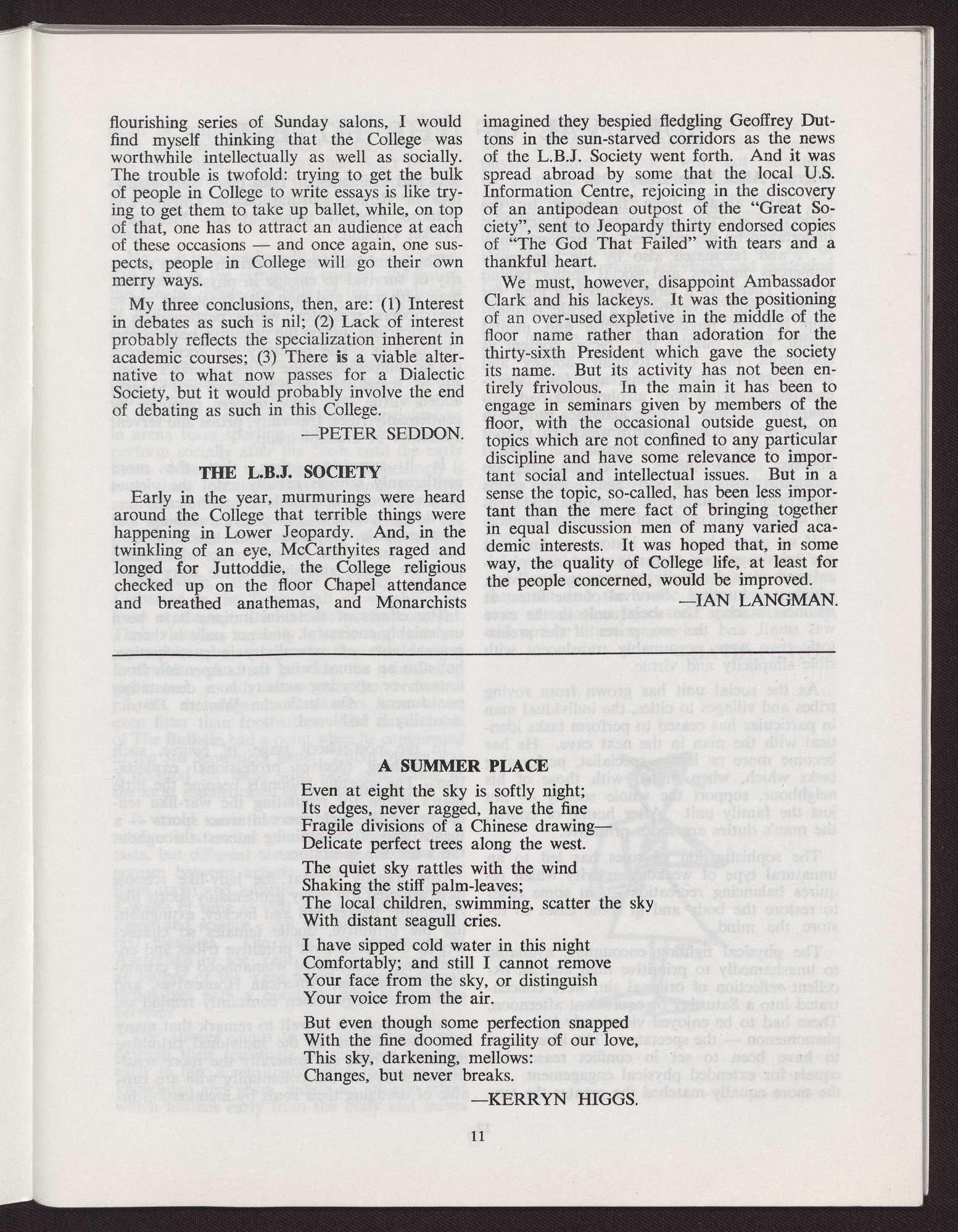
Even at eight the sky is softly night; Its edges, never ragged, have the fine Fragile divisions of a Chinese drawing— Delicate perfect trees along the west.
The quiet sky rattles with the wind Shaking the stiff palm-leaves; The local children, swimming, scatter the sky With distant seagull cries.
I have sipped cold water in this night Comfortably; and still I cannot remove Your face from the sky, or distinguish Your voice from the air.
But even though some perfection snapped With the fine doomed fragility of our love, This sky, darkening, mellows: Changes, but never breaks.
—KERRYN
HIGGS.
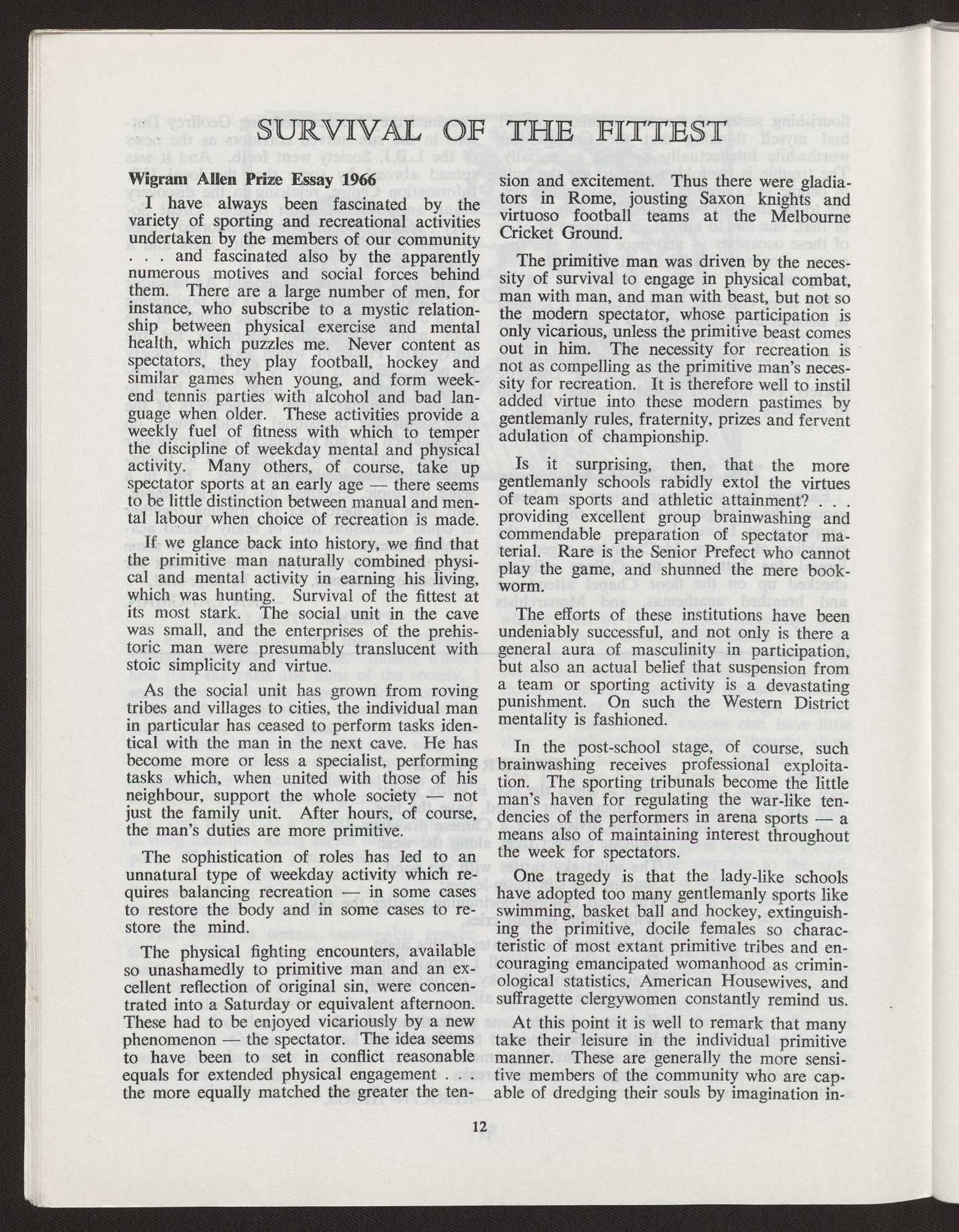
Wigram Allen Prize Essay 1966
I have always been fascinated by the variety of sporting and recreational activities undertaken by the members of our community . . . and fascinated also by the apparently numerous motives and social forces behind them. There are a large number of men, for instance, who subscribe to a mystic relationship between physical exercise and mental health, which puzzles me. Never content as spectators, they play football, hockey and similar games when young, and form weekend tennis parties with alcohol and bad language when older. These activities provide a weekly fuel of fitness with which to temper the discipline of weekday mental and physical activity. Many others, of course, take up spectator sports at an early age — there seems to be little distinction between manual and mental labour when choice of recreation is made.
If we glance back into history, we find that the primitive man naturally combined physical and mental activity in earning his living, which was hunting. Survival of the fittest at its most stark. The social unit in the cave was small, and the enterprises of the prehistoric man were presumably translucent with stoic simplicity and virtue.
As the social unit has grown from roving tribes and villages to cities, the individual man in particular has ceased to perform tasks identical with the man in the next cave. He has become more or less a specialist, performing tasks which, when united with those of his neighbour, support the whole society — not just the family unit. After hours, of course, the man's duties are more primitive.
The sophistication of roles has Ied to an unnatural type of weekday activity which requires balancing recreation — in some cases to restore the body and in some cases to restore the mind.
The physical fighting encounters, available so unashamedly to primitive man and an excellent reflection of original sin, were concentrated into a Saturday or equivalent afternoon. These had to be enjoyed vicariously by a new phenomenon — the spectator. The idea seems to have been to set in conflict reasonable equals for extended physical engagement . . . the more equally matched the greater the ten-
sion and excitement. Thus there were gladiators in Rome, jousting Saxon knights and virtuoso football teams at the Melbourne Cricket Ground.
The primitive man was driven by the necessity of survival to engage in physical combat, man with man, and man with beast, but not so the modern spectator, whose participation is only vicarious, unless the primitive beast comes out in him. The necessity for recreation is not as compelling as the primitive man's necessity for recreation. It is therefore well to instil added virtue into these modern pastimes by gentlemanly rules, fraternity, prizes and fervent adulation of championship.
Is it surprising, then, that the more gentlemanly schools rabidly extol the virtues of team sports and athletic attainment? . . providing excellent group brainwashing and commendable preparation of spectator material. Rare is the Senior Prefect who cannot play the game, and shunned the mere bookworm.
The efforts of these institutions have been undeniably successful, and not only is there a general aura of masculinity in participation, but also an actual belief that suspension from a team or sporting activity is a devastating punishment. On such the Western District mentality is fashioned.
In the post-school stage, of course, such brainwashing receives professional exploitation. The sporting tribunals become the little man's haven for regulating the war-like tendencies of the performers in arena sports — a means also of maintaining interest throughout the week for spectators.
One tragedy is that the lady-like schools have adopted too many gentlemanly sports like swimming, basket ball and hockey, extinguishing the primitive, docile females so characteristic of most extant primitive tribes and encouraging emancipated womanhood as criminological statistics, American Housewives, and suffragette clergywomen constantly remind us.
At this point it is well to remark that many take their leisure in the individual primitive manner. These are generally the more sensitive members of the community who are cap. able of dredging their souls by imagination in-
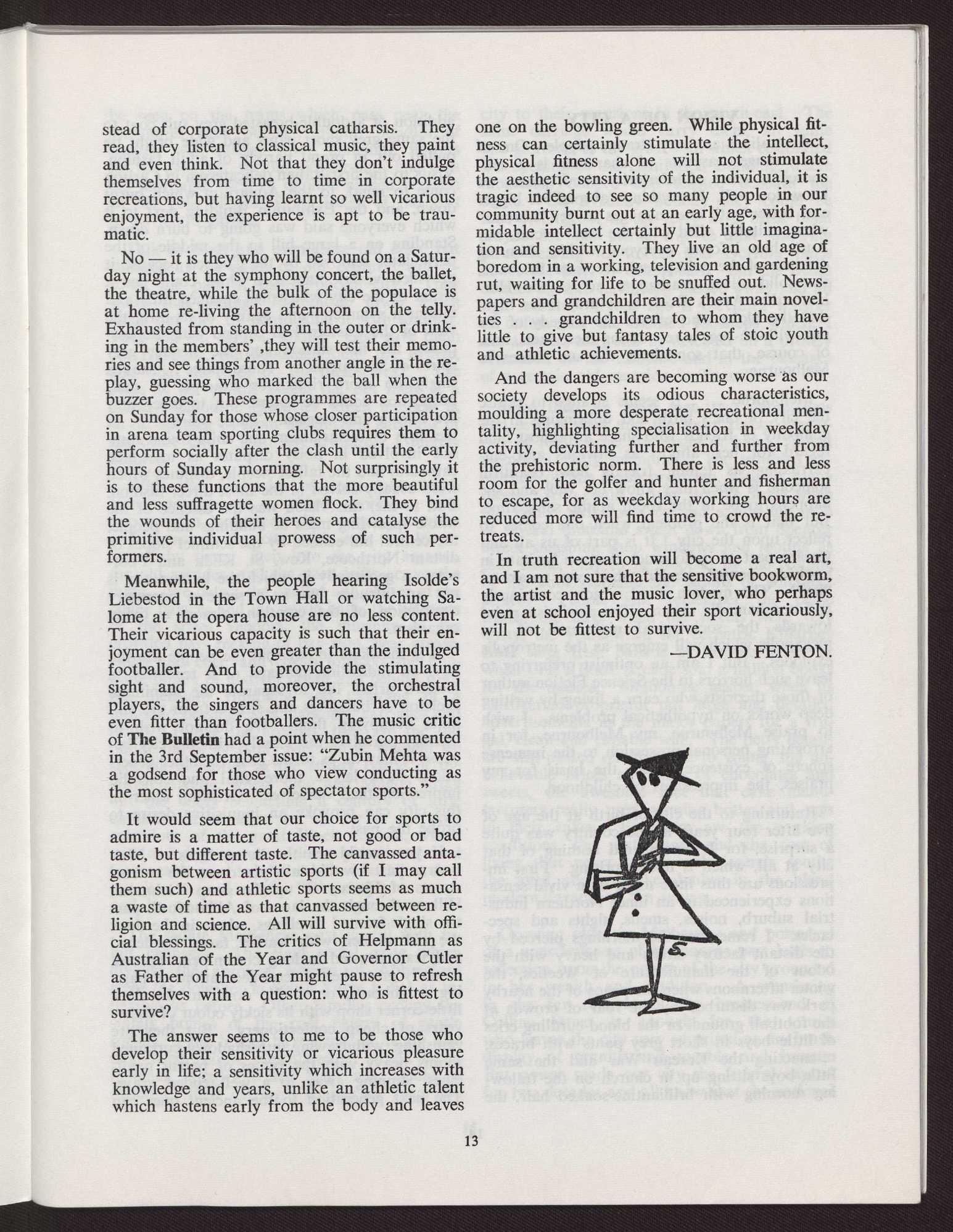
stead of corporate physical catharsis. They read, they listen to classical music, they paint and even think. Not that they don't indulge themselves from time to time in corporate recreations, but having learnt so well vicarious enjoyment, the experience is apt to be traumatic.
No — it is they who will be found on a Saturday night at the symphony concert, the ballet, the theatre, while the bulk of the populace is at home re-living the afternoon on the telly. Exhausted from standing in the outer or drinking in the members' ,they will test their memories and see things from another angle in the replay, guessing who marked the ball when the buzzer goes. These programmes are repeated on Sunday for those whose closer participation in arena team sporting clubs requires them to perform socially after the clash until the early hours of Sunday morning. Not surprisingly it is to these functions that the more beautiful and less suffragette women flock. They bind the wounds of their heroes and catalyse the primitive individual prowess of such performers.
Meanwhile, the people hearing Isolde's Liebestod in the Town Hall or watching Salome at the opera house are no less content. Their vicarious capacity is such that their enjoyment can be even greater than the indulged footballer. And to provide the stimulating sight and sound, moreover, the orchestral players, the singers and dancers have to be even fitter than footballers. The music critic of The Bulletin had a point when he commented in the 3rd September issue: "Zubin Mehta was a godsend for those who view conducting as the most sophisticated of spectator sports."
It would seem that our choice for sports to admire is a matter of taste, not good or bad taste, but different taste. The canvassed antagonism between artistic sports (if I may call them such) and athletic sports seems as much a waste of time as that canvassed between religion and science. All will survive with official blessings. The critics of Helpmann as Australian of the Year and Governor Cutler as Father of the Year might pause to refresh themselves with a question: who is fittest to survive?
The answer seems to me to be those who develop their sensitivity or vicarious pleasure early in life; a sensitivity which increases with knowledge and years, unlike an athletic talent which hastens early from the body and leaves
one on the bowling green. While physical fitness can certainly stimulate the intellect, physical fitness alone will not stimulate the aesthetic sensitivity of the individual, it is tragic indeed to see so many people in our community burnt out at an early age, with formidable intellect certainly but little imagination and sensitivity. They live an old age of boredom in a working, television and gardening rut, waiting for life to be snuffed out. Newspapers and grandchildren are their main novelties . . . grandchildren to whom they have little to give but fantasy tales of stoic youth and athletic achievements.
And the dangers are becoming worse as our society develops its odious characteristics, moulding a more desperate recreational mentality, highlighting specialisation in weekday activity, deviating further and further from the prehistoric norm. There is less and less room for the golfer and hunter and fisherman to escape, for as weekday working hours are reduced more will find time to crowd the retreats.
In truth recreation will become a real art, and I am not sure that the sensitive bookworm, the artist and the music lover, who perhaps even at school enjoyed their sport vicariously, will not be fittest to survive.
—DAVID
FENTON.
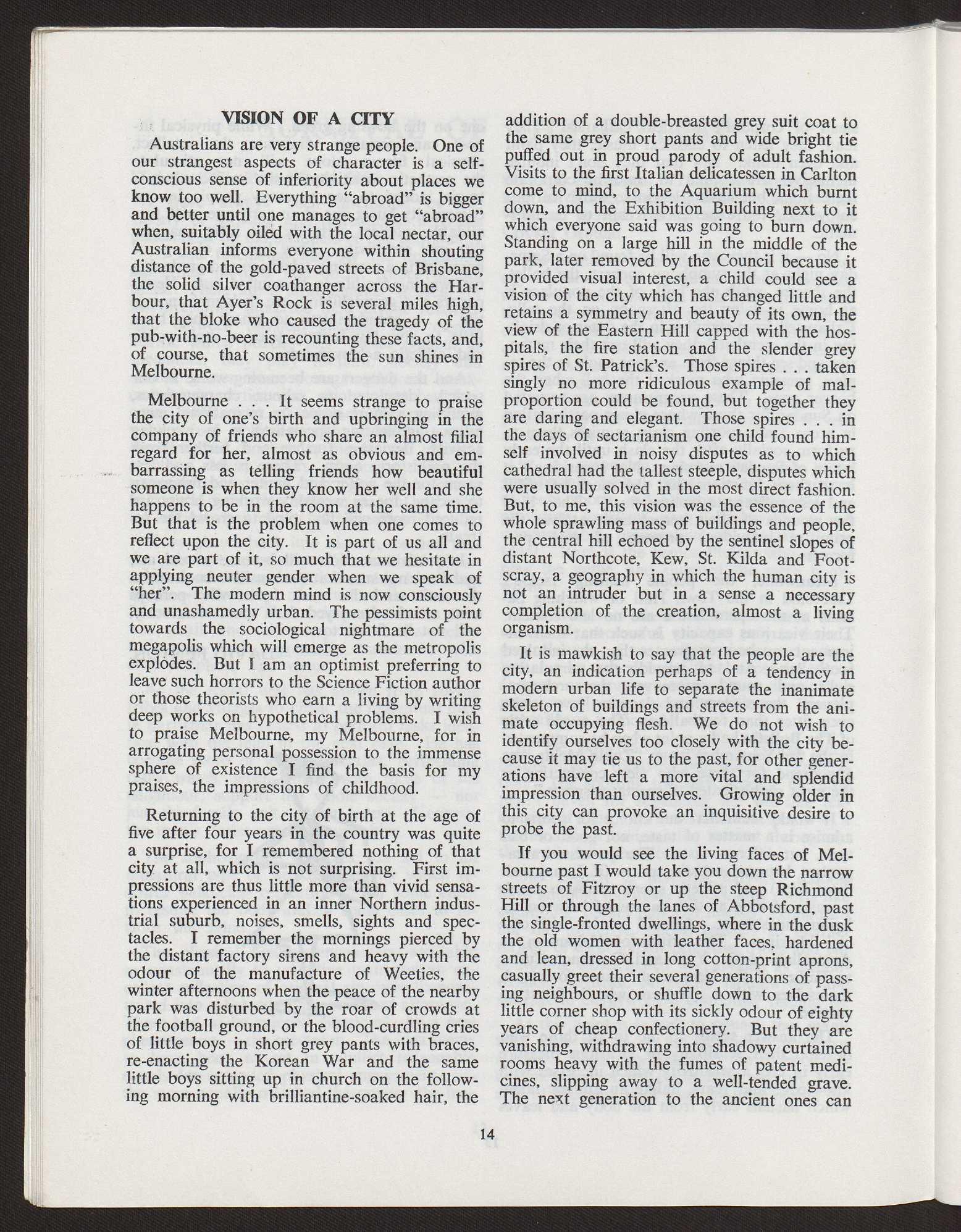
Australians are very strange people. One of our strangest aspects of character is a selfconscious sense of inferiority about places we know too well. Everything "abroad" is bigger and better until one manages to get "abroad" when, suitably oiled with the local nectar, our Australian informs everyone within shouting distance of the gold-paved streets of Brisbane, the solid silver coathanger across the Harbour, that Ayer's Rock is several miles high, that the bloke who caused the tragedy of the pub-with-no-beer is recounting these facts, and, of course, that sometimes the sun shines in Melbourne.
Melbourne . . . It seems strange to praise the city of one's birth and upbringing in the company of friends who share an almost filial regard for her, almost as obvious and embarrassing as telling friends how beautiful someone is when they know her well and she happens to be in the room at the same time. But that is the problem when one comes to reflect upon the city. It is part of us all and we are part of it, so much that we hesitate in applying neuter gender when we speak of "her". The modern mind is now consciously and unashamedly urban. The pessimists point towards the sociological nightmare of the megapolis which will emerge as the metropolis explodes. But I am an optimist preferring to leave such horrors to the Science Fiction author or those theorists who earn a living by writing deep works on hypothetical problems. I wish to praise Melbourne, my Melbourne, for in arrogating personal possession to the immense sphere of existence I find the basis for my praises, the impressions of childhood.
Returning to the city of birth at the age of five after four years in the country was quite a surprise, for I remembered nothing of that city at all, which is not surprising. First impressions are thus little more than vivid sensations experienced in an inner Northern industrial suburb, noises, smells, sights and spectacles. I remember the mornings pierced by the distant factory sirens and heavy with the odour of the manufacture of Weeties, the winter afternoons when the peace of the nearby park was disturbed by the roar of crowds at the football ground, or the blood-curdling cries of little boys in short grey pants with braces, re-enacting the Korean War and the same little boys sitting up in church on the following morning with brilliantine-soaked hair, the
addition of a double-breasted grey suit coat to the same grey short pants and wide bright tie puffed out in proud parody of adult fashion. Visits to the first Italian delicatessen in Carlton come to mind, to the Aquarium which burnt down, and the Exhibition Building next to it which everyone said was going to burn down. Standing on a large hill in the middle of the park, later removed by the Council because it provided visual interest, a child could see a vision of the city which has changed little and retains a symmetry and beauty of its own, the view of the Eastern Hill capped with the hospitals, the fire station and the slender grey spires of St. Patrick's. Those spires ... taken singly no more ridiculous example of malproportion could be found, but together they are daring and elegant. Those spires ... in the days of sectarianism one child found himself involved in noisy disputes as to which cathedral had the tallest steeple, disputes which were usually solved in the most direct fashion. But, to me, this vision was the essence of the whole sprawling mass of buildings and people, the central hill echoed by the sentinel slopes of distant Northcote, Kew, St. Kilda and Footscray, a geography in which the human city is not an intruder but in a sense a necessary completion of the creation, almost a living organism.
It is mawkish to say that the people are the city, an indication perhaps of a tendency in modern urban life to separate the inanimate skeleton of buildings and streets from the animate occupying flesh. We do not wish to identify ourselves too closely with the city because it may tie us to the past, for other generations have left a more vital and splendid impression than ourselves. Growing older in this city can provoke an inquisitive desire to probe the past.
If you would see the living faces of Melbourne past I would take you down the narrow streets of Fitzroy or up the steep Richmond Hill or through the lanes of Abbotsford, past the single-fronted dwellings, where in the dusk the old women with leather faces, hardened and lean, dressed in long cotton-print aprons, casually greet their several generations of passing neighbours, or shuffle down to the dark little corner shop with its sickly odour of eighty years of cheap confectionery. But they are vanishing, withdrawing into shadowy curtained rooms heavy with the fumes of patent medicines, slipping away to a well-tended grave. The next generation to the ancient ones can
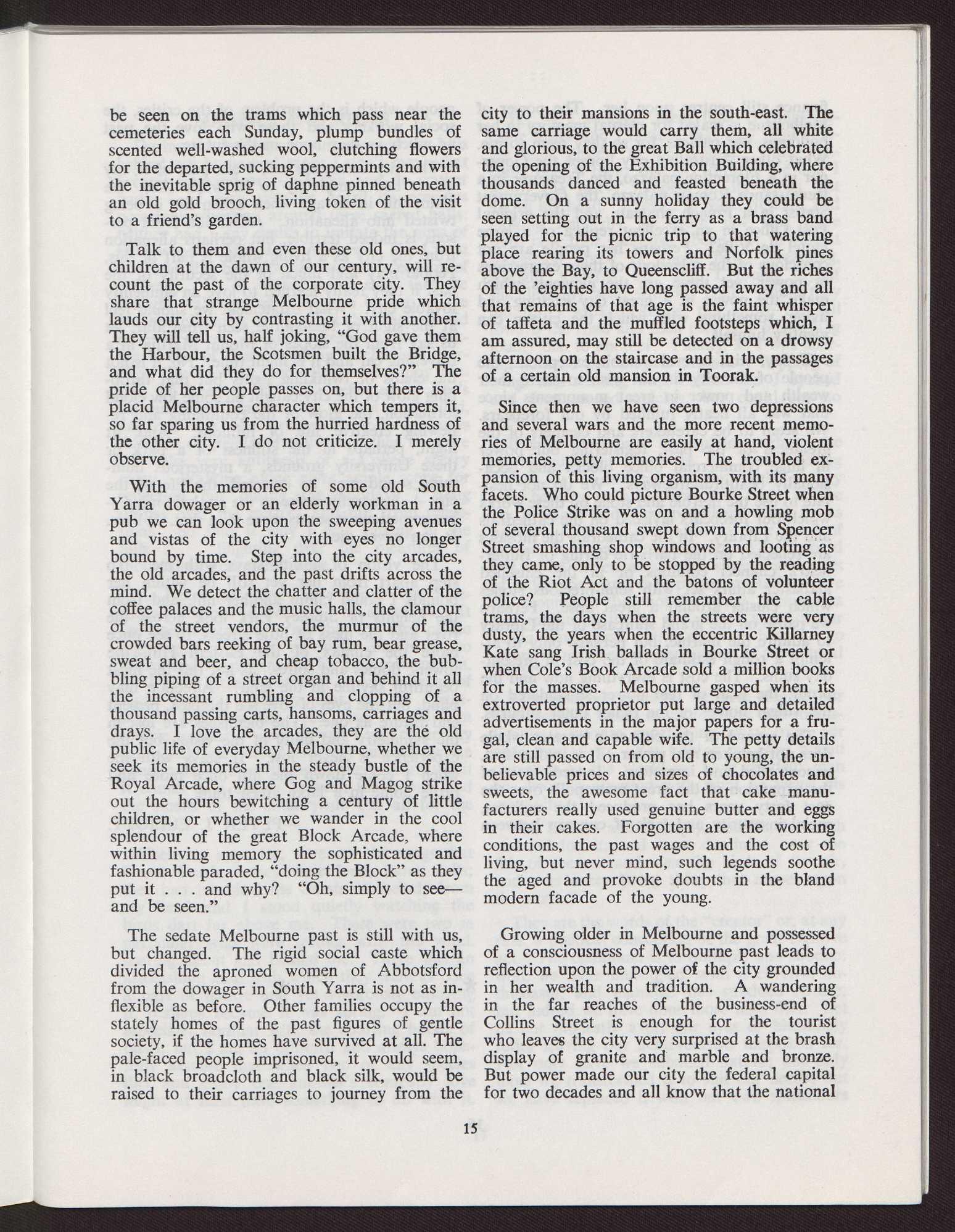
be seen on the trams which pass near the cemeteries each Sunday, plump bundles of scented well-washed wool, clutching flowers for the departed, sucking peppermints and with the inevitable sprig of daphne pinned beneath an old gold brooch, living token of the visit to a friend's garden.
Talk to them and even these old ones, but children at the dawn of our century, will recount the past of the corporate city. They share that strange Melbourne pride which lauds our city by contrasting it with another. They will tell us, half joking, "God gave them the Harbour, the Scotsmen built the Bridge, and what did they do for themselves?" The pride of her people passes on, but there is a placid Melbourne character which tempers it, so far sparing us from the hurried hardness of the other city. I do not criticize. I merely observe.
With the memories of some old South Yarra dowager or an elderly workman in a pub we can look upon the sweeping avenues and vistas of the city with eyes no longer bound by time. Step into the city arcades, the old arcades, and the past drifts across the mind. We detect the chatter and clatter of the coffee palaces and the music halls, the clamour of the street vendors, the murmur of the crowded bars reeking of bay rum, bear grease, sweat and beer, and cheap tobacco, the bubbling piping of a street organ and behind it all the incessant rumbling and clopping of a thousand passing carts, hansoms, carriages and drays. I love the arcades, they are the old public life of everyday Melbourne, whether we seek its memories in the steady bustle of the Royal Arcade, where Gog and Magog strike out the hours bewitching a century of little children, or whether we wander in the cool splendour of the great Block Arcade, where within living memory the sophisticated and fashionable paraded, "doing the Block" as they put it . . . and why? "Oh, simply to see— and be seen."
The sedate Melbourne past is still with us, but changed. The rigid social caste which divided the aproned women of Abbotsford from the dowager in South Yarra is not as inflexible as before. Other families occupy the stately homes of the past figures of gentle society, if the homes have survived at all. The pale-faced people imprisoned, it would seem, in black broadcloth and black silk, would be raised to their carriages to journey from the
city to their mansions in the south-east. The same carriage would carry them, all white and glorious, to the great Ball which celebrated the opening of the Exhibition Building, where thousands danced and feasted beneath the dome. On a sunny holiday they could be seen setting out in the ferry as a brass band played for the picnic trip to that watering place rearing its towers and Norfolk pines above the Bay, to Queenscliff. But the riches of the 'eighties have long passed away and all that remains of that age is the faint whisper of taffeta and the muffled footsteps which, I am assured, may still be detected on a drowsy afternoon on the staircase and in the passages of a certain old mansion in Toorak.
Since then we have seen two depressions and several wars and the more recent memories of Melbourne are easily at hand, violent memories, petty memories. The troubled expansion of this living organism, with its many facets. Who could picture Bourke Street when the Police Strike was on and a howling mob of several thousand swept down from Spencer Street smashing shop windows and looting as they came, only to be stopped by the reading of the Riot Act and the batons of volunteer police? People still remember the cable trams, the days when the streets were very dusty, the years when the eccentric Killarney Kate sang Irish ballads in Bourke Street or when Cole's Book Arcade sold a million books for the masses. Melbourne gasped when its extroverted proprietor put large and detailed advertisements in the major papers for a frugal, clean and capable wife. The petty details are still passed on from old to young, the unbelievable prices and sizes of chocolates and sweets, the awesome fact that cake manufacturers really used genuine butter and eggs in their cakes. Forgotten are the working conditions, the past wages and the cost of living, but never mind, such legends soothe the aged and provoke doubts in the bland modern facade of the young.
Growing older in Melbourne and possessed of a consciousness of Melbourne past leads to reflection upon the power of the city grounded in her wealth and tradition. A wandering in the far reaches of the business-end of Collins Street is enough for the tourist who leaves the city very surprised at the brash display of granite and marble and bronze. But power made our city the federal capital for two decades and all know that the national
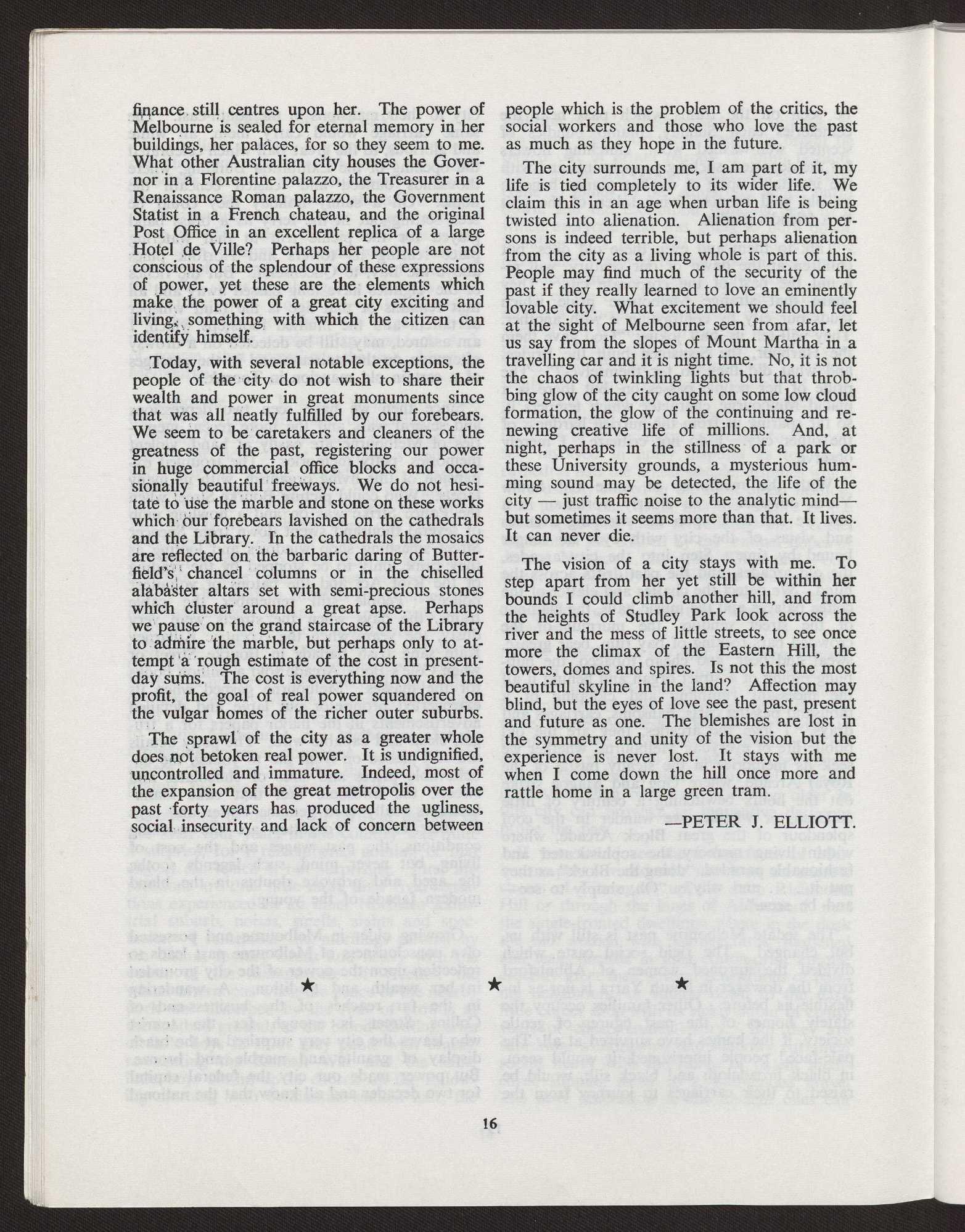
finance. still centres upon her. . The power of Melbourne is sealed for eternal memory in her buildings, her palaces, for so they seem to me. What other Australian city houses the Governor in a Florentine palazzo, the Treasurer in a Renaissance Roman palazzo, the Government Statist in a French chateau, and the original Post Office in an excellent replica of a large Hotel de Ville? Perhaps her people are not conscious of the splendour of these expressions of power, yet these are the elements which make the power of a great city exciting and living, something, with which the citizen can identify himself.
Today, with several notable exceptions, the people of the city do not wish to share their wealth and power in great monuments since that was all neatly fulfilled by our forebears. We seem to be caretakers and cleaners of the greatness of the past, registering our power in huge commercial office blocks and occasionally beautiful freeways. We do not hesitate to use the marble and stone on these works which our forebears lavished on the cathedrals and the Library. In the cathedrals the mosaics are reflected on the barbaric daring of Butterfield's'; ` chancel columns or in the chiselled alabàster altars set with semi-precious stones which Cluster around a great apse. Perhaps we pause on the grand staircase of the Library to admire the marble, but perhaps only to attempt `a 'rough estimate of the cost in presentday sums The cost is everything now and the profit, the goal of real power squandered on the vulgar homes of the richer outer suburbs.
The sprawl of the city as a greater whole does not betoken real power. It is undignified, uncontrolled and immature. Indeed, most of the expansion of the great metropolis over the past forty years has produced the ugliness, social insecurity and lack of concern between
people which is the problem of the critics, the social workers and those who love the past as much as they hope in the future.
The city surrounds me, I am part of it, my life is tied completely to its wider life. We claim this in an age when urban life is being twisted into alienation. Alienation from persons is indeed terrible, but perhaps alienation from the city as a living whole is part of this. People may find much of the security of the past if they really learned to love an eminently lovable city. What excitement we should feel at the sight of Melbourne seen from afar, let us say from the slopes of Mount Martha in a travelling car and it is night time. No, it is not the chaos of twinkling lights but that throbbing glow of the city caught on some low cloud formation, the glow of the continuing and renewing creative life of millions. And, at night, perhaps in the stillness of a park or these University grounds, a mysterious humming sound may be detected, the life of the city — just traffic noise to the analytic mind— but sometimes it seems more than that. It lives. It can never die.
The vision of a city stays with me. To step apart from her yet still be within her bounds I could climb another hill, and from the heights of Studley Park look across the river and the mess of little streets, to see once more the climax of the Eastern Hill, the towers, domes and spires. Is not this the most beautiful skyline in the land? Affection may blind, but the eyes of love see the past, present and future as one. The blemishes are lost in the symmetry and unity of the vision but the experience is never lost. It stays with me when I come down the hill once more and rattle home in a large green tram.
—PETER J. ELLIOTT.
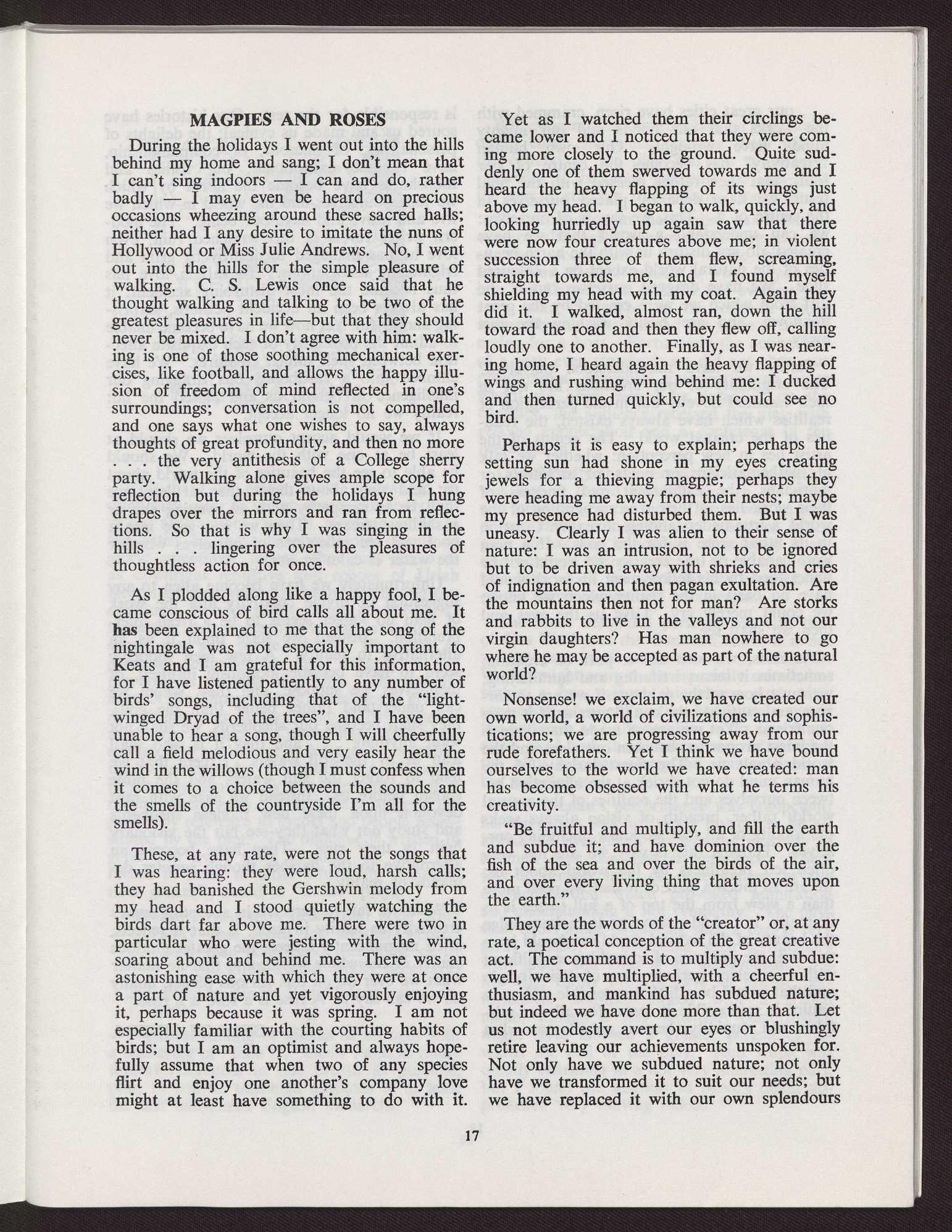
During the holidays I went out into the hills behind my home and sang; I don't mean that I can't sing indoors — I can and do, rather badly — I may even be heard on precious occasions wheezing around these sacred halls; neither had I any desire to imitate the nuns of Hollywood or Miss Julie Andrews. No, I went out into the hills for the simple pleasure of walking. C. S. Lewis once said that he thought walking and talking to be two of the greatest pleasures in life—but that they should never be mixed. I don't agree with him: walking is one of those soothing mechanical exercises, like football, and allows the happy illusion of freedom of mind reflected in one's surroundings; conversation is not compelled, and one says what one wishes to say, always thoughts of great profundity, and then no more . . . the very antithesis of a College sherry party. Walking alone gives ample scope for reflection but during the holidays I hung drapes over the mirrors and ran from reflections. So that is why I was singing in the hills . lingering over the pleasures of thoughtless action for once.
As I plodded along like a happy fool, I became conscious of bird calls all about me. It has been explained to me that the song of the nightingale was not especially important to Keats and I am grateful for this information, for I have listened patiently to any number of birds' songs, including that of the "lightwinged Dryad of the trees", and I have been unable to hear a song, though I will cheerfully call a field melodious and very easily hear the wind in the willows (though I must confess when it comes to a choice between the sounds and the smells of the countryside I'm all for the smells).
These, at any rate, were not the songs that I was hearing: they were loud, harsh calls; they had banished the Gershwin melody from my head and I stood quietly watching the birds dart far above me. There were two in particular who were jesting with the wind, soaring about and behind me. There was an astonishing ease with which they were at once a part of nature and yet vigorously enjoying it, perhaps because it was spring. I am not especially familiar with the courting habits of birds; but I am an optimist and always hopefully assume that when two of any species flirt and enjoy one another's company love might at least have something to do with it.
Yet as I watched them their circlings became lower and I noticed that they were coming more closely to the ground. Quite suddenly one of them swerved towards me and I heard the heavy flapping of its wings just above my head. I began to walk, quickly, and looking hurriedly up again saw that there were now four creatures above me; in violent succession three of them flew, screaming, straight towards me, and I found myself shielding my head with my coat. Again they did it. I walked, almost ran, down the hill toward the road and then they flew off, calling loudly one to another. Finally, as I was nearing home, I heard again the heavy flapping of wings and rushing wind behind me: I ducked and then turned quickly, but could see no bird.
Perhaps it is easy to explain; perhaps the setting sun had shone in my eyes creating jewels for a thieving magpie; perhaps they were heading me away from their nests; maybe my presence had disturbed them. But I was uneasy. Clearly I was alien to their sense of nature: I was an intrusion, not to be ignored but to be driven away with shrieks and cries of indignation and then pagan exultation. Are the mountains then not for man? Are storks and rabbits to live in the valleys and not our virgin daughters? Has man nowhere to go where he may be accepted as part of the natural world?
Nonsense! we exclaim, we have created our own world, a world of civilizations and sophistications; we are progressing away from our rude forefathers. Yet I think we have bound ourselves to the world we have created: man has become obsessed with what he terms his creativity.
"Be fruitful and multiply, and fill the earth and subdue it; and have dominion over the fish of the sea and over the birds of the air, and over every living thing that moves upon the earth."
They are the words of the "creator" or, at any rate, a poetical conception of the great creative act. The command is to multiply and subdue: well, we have multiplied, with a cheerful enthusiasm, and mankind has subdued nature; but indeed we have done more than that. Let us not modestly avert our eyes or blushingly retire leaving our achievements unspoken for. Not only have we subdued nature; not only have we transformed it to suit our needs; but we have replaced it with our own splendours

... our great cities have risen, crammed with the works that our hands and our mighty minds have wrought. Our own human "creativity" has become the centre of our souls; and then rather pleased with the final result we have defiantly placed ourselves in the centre of it. This, we say, is of ourselves: we can understand a world that we have created: do not disturb us with the harsh beauties of the natural world except on a coloured slide. We have dragged ourselves out of the dirt from which we were created by the great unknown, and are busily washing the dirt away.
Surely we have misunderstood ourselves? The originality of our creations lies not in their essential novelty but in the perception of realities which have always existed, the realities of the created world. The genius of the artist lies in new perception: whether we talk of mathematicians or poets, of architects or musicians, the excitement and fineness of their work lies in their true recognition of the world, a true understanding of reality. Creation in its fittest sense is for the gods. If a man were capable of true creation he would not be understood by his fellow-men: his work would have no basis in the reality which we know; we could merely cry, "Give us the eyes and then we shall see."
As it is, we also are a part of creation: sometimes it seems irritating and humiliating; we must bow to the cabbage if we are to survive, and cultivate the cauliflower as if it were our friend. Yet we are so made that there is the finest proportion between ourselves and the world about us. The finest insights of the human mind do not shriek at the alienation between ourselves and the realities of the natural world; rather, breadth of vision always seeks the totality of all that we know, including ourselves. Perhaps this is why we are not very often left breathless by the world about us: we are so much a part of it that we need more than a view from the top of a hill to see it as it really is. And, anyway, to acknowledge the beauty of the natural world we should have to admit the presence of something magnificent within ourselves, perhaps even of divine origin and that would be a little too terrible. Human nature is responsible it seems for all our mistakes and stupidity; heaven only knows what
is responsible for the rest. Our histories have soured us and made us cynical: the delights of personalities, of humour, of companionship, have become exceptional; our follies and foolishness have become the norm by which we judge ourselves and the world in which we live and move and have our being. The modem writer revels in this wretched ruin; even love he has managed to destroy by grim and frightening associations. To fall in love has thus become the most disturbing accident: it has always been an accident perhaps, surprising and joyful. Yet now we have become unable to admit the possibility of such exquisite affection between such sullied creatures. We have climbed into a cardboard box dragging our intelligence in behind us and closed the lid: reality we no longer accept.
If we would accept ourselves we should at least be at one with the world. We should be able to see the beauties of the world about us; and sing about them: then at least we shall be in sympathy with an evening sky or a shallow stream. Then we can gaze into a pool and see reflections of ourselves whether the water is calm or not.
Unfortunately we have become alien to any suggestion of divine creativity and the work of man no longer seems to be a fresh interpretation. Instead we seize upon it as an alternative to reality. A few men suddenly seem to have become gloriously inspired, of themselves we suppose, and they, whom we can understand rather better than the gods, they shall become our shepherds, we shall not want anything . . . and they it is who shall lead us by the still waters. Except that we tend to forget the still waters and the table spread before us. Instead we gaze with rapt devotion upon these new modern shepherds and study not what they see but the visionary light in their eyes. They have become an alternative to the harsher though sweeter demands of reality.
What we fail to perceive in accepting man's creativity as reality in itself, is that it reflects, often magnificently indeed, the greater glorious reality of the whole world, and that no matter what we ever do on this curious planet, finally all we can say is: A rose is a rose is a rose.
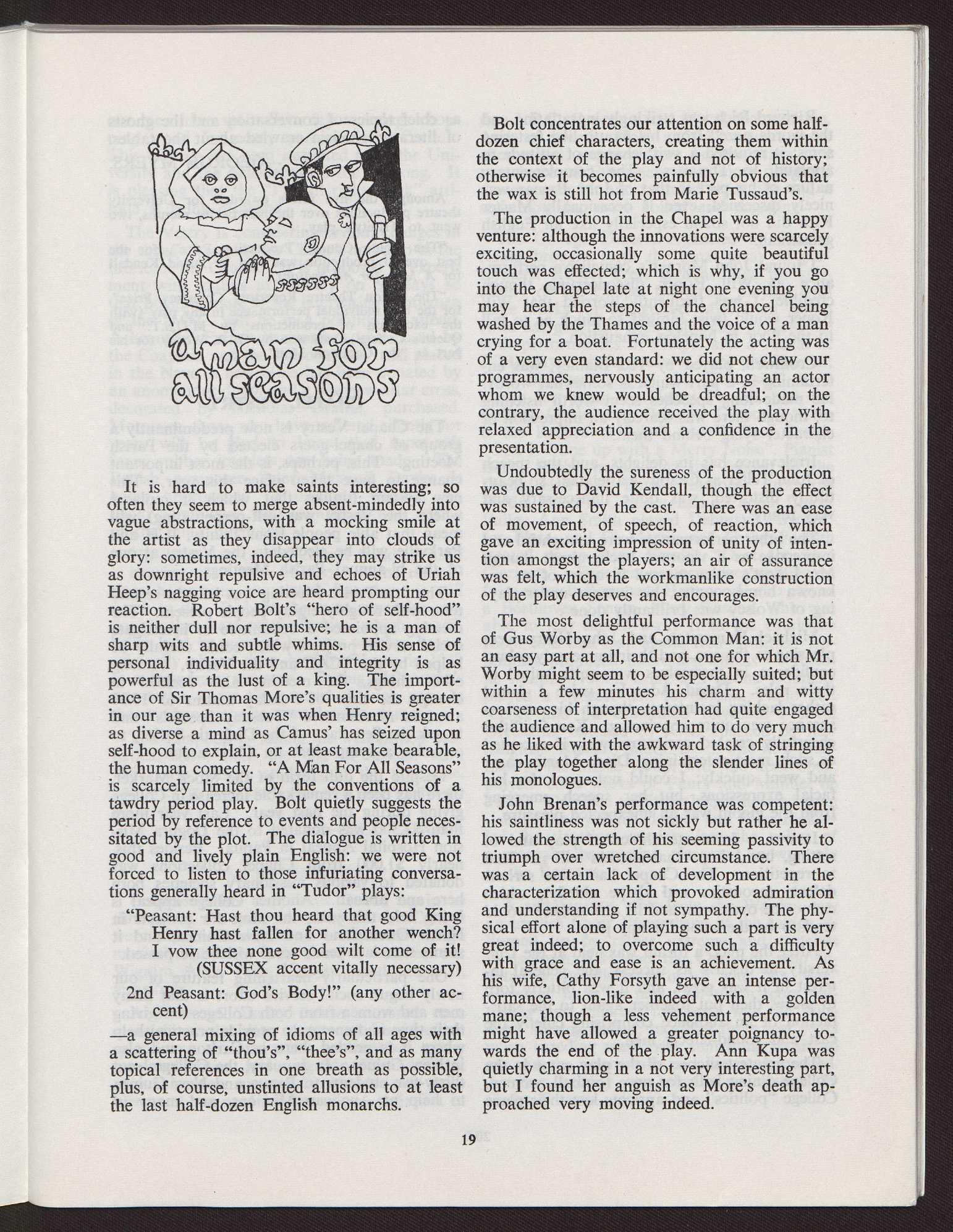
It is hard to make saints interesting; so often they seem to merge absent-mindedly into vague abstractions, with a mocking smile at the artist as they disappear into clouds of glory: sometimes, indeed, they may strike us as downright repulsive and echoes of Uriah Heep's nagging voice are heard prompting our reaction. Robert Bolt's "hero of self-hood" is neither dull nor repulsive; he is a man of sharp wits and subtle whims. His sense of personal individuality and integrity is as powerful as the lust of a king. The importance of Sir Thomas More's qualities is greater in our age than it was when Henry reigned; as diverse a mind as Camus' has seized upon self-hood to explain, or at least make bearable, the human comedy. "A Man For All Seasons" is scarcely limited by the conventions of a tawdry period play. Bolt quietly suggests the period by reference to events and people necessitated by the plot. The dialogue is written in good and lively plain English: we were not forced to listen to those infuriating conversations generally heard in "Tudor" plays:
"Peasant: Hast thou heard that good King Henry hast fallen for another wench? I vow thee none good wilt come of it!
(SUSSEX accent vitally necessary)
2nd Peasant: God's Body!" (any other accent)
—a general mixing of idioms of all ages with a scattering of "thou's", "thee's", and as many topical references in one breath as possible, plus, of course, unstinted allusions to at least the last half-dozen English monarchs.
Bolt concentrates our attention on some halfdozen chief characters, creating them within the context of the play and not of history; otherwise it becomes painfully obvious that the wax is still hot from Marie Tussaud's.
The production in the Chapel was a happy venture: although the innovations were scarcely exciting, occasionally some quite beautiful touch was effected; which is why, if you go into the Chapel late at night one evening you may hear the steps of the chancel being washed by the Thames and the voice of a man crying for a boat. Fortunately the acting was of a very even standard: we did not chew our programmes, nervously anticipating an actor whom we knew would be dreadful; on the contrary, the audience received the play with relaxed appreciation and a confidence in the presentation.
Undoubtedly the sureness of the production was due to David Kendall, though the effect was sustained by the cast. There was an ease of movement, of speech, of reaction, which gave an exciting impression of unity of intention amongst the players; an air of assurance was felt, which the workmanlike construction of the play deserves and encourages.
The most delightful performance was that of Gus Worby as the Common Man: it is not an easy part at all, and not one for which Mr. Worby might seem to be especially suited; but within a few minutes his charm and witty coarseness of interpretation had quite engaged the audience and allowed him to do very much as he liked with the awkward task of stringing the play together along the slender lines of his monologues.
John Brenan's performance was competent: his saintliness was not sickly but rather he allowed the strength of his seeming passivity to triumph over wretched circumstance. There was a certain lack of development in the characterization which provoked admiration and understanding if not sympathy. The physical effort alone of playing such a part is very great indeed; to overcome such a difficulty with grace and ease is an achievement. As his wife, Cathy Forsyth gave an intense performance, lion-like indeed with a golden mane; though a less vehement performance might have allowed a greater poignancy towards the end of the play. Ann Kupa was quietly charming in a not very interesting part, but I found her anguish as More's death approached very moving indeed.
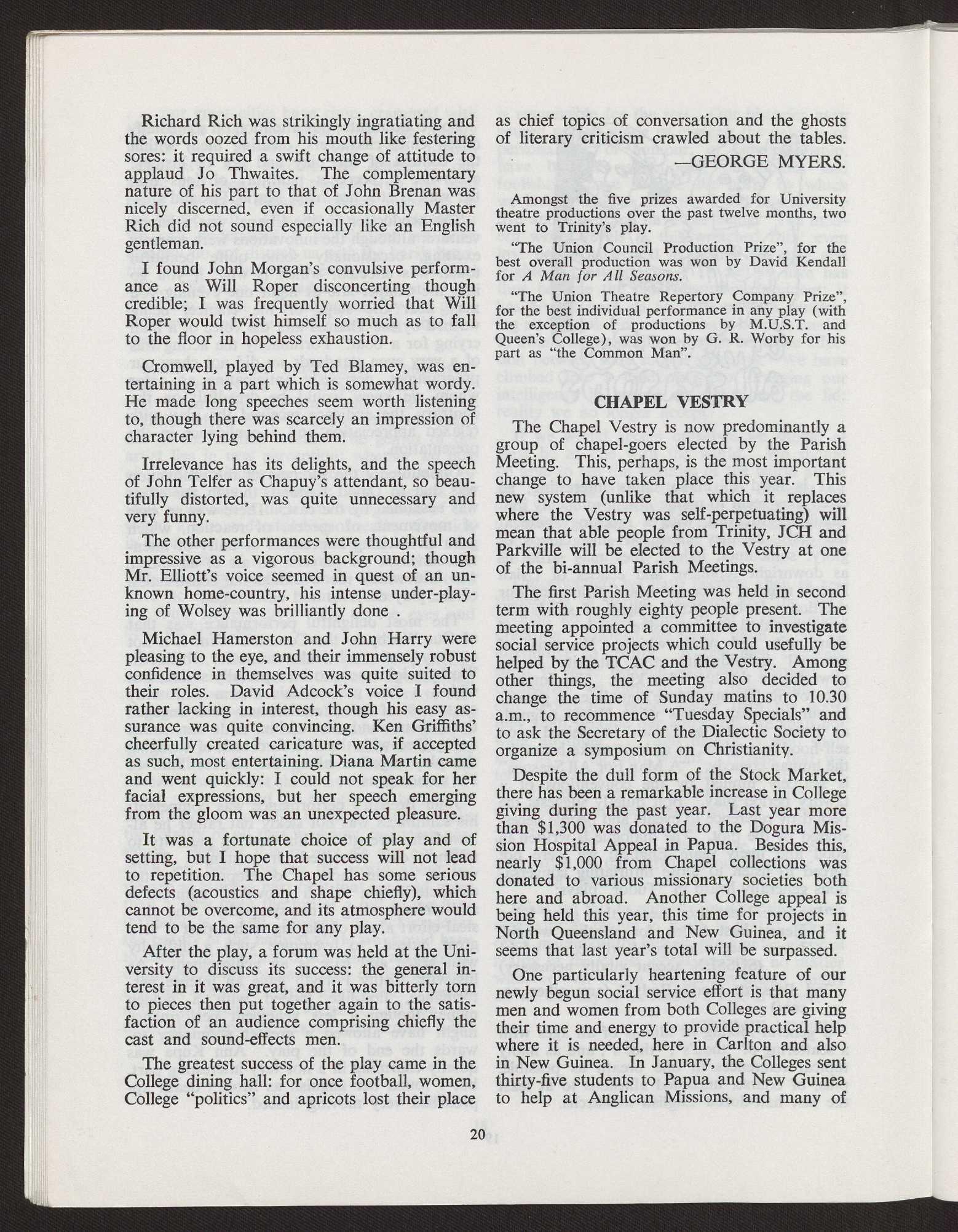
Richard Rich was strikingly ingratiating and the words oozed from his mouth like festering sores: it required a swift change of attitude to applaud Jo Thwaites. The complementary nature of his part to that of John Brenan was nicely discerned, even if occasionally Master Rich did not sound especially like an English gentleman.
I found John Morgan's convulsive performance as Will Roper disconcerting though credible; I was frequently worried that Will Roper would twist himself so much as to fall to the floor in hopeless exhaustion.
Cromwell, played by Ted Blamey, was entertaining in a part which is somewhat wordy. He made long speeches seem worth listening to, though there was scarcely an impression of character lying behind them.
Irrelevance has its delights, and the speech of John Telfer as Chapuy's attendant, so beautifully distorted, was quite unnecessary and very funny.
The other performances were thoughtful and impressive as a vigorous background; though Mr. Elliott's voice seemed in quest of an unknown home-country, his intense under-playing of Wolsey was brilliantly done .
Michael Hamerston and John Harry were pleasing to the eye, and their immensely robust confidence in themselves was quite suited to their roles. David Adcock's voice I found rather lacking in interest, though his easy assurance was quite convincing. Ken Griffiths' cheerfully created caricature was, if accepted as such, most entertaining. Diana Martin came and went quickly: I could not speak for her facial expressions, but her speech emerging from the gloom was an unexpected pleasure.
It was a fortunate choice of play and of setting, but I hope that success will not lead to repetition. The Chapel has some serious defects (acoustics and shape chiefly), which cannot be overcome, and its atmosphere would tend to be the same for any play.
After the play, a forum was held at the University to discuss its success: the general interest in it was great, and it was bitterly torn to pieces then put together again to the satisfaction of an audience comprising chiefly the cast and sound-effects men.
The greatest success of the play came in the College dining hall: for once football, women, College "politics" and apricots lost their place
as chief topics of conversation and the ghosts of literary criticism crawled about the tables.
—GEORGE MYERS.
Amongst the five prizes awarded for University theatre productions over the past twelve months, two went to Trinity's play.
"The Union Council Production Prize", for the best overall production was won by David Kendall for A Man for All Seasons.
"The Union Theatre Repertory Company Prize", for the best individual performance in any play (with the exception of productions by M.U.S.T. and Queen's College), was won by G. R. Worby for his part as "the Common Man".
The Chapel Vestry is now predominantly a group of chapel-goers elected by the Parish Meeting. This, perhaps, is the most important change to have taken place this year. This new system (unlike that which it replaces where the Vestry was self-perpetuating) will mean that able people from Trinity, JCH and Parkville will be elected to the Vestry at one of the bi-annual Parish Meetings.
The first Parish Meeting was held in second term with roughly eighty people present. The meeting appointed a committee to investigate social service projects which could usefully be helped by the TCAC and the Vestry. Among other things, the meeting also decided to change the time of Sunday matins to 10.30 a.m., to recommence "Tuesday Specials" and to ask the Secretary of the Dialectic Society to organize a symposium on Christianity.
Despite the dull form of the Stock Market, there has been a remarkable increase in College giving during the past year. Last year more than $1,300 was donated to the Dogura Mission Hospital Appeal in Papua. Besides this, nearly $1,000 from Chapel collections was donated to various missionary societies both here and abroad. Another College appeal is being held this year, this time for projects in North Queensland and New Guinea, and it seems that last year's total will be surpassed.
One particularly heartening feature of our newly begun social service effort is that many men and women from both Colleges are giving their time and energy to provide practical help where it is needed, here in Carlton and also in New Guinea. In January, the Colleges sent thirty-five students to Papua and New Guinea to help at Anglican Missions, and many of
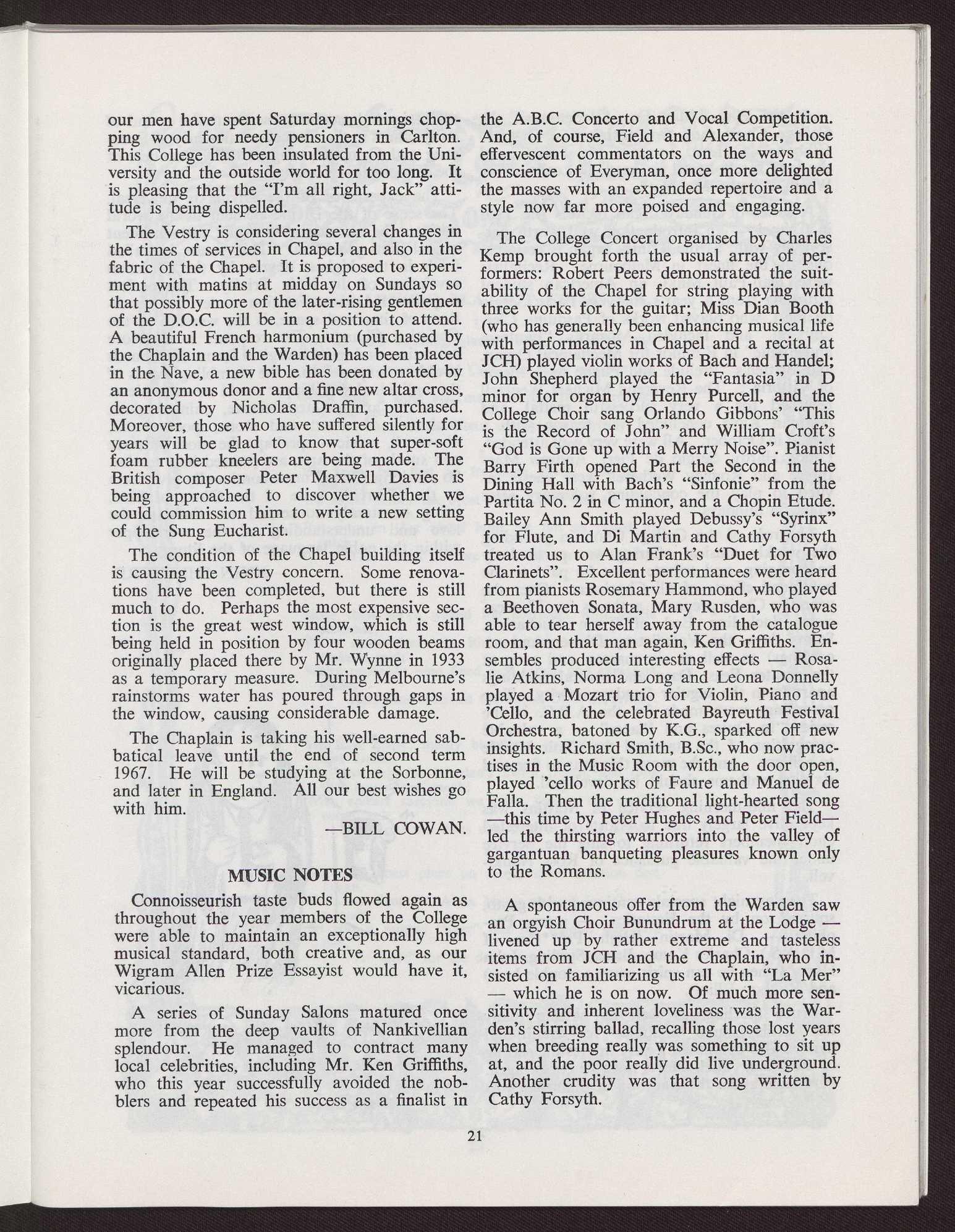
our men have spent Saturday mornings chopping wood for needy pensioners in Carlton. This College has been insulated from the University and the outside world for too long. It is pleasing that the "I'm all right, Jack" attitude is being dispelled.
The Vestry is considering several changes in the times of services in Chapel, and also in the fabric of the Chapel. It is proposed to experiment with matins at midday on Sundays so that possibly more of the later-rising gentlemen of the D.O.C. will be in a position to attend. A beautiful French harmonium (purchased by the Chaplain and the Warden) has been placed in the Nave, a new bible has been donated by an anonymous donor and a fine new altar cross, decorated by Nicholas Draffin, purchased. Moreover, those who have suffered silently for years will be glad to know that super-soft foam rubber kneelers are being made. The British composer Peter Maxwell Davies is being approached to discover whether we could commission him to write a new setting of the Sung Eucharist.
The condition of the Chapel building itself is causing the Vestry concern. Some renovations have been completed, but there is still much to do. Perhaps the most expensive section is the great west window, which is still being held in position by four wooden beams originally placed there by Mr. Wynne in 1933 as a temporary measure. During Melbourne's rainstorms water has poured through gaps in the window, causing considerable damage.
The Chaplain is taking his well-earned sabbatical leave until the end of second term 1967. He will be studying at the Sorbonne, and later in England. All our best wishes go with him.
—BILLCOWAN.
Connoisseurish taste buds flowed again as throughout the year members of the College were able to maintain an exceptionally high musical standard, both creative and, as our Wigram Allen Prize Essayist would have it, vicarious.
A series of Sunday Salons matured once more from the deep vaults of Nankivellian splendour. He managed to contract many local celebrities, including Mr. Ken Griffiths, who this year successfully avoided the nobblers and repeated his success as a finalist in
the A.B.C. Concerto and Vocal Competition. And, of course, Field and Alexander, those effervescent commentators on the ways and conscience of Everyman, once more delighted the masses with an expanded repertoire and a style now far more poised and engaging.
The College Concert organised by Charles Kemp brought forth the usual array of performers: Robert Peers demonstrated the suitability of the Chapel for string playing with three works for the guitar; Miss Dian Booth (who has generally been enhancing musical life with performances in Chapel and a recital at JCH) played violin works of Bach and Handel; John Shepherd played the "Fantasia" in D minor for organ by Henry Purcell, and the College Choir sang Orlando Gibbons' "This is the Record of John" and William Croft's "God is Gone up with a Merry Noise". Pianist Barry Firth opened Part the Second in the Dining Hall with Bach's "Sinfonie" from the Partita No. 2 in C minor, and a Chopin Etude. Bailey Ann Smith played Debussy's "Syrinx" for Flute, and Di Martin and Cathy Forsyth treated us to Alan Frank's "Duet for Two Clarinets". Excellent performances were heard from pianists Rosemary Hammond, who played a Beethoven Sonata, Mary Rusden, who was able to tear herself away from the catalogue room, and that man again, Ken Griffiths. Ensembles produced interesting effects — Rosalie Atkins, Norma Long and Leona Donnelly played a Mozart trio for Violin, Piano and 'Cello, and the celebrated Bayreuth Festival Orchestra, batoned by K.G.> sparked off new insights. Richard Smith, B.Sc., who now practises in the Music Room with the door open, played 'cello works of Faure and Manuel de Falla. Then the traditional light-hearted song —this time by Peter Hughes and Peter Field— led the thirsting warriors into the valley of gargantuan banqueting pleasures known only to the Romans.
A spontaneous offer from the Warden saw an orgyish Choir Bunundrum at the Lodge — livened up by rather extreme and tasteless items from JCH and the Chaplain, who insisted on familiarizing us all with "La Mer" — which he is on now. Of much more sensitivity and inherent loveliness was the Warden's stirring ballad, recalling those lost years when breeding really was something to sit up at, and the poor really did live underground. Another crudity was that song written by Cathy Forsyth.
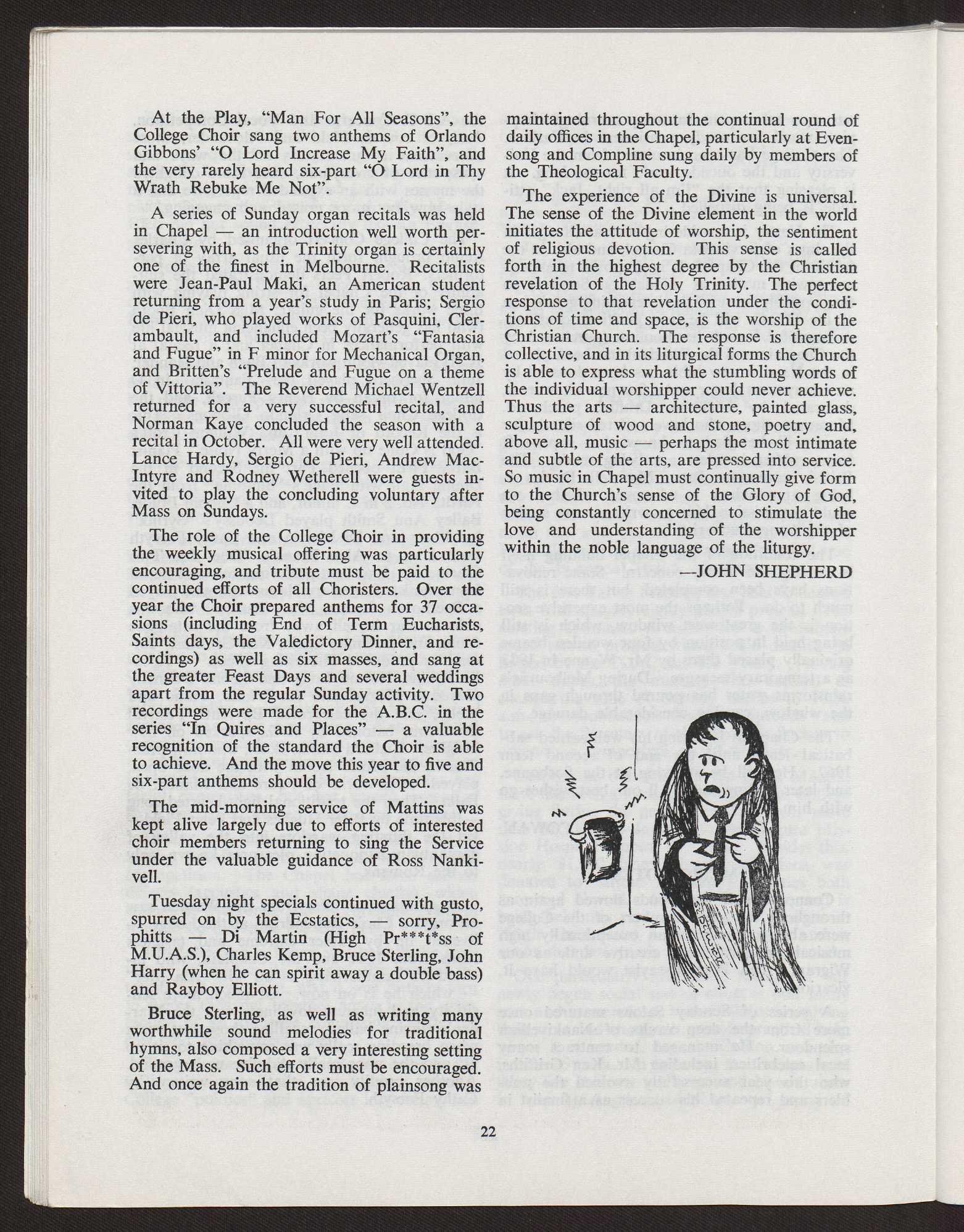
At the Play, "Man For All Seasons", the College Choir sang two anthems of Orlando Gibbons' "O Lord Increase My Faith", and the very rarely heard six-part "O Lord in Thy Wrath Rebuke Me Not".
A series of Sunday organ recitals was held in Chapel — an introduction well worth persevering with, as the Trinity organ is certainly one of the finest in Melbourne. Recitalists were Jean-Paul Maki, an American student returning from a year's study in Paris; Sergio de Pieri, who played works of Pasquini, Clerambault, and included Mozart's "Fantasia and Fugue" in F minor for Mechanical Organ, and Britten's "Prelude and Fugue on a theme of Vittoria". The Reverend Michael Wentzell returned for a very successful recital, and Norman Kaye concluded the season with a recital in October. All were very well attended. Lance Hardy, Sergio de Pieri, Andrew MacIntyre and Rodney Wetherell were guests invited to play the concluding voluntary after Mass on Sundays.
The role of the College Choir in providing the weekly musical offering was particularly encouraging, and tribute must be paid to the continued efforts of all Choristers. Over the year the Choir prepared anthems for 37 occasions (including End of Term Eucharists, Saints days, the Valedictory Dinner, and recordings) as well as six masses, and sang at the greater Feast Days and several weddings apart from the regular Sunday activity. Two recordings were made for the A.B.C. in the series "In Quires and Places" — a valuable recognition of the standard the Choir is able to achieve. And the move this year to five and six-part anthems should be developed.
The mid-morning service of Mattins was kept alive largely due to efforts of interested choir members returning to sing the Service under the valuable guidance of Ross Nankivell.
Tuesday night specials continued with gusto, spurred on by the Ecstatics, — sorry, Prophitts — Di Martin (High Pr***t*ss of M.U.A.S.), Charles Kemp, Bruce Sterling, John Harry (when he can spirit away a double bass) and Rayboy Elliott.
Bruce Sterling, as well as writing many worthwhile sound melodies for traditional hymns, also composed a very interesting setting of the Mass. Such efforts must be encouraged. And once again the tradition of plainsong was
maintained throughout the continual round of daily offices in the Chapel, particularly at Evensong and Compline sung daily by members of the Theological Faculty.
The experience of the Divine is universal. The sense of the Divine element in the world initiates the attitude of worship, the sentiment of religious devotion. This sense is called forth in the highest degree by the Christian revelation of the Holy Trinity. The perfect response to that revelation under the conditions of time and space, is the worship of the Christian Church. The response is therefore collective, and in its liturgical forms the Church is able to express what the stumbling words of the individual worshipper could never achieve. Thus the arts — architecture, painted glass, sculpture of wood and stone, poetry and, above all, music — perhaps the most intimate and subtle of the arts, are pressed into service. So music in Chapel must continually give form to the Church's sense of the Glory of God, being constantly concerned to stimulate the love and understanding of the worshipper within the noble language of the liturgy.
—JOHN SHEPHERD
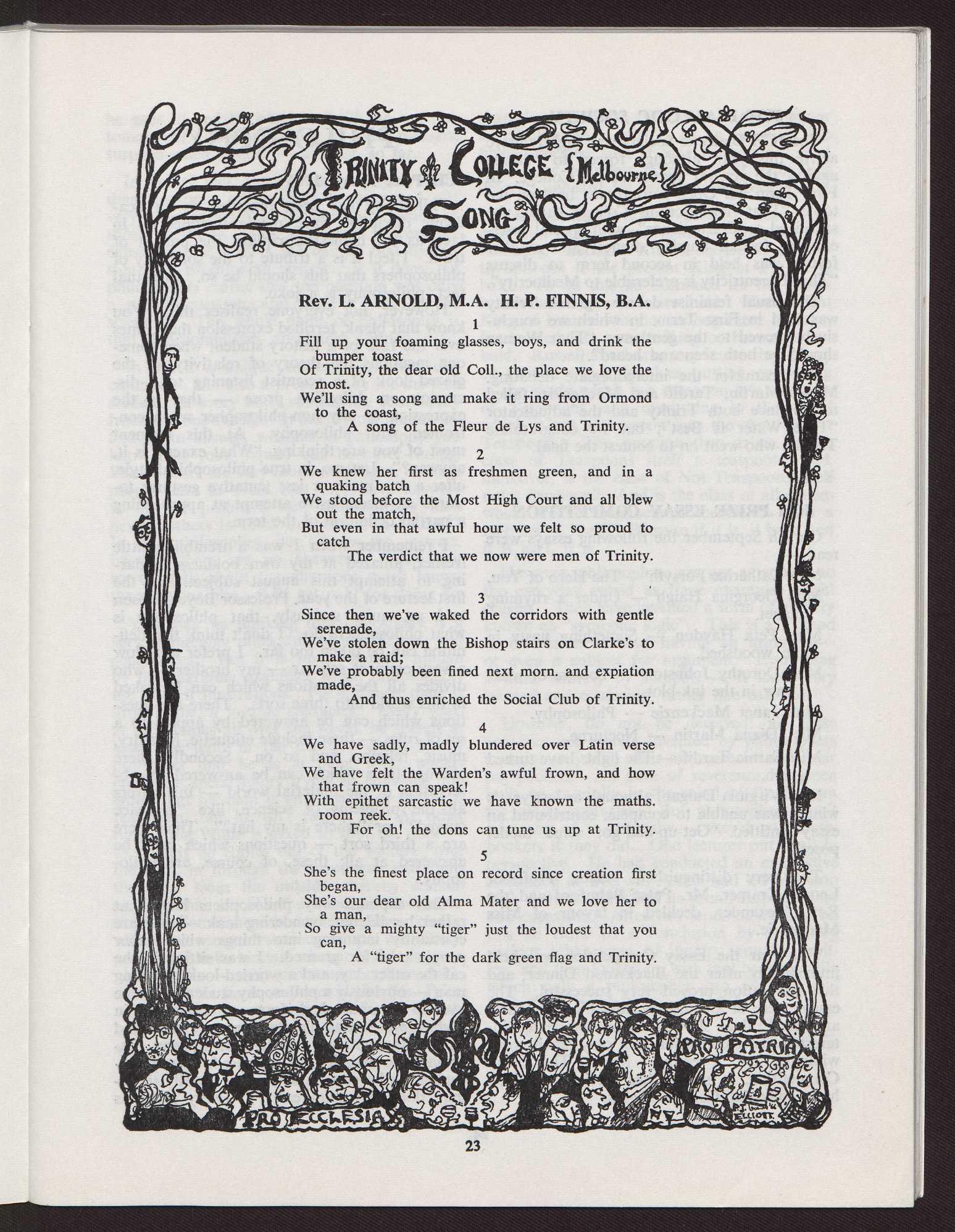
1
Fill up your foaming glasses, boys, and drink the bumper toast Of Trinity, the dear old Coll., the place we love the most.
We'll sing a song and make it ring from Ormond to the coast, A song of the Fleur de Lys and Trinity.
2
We knew her first as freshmen green, and in a quaking batch
We stood before the Most High Court and all blew out the match, But even in that awful hour we felt so proud to catch
The verdict that we now were men of Trinity.
3
Since then we've waked the corridors with gentle serenade,
We've stolen down the Bishop stairs on Clarke's to make a raid;
We've probably been fined next morn. and expiation made, And thus enriched the Social Club of Trinity.
4
We have sadly, madly blundered over Latin verse and Greek, We have felt the Warden's awful frown, and how that frown can speak! With epithet sarcastic we have known the maths. room reek.
For oh! the dons can tune us up at Trinity.
5
She's the finest place on record since creation first began,
She's our dear old Alma Mater and we love her to a man, So give a mighty "tiger" just the loudest that you can,
A "tiger" for the dark green flag and Trinity.
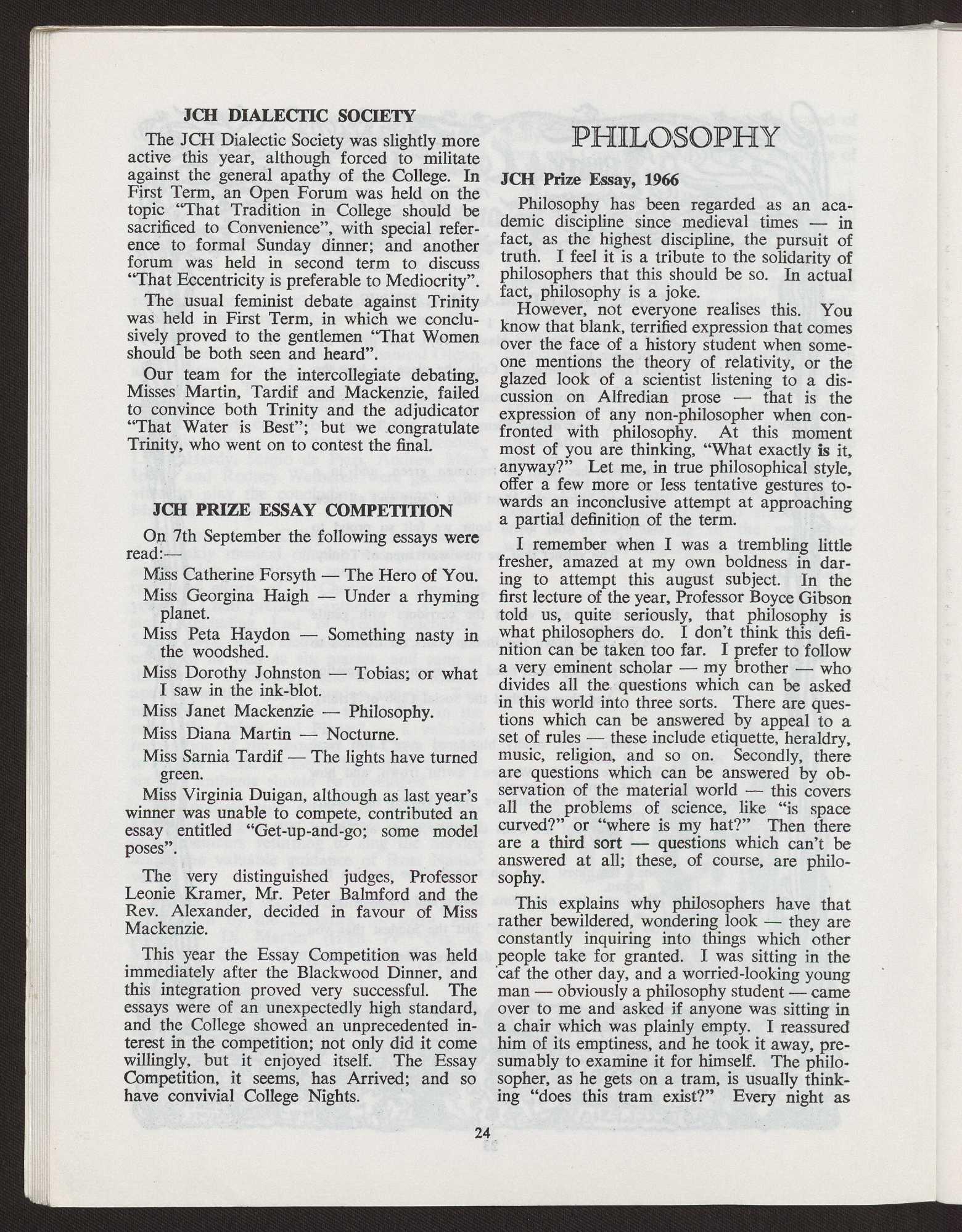
The JCH Dialectic Society was slightly more active this year, although forced to militate against the general apathy of the College. In First Term, an Open Forum was held on the topic "That Tradition in College should be sacrificed to Convenience", with special reference to formal Sunday dinner; and another forum was held in second term to discuss "That Eccentricity is preferable to Mediocrity".
The usual feminist debate against Trinity was held in First Term, in which we conclusively proved to the gentlemen "That Women should be both seen and heard".
Our team for the intercollegiate debating, Misses Martin, Tardif and Mackenzie, failed to convince both Trinity and the adjudicator "That Water is Best"; but we congratulate Trinity, who went on to contest the final.
On 7th September the following essays were read:—
Miss Catherine Forsyth — The Hero of You.
Miss Georgina Haigh — Under a rhyming planet.
Miss Peta Haydon — Something nasty in the woodshed.
Miss Dorothy Johnston — Tobias; or what I saw in the ink-blot.
Miss Janet Mackenzie — Philosophy.
Miss Diana Martin — Nocturne.
Miss Sarnia Tardif — The lights have turned green.
Miss Virginia Duigan, although as last year's winner was unable to compete, contributed an essay entitled "Get-up-and-go; some model poses".
The very distinguished judges, Professor Leonie Kramer, Mr. Peter Baimford and the Rev. Alexander, decided in favour of Miss Mackenzie.
This year the Essay Competition was held immediately after the Blackwood Dinner, and this integration proved very successful. The essays were of an unexpectedly high standard, and the College showed an unprecedented interest in the competition; not only did it come willingly, but it enjoyed itself. The Essay Competition, it seems, has Arrived; and so have convivial College Nights.
JCH Prize Essay, 1966
Philosophy has been regarded as an academic discipline since medieval times — in fact, as the highest discipline, the pursuit of truth. I feel it is a tribute to the solidarity of philosophers that this should be so. In actual fact, philosophy is a joke.
However, not everyone realises this. You know that blank, terrified expression that comes over the face of a history student when someone mentions the theory of relativity, or the glazed look of a scientist listening to a discussion on Alfredian prose — that is the expression of any non-philosopher when confronted with philosophy. At this moment most of you are thinking, "What exactly is it, anyway?" Let me, in true philosophical style, offer a few more or less tentative gestures towards an inconclusive attempt at approaching a partial definition of the term.
I remember when I was a trembling little fresher, amazed at my own boldness in daring to attempt this august subject. In the first lecture of the year, Professor Boyce Gibson told us, quite seriously, that philosophy is what philosophers do. I don't think this definition can be taken too far. I prefer to follow a very eminent scholar — my brother — who divides all the questions which can be asked in this world into three sorts. There are questions which can be answered by appeal to a set of rules — these include etiquette, heraldry, music, religion, and so on. Secondly, there are questions which can be answered by observation of the material world — this covers all the problems of science, like "is space curved?" or "where is my hat?" Then there are a third sort — questions which can't be answered at all; these, of course, are philosophy.
This explains why philosophers have that rather bewildered, wondering look — they are constantly inquiring into things which other people take for granted. I was sitting in the caf the other day, and a worried-looking young man — obviously a philosophy student — came over to me and asked if anyone was sitting in a chair which was plainly empty. I reassured him of its emptiness, and he took it away, presumably to examine it for himself. The philosopher, as he gets on a tram, is usually thinking "does this tram exist?" Every night as
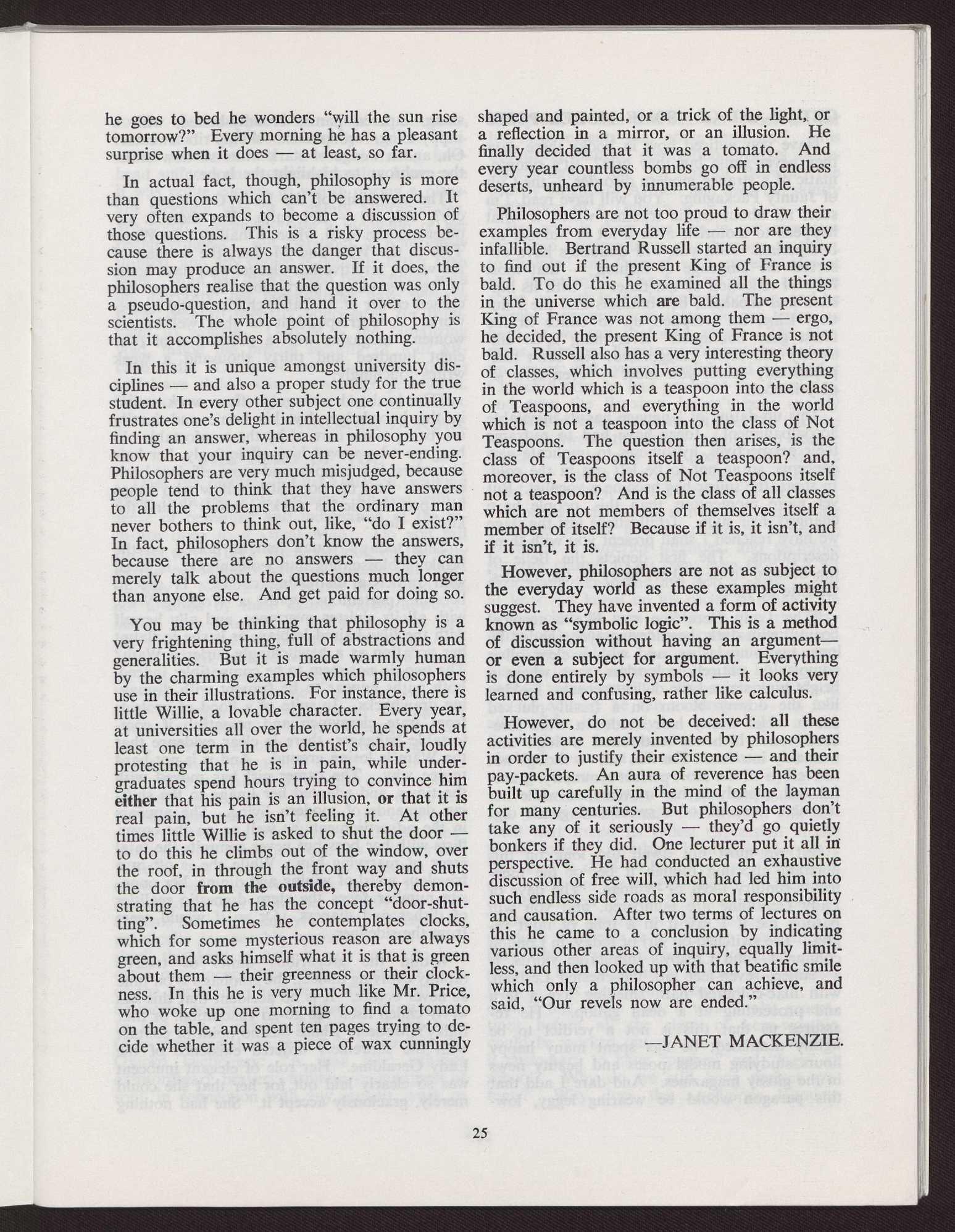
he goes to bed he wonders "will the sun rise tomorrow?" Every morning he has a pleasant surprise when it does — at least, so far.
In actual fact, though, philosophy is more than questions which can't be answered. It very often expands to become a discussion of those questions. This is a risky process because there is always the danger that discussion may produce an answer. If it does, the philosophers realise that the question was only a pseudo-question, and hand it over to the scientists. The whole point of philosophy is that it accomplishes absolutely nothing.
In this it is unique amongst university disciplines — and also a proper study for the true student. In every other subject one continually frustrates one's delight in intellectual inquiry by finding an answer, whereas in philosophy you know that your inquiry can be never-ending. Philosophers are very much misjudged, because people tend to think that they have answers to all the problems that the ordinary man never bothers to think out, like, "do I exist?"
In fact, philosophers don't know the answers, because there are no answers — they can merely talk about the questions much longer than anyone else. And get paid for doing so.
You may be thinking that philosophy is a very frightening thing, full of abstractions and generalities. But it is made warmly human by the charming examples which philosophers use in their illustrations. For instance, there is little Willie, a lovable character. Every year, at universities all over the world, he spends at least one term in the dentist's chair, loudly protesting that he is in pain, while undergraduates spend hours trying to convince him either that his pain is an illusion, or that it is real pain, but he isn't feeling it. At other times little Willie is asked to shut the door — to do this he climbs out of the window, over the roof, in through the front way and shuts the door from the outside, thereby demonstrating that he has the concept "door-shutting". Sometimes he contemplates clocks, which for some mysterious reason are always green, and asks himself what it is that is green about them — their greenness or their clockness. In this he is very much like Mr. Price, who woke up one morning to find a tomato on the table, and spent ten pages trying to decide whether it was a piece of wax cunningly
shaped and painted, or a trick of the light, or a reflection in a mirror, or an illusion. He finally decided that it was a tomato. And every year countless bombs go off in endless deserts, unheard by innumerable people.
Philosophers are not too proud to draw their examples from everyday life — nor are they infallible. Bertrand Russell started an inquiry to find out if the present King of France is bald. To do this he examined all the things in the universe which are bald. The present King of France was not among them — ergo, he decided, the present King of France is not bald. Russell also has a very interesting theory of classes, which involves putting everything in the world which is a teaspoon into the class of Teaspoons, and everything in the world which is not a teaspoon into the class of Not Teaspoons. The question then arises, is the class of Teaspoons itself a teaspoon? and, moreover, is the class of Not Teaspoons itself not a teaspoon? And is the class of all classes which are not members of themselves itself a member of itself? Because if it is, it isn't, and if it isn't, it is.
However, philosophers are not as subject to the everyday world as these examples might suggest. They have invented a form of activity known as "symbolic logic". This is a method of discussion without having an argument— or even a subject for argument. Everything is done entirely by symbols — it looks very learned and confusing, rather like calculus.
However, do not be deceived: all these activities are merely invented by philosophers in order to justify their existence — and their pay-packets. An aura of reverence has been built up carefully in the mind of the layman for many centuries. But philosophers don't take any of it seriously — they'd go quietly bonkers if they did. One lecturer put it all hi perspective. He had conducted an exhaustive discussion of free will, which had led him into such endless side roads as moral responsibility and causation. After two terms of lectures on this he came to a conclusion by indicating various other areas of inquiry, equally limitless, and then looked up with that beatific smile which only a philosopher can achieve, and said, "Our revels now are ended."
—JANET MACKENZIE.
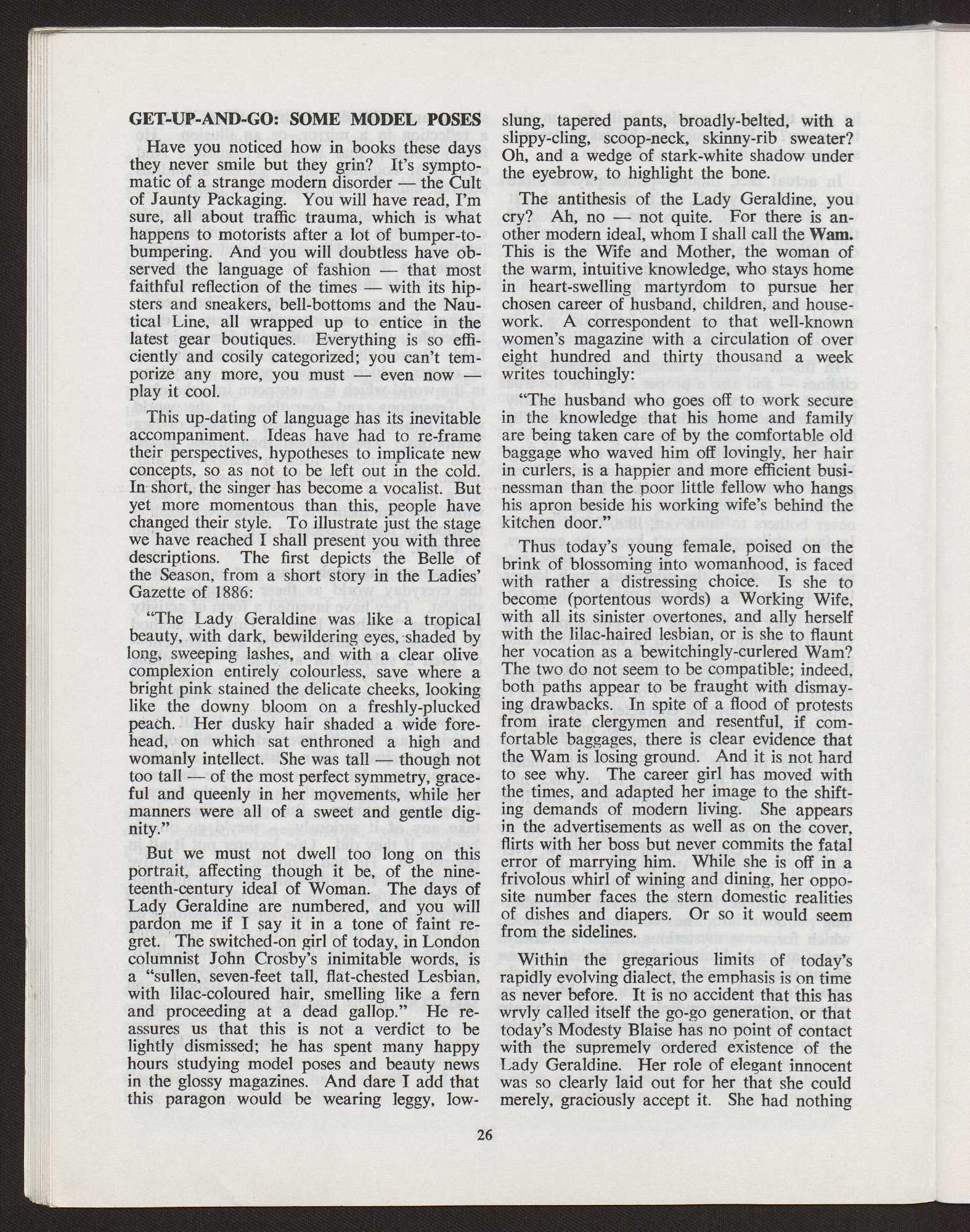
Have you noticed how in books these days they never smile but they grin? It's symptomatic of a strange modern disorder — the Cult of Jaunty Packaging. You will have read, I'm sure, all about traffic trauma, which is what happens to motorists after a lot of bumper-tobumpering. And you will doubtless have observed the language of fashion — that most faithful reflection of the times — with its hipsters and sneakers, bell-bottoms and the Nautical Line, all wrapped up to entice in the latest gear boutiques. Everything is so efficiently and cosily categorized; you can't temporize any more, you must — even now — play it cool.
This up-dating of language has its inevitable accompaniment. Ideas have had to re-frame their perspectives, hypotheses to implicate new concepts, so as not to be left out in the cold. In short, the singer has become a vocalist. But yet more momentous than this, people have changed their style. To illustrate just the stage we have reached I shall present you with three descriptions. The first depicts the Belle of the Season, from a short story in the Ladies' Gazette of 1886:
"The Lady Geraldine was like a tropical beauty, with dark, bewildering eyes, shaded by long, sweeping lashes, and with a clear olive complexion entirely colourless, save where a bright pink stained the delicate cheeks, looking like the downy bloom on a freshly-plucked peach. Her dusky hair shaded a wide forehead, on which sat enthroned a high and womanly intellect. She was tall — though not too tall— of the most perfect symmetry, graceful and queenly in her movements, while her manners were all of a sweet and gentle dignity."
But we must not dwell too long on this portrait, affecting though it be, of the nineteenth-century ideal of Woman. The days of Lady Geraldine are numbered, and you will pardon me if I say it in a tone of faint regret. The switched-on girl of today, in London columnist John Crosby's inimitable words, is a "sullen, seven-feet tall, flat-chested Lesbian, with lilac-coloured hair, smelling like a fern and proceeding at a dead gallop." He reassures us that this is not a verdict to be lightly dismissed; he has spent many happy hours studying model poses and beauty news in the glossy magazines. And dare I add that this paragon would be wearing leggy, low-
slung, tapered pants, broadly-belted, with a slippy-cling, scoop-neck, skinny-rib sweater? Oh, and a wedge of stark-white shadow under the eyebrow, to highlight the bone.
The antithesis of the Lady Geraldine, you cry? Ah, no — not quite. For there is another modern ideal, whom I shall call the Wam. This is the Wife and Mother, the woman of the warm, intuitive knowledge, who stays home in heart-swelling martyrdom to pursue her chosen career of husband, children, and housework. A correspondent to that well-known women's magazine with a circulation of over eight hundred and thirty thousand a week writes touchingly:
"The husband who goes off to work secure in the knowledge that his home and family are being taken care of by the comfortable old baggage who waved him off lovingly, her hair in curlers, is a happier and more efficient businessman than the poor little fellow who hangs his apron beside his working wife's behind the kitchen door."
Thus today's young female, poised on the brink of blossoming into womanhood, is faced with rather a distressing choice. Is she to become (portentous words) a Working Wife, with all its sinister overtones, and ally herself with the lilac-haired lesbian, or is she to flaunt her vocation as a bewitchingly-curlered Wam? The two do not seem to be compatible; indeed, both paths appear to be fraught with dismaying drawbacks. In spite of a flood of protests from irate clergymen and resentful, if comfortable baggages, there is clear evidence that the Warn is losing ground. And it is not hard to see why. The career girl has moved with the times, and adapted her image to the shifting demands of modern living. She appears in the advertisements as well as on the cover, flirts with her boss but never commits the fatal error of marrying him. While she is off in a frivolous whirl of wining and dining, her opposite number faces the stern domestic realities of dishes and diapers. Or so it would seem from the sidelines.
Within the gregarious limits of today's rapidly evolving dialect, the emphasis is on time as never before. It is no accident that this has wryly called itself the go-go generation, or that today's Modesty Blaise has no point of contact with the supremely ordered existence of the Lady Geraldine. Her role of elegant innocent was so clearly laid out for her that she could merely, graciously accept it. She had nothing

to do with today's most talked-of dilemma, and if that "high and womanly intellect" balanced so dexterously on the charming forehead suffered an occasional qualm, I am sure it was polite enough to vanish during a pleasant morning visit or a dainty afternoon tea. We could conceivably use a modicum of her resourcefulness. But boredom is notoriously ill-bred, and any choice is decidely better than none. Man has always been preoccupied with his mortality; her potentialities have perhaps never been so urgently vouchsafed for fulfilment to woman. Outside is the tantalizing void, inside the precise security of four kitchen walls. Let us do more dangerous things and leave child-rearing to another generation. Who knows, we might even win rave reviews.
Does the picture of Carl Ditterich, walking away from the VFL Tribunal, fill you with a sense of bewailing and indignation at the injustice done to a Great Man? Do you fall lifeless to the floor after one look on the telly of the paroxysmal jerks of angelic Paul McCartney? No? I must admit that I, too, am not affected by these figures which, however, inspire such extremes in our society that they are often called the heroes we worship. But to talk of hero-worship we must decide on our terms: can we regard "heroes" and "worship" as immutable constants, or have their concepts radically altered during the course of history? "Heroes" suggests warriors, lovers, and often nasty little prigs who battle against impossible odds, are drowned and are immortalised in the fifth grade reader. It would seem that to be a hero in the traditional sense one must possess the quality of valour; a belief in something and a determination to devote everything one has to its service. Whether you become a hero or remain a nonentity depends on two things: people must be interested in your principles (usually the more extreme the better) and you must be faced with practically insuperable opposition. To "worship" this kind of hero is easy; one can lose one's own inconsistencies in the steadfastness of the hero; for whatever he does, whether it be moral or immoral, he must be unwavering. In fact, for a concise definition of the hero to be worshipped, we cannot do better than the Oxford Dictionary: "A man who exhibits extraordinary bravery, firmness or greatness of soul, in connection with any pursuit, work or
enterprise; a man admired and venerated for his achievements and noble qualities." This beautifully phrased description suggests immediately figures like the warrior Beowulf, the courtly knights of Arthur, and even the saintly dedication of a Duncan.
But who is there like this in our own century who inspires us to pay homage to them, to "salute" and "regard with extreme respect and devotion"? The best we seem to have come up with is the Unknown Soldier, and he merely represents something we are trying as hard as we can to forget about. The Germans, after one disastrous attempt, have given up heroes; the cynical English had no use for Churchill after he had procured the Armistice, and even the Russians haven't been exactly constant in their affections. It could be that the socialist twenteith-century admits no major figure — even now few people visit Marx's grave — and it is no accident that Kennedy lived in the most capitalist nation in the world.
Modern man, having striven for years to get what he wanted, is not inclined to admit the existence of superior qualities, and therefore superior claims, to his own; even God is a bit exorbitant demanding five bob a week - but at least this keeps up his social standing. He is suspicious of men who don't play the dirty game of business, and he would scorn the soldier who could say, "A man cannot linger when his lord lies unavenged among the Vikings, he cannot value breath." The concept of dying for his country he can understand — its fate affects him intimately — but to fight to the death simply because of personal devotion to his lord seems just illusory nonsense. No man —especially a dead one — is worth dying for. We seem therefore to have not outgrown but discarded the basic man-to-man commitment that found its fullest expression in the feudal society. (We have been saying for years "the king is dead — long live us.") We must seek elsewhere for encouragement in the form of stimulation if we look on our political leaders with feelings of faint disgust. And if Graham Kennedy is to become our national hero, then let us dispense with them altogether. If modern man is truly self-satisfied he will look no further than the mirror; but even if this is the case, it would take generations before all the signs of hero-worship could be worked out of our society. Why is it customary to have "pashes" and "fags" at school? Why do we still have prefect systems? Why does the a-religious labourer
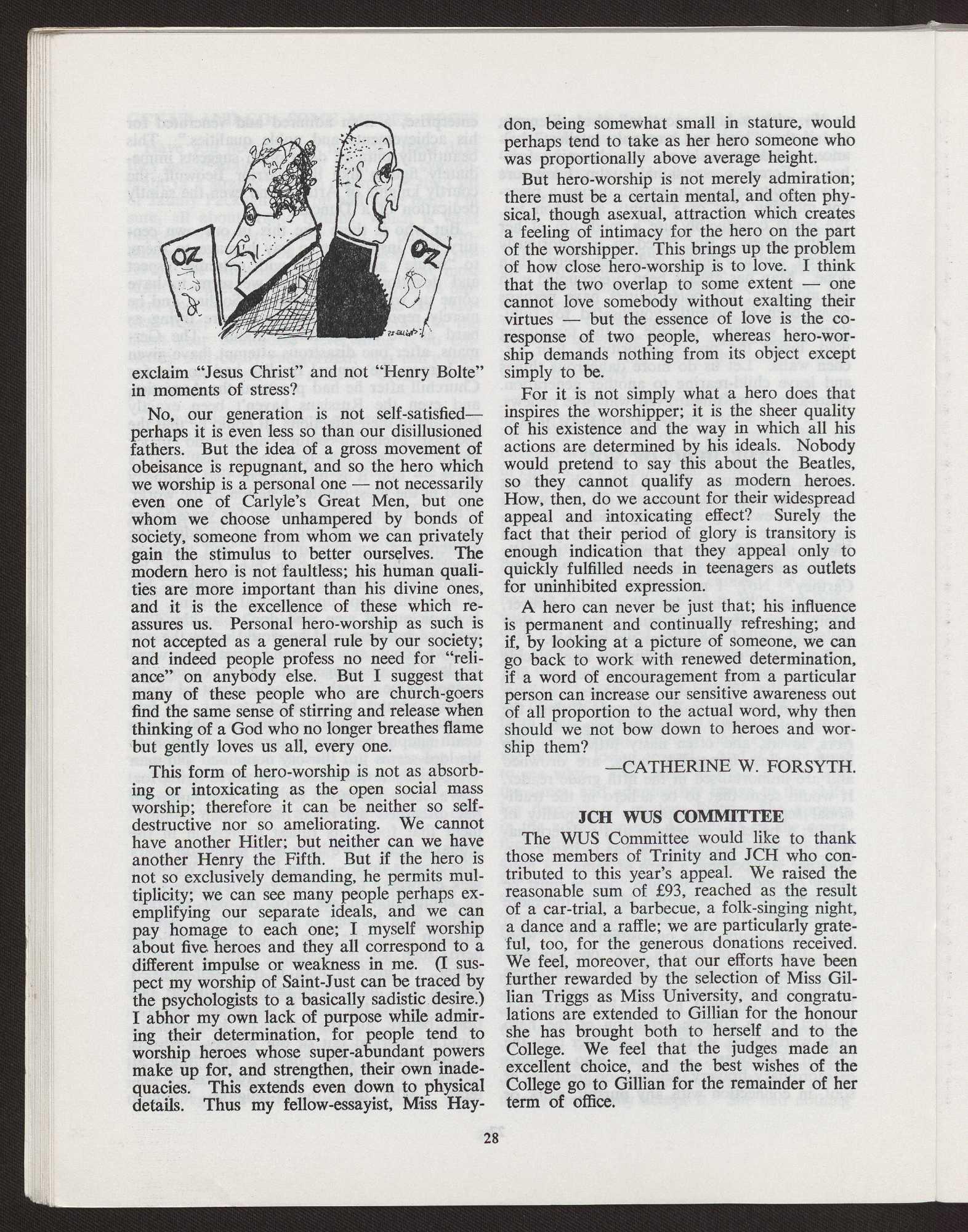
exclaim "Jesus Christ" and not "Henry Bolte" in moments of stress?
No, our generation is not self-satisfied— perhaps it is even less so than our disillusioned fathers. But the idea of a gross movement of obeisance is repugnant, and so the hero which we worship is a personal one — not necessarily even one of Carlyle's Great Men, but one whom we choose unhampered by bonds of society, someone from whom we can privately gain the stimulus to better ourselves. The modern hero is not faultless; his human qualities are more important than his divine ones, and it is the excellence of these which reassures us. Personal hero-worship as such is not accepted as a general rule by our society; and indeed people profess no need for "reliance" on anybody else. But I suggest that many of these people who are church-goers find the same sense of stirring and release when thinking of a God who no longer breathes flame but gently loves us all, every one.
This form of hero-worship is not as absorbing or intoxicating as the open social mass worship; therefore it can be neither so selfdestructive nor so ameliorating. We cannot have another Hitler; but neither can we have another Henry the Fifth. But if the hero is not so exclusively demanding, he permits multiplicity; we can see many people perhaps exemplifying our separate ideals, and we can pay homage to each one; I myself worship about five, heroes and they all correspond to a different impulse or weakness in me. (I suspect my worship of Saint-Just can be traced by the psychologists to a basically sadistic desire.) I abhor my own lack of purpose while admiring their determination, for people tend to worship heroes whose super-abundant powers make up for, and strengthen, their own inadequacies. This extends even down to physical details. Thus my fellow-essayist, Miss Hay-
don, being somewhat small in stature, would perhaps tend to take as her hero someone who was proportionally above average height.
But hero-worship is not merely admiration; there must be a certain mental, and often physical, though asexual, attraction which creates a feeling of intimacy for the hero on the part of the worshipper. This brings up the problem of how close hero-worship is to love. I think that the two overlap to some extent — one cannot love somebody without exalting their virtues — but the essence of love is the coresponse of two people, whereas hero-worship demands nothing from its object except simply to be.
For it is not simply what a hero does that inspires the worshipper; it is the sheer quality of his existence and the way in which all his actions are determined by his ideals. Nobody would pretend to say this about the Beatles, so they cannot qualify as modern heroes. How, then, do we account for their widespread appeal and intoxicating effect? Surely the fact that their period of glory is transitory is enough indication that they appeal only to quickly fulfilled needs in teenagers as outlets for uninhibited expression.
A hero can never be just that; his influence is permanent and continually refreshing; and if, by looking at a picture of someone, we can go back to work with renewed determination, if a word of encouragement from a particular person can increase our sensitive awareness out of all proportion to the actual word, why then should we not bow down to heroes and worship them?
—CATHERINE W. FORSYTH.
The WUS Committee would like to thank those members of Trinity and JCH who contributed to this year's appeal. We raised the reasonable sum of £93, reached as the result of a car-trial, a barbecue, a folk-singing night, a dance and a raffle; we are particularly grateful, too, for the generous donations received. We feel, moreover, that our efforts have been further rewarded by the selection of Miss Gillian Triggs as Miss University, and congratulations are extended to Gillian for the honour she has brought both to herself and to the College. We feel that the judges made an excellent choice, and the best wishes of the College go to Gillian for the remainder of her term of office.
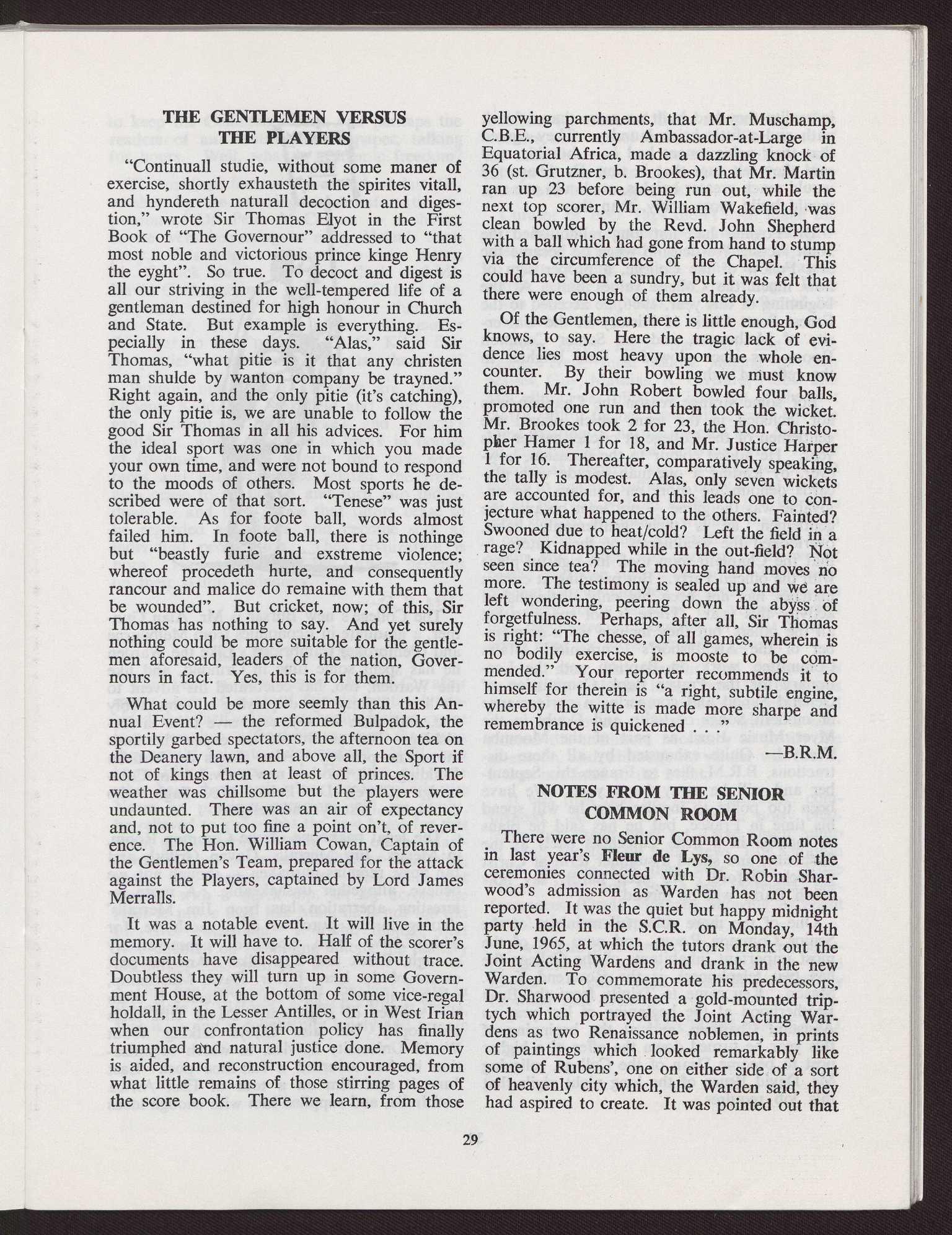
"Continual1 studie, without some maner of exercise, shortly exhausteth the spirites vitali, and hyndereth naturall decoction and digestion," wrote Sir Thomas Elyot in the First Book of "The Governour" addressed to "that most noble and victorious prince kinge Henry the eyght". So true. To decoct and digest is all our striving in the well-tempered life of a gentleman destined for high honour in Church and State. But example is everything. Especially in these days. "Alas," said Sir Thomas, "what pitie is it that any christen man shulde by wanton company be trayned." Right again, and the only pitie (it's catching), the only pitie is, we are unable to follow the good Sir Thomas in all his advices. For him the ideal sport was one in which you made your own time, and were not bound to respond to the moods of others. Most sports he described were of that sort. "Tenese" was just tolerable. As for foote ball, words almost failed him. In foote ball, there is nothinge but "beastly furie and exstreme violence; whereof procedeth hurte, and consequently rancour and malice do remaine with them that be wounded". But cricket, now; of this, Sir Thomas has nothing to say. And yet surely nothing could be more suitable for the gentlemen aforesaid, leaders of the nation, Governours in fact. Yes, this is for them.
What could be more seemly than this Annual Event? — the reformed Bulpadok, the sportily garbed spectators, the afternoon tea on the Deanery lawn, and above all, the Sport if not of kings then at least of princes. The weather was chillsome but the players were undaunted. There was an air of expectancy and, not to put too fine a point on't, of reverence. The Hon. William Cowan, Captain of the Gentlemen's Team, prepared for the attack against the Players, captained by Lord James Merralls.
It was a notable event. It will live in the memory. It will have to. Half of the scorer's documents have disappeared without trace. Doubtless they will turn up in some Government House, at the bottom of some vice-regal holdall, in the Lesser Antilles, or in West Irian when our confrontation policy has finally triumphed a`nd natural justice done. Memory is aided, and reconstruction encouraged, from what little remains of those stirring pages of the score book. There we learn, from those
yellowing parchments, that Mr. Muschamp, C.B.E., currently Ambassador-at-Large in Equatorial Africa, made a dazzling knock of 36 (st. Grutzner, b. Brookes), that Mr. Martin ran up 23 before being run out, while the next top scorer, Mr. William Wakefield, was clean bowled by the Revd. John Shepherd with a ball which had gone from hand to stump via the circumference of the Chapel. This could have been a sundry, but it was felt that there were enough of them already.
Of the Gentlemen, there is little enough, God knows, to say. Here the tragic lack of evidence lies most heavy upon the whole encounter. By their bowling we must know them. Mr. John Robert bowled four balls, promoted one run and then took the wicket. Mr. Brookes took 2 for 23, the Hon. Christopher Hamer 1 for 18, and Mr. Justice Harper 1 for 16. Thereafter, comparatively speaking, the tally is modest. Alas, only seven wickets are accounted for, and this leads one to conjecture what happened to the others. Fainted? Swooned due to heat/cold? Left the field in a rage? Kidnapped while in the out-field? Not seen since tea? The moving hand moves no more. The testimony is sealed up and we are left wondering, peering down the abyss of forgetfulness. Perhaps, after all, Sir Thomas is right: "The chesse, of all games, wherein is no bodily exercise, is mooste to be commended." Your reporter recommends it to himself for therein is "a right, subtile engine, whereby the witte is made more Sharpe and remembrance is quickened ..."
—B.R.M.
There were no Senior Common Room notes in last year's Fleur de Lys, so one of the ceremonies connected with Dr. Robin Sharwood's admission as Warden has not been reported. It was the quiet but happy midnight party held in the S.C.R. on Monday, 14th June, 1965, at which the tutors drank out the Joint Acting Wardens and drank in the new Warden. To commemorate his predecessors, Dr. Sharwood presented a gold-mounted triptych which portrayed the Joint Acting Wardens as two Renaissance noblemen, in prints of paintings which . looked remarkably like some of Rubens', one on either side of a sort of heavenly city which, the Warden said, they had aspired to create. It was pointed out that
in reality they had built no more than a brick path .and,a little brick laundry. They agreed that their achievement had been humble, and said they felt sure that in time Dr. Sharwood would reach greater heights, or should one say, would build more nobly, than they.
Dr. Poynter had not long relinquished the Joint Acting Wardenship when he became the first Fellow of the College, a proper sign of how much the College values him. At the beginning of this year, 1966, he acceded to the Ernest Scott Chair of History in the University of Melbourne, and our Senior Common Room has since glowed a little brighter in the reflected light.
For some strange reason the Chaplain was not included in the team which played the gentlemen of the College at cricket earlier this year. He added colour to the occasion, however, by leading a one-man parade with placards denouncing sport on Sundays. So enjoyable was the game. — not least because the gentlemen, as is their gentlemanly habit, overlooked the weaknesses of their tutors — that the Chaplain soon took his rightful place with the official Party. But parading at cricket matches has not been his only distinguished activity this year. There is not space to list all the others, but they include work as member of the Archbishop's Ecumenical Affairs Committee, work on Baptism and the Lectionary for , the Prayer Book Commission of General Synod and compering a performance of modern Songs of Faith and Doubt in the Myer Music Bowl as part of the Moomba Festival. Quite exhausted by all these distractions, B.R.M. flies to France this September and will be away for a year. We have been too polite . to inquire how . he will spend his time in France, but he has said he plans to indulge in a little Catechisis (sic!) at the Sorbonne, and spend a summer term at Christ Church, Oxford. We need hardly say how much Barry will be missed.
One of the more colourful members of the Senior Common Room, and now one of the most important inhabitants of the College (he has two telephones), is the Reverend K. B. Mason. Ken came to Trinity from the Bush Brotherhood at the beginning, of last year as Assistant Chaplain, and at the beginning of this year he turned down the offer of a higher post to become Dean of the College, relieving Mr. David Bruce of the long night vigils that this job requires.

The College's new Bursar is Mr. Alan Gunther, a graduate in Economics from Melbourne and (Pembroke) Cambridge. Like the Warden he has spent some time in Ormond, and like the Warden, too, has celebrated his advent to civilized Trinity by displaying a remarkably fine, and, dare we say, expensive taste in furnishing. But as Bursar we expect he finds money no problem. Alan shares the Vatican Building with another new arrival from Cambridge (Clare), Dr. Behan McCullagh, who dabbles in history and religion.
The legal backbone of the Common Room, in Messrs. Jim Merralls, Gavan Griffith and Ian Spry, remains unshaken — though not, we believe, altogether unshakeable. A more interesting aberration has been Jim Merralls' sharing in the purchase of a racehorse, for which have been acquired, conservatively enough, Black and Tan silks! Another part owner of the beast is Mr. David Muschamp, whose equestrian prowess on Phoebe is often the subject of comment. David still talks philosophy, but also enjoys talking about World University Service, in which organization he has assumed a full-time post. Last June it sent him on a tour of East Africa and India, and supplied him with enough ideas
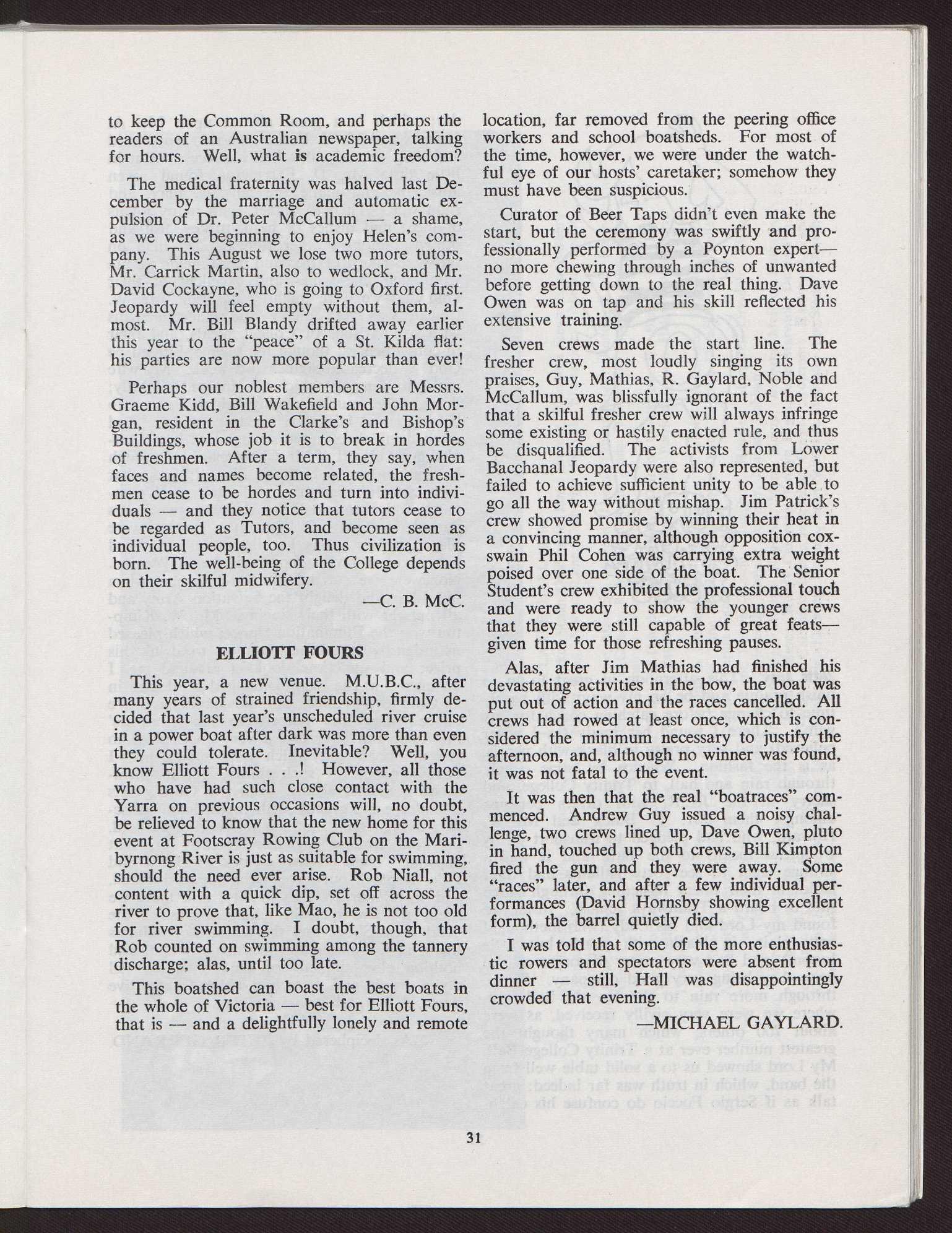
to keep the Common Room, and perhaps the readers of an Australian newspaper, talking for hours. Well, what is academic freedom?
The medical fraternity was halved last December by the marriage and automatic expulsion of Dr. Peter McCallum — a shame, as we were beginning to enjoy Helen's company. This August we lose two more tutors, Mr. Carrick Martin, also to wedlock, and Mr. David Cockayne, who is going to Oxford first. Jeopardy will feel empty without them, almost. Mr. Bill Blandy drifted away earlier this year to the "peace" of a St. Kilda flat: his parties are now more popular than ever!
Perhaps our noblest members are Messrs. Graeme Kidd, Bill Wakefield and John Morgan, resident in the Clarke's and Bishop's Buildings, whose job it is to break in hordes of freshmen. After a term, they say, when faces and names become related, the freshmen cease to be hordes and turn into individuals — and they notice that tutors cease to be regarded as Tutors, and become seen as individual people, too. Thus civilization is born. The well-being of the College depends on their skilful midwifery.
—C. B. McC.
This year, a new venue. M.U.B.C., after many years of strained friendship, firmly decided that last year's unscheduled river cruise in a power boat after dark was more than even they could tolerate. Inevitable? Well, you know Elliott Fours . . .! However, all those who have had such close contact with the Yarra on previous occasions will, no doubt, be relieved to know that the new home for this event at Footscray Rowing Club on the Maribyrnong River is just as suitable for swimming, should the need ever arise. Rob Niall, not content with a quick dip, set off across the river to prove that, like Mao, he is not too old for river swimming. I doubt, though, that Rob counted on swimming among the tannery discharge; alas, until too late.
This boatshed can boast the best boats in the whole of Victoria — best for Elliott Fours, that is -- and a delightfully lonely and remote
location, far removed from the peering office workers and school boatsheds. For most of the time, however, we were under the watchful eye of our hosts' caretaker; somehow they must have been suspicious.
Curator of Beer Taps didn't even make the start, but the ceremony was swiftly and professionally performed by a Poynton expert— no more chewing through inches of unwanted before getting down to the real thing. Dave Owen was on tap and his skill reflected his extensive training.
Seven crews made the start line. The fresher crew, most loudly singing its own praises, Guy, Mathias, R. Gaylard, Noble and McCallum, was blissfully ignorant of the fact that a skilful fresher crew will always infringe some existing or hastily enacted rule, and thus be disqualified. The activists from Lower Bacchanal Jeopardy were also represented, but failed to achieve sufficient unity to be able to go all the way without mishap. Jim Patrick's crew showed promise by winning their heat in a convincing manner, although opposition coxswain Phil Cohen was carrying extra weight poised over one side of the boat. The Senior Student's crew exhibited the professional touch and were ready to show the younger crews that they were still capable of great feats— given time for those refreshing pauses.
Alas, after Jim Mathias had finished his devastating activities in the bow, the boat was put out of action and the races cancelled. All crews had rowed at least once, which is considered the minimum necessary to justify the afternoon, and, although no winner was found, it was not fatal to the event.
It was then that the real "boatraces" commenced. Andrew Guy issued a noisy challenge, two crews lined up, Dave Owen, pluto in hand, touched up both crews, Bill Kimpton fired the gun and they were away. Some "races" later, and after a few individual performances (David Hornsby showing excellent form), the barrel quietly died.
I was told that some of the more enthusiastic rowers and spectators were absent from dinner — still, Hall was disappointingly crowded that evening.
—MICHAEL GAYLARD.
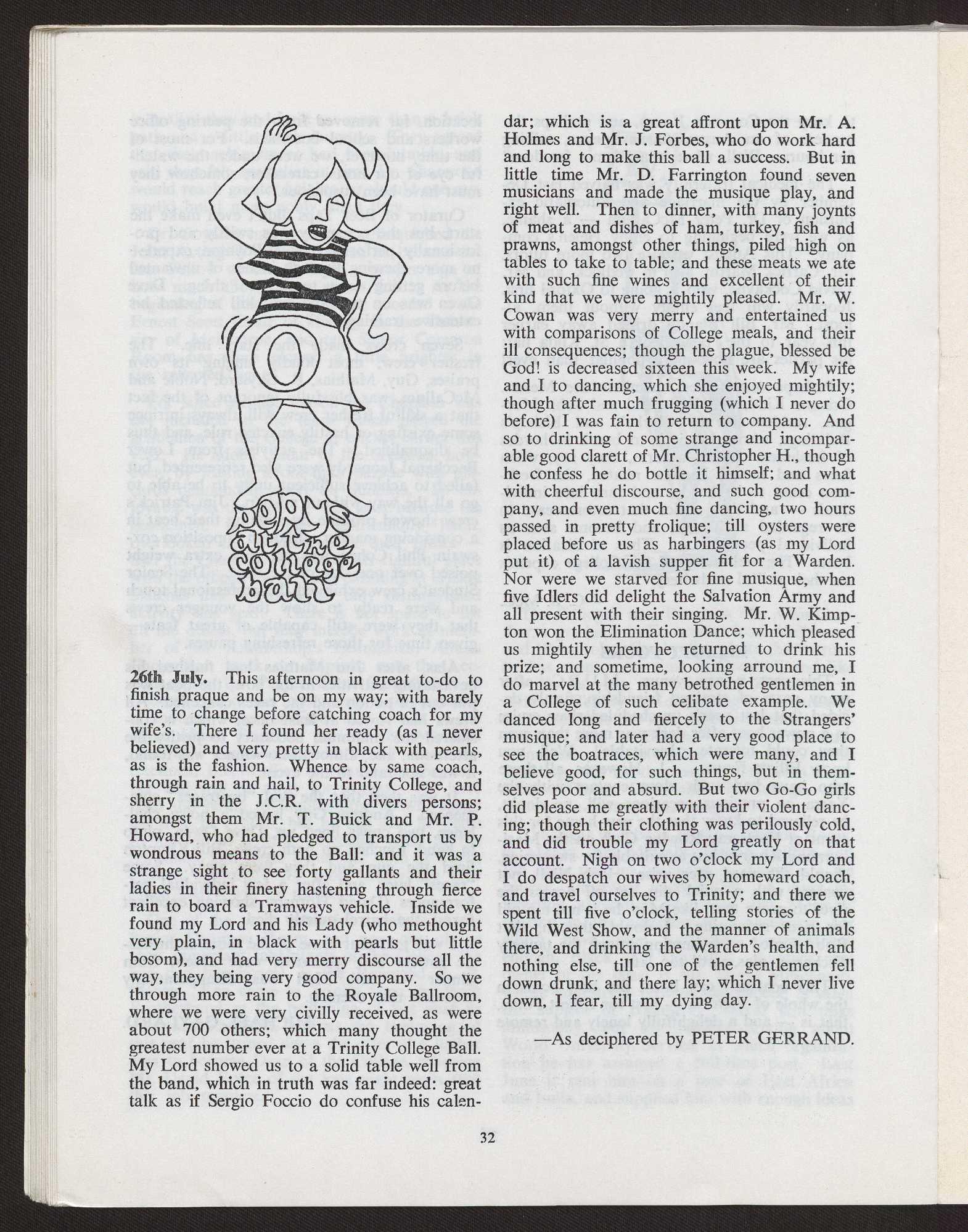
26th July. This afternoon in great to-do to finish praque and be on my way; with barely time to change before catching coach for my wife's. There I found her ready (as I never believed) and very pretty in black with pearls, as is the fashion. Whence by same coach, through rain and hail, to Trinity College, and sherry in the J.C.R. with divers persons; amongst them Mr. T. Buick and Mr. P. Howard, who had pledged to transport us by wondrous means to the Ball: and it was a strange sight to see forty gallants and their ladies in their finery hastening through fierce rain to board a Tramways vehicle. Inside we found my Lord and his Lady (who methought very plain, in black with pearls but little bosom), and had very merry discourse all the way, they being very good company. So we through more rain to the Royale Ballroom, where we were very civilly received, as were about 700 others; which many thought the greatest number ever at a Trinity College Ball. My Lord showed us to a solid table well from the band, which in truth was far indeed: great talk as if Sergio Foccio do confuse his calen-
dar; which is a great affront upon Mr. A. Holmes and Mr. J. Forbes, who do work hard and long to make this ball a success. But in little time Mr. D. Farrington found seven musicians and made the musique play, and right well. Then to dinner, with many joynts of meat and dishes of ham, turkey, fish and prawns, amongst other things, piled high on tables to take to table; and these meats we ate with such fine wines and excellent of their kind that we were mightily pleased. Mr. W. Cowan was very merry and entertained us with comparisons of College meals, and their ill consequences; though the plague, blessed be God! is decreased sixteen this week. My wife and I to dancing, which she enjoyed mightily; though after much frigging (which I never do before) I was fain to return to company. And so to drinking of some strange and incomparable good clarett of Mr. Christopher H., though he confess he do bottle it himself; and what with cheerful discourse, and such good company, and even much fine dancing, two hours passed in pretty frolique; till oysters were placed before us as harbingers (as my Lord put it) of a lavish supper fit for a Warden. Nor were we starved for fine musique, when five Idlers did delight the Salvation Army and all present with their singing. Mr. W. Kimpton won the Elimination Dance; which pleased us mightily when he returned to drink his prize; and sometime, looking arround me, I do marvel at the many betrothed gentlemen in a College of such celibate example. We danced long and fiercely to the Strangers' musique; and later had a very good place to see the boatraces, which were many, and I believe good, for such things, but in themselves poor and absurd. But two Go-Go girls did please me greatly with their violent dancing; though their clothing was perilously cold, and did trouble my Lord greatly on that account. Nigh on two o'clock my Lord and I do despatch our wives by homeward coach, and travel ourselves to Trinity; and there we spent till five o'clock, telling stories of the Wild West Show, and the manner of animals there, and drinking the Warden's health, and nothing else, till one of the gentlemen fell down drunk, and there lay; which I never live down, I fear, till my dying day.
—As deciphered by PETER GERRAND.
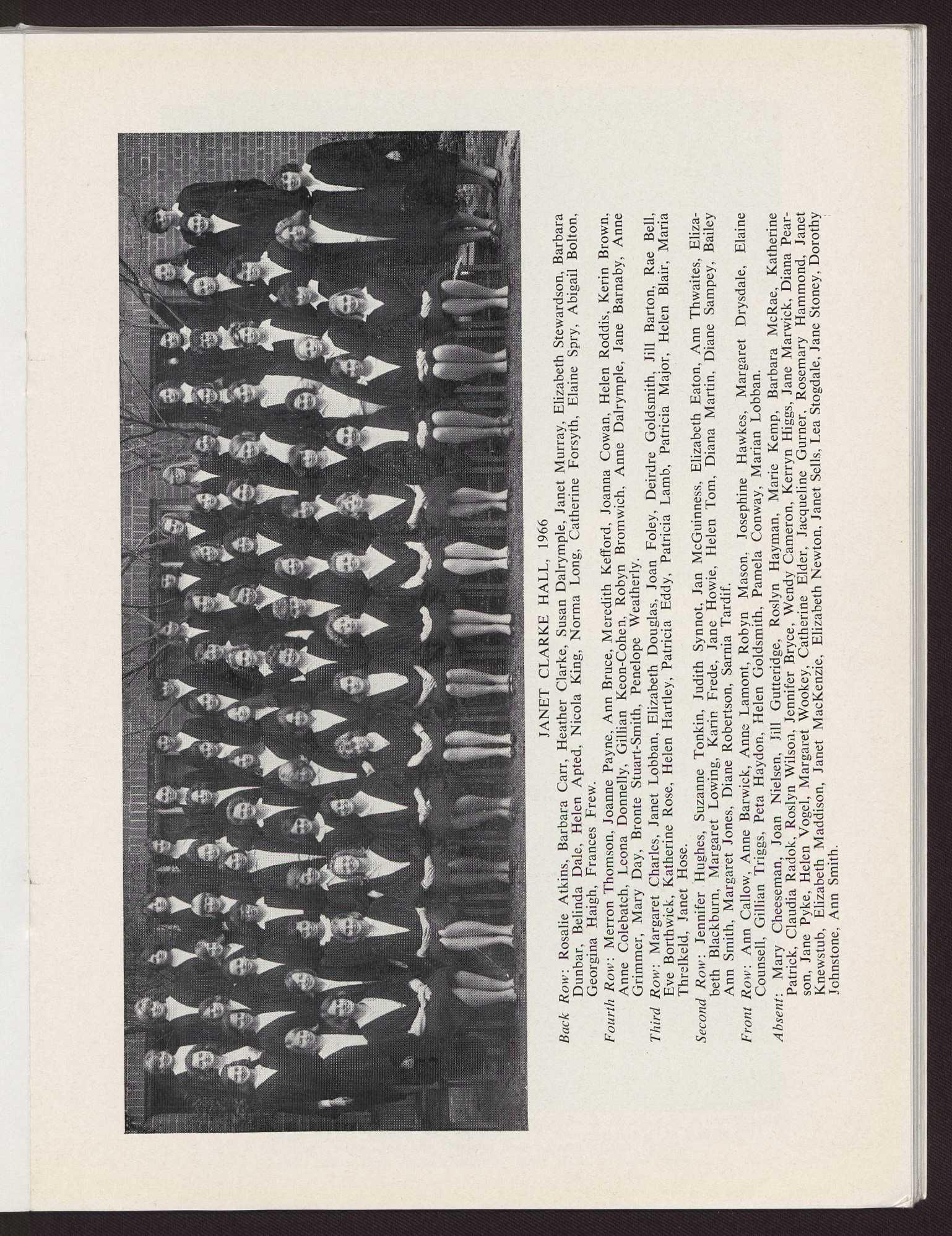
6, 0 ââ —44,),• d câ0 0 â i.imm.. as o ~ ~~ wa1 W w cl ó A .go ooa 32 b n E o bä . ~> bc =°' oâ A ~x')
•° • °.5 ~oA °0b cd „ `p ti ° on
• w Z› 5 wcd p $
o b u N
~~ cd O•~ aw ° :?.1)icd
o k Uo 2 4 x ,~4
V , <4"P.„.6 w .2 t âTi
6, ó C7e 3 cc% ~x 1 ,. çx >
a) ca '5 E vî 5 ~. AI cuo as titi, 0.2
ÿ T cd ~ o h a do o1-,
a QU ó o o•
ç tiU 8 o
T) ,~ ro -d E ,12'5 5. o o cd ati ti C
w '' o ~ ;b~ b ó 1~~ x ~ '~w"x i > •2A
ttt ä3 -acd o af- ,. g N
w•v., • C 0 cbG
o w CoaA: v)".',a•ó O Úti
o â o -o~ oC7 ÿti>.N
• U x PQ g o y, go op 10.q,s°éao)
cd `14 tiwo E zoo w c1
x o > ~-zpÿ E•-, ~~b C; ~ WF
w o. a, >. , Ó x+ a) 0 o ,X h3 0 fi,
U~3 â , 1, o ó A•3 x~ >, a
cl 2 t>6 `1`a v ) Z â~.2
T.A o `,, v) cap, o 0 ób
s. o a) o cd a+
aa ,4 o o o i'F d , i)-n o °p ti}= , on ai 15
éAwaA Ú x z b F )-0 °° 3 E" 4/)
.<b~ao~ c~rí.. 8~ët> g ;q ° ` h.L e aï n`d i o
o ". : ~.ge OD U7 x ~w¢
-8 1:1:1 ~r. 6 ÿ a) i5 o UCja~
c4 'o U ~â)
o g a ) ó~~=tlE o.~ T oÿó
a o I I o ~c)ti3h
00 óo. a) °: o.ÿ o a22
Q°QC7 4~C7 p4WF ~~. r~°Ú .,P .4-o -o
o 5 U O „0
oz LL cn L
FIRST XVIII
Back Row: W. Forwood, J. L. J. Ch. de Crespigny, Front Row: I. C. Mitchell, Lewisohn (Captain), G. Absent: T. F. Brown, I. K. G. G. Mitchell.
A. Darling, R. W. Harper, M. J. Standish, I. R. Hopkins, R. J. Mackie, G. A. Ross, P. S. Everist. R. A. Guy, C. G. W. Mitchell, B. W. C. Wilson, J. R. P. W. Ainsworth, M. Pruden, J. H. H. Brookes, J. A. Renowden. M. Galbraith (Vice-Captain), S. J. Gaylard, S. J. McGregor,
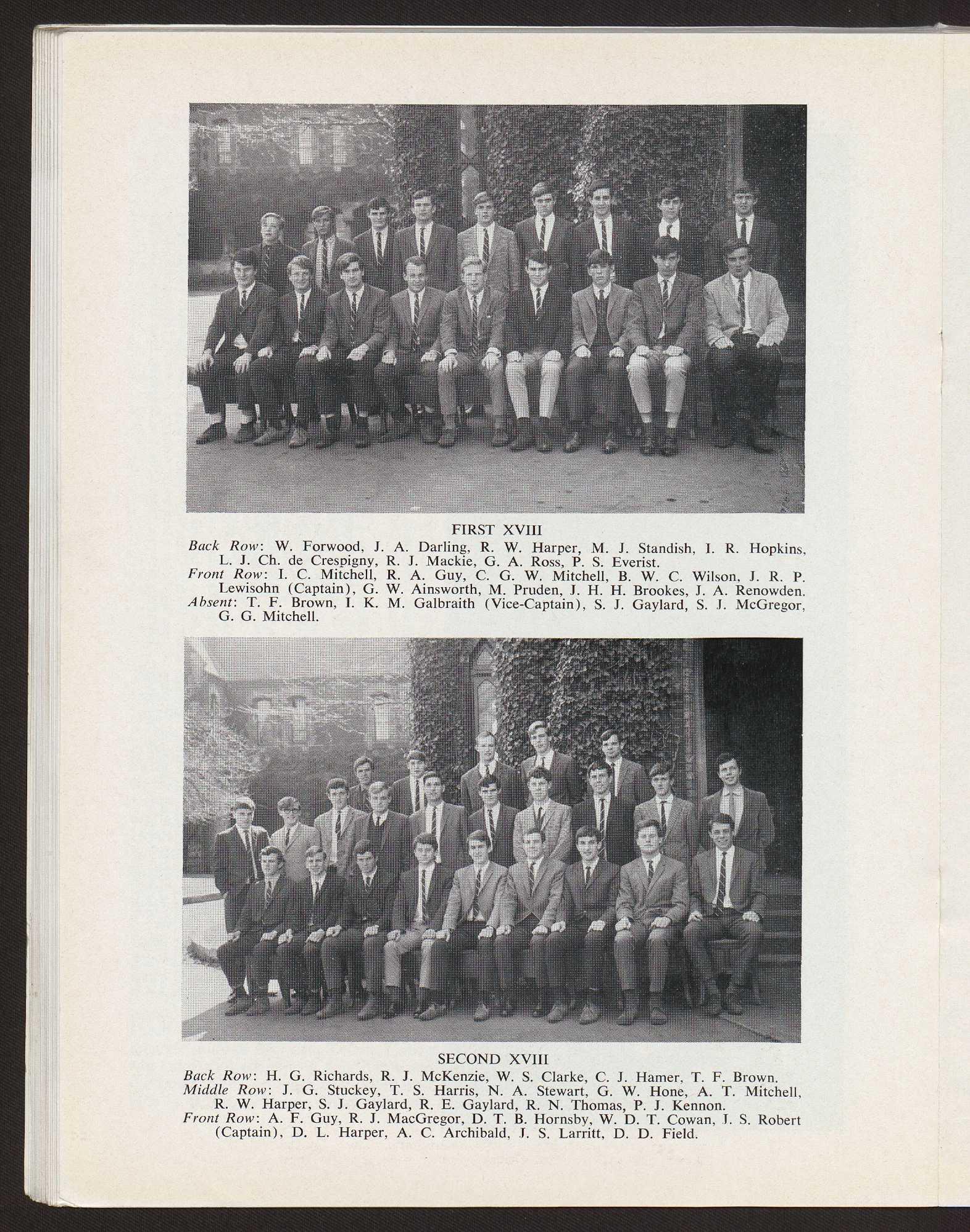
SECOND XVIII
Back Row: H. G. Richards, R. J. McKenzie, W. S. Clarke, C. J. Hamer, T. F. Brown.
Middle Row: J. G. Stuckey, T. S. Harris, N. A. Stewart, G. W. Hone, A. T. Mitchell, R. W. Harper, S. J. Gaylard, R. E. Gaylard, R. N. Thomas, P. J. Kennon.
Front Row: A. F. Guy, R. J. MacGregor, D. T. B. Hornsby, W. D. T. Cowan, I. S. Robert (Captain), D. L. Harper, A. C. Archibald, J. S. Larritt, D. D. Field.
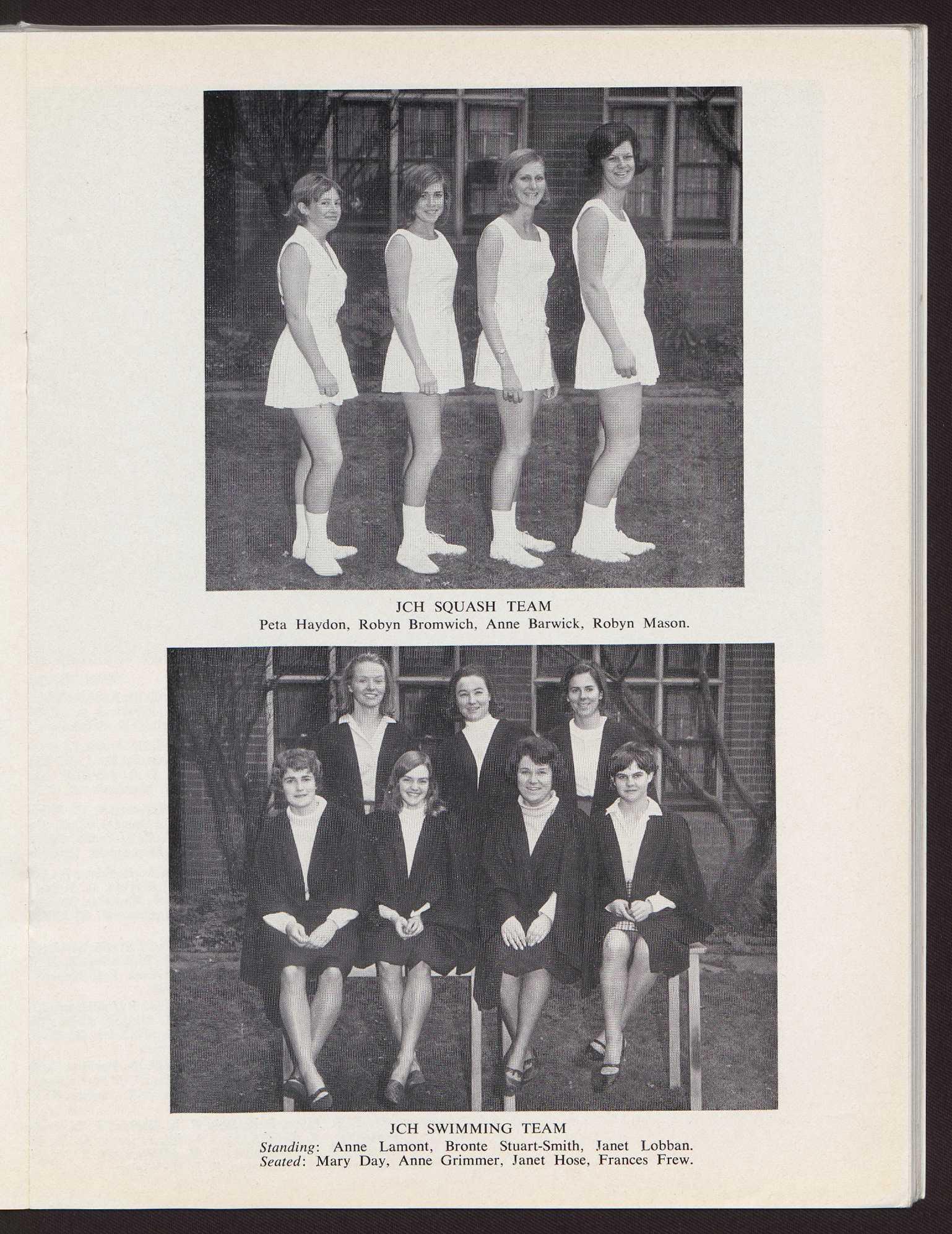
TRINITY COLLE
Back Row: B. N. J. Benson, A. K. Heard, R. J. Wakefield, P. D. S. Dennis, A. J. Higgs, P. H. Gerrand, G. M. Knight Kemp, G. R. Davey, D. A. Underhill, D. C. Cowan,
Sixth Row: J. F. Henry, A. H. Le Page, T. D. Buick, T. W. Everist, G. V. Brown, R. J. McKenzie, D. J. E. King, D. A. Ellerman, D. O. Owen, W. D. L. Sear, G. Myers, A. F. Cox, M. T. Hamerston, B. J. Matthews, A. G. Boltor.
Fifth Row: J. H. H. Brookes, H. K. Colebatch, J. C. Wilson, D. G. Gome, S. G. Larkins, P. F. Howard, C. J. Hamer, Lowenstern, P. W. Haskett, D. T. B. Hornsby, M. Prude] P. J. Kennon, C. E. Carter, T. E. Blarney, M. Downing,
Fourth Row: A. W. Smith, W. R. Stokes, R. B. Scott, P. A.I. R. F. Haskett, J. G. Stuckey, J. F. Forbes, R. J. Mac D. M. R. Were, W. S. Clarke, M. J. Thwaites, W. F. T. S. Harris, J. O'N. Brenan, P. S. Osmond, R. J. Pees, I. J. Raymond.
Third Row: A. D. Miller, R. D. Weymouth, R. G. Larkins, P. J. Elliott, J. H. Shepherd, G. H. T. Wheler, P. J. Hughe Cowan, W. S. Kimpton, J. G. W. Oliver, J. S. Robert, Ames, K. R. Griffiths, R. J. G. Smith.
Second Row: J. R. Harry, W. Forwood, M. R. Williams, J. F. A. F. Guy, A. K. Hopkins, A. D. Minson, J. D. Cloke, Niall, J. E. Tibballs, P. Cohen, G. S. Lester, D. C. Adcoc] Langman, K. W. Ogden, R. J. Ramsay.
Front Row: D. P. Garrott, B. D. Apsey, O. D. Barkley, P. Selby Field, S. J. McGregor, J. L. Mathias, P. J. McCallum, P. L. Weickhardt, T. D. McKellar, J. T. Patten, G. L. I. A. Alexander.
Absent: K. J. F. Allen, J. R. Bain, I. L. barker, J. D. Corbet, Gallagher, A. K. Gregson, A. W Grimes, A. D. Holme Macaw, C. D. McKellar, P. B. *McPhee, D. S. Meakin, Thomas, S. S. Viravadya, S. J. K. Wigley.
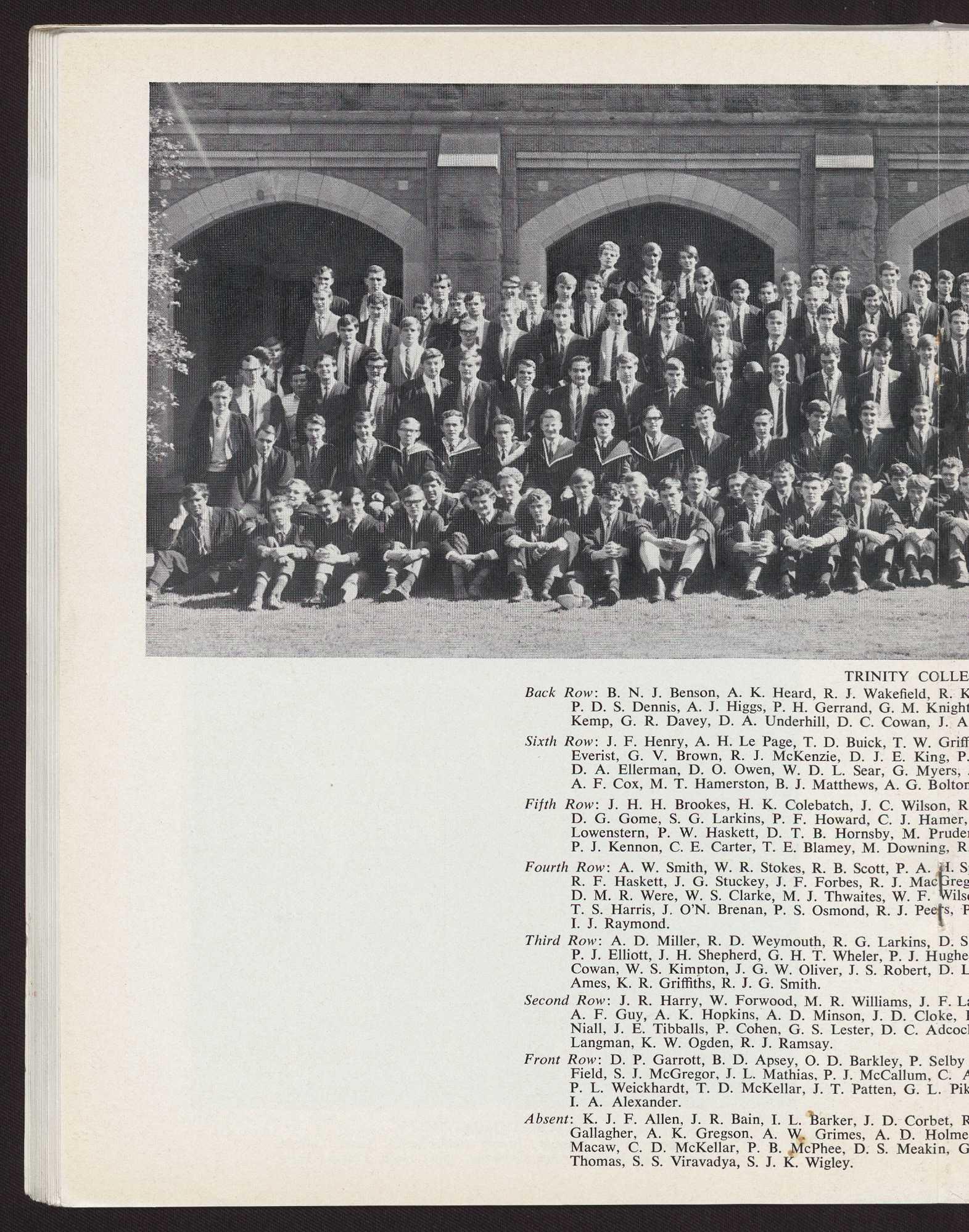
COLLEGE, 1966
;ld, R. K. Woodruff, G. T. Houghton, W. G. Last, J. A. Darling, Knight, D. S. Houghton, M. J. Standish, G. R. Worby, C. M. an, J. A. Renowden.
W. Griffiths, T. F. Brown, R. K. Watson, G. R. Wiese, P. S. King, P. B. Seddon, R. J. Mackie, R. K. Jackson, S. J. Gaylard, Myers, J. F. Patrick, I. J. Gude, T. I. Sedgwick, M. R. Gaylard, Bolton, O. B. Mace.
(ilson, R. W. Harper, I. R. Hopkins, O. M. Evans, J. P. Warren, Hamer, G. W. Hone, T. Hasker, G. J. Pullen, P. A. Guy, R. P. C. Pruden, H. G. Richards, G. W. Ainsworth, B. W. C. Wilson, ening, R. J. Murray, S. E. Howard.
A. ' I. Spear, J. M. Davis, J. S. Larritt, B. D. Grutzner, P. Nisselle, Mac regor, A. N. Stokes, I. C. Mitchell, N. G. Ross, R. A. Guy, F. ilson, J. M. P. Robinson, C. J. A. Game, N. A. Stewart, Pees, P. B. Greenberg, J. R. P. Lewisohn, C. G. W. Mitchell, i ins, D. S. Woodruff, R. C. Oppenheim, G. Aplin, A. J. R. Prentice, Hughes, D. D. Elder, A. C. Archibald, A. T. Mitchell, W. D. T. ert, D. L. Harper, J. O. King, P. L. Field, D. J. Fenton, S. A. H.
J. F. Langdon, D. J. Walker, L. J. Ch. de Crespigny, S. D. Trinca, Cloke, R. H. Noble, A. de P. Godfrey, G. R. Fleming, R. M. Adcock, J. H. Telfer, D. I. Pullin, B. D. P. Fitzpatrick, I. R.
Selby Smith, R. N. Thomas, A. W. Boyd, R. E. Gaylard, D. D. im, C. A. Buckley, J. M. Gardiner, B. E. Firth, G. A. Ross, L. Pike, E. P. Hobson, R. M. Molesworth, M. W. P. Baxter,
sorbet, R. H. Elliott? J. R. Fullerton, I. K. M. Galbraith, D. E. Holmes, R. J. Kemelf eld, G. D. Liddell, D. N. Lowy, R. C. eakin, G. G. Mitchell, R. M. C. Nankivell, B. G. Owen, S. L.


Back Row: P. B. Seddon, S. D. Trinca, A. D. Minson, C. A. Buckley, M. R. Gaylard, M. R. Williams.
Front Row: H. K. Colebatch, P. L. Field, R. J. MacGregor, P. W. Haskett (Captain), B. D. Grutzner, T. E. Blarney, G. V. Brown.

Back Row: P. Cohen, J. A. Darling, P. J. Hughes (Scorer), A. T. Mitchell, R. E. Gaylard, D. D. Field, G. W. Ainsworth.
Front Row: I. R. Hopkins, C. G. W. Mitchell, R. D. Weymouth (Captain), B. D. Grutzner, R. A. Guy. Absent: R. C. Macaw.
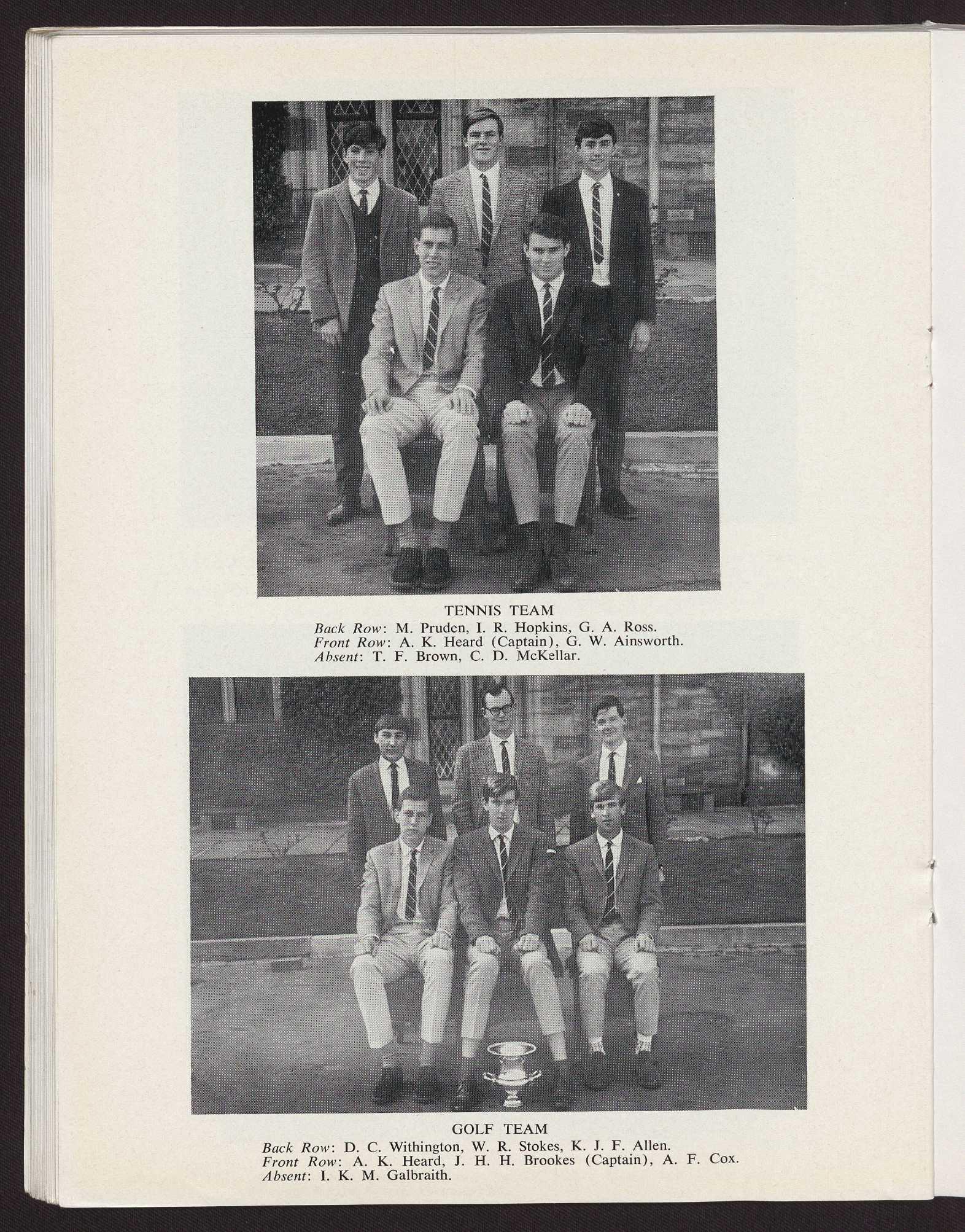
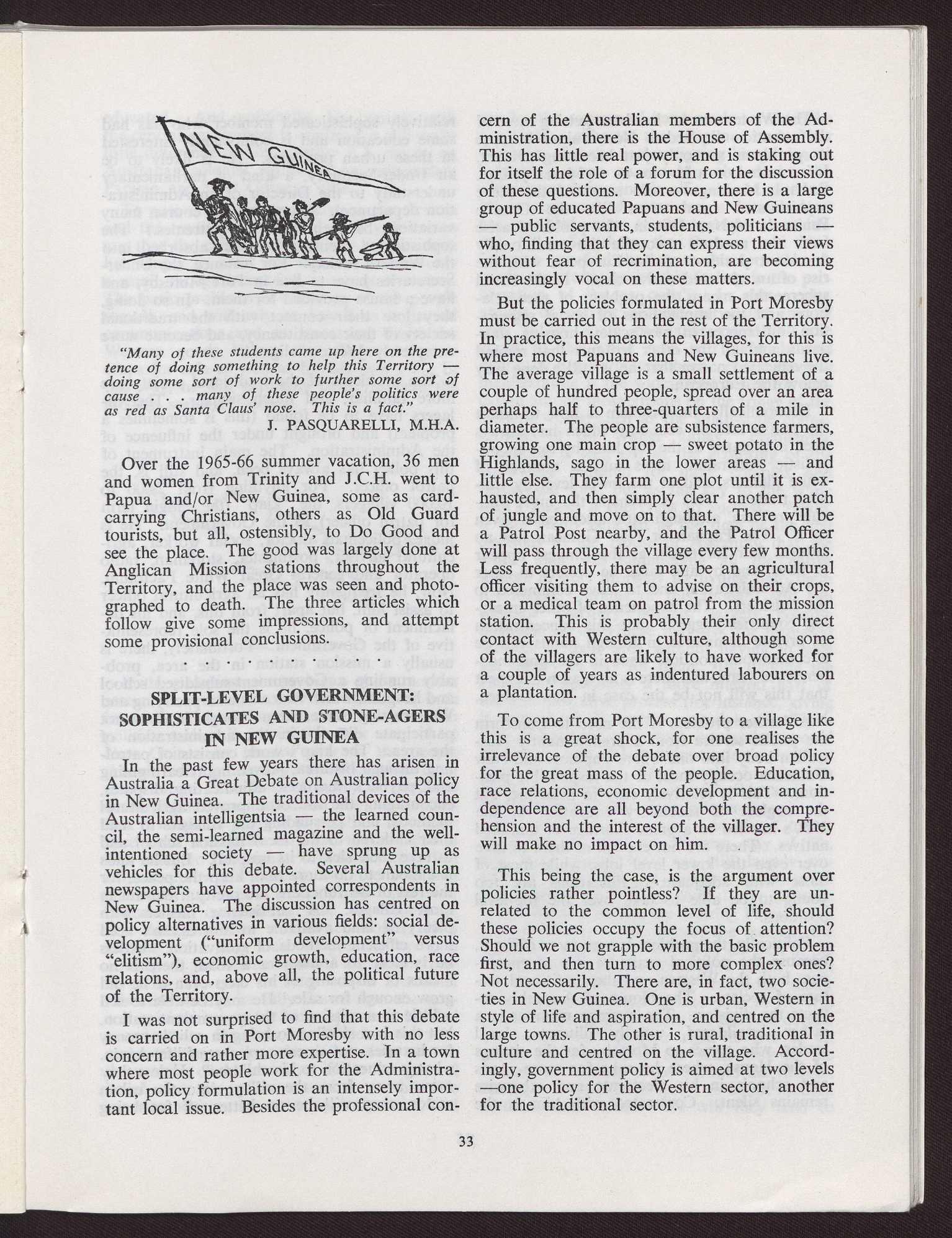
"Many of these students came up here on the pretence of doing something to help this Territory — doing some sort of work to further some sort of cause . many of these people's politics were as red as Santa Claus' nose. This is a fact."
J. PASQUARELLI, M.H.A.
Over the 1965-66 summer vacation, 36 men and women from Trinity and J.C.H. went to Papua and/or New Guinea, some as cardcarrying Christians, others as Old Guard tourists, but all, ostensibly, to Do Good and see the place. The good was largely done at Anglican Mission stations throughout the Territory, and the place was seen and photographed to death. The three articles which follow give some impressions, and attempt some provisional conclusions.
In the past few years there has arisen in Australia a Great Debate on Australian policy in New Guinea. The traditional devices of the Australian intelligentsia — the learned council, the semi-learned magazine and the wellintentioned society — have sprung up as vehicles for this debate. Several Australian newspapers have appointed correspondents in New Guinea. The discussion has centred on policy alternatives in various fields: social development ("uniform development" versus "elitism"), economic growth, education, race relations, and, above all, the political future of the Territory.
I was not surprised to find that this debate is carried on in Port Moresby with no less concern and rather more expertise. In a town where most people work for the Administration, policy formulation is an intensely important local issue. Besides the professional con-
cern of the Australian members of the Administration, there is the House of Assembly. This has little real power, and is staking out for itself the role of a forum for the discussion of these questions. Moreover, there is a large group of educated Papuans and New Guineans — public servants, students, politicians — who, finding that they can express their views without fear of recrimination, are becoming increasingly vocal on these matters.
But the policies formulated in Port Moresby must be carried out in the rest of the Territory. In practice, this means the villages, for this is where most Papuans and New Guineans live. The average village is a small settlement of a couple of hundred people, spread over an area perhaps half to three-quarters of a mile in diameter. The people are subsistence farmers, growing one main crop — sweet potato in the Highlands, sago in the lower areas — and little else. They farm one plot until it is exhausted, and then simply clear another patch of jungle and move on to that. There will be a Patrol Post nearby, and the Patrol Officer will pass through the village every few months. Less frequently, there may be an agricultural officer visiting them to advise on their crops, or a medical team on patrol from the mission station. This is probably their only direct contact with Western culture, although some of the villagers are likely to have worked for a couple of years as indentured labourers on a plantation.
To come from Port Moresby to a village like this is a great shock, for one realises the irrelevance of the debate over broad policy for the great mass of the people. Education, race relations, economic development and independence are all beyond both the comprehension and the interest of the villager. They will make no impact on him.
This being the case, is the argument over policies rather pointless? If they are unrelated to the common level of life, should these policies occupy the focus of. attention? Should we not grapple with the basic problem first, and then turn to more complex ones? Not necessarily. There are, in fact, two societies in New Guinea. One is urban, Western in style of life and aspiration, and centred on the large towns. The other is rural, traditional in culture and centred on the village. Accordingly, government policy is aimed at two levels -one policy for the Western sector, another for the traditional sector.
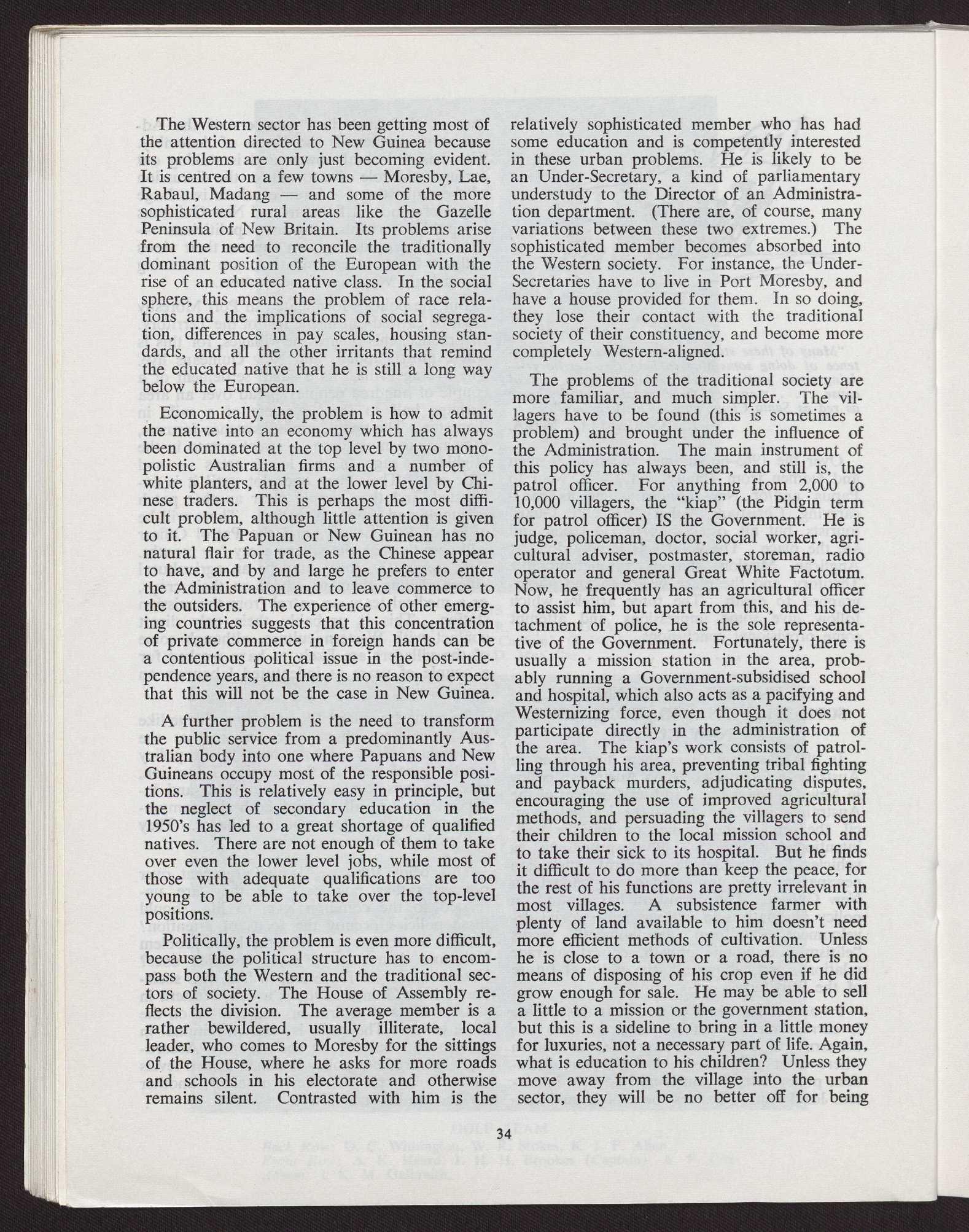
The Western sector has been getting most of the attention directed to New Guinea because its problems are only just becoming evident. It is centred on a few towns — Moresby, Lae, Rabaul, Madang — and some of the more sophisticated rural areas like the Gazelle Peninsula of New Britain. Its problems arise from the need to reconcile the traditionally dominant position of the European with the rise of an educated native class. In the social sphere, this means the problem of race relations and the implications of social segregation, differences in pay scales, housing standards, and all the other irritants that remind the educated native that he is still a long way below the European.
Economically, the problem is how to admit the native into an economy which has always been dominated at the top level by two monopolistic Australian firms and a number of white planters, and at the lower level by Chinese traders. This is perhaps the most difficult problem, although little attention is given to it. The Papuan or New Guinean has no natural flair for trade, as the Chinese appear to have, and by and large he prefers to enter the Administration and to leave commerce to the outsiders. The experience of other emerging countries suggests that this concentration of private commerce in foreign hands can be a contentious political issue in the post-independence years, and there is no reason to expect that this will not be the case in New Guinea.
A further problem is the need to transform the public service from a predominantly Australian body into one where Papuans and New Guineans occupy most of the responsible positions. This is relatively easy in principle, but the neglect of secondary education in the 1950's has led to a great shortage of qualified natives. There are not enough of them to take over even the lower level jobs, while most of those with adequate qualifications are too young to be able to take over the top-level positions.
Politically, the problem is even more difficult, because the political structure has to encompass both the Western and the traditional sectors of society. The House of Assembly reflects the division. The average member is a rather bewildered, usually illiterate, local leader, who comes to Moresby for the sittings of the House, where he asks for more roads and schools in his electorate and otherwise remains silent. Contrasted with him is the
relatively sophisticated member who has had some education and is competently interested in these urban problems. He is likely to be an Under-Secretary, a kind of parliamentary understudy to the Director of an Administration department. (There are, of course, many variations between these two extremes.) The sophisticated member becomes absorbed into the Western society. For instance, the UnderSecretaries have to live in Port Moresby, and have a house provided for them. In so doing, they lose their contact with the traditional society of their constituency, and become more completely Western-aligned.
The problems of the traditional society are more familiar, and much simpler. The villagers have to be found (this is sometimes a problem) and brought under the influence of the Administration. The main instrument of this policy has always been, and still is, the patrol officer. For anything from 2,000 to 10,000 villagers, the "kiap" (the Pidgin term for patrol officer) IS the Government. He is judge, policeman, doctor, social worker, agricultural adviser, postmaster, storeman, radio operator and general Great White Factotum. Now, he frequently has an agricultural officer to assist him, but apart from this, and his detachment of police, he is the sole representative of the Government. Fortunately, there is usually a mission station in the area, probably running a Government-subsidised school and hospital, which also acts as a pacifying and Westernizing force, even though it does not participate directly in the administration of the area. The kiap's work consists of patrolling through his area, preventing tribal fighting and payback murders, adjudicating disputes, encouraging the use of improved agricultural methods, and persuading the villagers to send their children to the local mission school and to take their sick to its hospital. But he finds it difficult to do more than keep the peace, for the rest of his functions are pretty irrelevant in most villages. A subsistence farmer with plenty of land available to him doesn't need more efficient methods of cultivation. Unless he is close to a town or a road, there is no means of disposing of his crop even if he did grow enough for sale. He may be able to sell a little to a mission or the government station, but this is a sideline to bring in a little money for luxuries, not a necessary part of life. Again, what is education to his children? Unless they move away from the village into the urban sector, they will be no better off for being
educated. And politically, his contact with the central government is minimal: it will make little difference to him whether it is run by an Australian colonial regime or an independent Papuan and New Guinean elite.
To note this distinction between the modern and the traditional sector of society is not to say that the debate over policies is irrelevant, but simply to point out that it concerns only a small, though increasing, minority of society. The basic problems of the mass of the people remain, and will only be solved as improved communications and an increasing desire for Western goods induce the villager to grow crops for sale as well as for his own use. In this way, he will gradually be drawn into the modern sector of society.
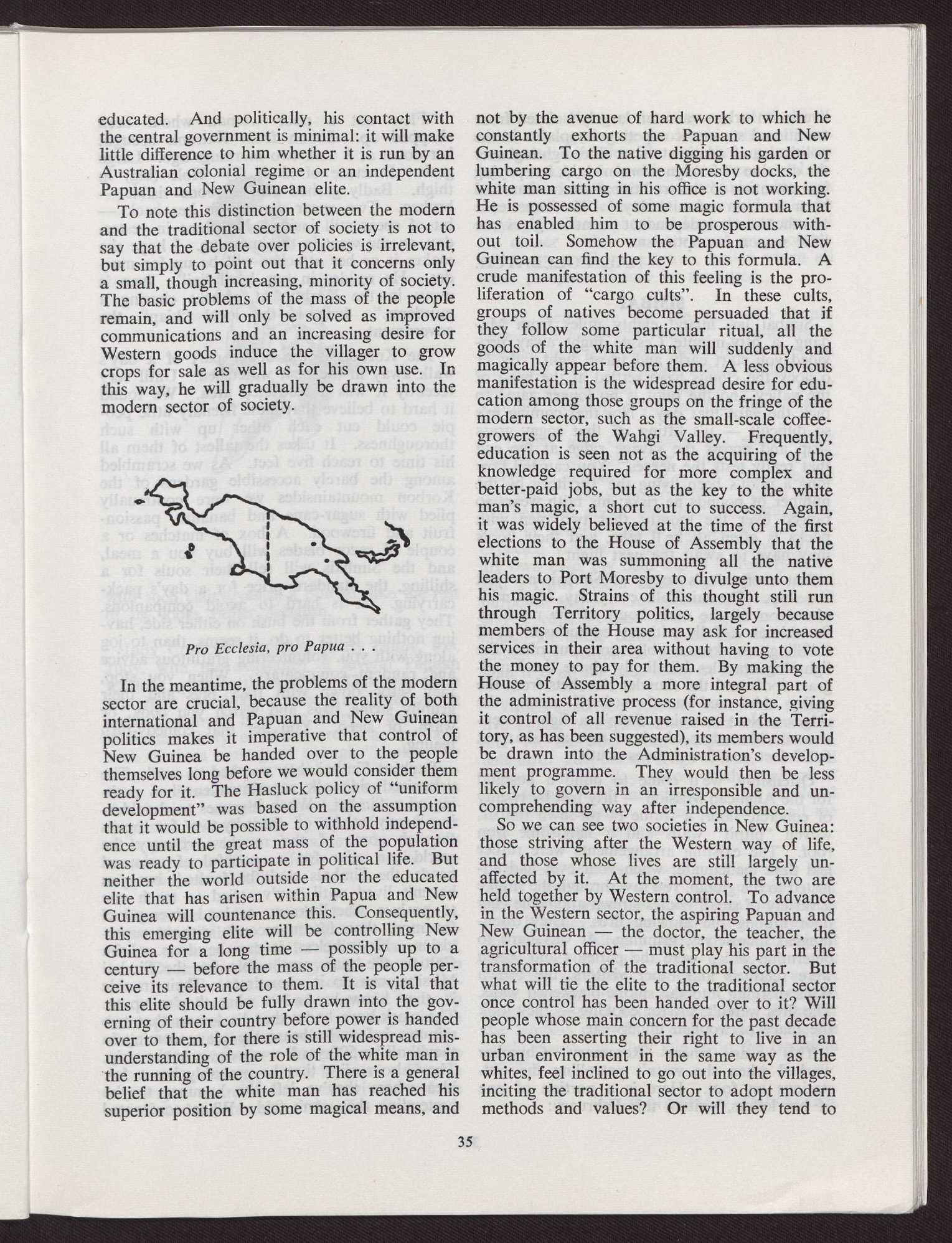
Pro Ecclesia, pro Papua .. .
In the meantime, the problems of the modern sector are crucial, because the reality of both international and Papuan and New Guinean politics makes it imperative that control of New Guinea be handed over to the people themselves long before we would consider them ready for it. The Hasluck policy of "uniform development" was based on the assumption that it would be possible to withhold independence until the great mass of the population was ready to participate in political life. But neither the world outside nor the educated elite that has arisen within Papua and New Guinea will countenance this. Consequently, this emerging elite will be controlling New Guinea for a long time — possibly up to a century — before the mass of the people perceive its relevance to them. It is vital that this elite should be fully drawn into the governing of their country before power is handed over to them, for there is still widespread misunderstanding of the role of the white man in the running of the country. There is a general belief that the white man has reached his superior position by some magical means, and
not by the avenue of hard work to which he constantly exhorts the Papuan and New Guinean. To the native digging his garden or lumbering cargo on the Moresby docks, the white man sitting in his office is not working. He is possessed of some magic formula that has enabled him to be prosperous without toil. Somehow the Papuan and New Guinean can find the key to this formula. A crude manifestation of this feeling is the proliferation of "cargo cults". In these cults, groups of natives become persuaded that if they follow some particular ritual, all the goods of the white man will suddenly and magically appear before them. A less obvious manifestation is the widespread desire for education among those groups on the fringe of the modern sector, such as the small-scale coffeegrowers of the Wahgi Valley. Frequently, education is seen not as the acquiring of the knowledge required for more complex and better-paid jobs, but as the key to the white man's magic, a short cut to success. Again, it was widely believed at the time of the first elections to the House of Assembly that the white man was summoning all the native leaders to Port Moresby to divulge unto them his magic. Strains of this thought still run through Territory politics, largely because members of the House may ask for increased services in their area without having to vote the money to pay for them. By making the House of Assembly a more integral part of the administrative process (for instance, giving it control of all revenue raised in the Territory, as has been suggested), its members would be drawn into the Administration's development programme. They would then be less likely to govern in an irresponsible and uncomprehending way after independence.
So we can see two societies in New Guinea: those striving after the Western way of life, and those whose lives are still largely unaffected by it. At the moment, the two are held together by Western control. To advance in the Western sector, the aspiring Papuan and New Guinean — the doctor, the teacher, the agricultural officer — must play his part in the transformation of the traditional sector. But what will tie the elite to the traditional sector once control has been handed over to it? Will people whose main concern for the past decade has been asserting their right to live in an urban environment in the same way as the whites, feel inclined to go out into the villages, inciting the traditional sector to adopt modern methods and values? Or will they tend to
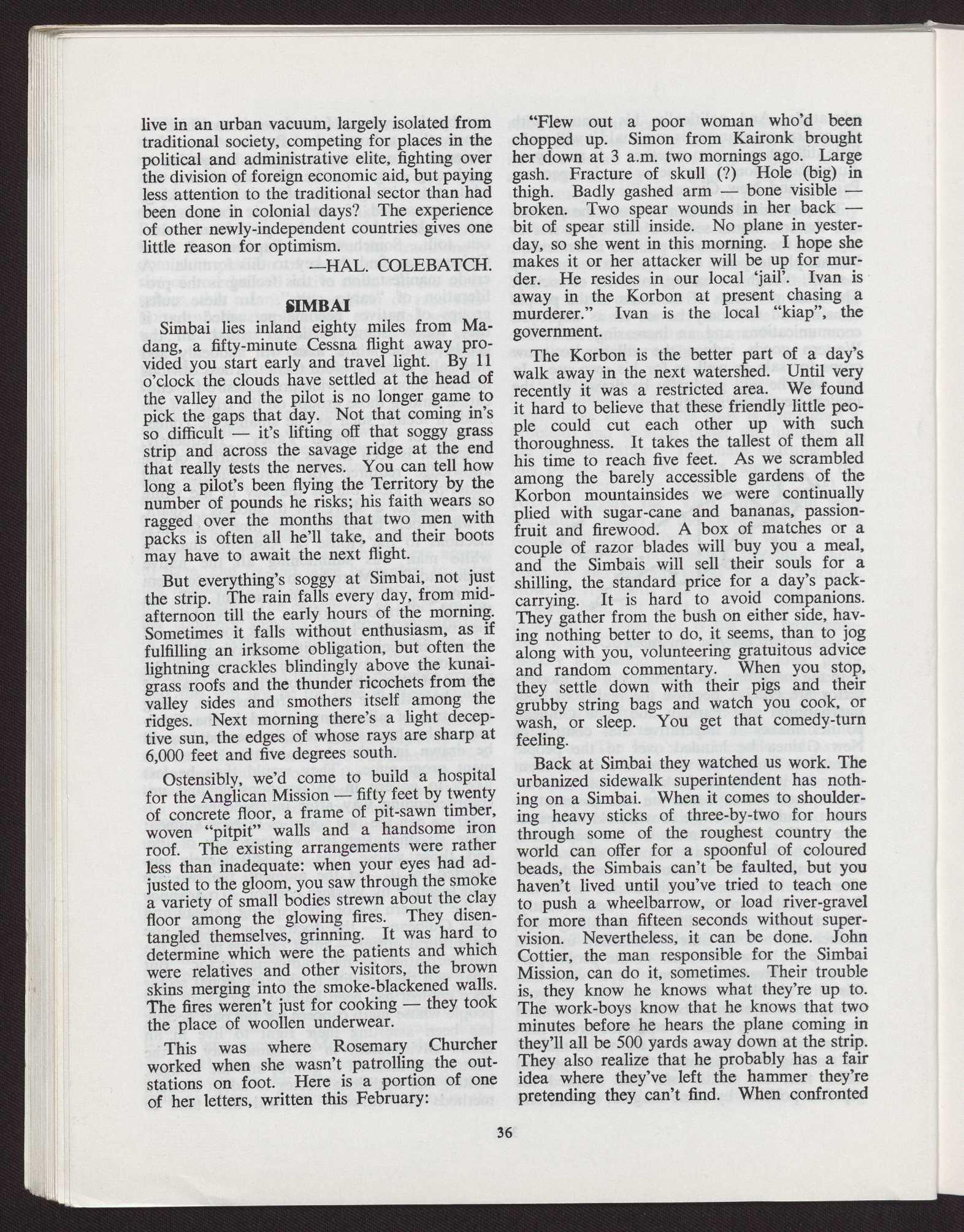
live in an urban vacuum, largely isolated from traditional society, competing for places in the political and administrative elite, fighting over the division of foreign economic aid, but paying less attention to the traditional sector than had been done in colonial days? The experience of other newly-independent countries gives one little reason for optimism.
—HAL. COLEBATCH.
Simbai lies inland eighty miles from Madang, a fifty-minute Cessna flight away provided you start early and travel light. By 11 o'clock the clouds have settled at the head of the valley and the pilot is no longer game to pick the gaps that day. Not that coming in's so difficult — it's lifting off that soggy grass strip and across the savage ridge at the end that really tests the nerves. You can tell how long a pilot's been flying the Territory by the number of pounds he risks; his faith wears so ragged over the months that two men with packs is often all he'll take, and their boots may have to await the next flight.
But everything's soggy at Simbai, not just the strip. The rain falls every day, from midafternoon till the early hours of the morning. Sometimes it falls without enthusiasm, as if fulfilling an irksome obligation, but often the lightning crackles blindingly above the kunaigrass roofs and the thunder ricochets from the valley sides and smothers itself among the ridges. Next morning there's a light deceptive sun, the edges of whose rays are sharp at 6,000 feet and five degrees south.
Ostensibly, we'd come to build a hospital for the Anglican Mission — fifty feet by twenty of concrete floor, a frame of pit-sawn timber, woven "pitpit" walls and a handsome iron roof. The existing arrangements were rather less than inadequate: when your eyes had adjusted to the gloom, you saw through the smoke a variety of small bodies strewn about the clay floor among the glowing fires. They disentangled themselves, grinning. It was hard to determine which were the patients and which were relatives and other visitors, the brown skins merging into the smoke-blackened walls. The fires weren't just for cooking — they took the place of woollen underwear.
This was where Rosemary Churcher worked when she wasn't patrolling the outstations on foot. Here is a portion of one of her letters, written this February:
"Flew out a poor woman who'd been chopped up. Simon from Kaironk brought her down at 3 a.m. two mornings ago. Large gash. Fracture of skull (?) Hole (big) in thigh. Badly gashed arm — bone visible — broken. Two spear wounds in her back — bit of spear still inside. No plane in yesterday, so she went in this morning. I hope she makes it or her attacker will be up for murder. He resides in our local `jail'. Ivan is away in the Korbon at present chasing a murderer." Ivan is the local "kiap", the government.
The Korbon is the better part of a day's walk away in the next watershed. Until very recently it was a restricted area. We found it hard to believe that these friendly little people could cut each other up with such thoroughness. It takes the tallest of them all his time to reach five feet. As we scrambled among the barely accessible gardens of the Korbon mountainsides we were continually plied with sugar-cane and bananas, passionfruit and firewood. A box of matches or a couple of razor blades will buy you a meal, and the Simbais will sell their souls for a shilling, the standard price for a day's packcarrying. It is hard to avoid companions. They gather from the bush on either side, having nothing better to do, it seems, than to jog along with you, volunteering gratuitous advice and random commentary. When you stop, they settle down with their pigs and their grubby string bags and watch you cook, or wash, or sleep. You get that comedy-turn feeling.
Back at Simbai they watched us work. The urbanized sidewalk superintendent has nothing on a Simbai. When it comes to shouldering heavy sticks of three-by-two for hours through some of the roughest country the world can offer for a spoonful of coloured beads, the Simbais can't be faulted, but you haven't lived until you've tried to teach one to push a wheelbarrow, or load river-gravel for more than fifteen seconds without supervision. Nevertheless, it can be done. John Cottier, the man responsible for the Simbai Mission, can do it, sometimes. Their trouble is, they know he knows what they're up to. The work-boys know that he knows that two minutes before he hears the plane coming in they'll all be 500 yards away down at the strip. They also realize that he probably has a fair idea where they've left the hammer they're pretending they can't find. When confronted

with such clairvoyance, a Simbai, like the rest of us, looks rather sheepish.
Judy Cottier's becoming pretty canny, too. Judy, with the assistance of several Papuan teachers, governs the school. This year there are about 195 children to be taught, depending upon how many have run away at any given moment. Sixty of them are boarders, and each of them must grow enough "kaukau" to keep himself alive. "Kaukau" is sweet potato, or ipomea batatus for those versed in the classics. A schoolboy should now be distinguishable in the bush by his uniform, a pair of bright blue boxer shorts, sewn by the girls in our party. The uniform must make running away more difficult.
There are feeder schools at the outstations, where the children are taught the first rudiments, to prepare them for the Simbai school. Last December Ian Lowry and David Fitts were on patrol for weeks, conducting the annual examinations. Judy would normally have gone herself, but she was expecting a child. At Ginjinji the school is run by Mr. Lucien Jofo Kanada, a Papuan gentleman who takes an agonizing pride in his work. He was building a church when we arrived, and he claims to have translated the Ten Command-
ments into Karam, the language of the Simbais. Living among the locals, with only his handsome wife Priscilla and their young son for company, his loneliness is intense, and his thirst for knowledge unquenchable. He was devastated to learn that we would only be staying for the night, and kept us late around the dinner table over enormous mugs of tea and two paradigm pawpaws, beside which all other pawpaws should be measured.
And then there was the man who should have been lonely but wasn't. Two-thirds of the way up a very steep mountainside lived an enormous New Zealander named Ralph Bulmer, from Auckland University. In the early Kaironk morning, a boy brought his message:
"Ladies and Gentlemen, My spies report that you are considering a mass visit to my camp this morning. I'm afraid I must decline that offer. Please don't come. There's nothing personal about this, but: (i) Anthropologists in general dislike unnecessary and unexpected visitors in their field camps; (ii) In my own case, my field trip is extremely brief, and I really resent taking time off for social purposes; (iii) My Gobnem camp is very small and I couldn't seat four people inside my house, let alone eight. And the disturbance caused by visitors is proportionately greater than it is at our base camp at Kaironk."
Which effectively restored us to our respective boxes; perhaps we were just tourists after all. At the base camp at Kaironk lived a delightful girl named Inge Riebe, who had greeted us the day before with beakers of Benedictine, and introduced us to the local string-figure champ. String-figures are all the rage with anthropologists.
The anthropologists will have to work fast. Their laboratories won't stay primitive for long. Right now the Simbais can't make clay pots, but they're going to have to skip the clay pot stage. Already they've learned about houses with vertical walls — so much roomier than the turtleback variety. Cessnas are at least as common as birds of paradise, and chewing-gum's a national pastime. Whatever the Simbais may think about the process, the world insists that they join us in the twentieth century.
—JONATHAN THWAITES.

New Guinea . . . for the uninitiated our sober newspapers spell out the wonders of New Guinea life day by day. A thrilling picture of the developing dependency is put before us. No backwater community this! Arbitration disputes, strikes, public service pay controversies, racial conflict, debates in the House, in fact all the features of a developing urban society are placed before us. Of course, the occasional rape is thrown at us for good measure to prove that all is not entirely smooth running — primitive passions and emotions still do exist — but generally speaking we innocents down south are regaled with hard facts and figures about the institutes, about the towns. But newspaper editors are crafty —they know that TPNG is not quite the same as Australia yet. Hence they stress the romantic, and comfy, plump, middle-aged housewives are reassured by the story of "white patrol officer adopted by primitive natives" and can sit back from their cuppa and remark that "It just goes to show! — those black people up there must really love us for all the good things we've done for them." But little do these lovely tea-addicted ladies really know of life in New Guinea.
Perhaps one of the most striking things about New Guinea is the difficulty of transport and lack of communication; at least once you are away from the main centres. You go through customs a number of times because you or your forms, or both, have been mislaid by some unknown quantity, and then you
find that all your tickets have been cancelled and you have no seats on the Catalina to Samarai. That situation is soon remedied and you're safely on board — but then the poor little plane just cannot manage to get off the water, despite frantic circling, much cursing and further chasing its tail. However, after a couple of hours, you do take off, only to get half-way and to have the plane suddenly drop to one side. One engine has cut out. With Walter Mitty ideas of being stranded on a desert island for months eating coconuts and swimming in lagoons, you solemnly fasten your seat belts, listen once again to the safety drill (the third time) and clutch your life jackets while the Catalina lumberingly turns around and flees back to Moresby.
Lack of communication at times was quite amazing. It came to be a rule that if you were expected you didn't turn up, and if you weren't expected you did turn up. When missions heard that six schoolboys were arriving, they were met instead with the concrete reality of seven Trinity gentlemen (hardly schoolboys) and five definitely female fellow travellers. Or often they did not hear of us at all until we arrived on their doorsteps (if they had them), drenched to the skin, clutching tins of food (our humble offering for the night's meal), rucksacks, cameras and other such tourist paraphernalia. This was the case when we eventually arrived at Samarai. We had never been heard of, we should have flown to Dogura anyway (our destination before Christmas), and no boats were going to Dogura before Christmas. However, alternate ways and means were found (as they usually were), and thus it was that on the following day we ventured forth on what was affectionately known as the hellship, a fifty-foot cargo boat carrying 171 tons, loaded to the hilt, and which employed both sails and a thirty horse-power engine to send us racing forth at the tremendous speed of eight knots.
We had one fellow passenger on this trip, a plantation owner who, like us, clutched wildly at the cargo or the anchor for support in the increasingly rough weather (so rough that all the cargo shifted to one side of the ketch at one stage, bringing forth once again Walter Mitty ideas of shipwrecks). Our fellow-passenger was called Michael Angelo, and as he solemnly confessed to me that night, he was the Michael Angelo, and had returned to finish painting the Judas. Meanwhile, this regular old-timer gave us good advice: "You'll always
get on all right in the territory," he said, "as long as you remember to keep your sense of humour. That's the main thing — always keep your sense of humour." Between watching his dog Tiger being sick, and wringing the salt water from our clothes as we were being continually drenched, we were regaled with tales of New Guinea in the good old days (i.e. pre-war). These were the days when he beat the natives every day, just to show them who was master, when there was none of this crazy talk of independence (as naturally these people won't be ready for it for at least another hundred years), and when one made and lost fortunes in a day. Yet despite such talk, Michael Angelo was surprisingly gentle with his boys and was universally respected by them. They did his every command trustingly, from boiling hot water for the Misses' bucket showers at 4.30 a.m. when we arrived at his plantation, to setting to with hammer and axe to open his fridge, the keys of which he had somehow left behind in Samarai.
It was here that we were introduced to the delights of the "small house", which replaces the supposedly hygienic four walls and sewerage of Australian civilization with a small native material structure with a magnificent view out over the reefs and along the coast— often out over the water itself — and reached by means of a footbridge. They can be dan-
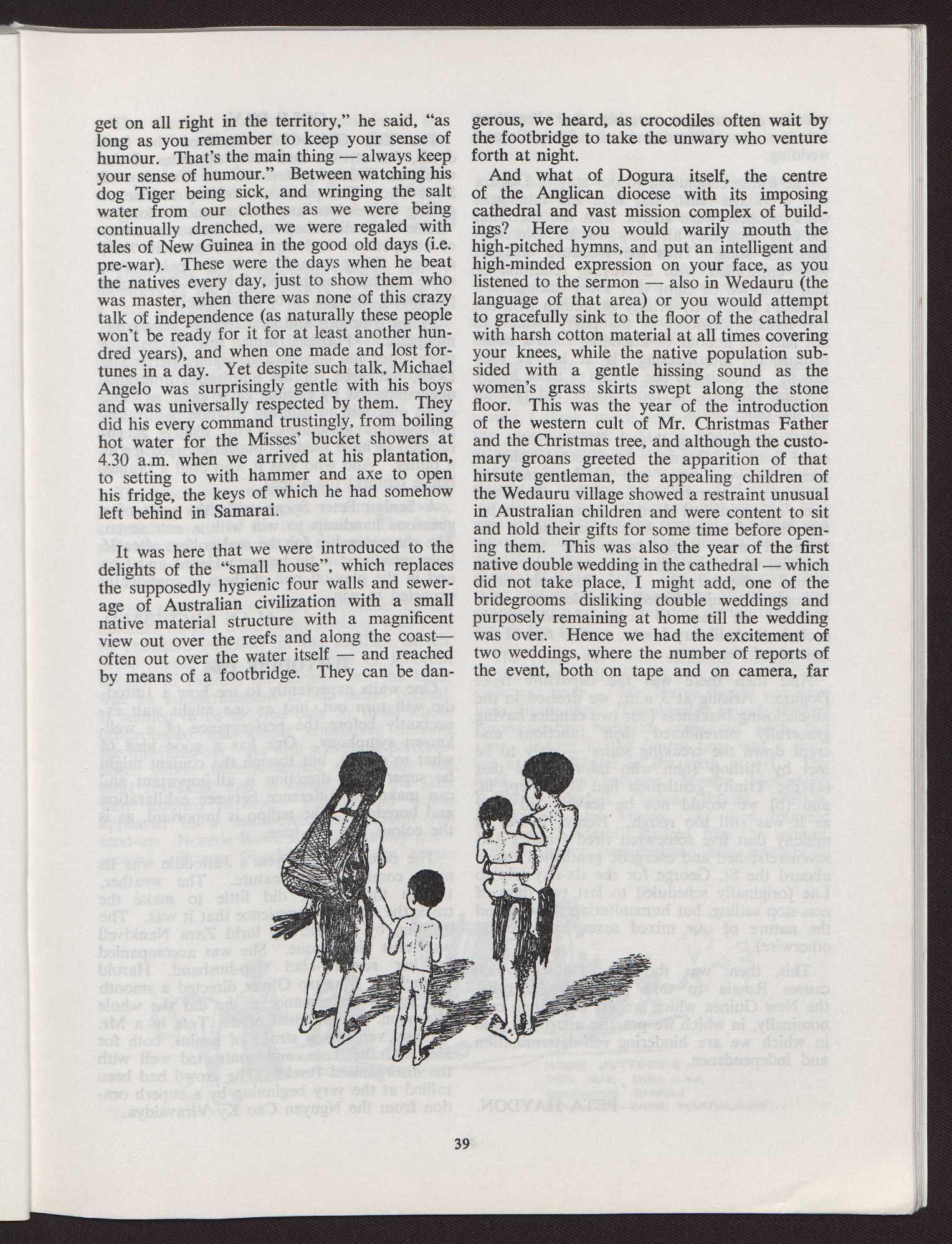
gerous, we heard, as crocodiles often wait by the footbridge to take the unwary who venture forth at night.
And what of Dogura itself, the centre of the Anglican diocese with its imposing cathedral and vast mission complex of buildings? Here you would warily mouth the high-pitched hymns, and put an intelligent and high-minded expression on your face, as you listened to the sermon — also in Wedauru (the language of that area) or you would attempt to gracefully sink to the floor of the cathedral with harsh cotton material at all times covering your knees, while the native population subsided with a gentle hissing sound as the women's grass skirts swept along the stone floor. This was the year of the introduction of the western cult of Mr. Christmas Father and the Christmas tree, and although the customary groans greeted the apparition of that hirsute gentleman, the appealing children of the Wedauru village showed a restraint unusual in Australian children and were content to sit and hold their gifts for some time before opening them. This was also the year of the first native double wedding in the cathedral — which did not take place, I might add, one of the bridegrooms disliking double weddings and purposely remaining at home till the wedding was over. Hence we had the excitement of two weddings, where the number of reports of the event, both on tape and on camera, far
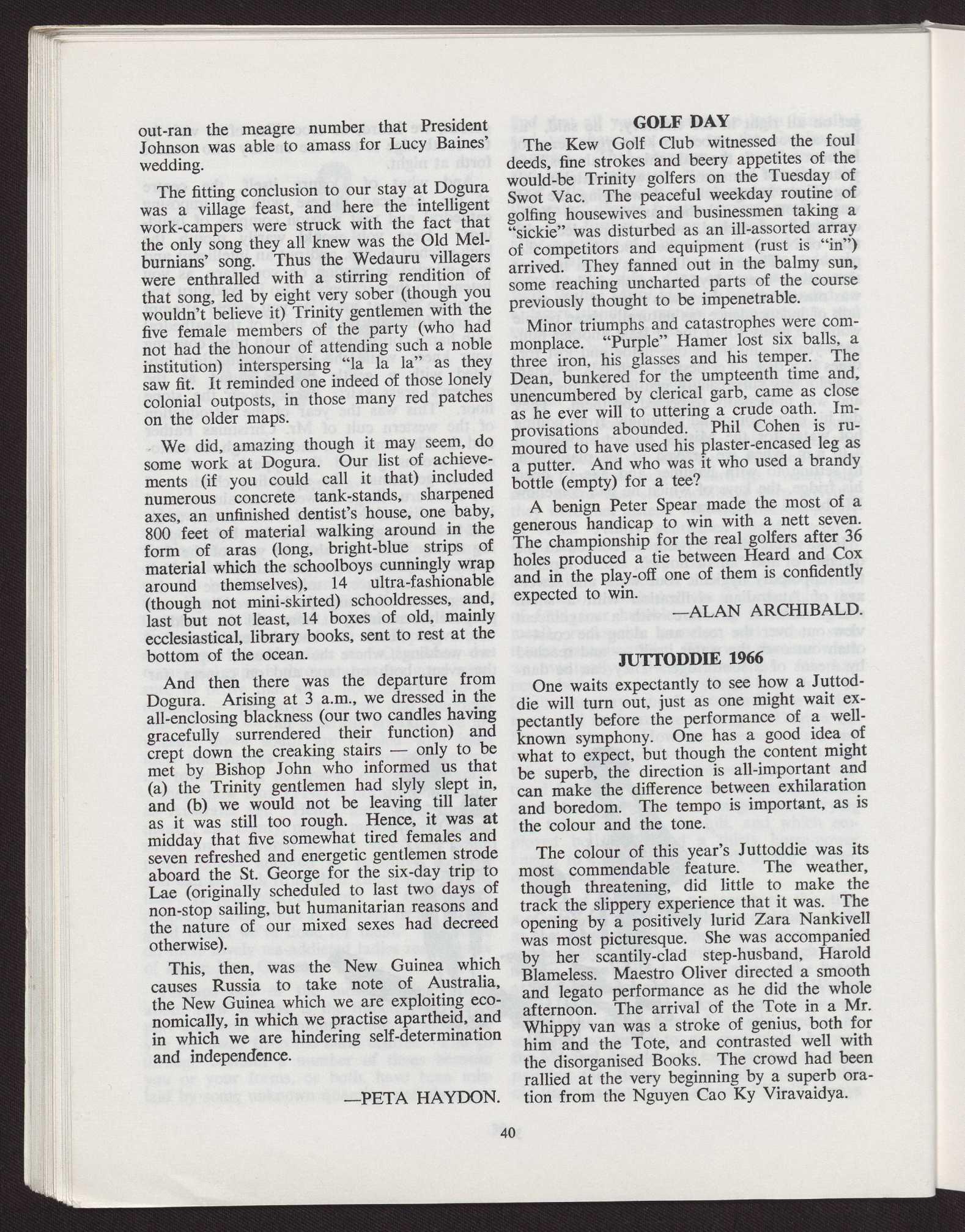
out-ran the meagre number that President Johnson was able to amass for Lucy Baines' wedding.
The fitting conclusion to our stay at Dogura was a village feast, and here the intelligent work-campers were struck with the fact that the only song they all knew was the Old Melburnians' song. Thus the Wedauru villagers were enthralled with a stirring rendition of that song, led by eight very sober (though you wouldn't believe it) Trinity gentlemen with the five female members of the party (who had not had the honour of attending such a noble institution) interspersing "la la la" as they saw fit. It reminded one indeed of those lonely colonial outposts, in those many red patches on the older maps.
We did, amazing though it may seem, do some work at Dogura. Our list of achievements (if you could call it that) included numerous concrete tank-stands, sharpened axes, an unfinished dentist's house, one baby, 800 feet of material walking around in the form of aras (long, bright-blue strips of material which the schoolboys cunningly wrap around themselves), 14 ultra-fashionable (though not mini-skirted) schooldresses, and, last but not least, 14 boxes of old, mainly ecclesiastical, library books, sent to rest at the bottom of the ocean.
And then there was the departure from Dogura. Arising at 3 a.m., we dressed in the all-enclosing blackness (our two candles having gracefully surrendered their function) and crept down the creaking stairs — only to be met by Bishop John who informed us that (a) the Trinity gentlemen had slyly slept in, and (b) we would not be leaving till later as it was still too rough. Hence, it was at midday that five somewhat tired females and seven refreshed and energetic gentlemen strode aboard the St. George for the six-day trip to Lae (originally scheduled to last two days of non-stop sailing, but humanitarian reasons and the nature of our mixed sexes had decreed otherwise),
This, then, was the New Guinea which causes Russia to take note of Australia, the New Guinea which we are exploiting economically, in which we practise apartheid, and in which we are hindering self-determination and independence.
—PETA HAYDON.
The Kew Golf Club witnessed the foul deeds, fine strokes and beery appetites of the would-be Trinity golfers on the Tuesday of Swot Vac. The peaceful weekday routine of golfing housewives and businessmen taking a "sickie" was disturbed as an ill-assorted array of competitors and equipment (rust is "in") arrived. They fanned out in the balmy sun, some reaching uncharted parts of the course previously thought to be impenetrable.
Minor triumphs and catastrophes were commonplace. "Purple" Hamer lost six balls, a three iron, his glasses and his temper. The Dean, bunkered for the umpteenth time and, unencumbered by clerical garb, came as close as he ever will to uttering a crude oath. Improvisations abounded. Phil Cohen is rumoured to have used his plaster-encased leg as a putter. And who was it who used a brandy bottle (empty) for a tee?
A benign Peter Spear made the most of a generous handicap to win with a nett seven. The championship for the real golfers after 36 holes produced a tie between Heard and Cox and in the play-off one of them is confidently expected to win.
—ALAN ARCHIBALD.
One waits expectantly to see how a Juttoddie will turn out, just as one might wait expectantly before the performance of a wellknown symphony. One has a good idea of what to expect, but though the content might be superb, the direction is all-important and can make the difference between exhilaration and boredom. The tempo is important, as is the colour and the tone.
The colour of this year's Juttoddie was its most commendable feature. The weather, though threatening, did little to make the track the slippery experience that it was. The opening by a positively lurid Zara Nankivell was most picturesque. She was accompanied by her scantily-clad step-husband, Harold Blameless. Maestro Oliver directed a smooth and legato performance as he did the whole afternoon. The arrival of the Tote in a Mr. Whippy van was a stroke of genius, both for him and the Tote, and contrasted well with the disorganised Books. The crowd had been rallied at the very beginning by a superb oration from the Nguyen Cao Ky Viravaidya.
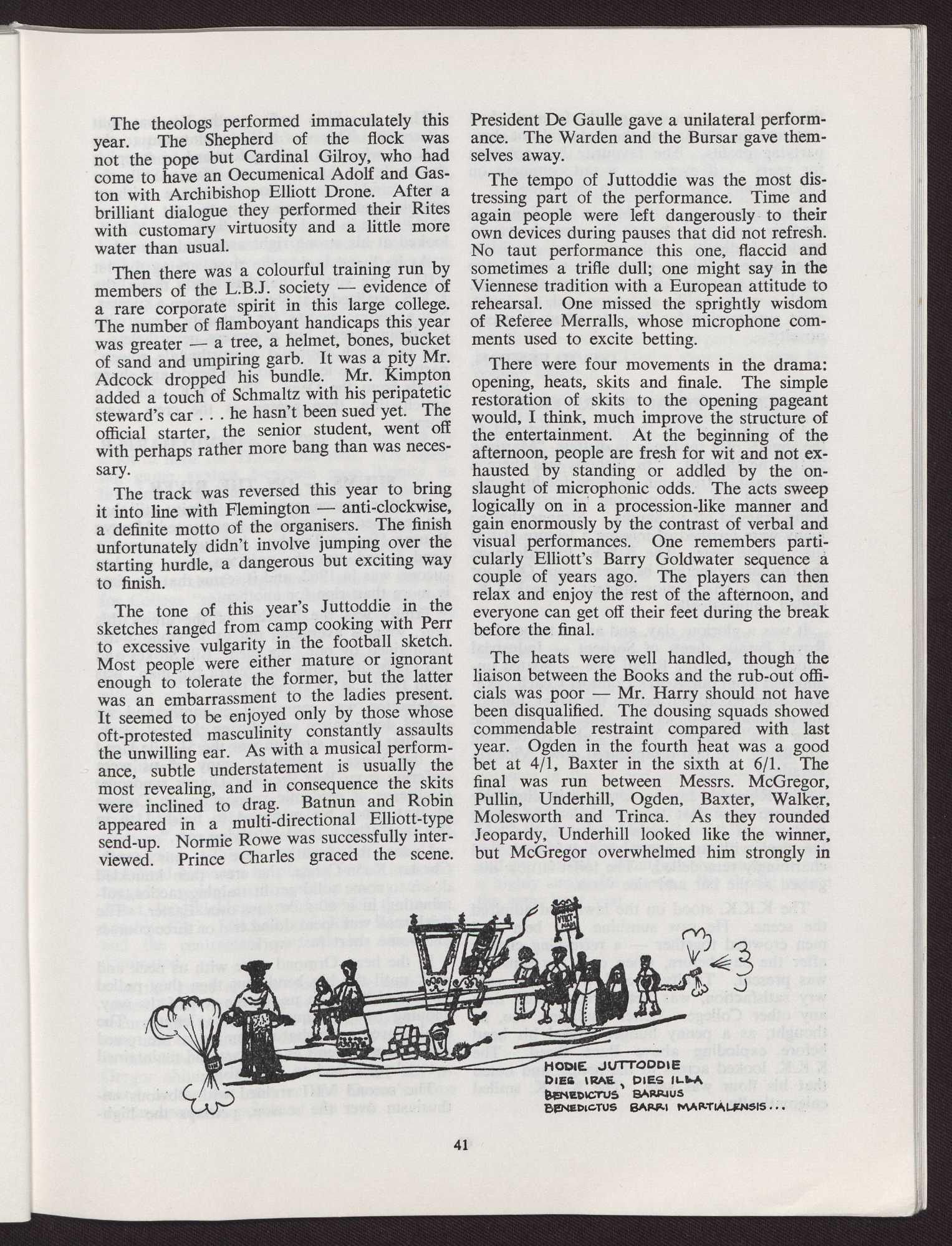
The theologs performed immaculately this year. The Shepherd of the flock was not the pope but Cardinal Gilroy, who had come to have an Oecumenical Adolf and Gaston with Archibishop Elliott Drone. After a brilliant dialogue they performed their Rites with customary virtuosity and a little more water than usual.
Then there was a colourful training run by members of the L.B.J. society — evidence of a rare corporate spirit in this large college. The number of flamboyant handicaps this year was greater — a tree, a helmet, bones, bucket of sand and umpiring garb. It was a pity Mr. Adcock dropped his bundle. Mr. Kimpton added a touch of Schmaltz with his peripatetic steward's car ... he hasn't been sued yet. The official starter, the senior student, went off with perhaps rather more bang than was necessary.
The track was reversed this year to bring it into line with Flemington — anti-clockwise, a definite motto of the organisers. The finish unfortunately didn't involve jumping over the starting hurdle, a dangerous but exciting way to finish.
The tone of this year's Juttoddie in the sketches ranged from camp cooking with Perr to excessive vulgarity in the football sketch. Most people were either mature or ignorant enough to tolerate the former, but the latter was an embarrassment to the ladies present. It seemed to be enjoyed only by those whose oft-protested masculinity constantly assaults the unwilling ear. As with a musical performance, subtle understatement is usually the most revealing, and in consequence the skits were inclined to drag. Batnun and Robin appeared in a multi-directional Elliott-type send-up. Normie Rowe was successfully interviewed. Prince Charles graced the scene.
President De Gaulle gave a unilateral performance. The Warden and the Bursar gave themselves away.
The tempo of Juttoddie was the most distressing part of the performance. Time and again people were left dangerously to their own devices during pauses that did not refresh. No taut performance this one, flaccid and sometimes a trifle dull; one might say in the Viennese tradition with a European attitude to rehearsal. One missed the sprightly wisdom of Referee Merralls, whose microphone comments used to excite betting.
There were four movements in the drama: opening, heats, skits and finale. The simple restoration of skits to the opening pageant would, I think, much improve the structure of the entertainment. At the beginning of the afternoon, people are fresh for wit and not exhausted by standing or addled by the onslaught of microphonic odds. The acts sweep logically on in a procession-like manner and gain enormously by the contrast of verbal and visual performances. One remembers particularly Elliott's Barry Goldwater sequence a couple of years ago. The players can then relax and enjoy the rest of the afternoon, and everyone can get off their feet during the break before the final.
The heats were well handled, though the liaison between the Books and the rub-out officials was poor — Mr. Harry should not have been disqualified. The dousing squads showed commendable restraint compared with last year. Ogden in the fourth heat was a good bet at 4/1, Baxter in the sixth at 6/1. The final was run between Messrs. McGregor, Pullin, Underhill, Ogden, Baxter, Walker, Molesworth and Trinca. As they rounded Jeopardy, Underhill looked like the winner, but McGregor overwhelmed him strongly in
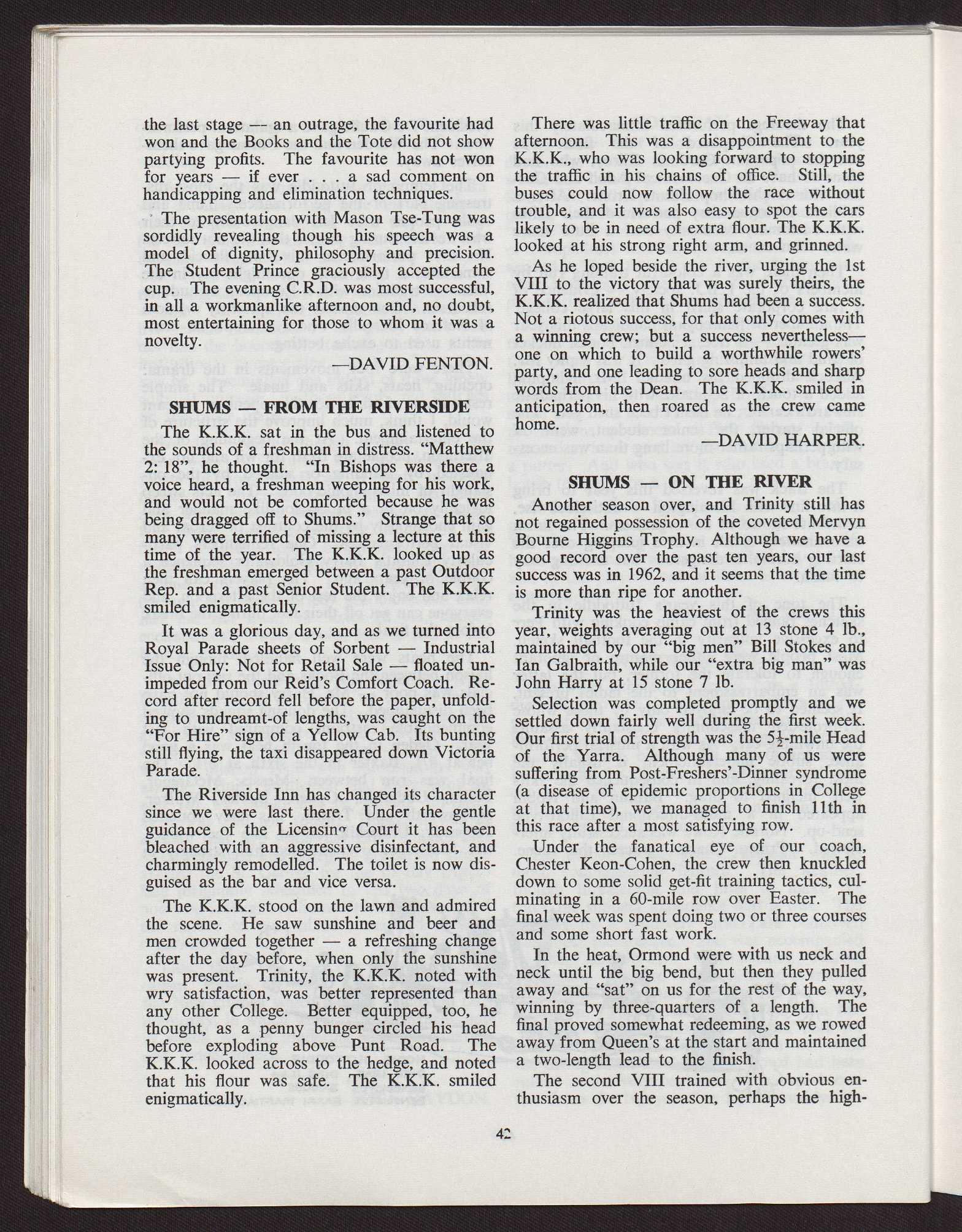
the last stage -- an outrage, the favourite had won and the Books and the Tote did not show partying profits. The favourite has not won for years — if ever . . . a sad comment on handicapping and elimination techniques.
The presentation with Mason Tse-Tung was sordidly revealing though his speech was a model of dignity, philosophy and precision. The Student Prince graciously accepted the cup. The evening C.R.D. was most successful, in all a workmanlike afternoon and, no doubt, most entertaining for those to whom it was a novelty.
—DAVID FENTON.
The K.K.K. sat in the bus and listened to the sounds of a freshman in distress. "Matthew 2: 18", he thought. "In Bishops was there a voice heard, a freshman weeping for his work, and would not be comforted because he was being dragged off to Shums." Strange that so many were terrified of missing a lecture at this time of the year. The K.K.K. looked up as the freshman emerged between a past Outdoor Rep. and a past Senior Student. The K.K.K. smiled enigmatically.
It was a glorious day, and as we turned into Royal Parade sheets of Sorbent — Industrial Issue Only: Not for Retail Sale — floated unimpeded from our Reid's Comfort Coach. Record after record fell before the paper, unfolding to undreamt-of lengths, was caught on the "For Hire" sign of a Yellow Cab. Its bunting still flying, the taxi disappeared down Victoria Parade.
The Riverside Inn has changed its character since we were last there. Under the gentle guidance of the Licensinn Court it has been bleached with an aggressive disinfectant, and charmingly remodelled. The toilet is now disguised as the bar and vice versa.
The K.K.K. stood on the lawn and admired the scene. He saw sunshine and beer and men crowded together — a refreshing change after the day before, when only the sunshine was present. Trinity, the K.K.K. noted with wry satisfaction, was better represented than any other College. Better equipped, too, he thought, as a penny bunger circled his head before exploding above Punt Road. The K.K.K. looked across to the hedge, and noted that his flour was safe. The K.K.K. smiled enigmatically.
There was little traffic on the Freeway that afternoon. This was a disappointment to the K.K.K., who was looking forward to stopping the traffic in his chains of office. Still, the buses could now follow the race without trouble, and it was also easy to spot the cars likely to be in need of extra flour. The K.K.K. looked at his strong right arm, and grinned.
As he loped beside the river, urging the 1st VIII to the victory that was surely theirs, the K.K.K. realized that Shums had been a success. Not a riotous success, for that only comes with a winning crew; but a success nevertheless— one on which to build a worthwhile rowers' party, and one leading to sore heads and sharp words from the Dean. The K.K.K. smiled in anticipation, then roared as the crew came home.
—DAVID HARPER.
Another season over, and Trinity still has not regained possession of the coveted Mervyn Bourne Higgins Trophy. Although we have a good record over the past ten years, our last success was in 1962, and it seems that the time is more than ripe for another.
Trinity was the heaviest of the crews this year, weights averaging out at 13 stone 4 lb., maintained by our "big men" Bill Stokes and Ian Galbraith, while our "extra big man" was John Harry at 15 stone 7 lb.
Selection was completed promptly and we settled down fairly well during the first week. Our first trial of strength was the 5+-mile Head of the Yarra. Although many of us were suffering from Post-Freshers'-Dinner syndrome (a disease of epidemic proportions in College at that time), we managed to finish 11th in this race after a most satisfying row.
Under the fanatical eye of our coach, Chester Keon-Cohen, the crew then knuckled down to some solid get-fit training tactics, culminating in a 60-mile row over Easter. The final week was spent doing two or three courses and some short fast work.
In the heat, Ormond were with us neck and neck until the big bend, but then they pulled away and "sat" on us for the rest of the way, winning by three-quarters of a length. The final proved somewhat redeeming, as we rowed away from Queen's at the start and maintained a two-length lead to the finish.
The second VIII trained with obvious enthusiasm over the season, perhaps the high-

light of their programme being the training row up to the Anglers' Arms at Essendon. Here they spent several hours quenching their deep thirsts before commencing the row back, perhaps a little less steady in the water than usual. Despite concentrated training by coach Peter Druce, however, the crew did not have as much finesse as Ormond or Newman, and were beaten by these colleges in the heat and final respectively.
Trinity had a fairly good representation in the Intervarsity squad this year with Bill Stokes and John Harry in the crew, John Henry as cox, and David Elder and Roger Wakefield as reserves.
The intercollegiate football was marked by a lot of firsts for Trinity this year. The opening game against Newman gave Trinity its first intercollegiate win in some five seasons, and marked, with a vengeance, a break with what was rapidly becoming a strong tradition. The pandemonium in the hall that night evidenced a re-awakening of interest in football throughout the College, and a shot in the arm for College "spirit". Not only did Trinity defeat all the other Colleges, it almost won its first premiership in a decade.
The most memorable match was the opening one against Newman. Trinity won in magnificent style with great individual and team play, after an uncertain start. Having kept within striking distance up to half-time, Trinity came out in the third quarter and slammed on a withering burst of seven goals which put Newman at arm's length for the rest of the game. The game was a study in contrasting styles of play. Newman relied on their "quick reaction" brand of football and played the short game Trinity, on the other hand, immobilised Newman by playing it fast and very ruggedly, going on to swamp them with a direct, long-kicking game in which the rucks, notably Chris Mitchell and John Renowden, and the centremen, particularly Ainsworth, dominated.
In the game against Queen's we were prevented from developing any real system; inaccuracy in front of goal kept us under pressure, and the game developed into a hard slog. In the third quarter, with Ainsworth and McGregor shining, Trinity broke clear, but relaxed in the last quarter and Queen's came within seventeen points at the end.
Showers punctuated the game against Ormond and consequently the standard was inferior and the defences were on top all day, but a ten-point win put us in the final.
We lost to Newman in the final by three points. With a typical display of fanaticism, Newman got the jump on a somewhat lethargic Trinity team and maintained a lead of about four goals to three-quarter time. Newman were handling the greasy conditions better, Trinity's ruck strength was held, and we were losing around the packs. Furthermore, there was little co-ordination on our part, particularly in attack, and the Trinity supporters were becoming irascible.
From half-time Trinity began to come into the game and, although there was no thirdquarter breakthrough to put us in the lead, the tempo steadily heightened. In the last quarter Trinity continually raced into attack and the game developed into a tense, hard-hitting test of endurance. Players who had been quiet earlier came in to take over from others like Wilson, Guy, Brown and Darling, who had been battling all day. Finally, as it had begun, the season ended on a sensational note when Trinity missed the deciding shot for goal in the dying moments of the game.
Trinity was, it was conceded by the other Colleges, the best side in the competition. For those curious to know the reason for the sudden reversal in performance, it could be attributed to the greater all-round strength in the side, which included new players such as Stuart McGregor, Ross Macaw, Geoff Ross, and John Renowden; and to the greater experience of the second-year players like Chris Mitchell and Geoff Ainsworth (who were equal best-and-fairest footballer), Terry Brown, Marc Pruden, Ian Mitchell and Mike Standish. Also, perhaps, the team was more closely knit and purposeful. Whatever the reason, it was a highly successful season. We should expect the same next year.

A perusal of the Second XVIII notes in previous numbers of this learned journal reveals a persistent blend of levity and shamelessness, an ubiquitous braggadocio which men of finer feeling can only deplore. The 1966 season had about it the aura of classical tragedy. For the first time in living memory an impartial stranger would have recognized the Seconds as a football team, a team whose fortunes might be followed with pride and concern. Its noble struggle through the barrier raised by generations of defeat will long be remembered.
Whitley College had the misfortune to face this team in its first round. The game was played on the Royal Park ground in perfect windless conditions with a dry, light ball. Almost immediately, observers were amazed and delighted to see the men in green actually making position and marking. One could have sworn they knew what they were doing. The rumour rapidly spread that some sort of strategy was being employed. There were, of course, those traditionalists who objected that intelligence should be kept off the football field, but they were quickly silenced. By halftime, Whitley had not scored. In the third quarter, two adverse points made the Trinity percentage finite, but at the final siren it still stood at 5650.
After such a performance, the second round against Queen's was disappointing. A howling northerly blew straight across the Princes Park ground, taking all the skill with it, and reducing the match to an undignified scuffle. The spectators' cries for blood were whipped away by the breeze. By mutual consent, scoring shots were kept to a minimum, Trinity eventually winning by 29 points to 17.
For a long time it was doubtful whether the International House match was going to start at all, the opposing captains very sensibly declining to begin without an umpire. But the boys were champing at their bits, and eventually John Tibballs courageously consented to fill the office. That Trinity was again victorious cannot fairly be attributed to his guidance alone.
If the reader will pause awhile to consider, he will be struck by the indisputable fact that a Trinity College Second XVIII had now won three matches in a row, a feat surely unprecedented in the history of football. Under the
elegant captaincy of John S. Robert, a great first had been achieved. But success is as hard to maintain as the writer's serene objectivity: we were done out of the premiership by a bunch of bloody aspergillum-waving papists. At the half-way mark in the final match, when the spectators began to drift off to watch the Firsts take the field, Trinity had definitely established itself as the better team. Things seemed pretty-well under control. One of the more perspicacious sideliners was heard to remark that the boys looked like they were wading in treacle, but few could have guessed at that stage that the dreaded "Bulpadok boot" paralysis was about to strike. Somewhere during that last forty minutes of the season, Trinity's heritage caught up with it. The Newman players, whose average groundspeed was authoritatively calculated at precisely 2.7 times that of their opponents, streaked to the lead and won going away. What made the defeat so shattering was that this time we had had something to lose.
"Oh 1"The sigh went up from Newman as their man served another double-fault for the tenth deuce of the game. Could Trinity take the last match and beat Newman by one set?
A beautiful return from Geoff. Ross made it our ad., and, with a smash from Hopkins, Trinity went to a 5-2 lead. Looking calm and unflurried — in direct contrast to the spectators — Hop. held serve easily, and Newman went down 15 sets to 16.
Against Ormond on the morrow, however, things were to be different. At lunch we were 4-2 up, Marc Pruden surviving a 1-6 first set to make the fourth win. Victory seemed certain.
After lunch at Ormond — the like of which has never been seen in Syd's domain — a feeling of lassitude settled over the team, allowing Ormond to lead 5-4 after the first round of doubles. Then, hope. With Pruden dominating the net, the second pair scored a win. 6-5 Ormond's way.
With 3-all in the third set, Brown and Ainsworth held the key. But the Ormond first pair produced their best tennis for the day, and held on to win 6-4.
Trinity lost 5 matches to 7, and in the final Queen's comfortably defeated Ormond 7-3.
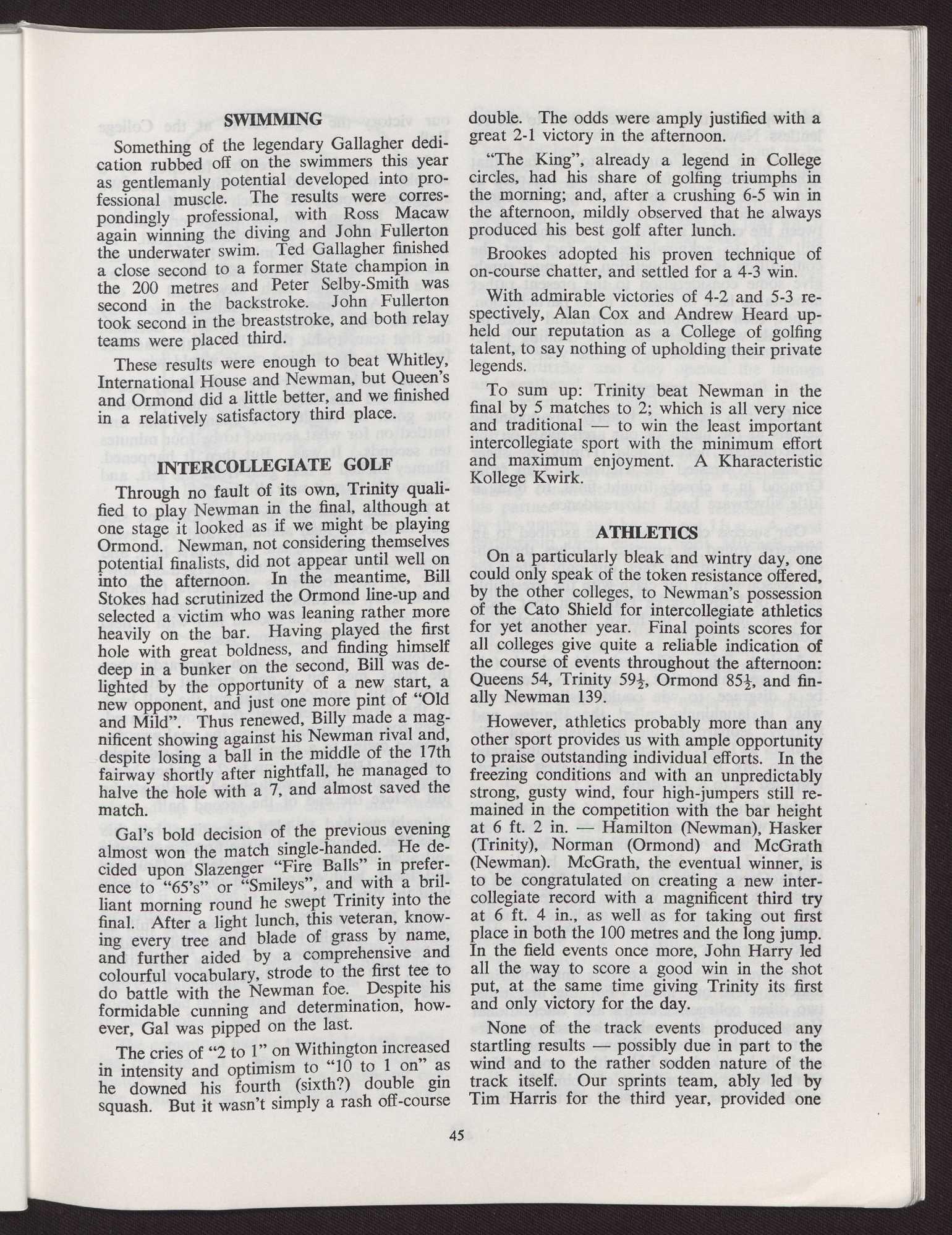
Something of the legendary Gallagher dedication rubbed off on the swimmers this year as gentlemanly potential developed into professional muscle. The results were correspondingly professional, with Ross Macaw again winning the diving and John Fullerton the underwater swim. Ted Gallagher finished a close second to a former State champion in the 200 metres and Peter Selby-Smith was second in the backstroke. John Fullerton took second in the breaststroke, and both relay teams were placed third.
These results were enough to beat Whitley, International House and Newman, but Queen's and Ormond did a little better, and we finished in a relatively satisfactory third place.
Through no fault of its own, Trinity qualified to play Newman in the final, although at one stage it looked as if we might be playing Ormond. Newman, not considering themselves potential finalists, did not appear until well on into the afternoon. In the meantime, Bill Stokes had scrutinized the Ormond line-up and selected a victim who was leaning rather more heavily on the bar. Having played the first hole with great boldness, and finding himself deep in a bunker on the second, Bill was delighted by the opportunity of a new start, a new opponent, and just one more pint of "Old and Mild". Thus renewed, Billy made a magnificent showing against his Newman rival and, despite losing a ball in the middle of the 17th fairway shortly after nightfall, he managed to halve the hole with a 7, and almost saved the match.
Gal's bold decision of the previous evening almost won the match single-handed. He decided upon Slazenger "Fire Balls" in preference to "65's" or "Smileys", and with a brilliant morning round he swept Trinity into the final. After a light lunch, this veteran, knowing every tree and blade of grass by name, and further aided by a comprehensive and colourful vocabulary, strode to the first tee to do battle with the Newman foe. Despite his formidable cunning and determination, however, Gal was pipped on the last.
The cries of "2 to 1" on Withington increased in intensity and optimism to "10 to 1 on" as he downed his fourth (sixth?) double gin squash. But it wasn't simply a rash off-course
double. The odds were amply justified with a great 2-1 victory in the afternoon.
"The King", already a legend in College circles, had his share of golfing triumphs in the morning; and, after a crushing 6-5 win in the afternoon, mildly observed that he always produced his best golf after lunch.
Brookes adopted his proven technique of on-course chatter, and settled for a 4-3 win.
With admirable victories of 4-2 and 5-3 respectively, Alan Cox and Andrew Heard upheld our reputation as a College of golfing talent, to say nothing of upholding their private legends.
To sum up: Trinity beat Newman in the final by 5 matches to 2; which is all very nice and traditional — to win the least important intercollegiate sport with the minimum effort and maximum enjoyment. A Kharacteristic Kollege Kwirk.
On a particularly bleak and wintry day, one could only speak of the token resistance offered, by the other colleges, to Newman's possession of the Cato Shield for intercollegiate athletics for yet another year. Final points scores for all colleges give quite a reliable indication of the course of events throughout the afternoon: Queens 54, Trinity 591, Ormond 85f, and finally Newman 139.
However, athletics probably more than any other sport provides us with ample opportunity to praise outstanding individual efforts. In the freezing conditions and with an unpredictably strong, gusty wind, four high-jumpers still remained in the competition with the bar height at 6 ft. 2 in. — Hamilton (Newman), Hasker (Trinity), Norman (Ormond) and McGrath (Newman). McGrath, the eventual winner, is to be congratulated on creating a new intercollegiate record with a magnificent third try at 6 ft. 4 in., as well as for taking out first place in both the 100 metres and the long jump. In the field events once more, John Harry led all the way to score a good win in the shot put, at the same time giving Trinity its first and only victory for the day.
None of the track events produced any startling results — possibly due in part to the wind and to the rather sodden nature of the track itself. Our sprints team, ably led by Tim Harris for the third year, provided one
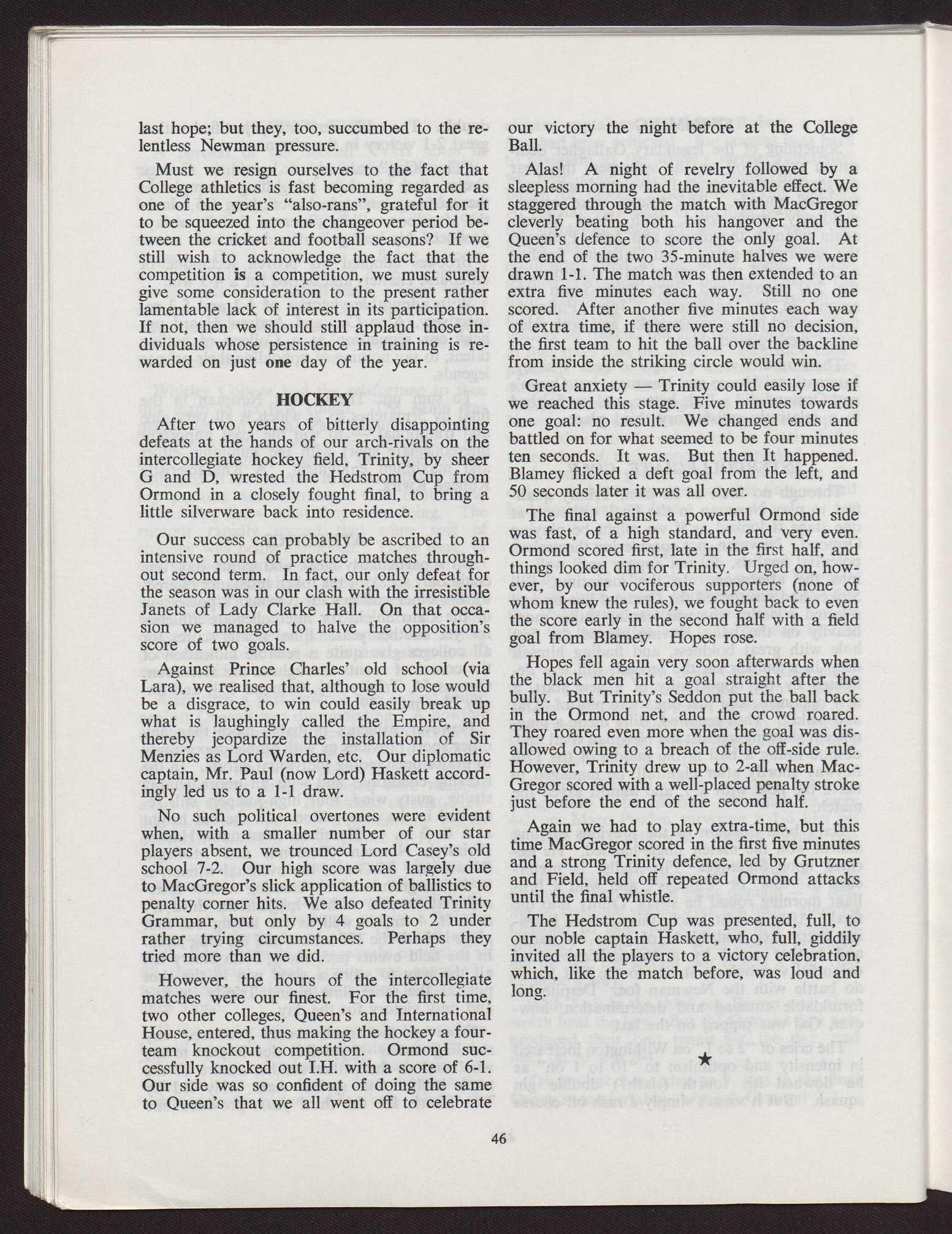
last hope; but they, too, succumbed to the relentless Newman pressure.
Must we resign ourselves to the fact that College athletics is fast becoming regarded as one of the year's "also-rans", grateful for it to be squeezed into the changeover period between the cricket and football seasons? If we still wish to acknowledge the fact that the competition is a competition, we must surely give some consideration to the present rather lamentable lack of interest in its participation. If not, then we should still applaud those individuals whose persistence in training is rewarded on just one day of the year.
After two years of bitterly disappointing defeats at the hands of our arch-rivals on the intercollegiate hockey field, Trinity, by sheer G and D, wrested the Hedstrom Cup from Ormond in a closely fought final, to bring a little silverware back into residence.
Our success can probably be ascribed to an intensive round of practice matches throughout second term. In fact, our only defeat for the season was in our clash with the irresistible Janets of Lady Clarke Hall. On that occasion we managed to halve the opposition's score of two goals.
Against Prince Charles' old school (via Lara), we realised that, although to lose would be a disgrace, to win could easily break up what is laughingly called the Empire, and thereby jeopardize the installation of Sir Menzies as Lord Warden, etc. Our diplomatic captain, Mr. Paul (now Lord) Haskett accordingly led us to a 1-1 draw.
No such political overtones were evident when, with a smaller number of our star players absent, we trounced Lord Casey's old school 7-2. Our high score was largely due to MacGregor's slick application of ballistics to penalty corner hits. We also defeated Trinity Grammar, but only by 4 goals to 2 under rather trying circumstances. Perhaps they tried more than we did.
However, the hours of the intercollegiate matches were our finest. For the first time, two other colleges, Queen's and International House, entered, thus making the hockey a fourteam knockout competition. Ormond successfully knocked out I.H. with a score of 6-l. Our side was so confident of doing the same to Queen's that we all went off to celebrate
our victory the night before at the College Ball.
Alas! A night of revelry followed by a sleepless morning had the inevitable effect. We staggered through the match with MacGregor cleverly beating both his hangover and the Queen's defence to score the only goal. At the end of the two 35-minute halves we were drawn 1-1. The match was then extended to an extra five minutes each way. Still no one scored. After another five minutes each way of extra time, if there were still no decision, the first team to hit the ball over the backline from inside the striking circle would win.
Great anxiety — Trinity could easily lose if we reached this stage. Five minutes towards one goal: no result. We changed ends and battled on for what seemed to be four minutes ten seconds. It was. But then It happened. Blarney flicked a deft goal from the left, and 50 seconds later it was all over.
The final against a powerful Ormond side was fast, of a high standard, and very even. Ormond scored first, late in the first half, and things looked dim for Trinity. Urged on, however, by our vociferous supporters (none of whom knew the rules), we fought back to even the score early in the second half with a field goal from Blarney. Hopes rose.
Hopes fell again very soon afterwards when the black men hit a goal straight after the bully. But Trinity's Seddon put the ball back in the Ormond net, and the crowd roared. They roared even more when the goal was disallowed owing to a breach of the off-side rule. However, Trinity drew up to 2-all when MacGregor scored with a well-placed penalty stroke just before the end of the second half.
Again we had to play extra-time, but this time MacGregor scored in the first five minutes and a strong Trinity defence, led by Grutzner and Field, held off repeated Ormond attacks until the final whistle.
The Hedstrom Cup was presented, full, to our noble captain Haskett, who, full, giddily invited all the players to a victory celebration, which, like the match before, was loud and long.
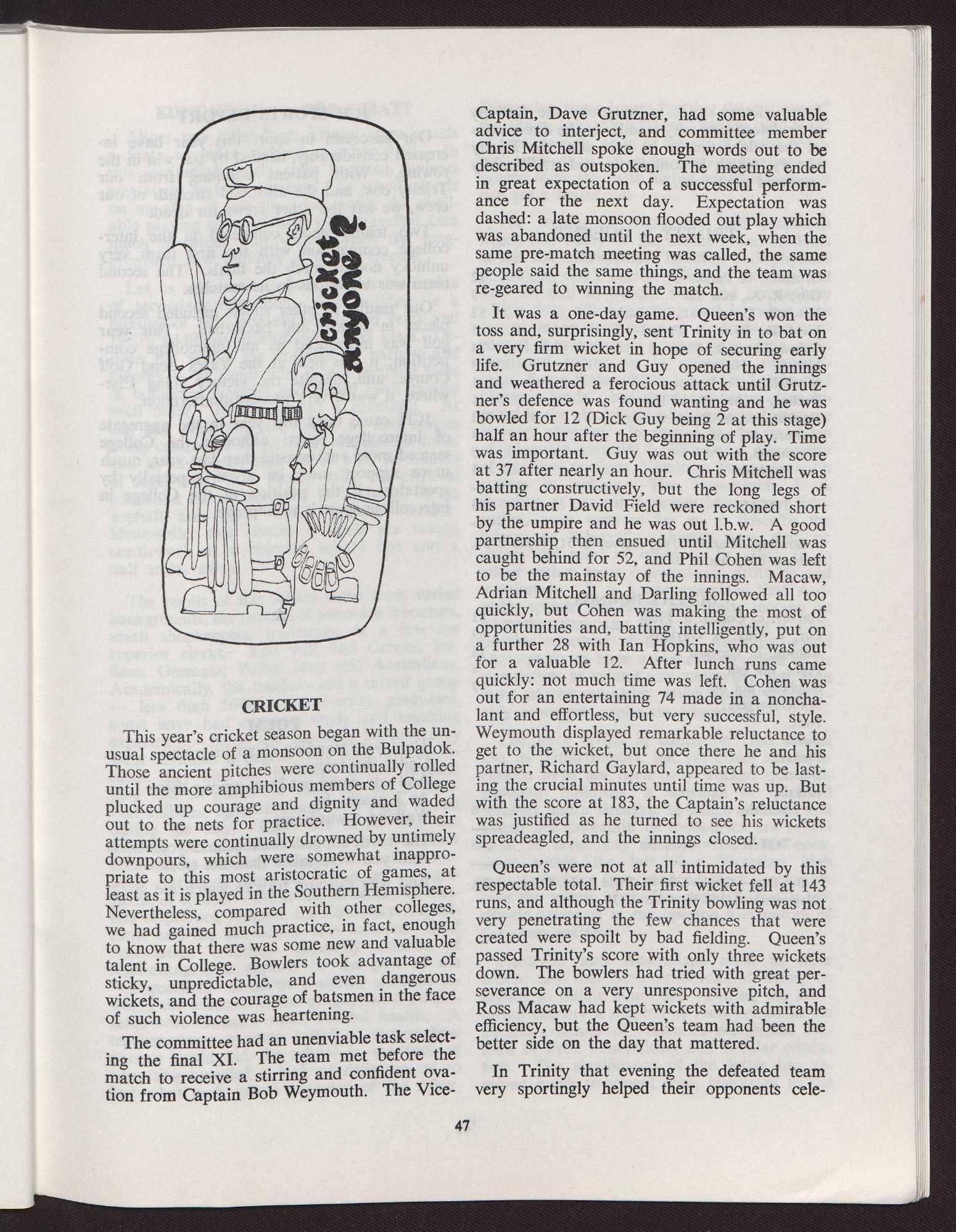
This year's cricket season began with the unusual spectacle of a monsoon on the Bulpadok. Those ancient pitches were continually rolled until the more amphibious members of College plucked up courage and dignity and waded out to the nets for practice. However, their attempts were continually drowned by untimely downpours, which were somewhat inappropriate to this most aristocratic of games, at least as it is played in the Southern Hemisphere. Nevertheless, compared with other colleges, we had gained much practice, in fact, enough to know that there was some new and valuable talent in College. Bowlers took advantage of sticky, unpredictable, and even dangerous wickets, and the courage of batsmen in the face of such violence was heartening.
The committee had an unenviable task selecting the final XI. The team met before the match to receive a stirring and confident ovation from Captain Bob Weymouth. The Vice-
Captain, Dave Grutzner, had some valuable advice to interject, and committee member Chris Mitchell spoke enough words out to be described as outspoken. The meeting ended in great expectation of a successful performance for the next day. Expectation was dashed: a late monsoon flooded out play which was abandoned until the next week, when the same pre-match meeting was called, the same people said the same things, and the team was re-geared to winning the match.
It was a one-day game. Queen's won the toss and, surprisingly, sent Trinity in to bat on a very firm wicket in hope of securing early life. Grutzner and Guy opened the innings and weathered a ferocious attack until Grutzner's defence was found wanting and he was bowled for 12 (Dick Guy being 2 at this stage) half an hour after the beginning of play. Time was important. Guy was out with the score at 37 after nearly an hour. Chris Mitchell was batting constructively, but the long legs of his partner David Field were reckoned short by the umpire and he was out 1.b.w. A good partnership then ensued until Mitchell was caught behind for 52, and Phil Cohen was left to be the mainstay of the innings. Macaw, Adrian Mitchell and Darling followed all too quickly, but Cohen was making the most of opportunities and, batting intelligently, put on a further 28 with Ian Hopkins, who was out for a valuable 12. After lunch runs came quickly: not much time was left. Cohen was out for an entertaining 74 made in a nonchalant and effortless, but very successful, style. Weymouth displayed remarkable reluctance to get to the wicket, but once there he and his partner, Richard Gaylard, appeared to be lasting the crucial minutes until time was up. But with the score at 183, the Captain's reluctance was justified as he turned to see his wickets spreadeagled, and the innings closed.
Queen's were not at all intimidated by this respectable total. Their first wicket fell at 143 runs, and although the Trinity bowling was not very penetrating the few chances that were created were spoilt by bad fielding. Queen's passed Trinity's score with only three wickets down. The bowlers had tried with great perseverance on a very unresponsive pitch, and Ross Macaw had kept wickets with admirable efficiency, but the Queen's team had been the better side on the day that mattered.
In Trinity that evening the defeated team very sportingly helped their opponents cele-
brate victory, and, to judge by the festivity after defeat, one may wonder at the dimensions of the celebration to be held after the Trinity victory, which is confidently and traditionally expected next year.
Grutzner, b. Parker .... ....
Guy, R. A., run out
Mitchell, C., c. wkt., b. Parker
Field, D., l.b.w., b. Parker
Cohen, 1.b.w., b. Pryor ....
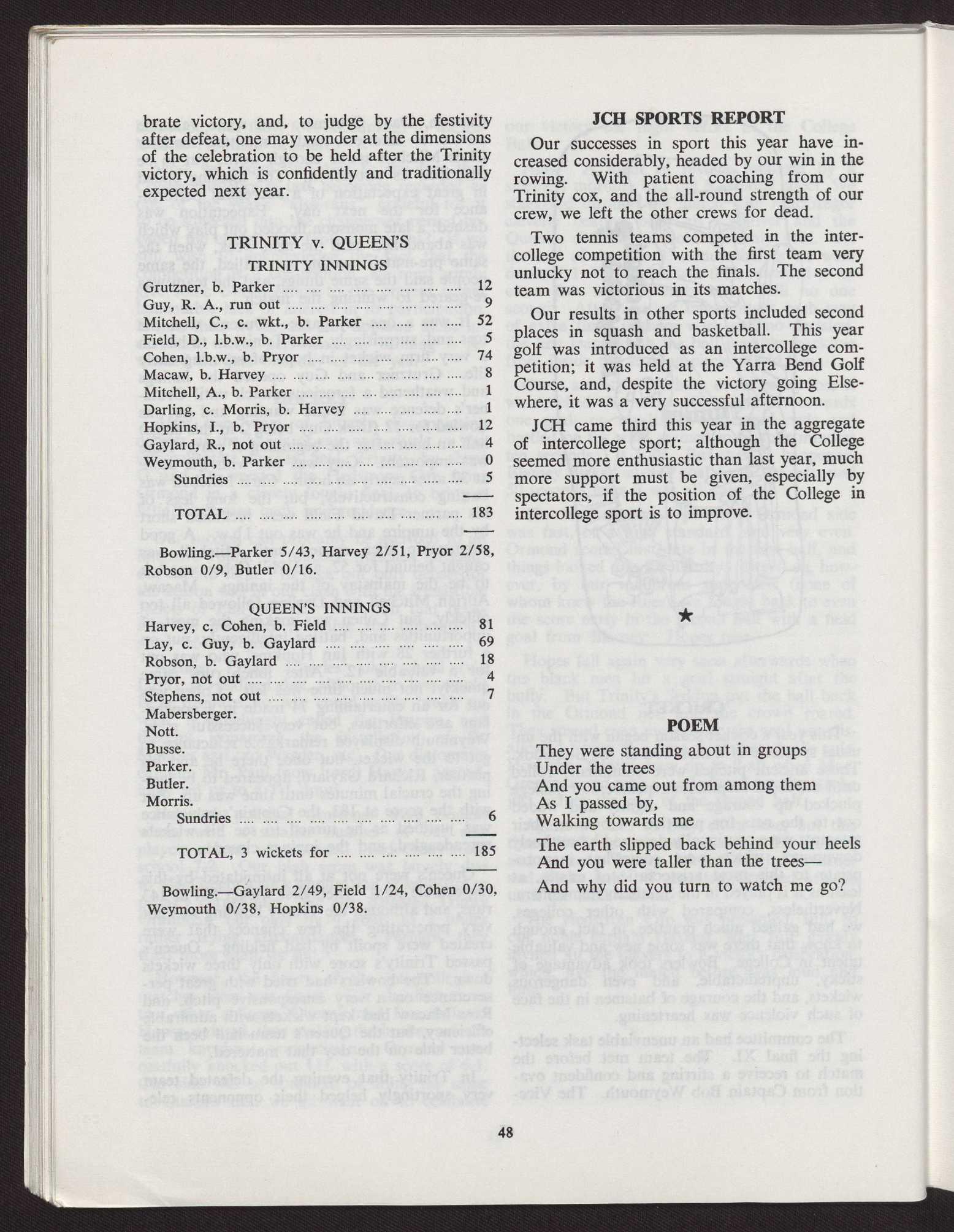
Bowling.—Parker 5/43, Harvey 2/51, Pryor 2/58, Robson 0/9, Butler 0/16.
Harvey, c. Cohen, b. Field .... .... Lay, c. Guy, b. Gaylard Robson, b. Gaylard .... .... Pryor, not out .... Stephens, not out Mabersberger.
Nott.
Busse. Parker. Butler. Morris.
Sundries .
TOTAL, 3 wickets for .... .... ....
Our successes in sport this year have increased considerably, headed by our win in the rowing. With patient coaching from our Trinity cox, and the all-round strength of our crew, we left the other crews for dead.
Two tennis teams competed in the intercollege competition with the first team very unlucky not to reach the finals. The second team was victorious in its matches.
Our results in other sports included second places in squash and basketball. This year golf was introduced as an intercollege competition; it was held at the Yarra Bend Golf Course, and, despite the victory going Elsewhere, it was a very successful afternoon.
JCH came third this year in the aggregate of intercollege sport; although the College seemed more enthusiastic than last year, much more support must be given, especially by spectators, if the position of the College in intercollege sport is to improve.
They were standing about in groups
Under the trees
And you came out from among them
As I passed by, 6 Walking towards me
185 The earth slipped back behind your heels
Bowling.—Gaylard 2/49, Field 1/24, Cohen 0/30, Weymouth 0/38, Hopkins 0/38.
And you were taller than the trees—
And why did you turn to watch me go?
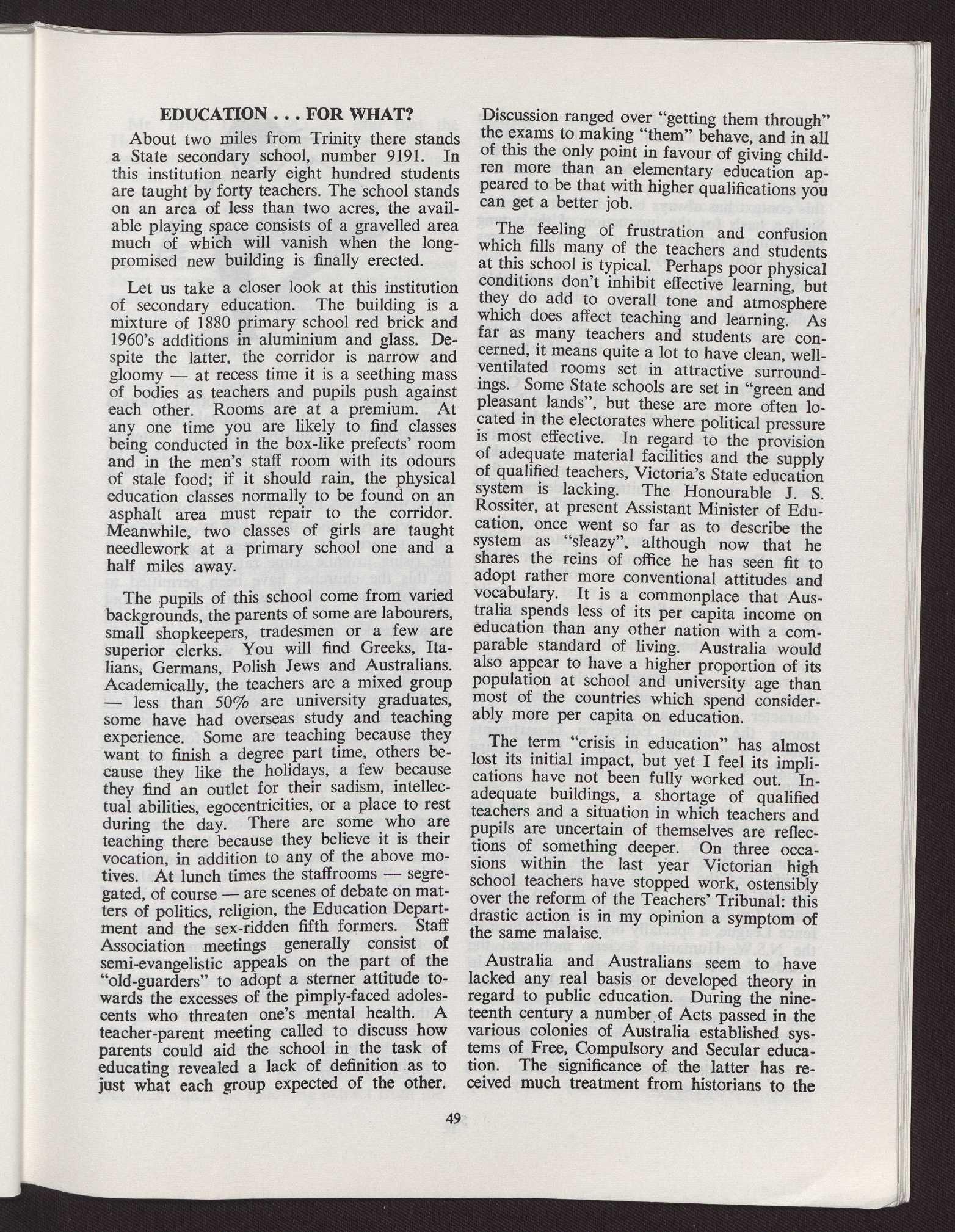
Discussion ranged over "getting them through"
About two miles from Trinity there stands the exams to making "them" behave, and in all a State secondary school, number 9191. In of this the only point in favour of giving childthis institution nearly eight hundred students ren more than an elementary education apare taught by forty teachers. The school stands peared to be that with higher qualifications you on an area of less than two acres, the avail- can get a better job. able playing space consists of a gravelled area
The feeling of frustration and confusion much of which will vanish when the long- which fills many of the teachers and students promised new building is finally erected. at this school is typical. Perhaps poor physical
Let us take a closer look at this institution conditions don't inhibit effective learning, but of secondary education. The building is a they do add to overall tone and atmosphere mixture of 1880 primary school red brick and which does affect teaching and learning. As 1960's additions in aluminium and glass. De- far as many teachers and students are conspite the latter, the corridor is narrow and cerned, it means quite a lot to have clean, wellgloom ventilated rooms set in attractive surround- gloomy — at recess time it is a seething mass ings' Some S State schools are set in "green bodies as teachers and pupils push against gr een and each other. Rooms are at a premium. At pleasant lands", but these are more often loany one time you are likely to find classes cated in the electorates where political pressure being conducted in the box-like prefects' room is most effective. In regard to the provision and in the men's staff room with its odours of adequate material facilities and the supply of stale food; if it should rain, the physical of qualified teachers, Victoria's State education education classes normally to be found on an system is lacking. The Honourable J. S. asphalt area must repair to the corridor. Rossiter, at present Assistant Minister of EduMeanwhile, two classes of girls are taught cation, once went so far as to describe the needlework at a primary school one and a system as "sleazy", although now that he half miles away. shares the reins of office he has seen fit to adopt rather more conventional attitudes and
The pupils of this school come from varied vocabulary. It is a commonplace that Ausbackgrounds, the parents of some are labourers, tralia spends less of its per capita income on small shopkeepers, tradesmen or a few are education than any other nation with a comparable standard of living. Australia would superior clerks. You will find Greeks, Italians, Germans, Polish Jews and Australians. also appear to have a higher proportion of its Academically, the teachers are a mixed group population at school and university age than — less than 50% are university graduates, most of the countries which spend considersome have had overseas study and teaching ably more per capita on education. experience. Some are teaching because they The term "crisis in education" has almost want to finish a degree part time, others be- lost its initial impact, but yet I feel its impli- cause they like the holidays, a few because cations have not been fully worked out. Inthey find an outlet for their sadism, intellec- adequate buildings, a shortage of tuai abilities, a ocentricities, or a place to rest q g g qualified Burin the day. There are some who are teachers and a situation in which teachers and teaching there because they believe it is their pupils s of something deeper.msOn themselves occa- vocation, in addition to any of the above motives. At lunch times the staffrooms — segre- school teachers have stopped work , ostensibly gated, of course — are scenes of debate on mat- over the reform of the Teachers' Tribunal• this ters of politics, religion, the Education Depart- drastic action is in my opinion a symptom of ment and the sex-ridden fifth formers. Staff the same malaise. Association meetings generally consist of semi-evangelistic appeals on the part of the Australia and Australians seem to have "old-guarders" to adopt a sterner attitude to- lacked any real basis or developed theory in wards the excesses of the pimply-faced adoles- regard to public education. During the ninecents who threaten one's mental health. A teenth century a number of Acts passed in the teacher-parent meeting called to discuss how various colonies of Australia established sysparents could aid the school in the task of tems of Free, Compulsory and Secular educaeducating revealed a lack of definition as to tion. The significance of the latter has rejust what each group expected of the other. ceived much treatment from historians to the
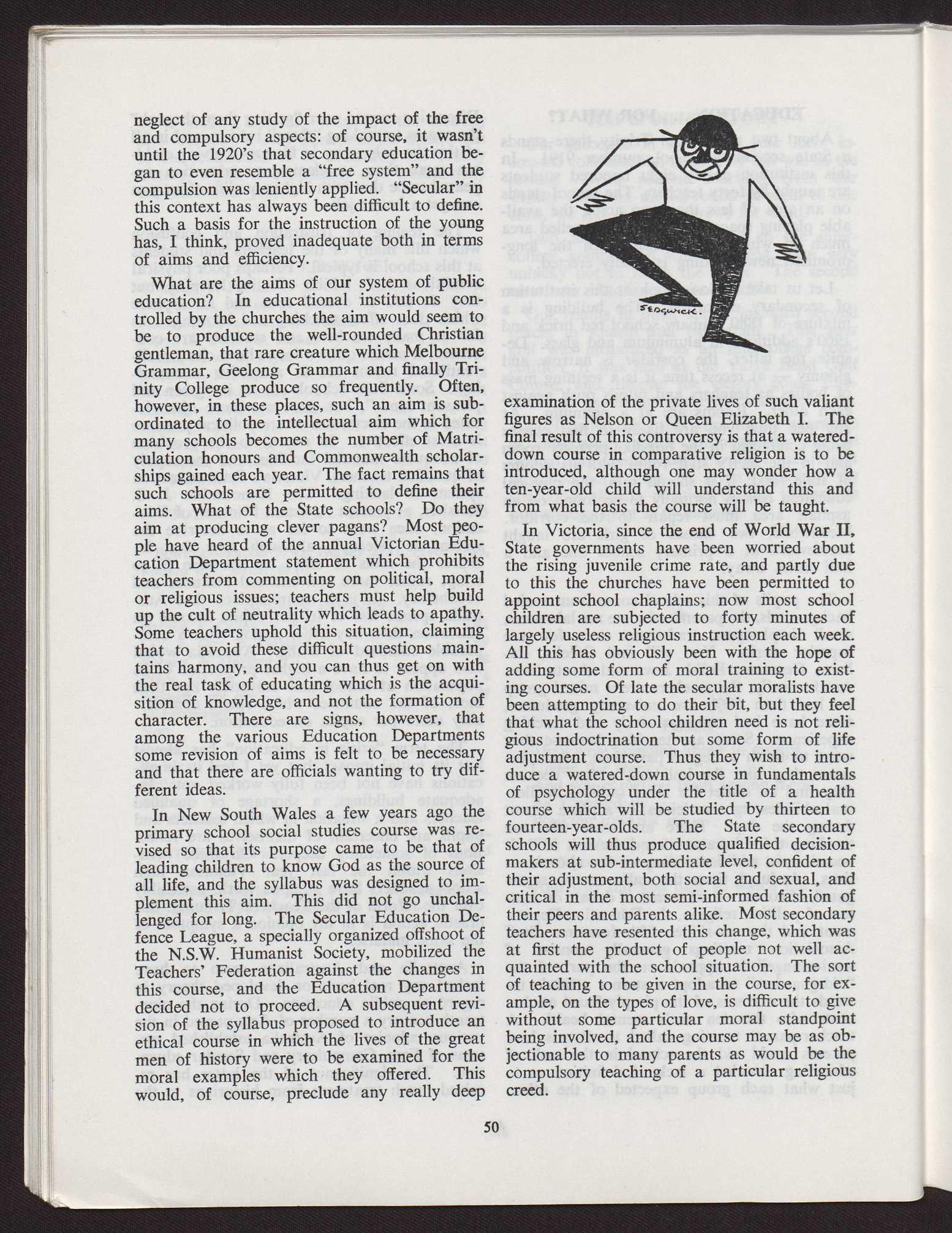
neglect of any study of the impact of the free and compulsory aspects: of course, it wasn't until the 1920's that secondary education began to even resemble a "free system" and the compulsion was leniently applied. "Secular" in this context has always been difficult to define. Such a basis for the instruction of the young has, I think, proved inadequate both in terms of aims and efficiency.
What are the aims of our system of public education? In educational institutions controlled by the churches the aim would seem to be to produce the well-rounded Christian gentleman, that rare creature which Melbourne Grammar, Geelong Grammar and finally Trinity College produce so frequently. Often, however, in these places, such an aim is subordinated to the intellectual aim which for many schools becomes the number of Matriculation honours and Commonwealth scholarships gained each year. The fact remains that such schools are permitted to define their aims. What of the State schools? Do they aim at producing clever pagans? Most people have heard of the annual Victorian Education Department statement which prohibits teachers from commenting on political, moral or religious issues; teachers must help build up the cult of neutrality which leads to apathy. Some teachers uphold this situation, claiming that to avoid these difficult questions maintains harmony, and you can thus get on with the real task of educating which is the acquisition of knowledge, and not the formation of character. There are signs, however, that among the various Education Departments some revision of aims is felt to be necessary and that there are officials wanting to try different ideas.
In New South Wales a few years ago the primary school social studies course was revised so that its purpose came to be that of leading children to know God as the source of all life, and the syllabus was designed to implement this aim. This did not go unchallenged for long. The Secular Education Defence League, a specially organized offshoot of the N.S.W. Humanist Society, mobilized the Teachers' Federation against the changes in this course, and the Education Department decided not to proceed. A subsequent revision of the syllabus proposed to introduce an ethical course in which the lives of the great men of history were to be examined for the moral examples which they offered. This would, of course, preclude any really deep
examination of the private lives of such valiant figures as Nelson or Queen Elizabeth I. The final result of this controversy is that a watereddown course in comparative religion is to be introduced, although one may wonder how a ten-year-old child will understand this and from what basis the course will be taught.
In Victoria, since the end of World War II, State governments have been worried about the rising juvenile crime rate, and partly due to this the churches have been permitted to appoint school chaplains; now most school children are subjected to forty minutes of largely useless religious instruction each week. All this has obviously been with the hope of adding some form of moral training to existing courses. Of late the secular moralists have been attempting to do their bit, but they feel that what the school children need is not religious indoctrination but some form of life adjustment course. Thus they wish to introduce a watered-down course in fundamentals of psychology under the title of a health course which will be studied by thirteen to fourteen-year-olds. The State secondary schools will thus produce qualified decisionmakers at sub-intermediate level, confident of their adjustment, both social and sexual, and critical in the most semi-informed fashion of their peers and parents alike. Most secondary teachers have resented this change, which was at first the product of people not well acquainted with the school situation. The sort of teaching to be given in the course, for example, on the types of love, is difficult to give without some particular moral standpoint being involved, and the course may be as objectionable to many parents as would be the compulsory teaching of a particular religious creed.
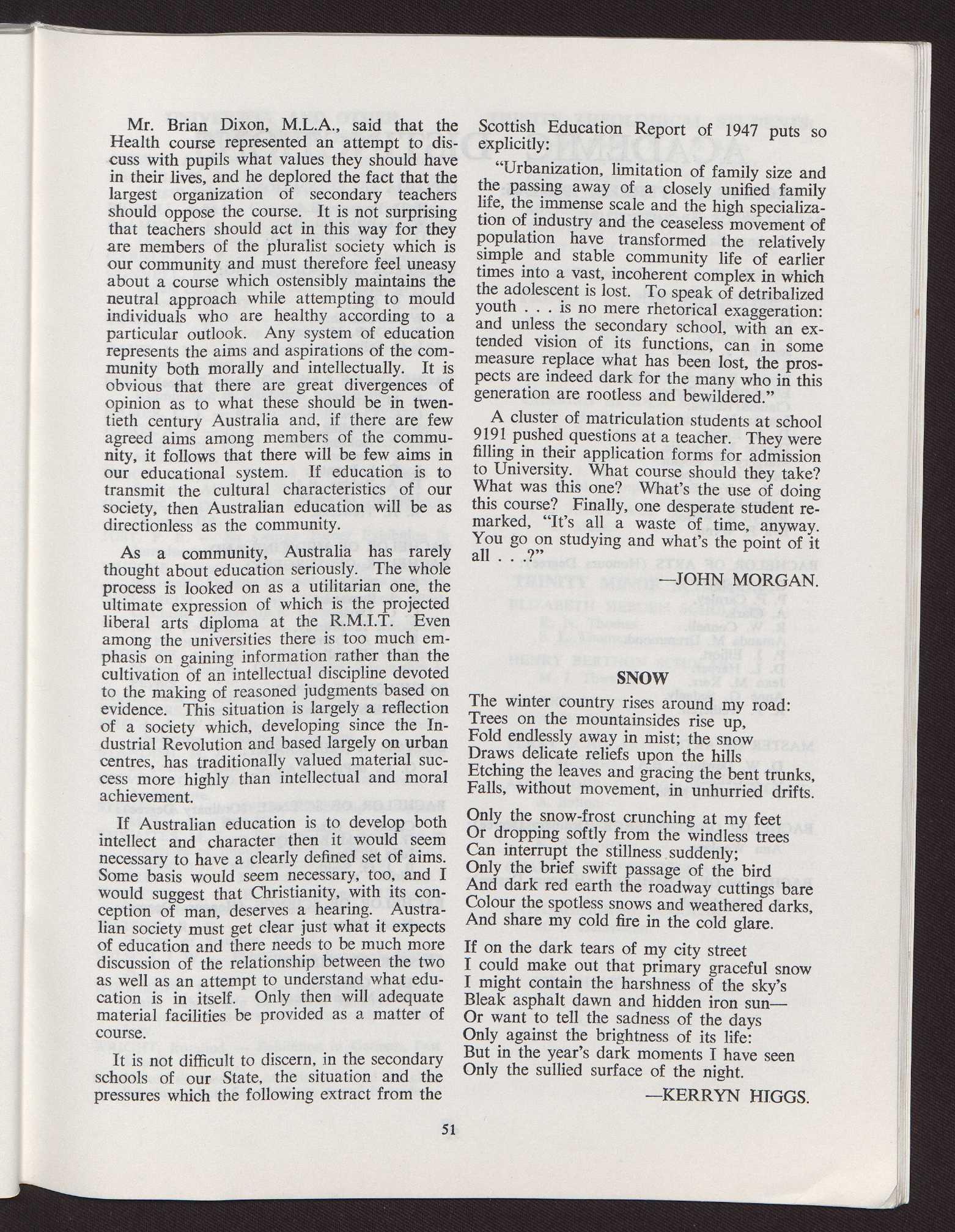
Mr. Brian Dixon, M.L.A., said that the Health course represented an attempt to discuss with pupils what values they should have in their lives, and he deplored the fact that the largest organization of secondary teachers should oppose the course. It is not surprising that teachers should act in this way for they are members of the pluralist society which is our community and must therefore feel uneasy about a course which ostensibly maintains the neutral approach while attempting to mould individuals who are healthy according to a particular outlook. Any system of education represents the aims and aspirations of the community both morally and intellectually. It is obvious that there are great divergences of opinion as to what these should be in twentieth century Australia and, if there are few agreed aims among members of the community, it follows that there will be few aims in our educational system. If education is to transmit the cultural characteristics of our society, then Australian education will be as directionless as the community.
As a community, Australia has rarely thought about education seriously. The whole process is looked on as a utilitarian one, the ultimate expression of which is the projected liberal arts diploma at the R.M.I.T. Even among the universities there is too much emphasis on gaining information rather than the cultivation of an intellectual discipline devoted to the making of reasoned judgments based on evidence. This situation is largely a reflection of a society which, developing since the Industrial Revolution and based largely on urban centres, has traditionally valued material success more highly than intellectual and moral achievement.
If Australian education is to develop both intellect and character then it would seem necessary to have a clearly defined set of aims. Some basis would seem necessary, too, and I would suggest that Christianity, with its conception of man, deserves a hearing. Australian society must get clear just what it expects of education and there needs to be much more discussion of the relationship between the two as well as an attempt to understand what education is in itself. Only then will adequate material facilities be provided as a matter of course.
It is not difficult to discern, in the secondary schools of our State, the situation and the pressures which the following extract from the
Scottish Education Report of 1947 puts so explicitly:
"Urbanization, limitation of family size and the passing away of a closely unified family life, the immense scale and the high specialization of industry and the ceaseless movement of population have transformed the relatively simple and stable community life of earlier times into a vast, incoherent complex in which the adolescent is lost. To speak of detribalized youth ... is no mere rhetorical exaggeration: and unless the secondary school, with an extended vision of its functions, can in some measure replace what has been lost, the prospects are indeed dark for the many who in this generation are rootless and bewildered."
A cluster of matriculation students at school 9191 pushed questions at a teacher. They were filling in their application forms for admission to University. What course should they take? What was this one? What's the use of doing this course? Finally, one desperate student remarked, "It's all a waste of time, anyway. You go on studying and what's the point of it all...?"
—JOHN MORGAN.
The winter country rises around my road: Trees on the mountainsides rise up, Fold endlessly away in mist; the snow Draws delicate reliefs upon the hills Etching the leaves and gracing the bent trunks, Falls, without movement, in unhurried drifts.
Only the snow-frost crunching at my feet Or dropping softly from the windless trees Can interrupt the stillness suddenly; Only the brief swift passage of the bird And dark red earth the roadway cuttings bare Colour the spotless snows and weathered darks, And share my cold fire in the cold glare.
If on the dark tears of my city street I could make out that primary graceful snow I might contain the harshness of the sky's Bleak asphalt dawn and hidden iron sun— Or want to tell the sadness of the days Only against the brightness of its life: But in the year's dark moments I have seen Only the sullied surface of the night.
—KERRYN HIGGS.
DEGREES CONFERRED, 1965-1966:
BACHELOR OF ARCHITECTURE:
M. Anne Salter.
BACHELOR OF ARTS (Ordinary Degree):
Katherine J. Bakewell.
Susan J. Dunlop.
D. J. Fenton.
C. B. Gantner.
Jennifer J. Gibbs.
K. R. Griffiths.
Bryony P. MacL. Oldham.
Elizabeth H. Parker. Claudia Radok.
Joanna V. Rintoul.
D. A. Robbie.
Dianne M. Robbie.
Margery E. Rogan.
Diane A. Sampey.
L. J. J. Van Eckelen.
Robin E. Watson.
Roslyn R. Wilson.
Eva E. Wynn.
BACHELOR OF ARTS (Honours Degree):
G. J. Aplin.
P. F. Carnley.
A. Clark.
R. W. Connell.
Amanda M. Drummond.
P. J. Elliott.
D. L. Harper.
Jean M. Kerr.
Anne G. Sedgely.
R. F. Wetherell.
MASTER OF ARTS:
D. W. Dewhurst, B.A.
G. J. Gellatly.
P. S. Walen, M.Sc.
BACHELOR OF COMMERCE (Ordinary Degree): Ann Wookey.
BACHELOR OF COMMERCE (Honours Degree) :
L. J. Buckland.
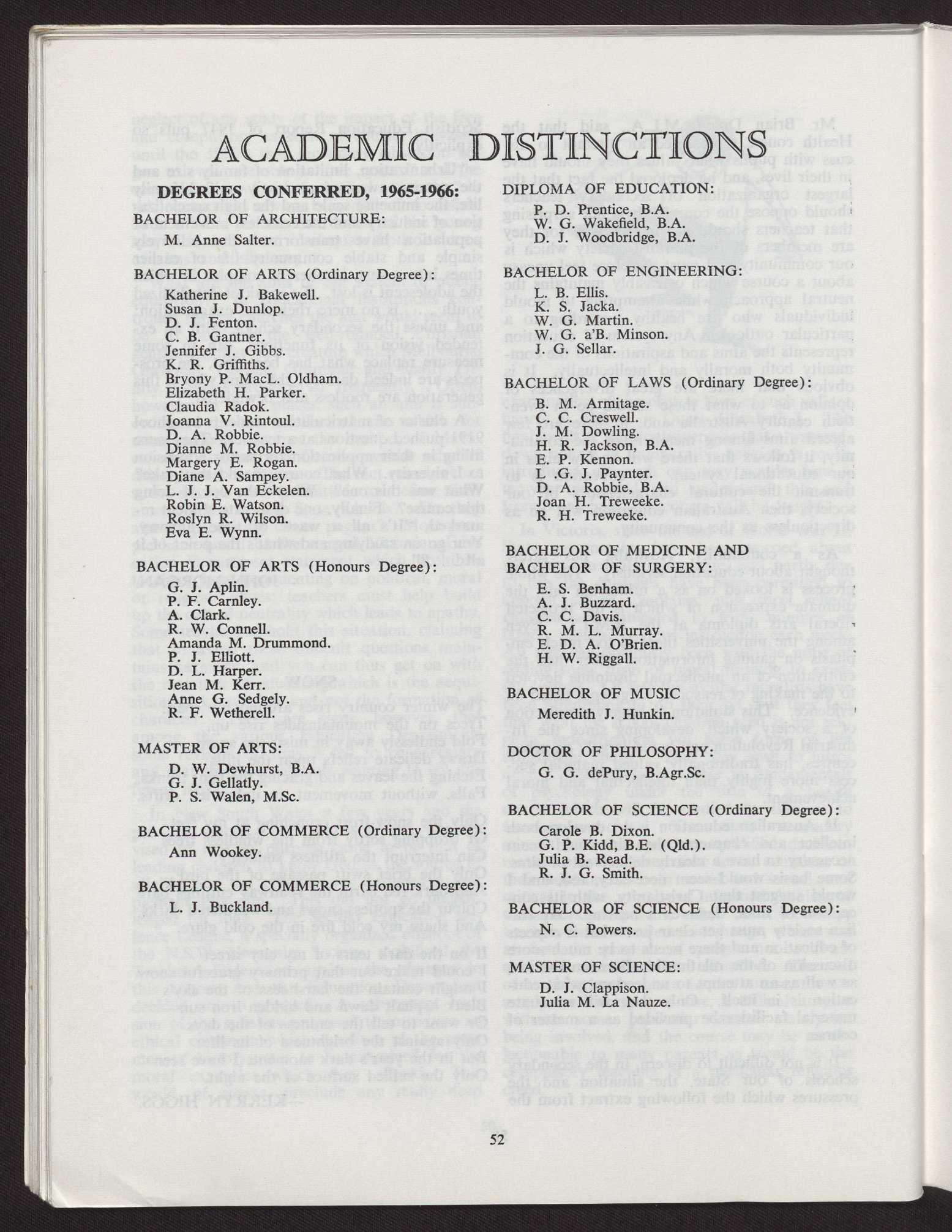
DIPLOMA OF EDUCATION:
P. D. Prentice, B.A. W. G. Wakefield, B.A. D. J. Woodbridge, B.A.
BACHELOR OF ENGINEERING:
L. B. Ellis. K. S. Jacka. W. G. Martin. W. G. a'B. Minson. J. G. Sellar.
BACHELOR OF LAWS (Ordinary Degree):
B. M. Armitage. C. C. Creswell. J. M. Dowling. H. R. Jackson, B.A. E. P. Kennon. L .G. J. Paynter. D. A. Robbie, B.A. Joan H. Treweeke. R. H. Treweeke.
BACHELOR OF MEDICINE AND BACHELOR OF SURGERY:
E. S. Benham. A. J. Buzzard. C. C. Davis. R. M. L. Murray. E. D. A. O'Brien. H. W. Riggall.
BACHELOR OF MUSIC Meredith J. Hunkin.
DOCTOR OF PHILOSOPHY: G. G. dePury, B.Agr.Sc.
BACHELOR OF SCIENCE (Ordinary Degree): Carole B. Dixon. G. P. Kidd, B.E. (Qld.). Julia B. Read. R. J. G. Smith.
BACHELOR OF SCIENCE (Honours Degree): N. C. Powers.
MASTER OF SCIENCE: D. J. Clappison. Julia M. La Nauze.
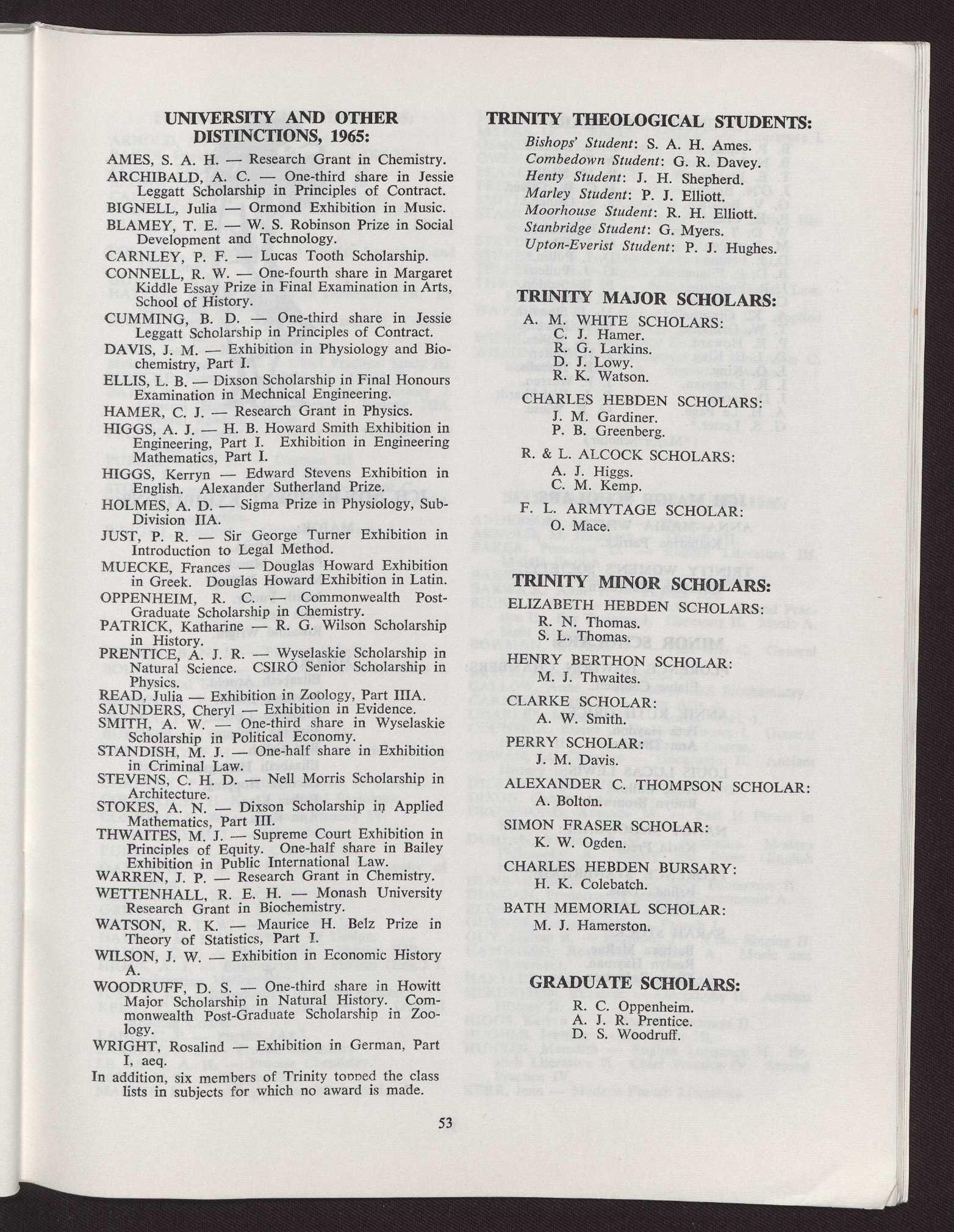
AND OTHER
1965:
AMES, S. A. H. — Research Grant in Chemistry.
ARCHIBALD, A. C. — One-third share in Jessie Leggatt Scholarship in Principles of Contract.
BIGNELL, Julia — Ormond Exhibition in Music.
BLAMEY, T. E. — W. S. Robinson Prize in Social Development and Technology.
CARNLEY, P. F. — Lucas Tooth Scholarship.
CONNELL, R. W. — One-fourth share in Margaret Kiddie Essay Prize in Final Examination in Arts, School of History.
CUMMING, B. D. — One-third share in Jessie Leggatt Scholarship in Principles of Contract.
DAVIS, J. M. — Exhibition in Physiology and Biochemistry, Part I.
ELLIS, L. B. — Dixson Scholarship in Final Honours Examination in Mechnical Engineering.
HAMER, C. J. — Research Grant in Physics.
HIGGS, A. J. — H. B. Howard Smith Exhibition in Engineering, Part I. Exhibition in Engineering Mathematics, Part I.
HIGGS, Kerryn — Edward Stevens Exhibition in English. Alexander Sutherland Prize.
HOLMES, A. D. — Sigma Prize in Physiology, SubDivision IIA.
JUST, P. R. — Sir George Turner Exhibition in Introduction to Legal Method.
MUECKE, Frances — Douglas Howard Exhibition in Greek. Douglas Howard Exhibition in Latin.
OPPENHEIM, R. C. Commonwealth PostGraduate Scholarship in Chemistry.
PATRICK, Katharine — R. G. Wilson Scholarship in PRENTICE,History.
A. J. R. — Wyselaskie Scholarship in Natural Science. CSIRO Senior Scholarship in READ,Physics.
Julia — Exhibition in Zoology, Part IIIA.
SAUNDERS, Cheryl — Exhibition in Evidence.
SMITH, A. W. — One-third share in Wyselaskie Scholarship in Political Economy.
STANDISH, M. J. — One-half share in Exhibition in Criminal Law.
STEVENS, C. H. D. — Nell Morris Scholarship in Architecture.
STOKES, A. N. — Dixson Scholarship in Applied Mathematics, Part III.
THWAITES, M. J. — Supreme Court Exhibition in Principles of Equity. One-half share in Bailey Exhibition in Public International Law.
WARREN, J. P. — Research Grant in Chemistry.
WETTENHALL, R. E. H. — Monash University Research Grant in Biochemistry.
WATSON, R. K. — Maurice H. Belz Prize in Theory of Statistics, Part I.
WILSON, J. W. — Exhibition in Economic History
A.
WOODRUFF, D. S. — One-third share in Howitt Major Scholarship in Natural History. Commonwealth Post-Graduate Scholarship in Zoology.
WRIGHT, Rosalind — Exhibition in German, Part I, aeq.
In addition, six members of Trinity topped the class lists in subjects for which no award is made.
TRINITY THEOLOGICAL STUDENTS:
Bishops' Student: S. A. H. Ames. Combedown Student: G. R. Davey.
Henry Student: J. H. Shepherd.
Marley Student: P. J. Elliott.
Moorhouse Student: R. H. Elliott.
Stanbridge Student: G. Myers.
Upton-Everist Student: P. J. Hughes.
TRINITY MAJOR SCHOLARS:
A. M. WHITE SCHOLARS: C. J. Hamer. R. G. Larkins. D. J. Lowy. R. K. Watson.
CHARLES HEBDEN SCHOLARS: J. M. Gardiner. P. B. Greenberg.
R. & L. ALCOCK SCHOLARS: A. J. Higgs. C. M. Kemp.
F. L. ARMYTAGE SCHOLAR: O. Mace.
TRINITY MINOR SCHOLARS:
ELIZABETH HEBDEN SCHOLARS: R. N. Thomas. S. L. Thomas.
HENRY BERTHON SCHOLAR: M. J. Thwaites.
CLARKE SCHOLAR: A. W. Smith.
PERRY SCHOLAR: J. M. Davis.
ALEXANDER C. THOMPSON SCHOLAR: A. Bolton.
SIMON FRASER SCHOLAR: K. W. Ogden.
CHARLES HEBDEN BURSARY: H. K. Colebatch.
BATH MEMORIAL SCHOLAR: M. J. Hamerston.
GRADUATE SCHOLARS:
R. C. Oppenheim.
A. J. R. Prentice. D. S. Woodruff.
B. P. Apsey. D. S. Meakin. B. N. L. Benson. A. D. Miller.
T. E. Blarney.
J. O'N. Brenan. R. M. Niall. J. C. W. Oliver.
G. V. Brown. B. A. Owen. P. E. Cohen. J. F. Patrick.
P. S. Osmond.
W. D. T. Cowan. G. L. Pike. M. Downing.
D. J. Fenton.
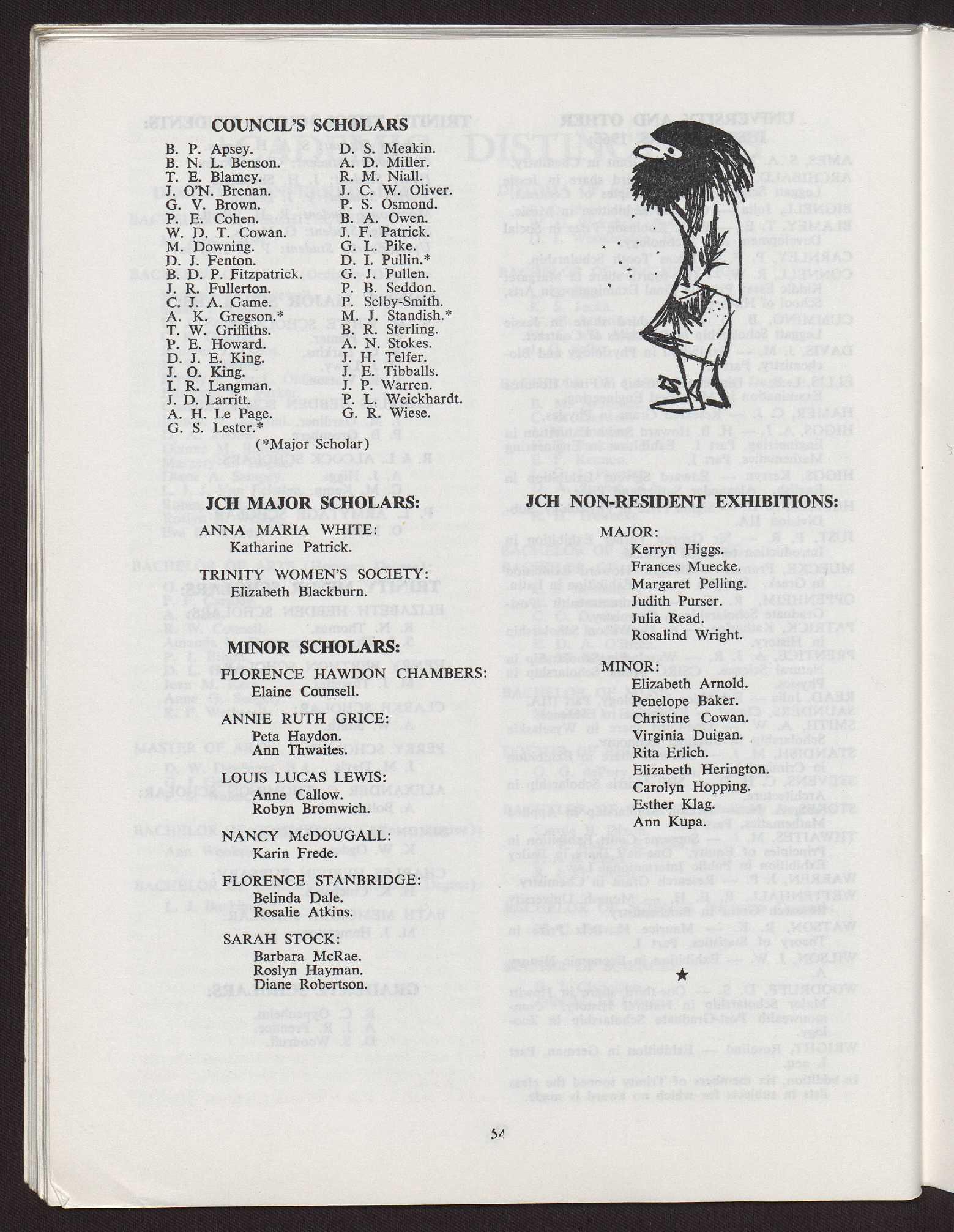
D. I. Pullin.*
G. J. Pullen. B. D. P. Fitzpatrick. P. B. Seddon. J. R. Fullerton. P. Selby-Smith.
C. J. A. Game.
A. K. Gregson.*
M. J. Standish.*
B. R. Sterling. T. W. Griffiths.
P. E. Howard.
A. N. Stokes.
J. H. Telfer.
D. J. E. King. J. E. Tibballs.
J. O. King.
I. R. Langman. J. P. Warren.
P. L. Weickhardt. J. D. Larritt. G. R. Wiese.
A. H. Le Page.
G. S. Lester.* (*Major Scholar)
JCH MAJOR SCHOLARS:
ANNA MARIA WHITE:
Katharine Patrick.
TRINITY WOMEN'S SOCIETY: Elizabeth Blackburn.
MINOR SCHOLARS:
FLORENCE HAWDON CHAMBERS: Elaine Counsell.
ANNIE RUTH GRICE: Peta Haydon. Ann Thwaites.
LOUIS LUCAS LEWIS: Anne Callow. Robyn Bromwich.
NANCY McDOUGALL: Karin Frede.
FLORENCE STANBRIDGE: Belinda Dale. Rosalie Atkins.
SARAH STOCK: Barbara McRae. Roslyn Hayman. Diane Robertson.
MAJOR:
Kerryn Higgs. Frances Muecke. Margaret Pelling. Judith Purser. Julia Read. Rosalind Wright.
MINOR:
Elizabeth Arnold. Penelope Baker. Christine Cowan. Virginia Duigan. Rita Erlich. Elizabeth Herington. Carolyn Hopping. Esther Klag. Ann Kupa.
FIRST-CLASS HONOURS, 1965:
ARNOLD, M. Elizabeth — Latin III.
BAKER, Penelope D. — Elementary Old Norse.
BISHOP, Elizabeth A. — Chemistry IV.
BROMWICH, Robyn — Chemistry IB.
CALLOW, Anne — General Bacteriology.
COUNSELL, Elaine — General History HIB.
DUIGAN, Virginia P. M. — Drama (English Literature FORSYTH,III)Catherine W. — English Language and Literature I.
GUY, Gillian R. — Piano III.
HAYDON, Peta R. — Modern Government B. International Relations B.
HIGGS, Kerryn A. — English Literature II. General History II.
KERR, Jean — Mediaeval French.
McRAE, Barbara Le C. — Chief Practical Study III.
MUECKE, Frances J. — Latin II. Greek II.
PATRICK, Katharine A. — General History I. General History II. General History IIIA. General Reading Course.
PELLING, Margaret — History and Philosophy of Science III.
PURSER, Judith A. — German III.
READ, Julia B. — Zoology IIIA.
STONE, Rosemary — Modern Government C. THWAITES, Ann H. — History of Building. Building Construction.
WRIGHT, Rosalind — German I. Music A.
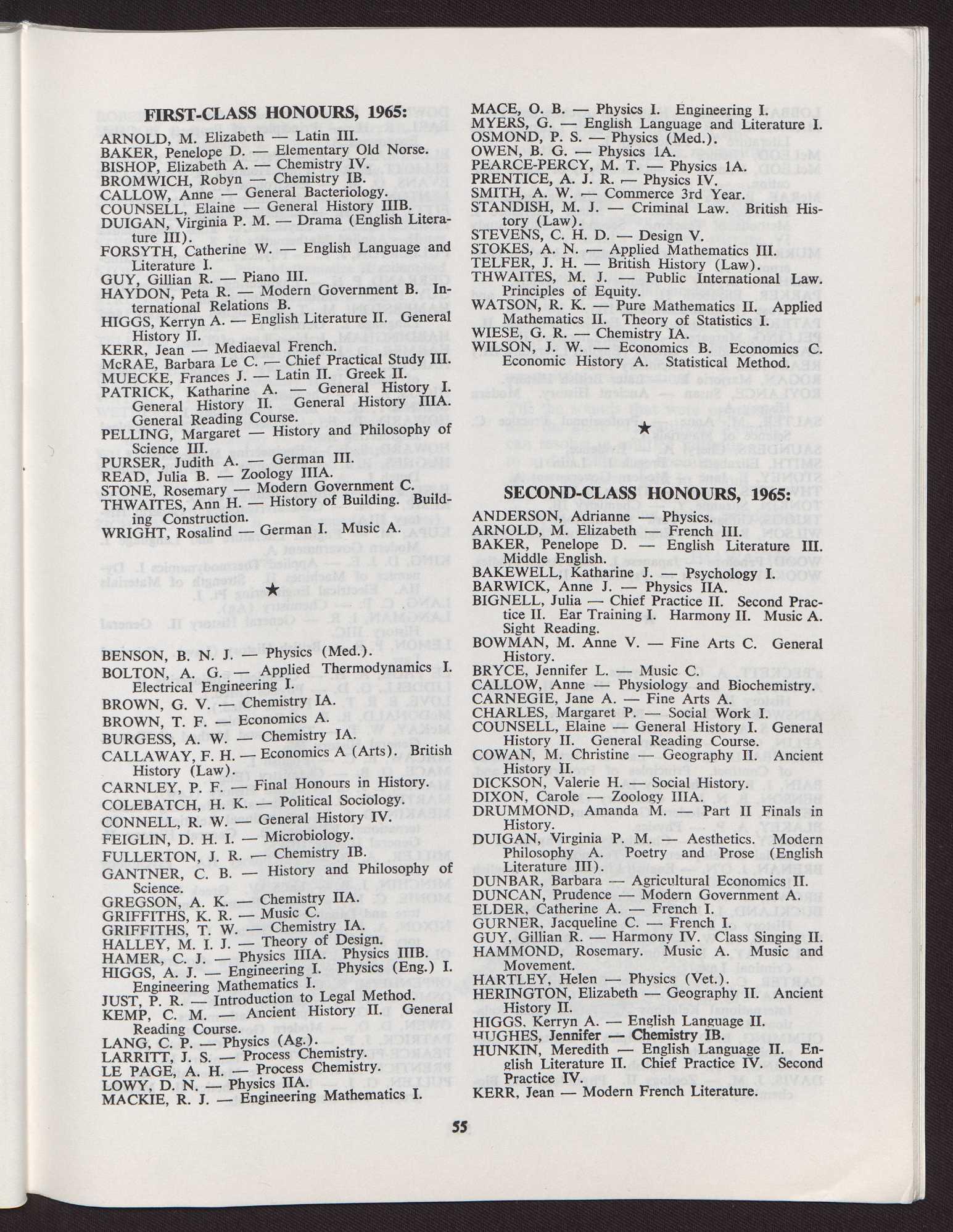
BENSON, B. N. J. — Physics (Med.).
BOLTON, A. G. — Applied Thermodynamics I. Electrical Engineering L
BROWN, G. V. — Chemistry IA.
BROWN, T. F. — Economics A.
BURGESS, A. W. — Chemistry IA.
CALLAWAY, F. H. — Economics A (Arts) British History (Law).
CARNLEY, P. F. — Final Honours in History.
COLEBATCH, H. K. — Political Sociology.
CONNELL, R. W. — General History IV.
FEIGLIN, D. H. I. — Microbiology.
FULLERTON, J. R. Chemistry IB. GANTNER, C. B. — History and Philosophy of Science.
GREGSON, A. K. — Chemistry IIA. GRIFFITHS, K. R. — Music C. GRIFFITHS, T. W. — Chemistry IA. HALLEY, M. I. J. — Theory of Design. HAMER, C. J. — Physics IIIA. Physics IIIB.
HIGGS, A. J. — Engineering I. Physics (Eng.) I. Engineering Mathematics I.
JUST, P. R. — Introduction to Legal Method. KEMP, C. M. — Ancient History II. General Reading Course.
LANG, C. P. — Physics (Ag.).
LARRITT, J. S. — Process Chemistry.
LE PAGE, A. H. — Process Chemistry.
LOWY, D. N. — Physics IIA. MACKIE, R. J. — Engineering Mathematics I.
MACE, O. B. — Physics 1. Engineering I. MYERS, G. — English Language and Literature I.
OSMOND, P. S. — Physics (Med.).
OWEN, B. G. — Physics IA.
PEARCE-PERCY, M. T. — Physics IA.
PRENTICE, A. J. R. e— Physics IV.
SMITH, A. W. Commerce 3rd Year.
STANDISH, M. J. — Criminal Law. British History (Law).
STEVENS, C. H. D. — Design V.
STOKES, A. N. Applied Mathematics III.
TELFER, J. H. — British History (Law).
THWAITES, M. J. — Public International Law. Principles of Equity.
WATSON, R. K. — Pure Mathematics II. Applied Mathematics II. Theory of Statistics I.
WIESE, G. R. — Chemistry IA.
WILSON, J. W. — Economics B. Economics C. Economic History A. Statistical Method.
ANDERSON, Adrianne — Physics.
ARNOLD, M. Elizabeth — French HI.
BAKER, Penelope D. — English Literature III. Middle English.
BAKEWELL, Katharine J. — Psychology I.
BARWICK, Anne J. — Physics lIA.
BIGNELL, Julia — Chief Practice II. Second Practice II. Ear Training I. Harmony II. Music A. Sight Reading.
BOWMAN, M. Anne V. — Fine Arts C. General History.
BRYCE, Jennifer L. — Music C.
CALLOW, Anne — Physiology and Biochemistry.
CARNEGIE, Jane A. — Fine Arts A.
CHARLES, Margaret P. — Social Work I. COUNSELL, Elaine — General History I. General History II. General Reading Course.
COWAN, M. Christine — Geography II. Ancient History II.
DICKSON, Valerie H. — Social History.
DIXON, Carole — Zoology IIIA.
DRUMMOND, Amanda M. — Part II Finals in History.
DUIGAN, Virginia P. M. — Aesthetics. Modern Philosophy A. Poetry and Prose (English Literature III).
DUNBAR, Barbara — Agricultural Economics II.
DUNCAN, Prudence — Modern Government A.
ELDER, Catherine A. — French I.
GURNER, Jacqueline C. — French I.
GUY, Gillian R. — Harmony IV. Class Singing II. HAMMOND, Rosemary. Music A. Music and Movement.
HARTLEY, Helen — Physics (Vet.).
HERINGTON, Elizabeth — Geography II. Ancient History II.
HIGGS, Kerryn A. — English Language II.
I TJGHES, Jennifer — Chemistry IB.
HUNKIN, Meredith — English Language II. English Literature II. Chief Practice IV. Second Practice IV.
KERR, Jean — Modern French Literature.
LOBBAN, Marian — History of Architecture IV.
MACKENZIE, B. Janet — English Language and Literature I. Philosophy I.
McLEOD, Glenice — Latin III.
McLEOD, Jennifer M. — Philosophy of Social Education.
McRAE, Barbara Le C. — English Language and Literature I. Music C. Music Literature I. Methods of Teaching. Second Practical Study IV.
MURRAY, Janet — British History. Modern Government A.
OLDHAM, Bryony — Mediaeval Philosophy.
PARKER, Elizabeth H. — Drama. Poetry and Prose (English Literature III).
PATRICK, Katharine A. — English Language II.
PELLING, Margaret — English Literature III.
RADOK, Claudia — Drama (English Literature III.)
READ, Julia B. — Chemistry IIIB.
ROGAN, Marjorie E. — Later British History.
ROYLANCE, Susan — Ancient History. Modern History A.
SALTER, M. Anne — Professional Practice C. Science of Materials C.
SAUNDERS, Cheryl A. — Evidence.
SMITH, Elizabeth — French I. Latin I.
STONEY, F. Jane — Modern Government A.
THWAITES, Ann H. — Theory of Design.
TONKIN, Suzanne Y. Chemistry IB.
TRIGGS, Gillian — Tort. Criminology A.
WILSON, Roslyn — English Literature III. Music C.
WOOD, Penelope — Japanese I. East Asian Studies.
WOOKEY, Margaret — Psychology IIA.

a'BECKETT, A. O. — Physics.
ABBOTT, W. L. — General History II. Ancient History II.
AINSWORTH, G. W. — British History (Law).
AMES, S. A. H. — Physics IV.
APLIN, G. J. — Geography IV.
ARCHIBALD, A. C. — Law of Torts. Principles of Contract. Principles of Property in Land.
BAIN, J. R. — Chemistry IA.
BENSON, B. N. J. — Chemistry (Med.).
BETLEY, G. J. Modern Government A. BLAKEY, A. P. — Physics.
BLAMEY, T. E. — Chemistry II. Physics II T. Social Development and Technology.
BRENAN, J. O'N. — English Literature III. English Language III.
BROWN, G. V. — Pure Mathematics I. BUCKLAND, L. J. Commerce Final Division Il. History of Economic Theory.
BURGESS, A. W. — Physics IA. Biology. CALLAWAY, F. H. — Introduction to Legal Method. Criminal Law.
CARTER, C. E. — Electrical Engineering Pt. I. COLEBATCH, H. K. — Modern Government B. International Relations A. International Relations B. CUMMING, B. D. -- Principles of Contract. Economics A (Arts).
DARLING, J. A. — English.
DAVIS, J. M. — Zoology II. Physiology and Biochemistry I.
DOWNING, M. — French III. German III. EARL, R. H. — Principles of Property in Land. Economics A. ELLERMAN, D. A. — Psychology Pt. I.
ELLIOTT, P. J. — Final Honours in History. EVANS, O. M. — Electronics Pt. I. FENTON, D. J. — Mercantile Law. Philosophy I. FITTS, D. R. H. — English Literature I. FORBES, G. K. — Physics IIA. Pure Mathematics II. Applied Mathematics II.
FULLERTON, J. R. — Physics IA. Applied Mathematics I.
GERRAND, P. H. — Engineering Mathematics IIIC. GUY, P. A. — Business Administration II. HAMERSTON, M. T. — English Literature and Language I. German I. HARDINGHAM, I. J. — Law of Torts.
HARMER, D. J. Physics II.
HARPER, D. L. — Theory of Politics I. Theory of Politics II.
HIGGS, A. J. — Chemistry (Eng.).
HORNSBY, D. T. B. — Engineering I.
HOWARD, P. F. — Chemistry IIC. Chemical Engineering I.
HOWARD, S. E. — Engineering Mathematics I. HUGHES, P. J. — Philosophy I. British History. Dutch I.
JUST, P. R. — British History (Law).
KEMP, C. M. — General History I. General History IIIA.
KUPA, M. — English Literature and Language I. Modern Government A.
KING, D. J. E. — Applied Thermodynamics I. Dynamics of Machines II. Strength of Materials IIA. Electrical Engineering Pt. I.
LANG, C. P. — Chemistry (Ag).
LANGMAN, I. R. — General History II. General History IIIC.
LEMON, P. R. — British History (Law). Criminal Law.
LE PAGE, A. H. — Chemical Engineering II.
LIDDELL, G. D. — Physics (Med.).
LOVE, B. R. T. — Physics (Med.).
McDONALD, R. R. — Economics A. McKAY, W. T. — Theory and Method of History. General History IV.
MACAW, R. C. — English I.
MACE, O. B. — Chemistry (Eng.).
MADIN, J. J. S. British History (Law).
MARTIN, W. G. — Chemical Engineering Finals. MEAKIN, D. S. — International Relations A. International Relations B. General History II. General History IIIB.
MILLER, A. D. — Psychology IIA. Psychology IIB.
MINCHIN, J. B. — Latin IV. Greek IV. MONIE, C. L. — British History. English Literature and Language I.
NIXON, A. J. — Ancient History I. General History IIIC.
OLIVER, J. G. W. — Modern Government B. Modern Government C. OPPENHEIM, R. C. — Chemistry IV.
OSMOND, P. S. — Biology (Med.).
OWEN, B. G. — Applied Mathematics.
OWEN, D. O. — Modern Government A. PATRICK, J. F. — Physics IA. Chemistry IB.
PEARCE-PERCY, M. T. — Chemistry IA.
PRENTICE, A. J. R. — Pure Mathematics HI. PULLEN, G. J. — Dental Prosthetics II. Metallography and Dental Materials.
ROBERT, J. S. — Process Chemistry. SEDDON, P. B. — Physics IA. Chemistry IB. Applied Mathematics I. Pure Mathematics I. SEDGWICK, T. I. — Psychology I. SELLAR, J. G. — Geology II (Mining Course). Engineering Finals.
SIMON, G. B. — English Literature and Language I. Music B. Chief Practical Study IIA. STANDISH, M. J. .--- Introduction to Legal Method. STERLING, B. R. — Physics (Med.). Chemistry STOKES,(Med.).A. N. — Pure Mathematics III. Applied Mathematics II.
STRUGNELL, W. B. — Principles of Equity. TELFER, J. H. — Criminal Law. Introduction to Legal TELFORD,Method. A. B. — Histology. Oral Histology and Embryology. Physiology and Biochemistry. THWAITES, M. J. — Evidence.
WARREN, J. P. — Chemistry IIIA. WATTS, G. J. — Latin III. WETHERELL, R. F. — Ethics. Logic. Political Philosophy. Philosophical Psychology. Contemporary Philosophy II. Kant. WILLIAMS, N. C. — Economic Geography I. WITHINGTON, D. C. — English Literature and Language I. Modern History A. WORBY, G. R. — English Literature and Language I. Modern History A.ZICHY-WOINARSKI, B. — Economics A (Arts).
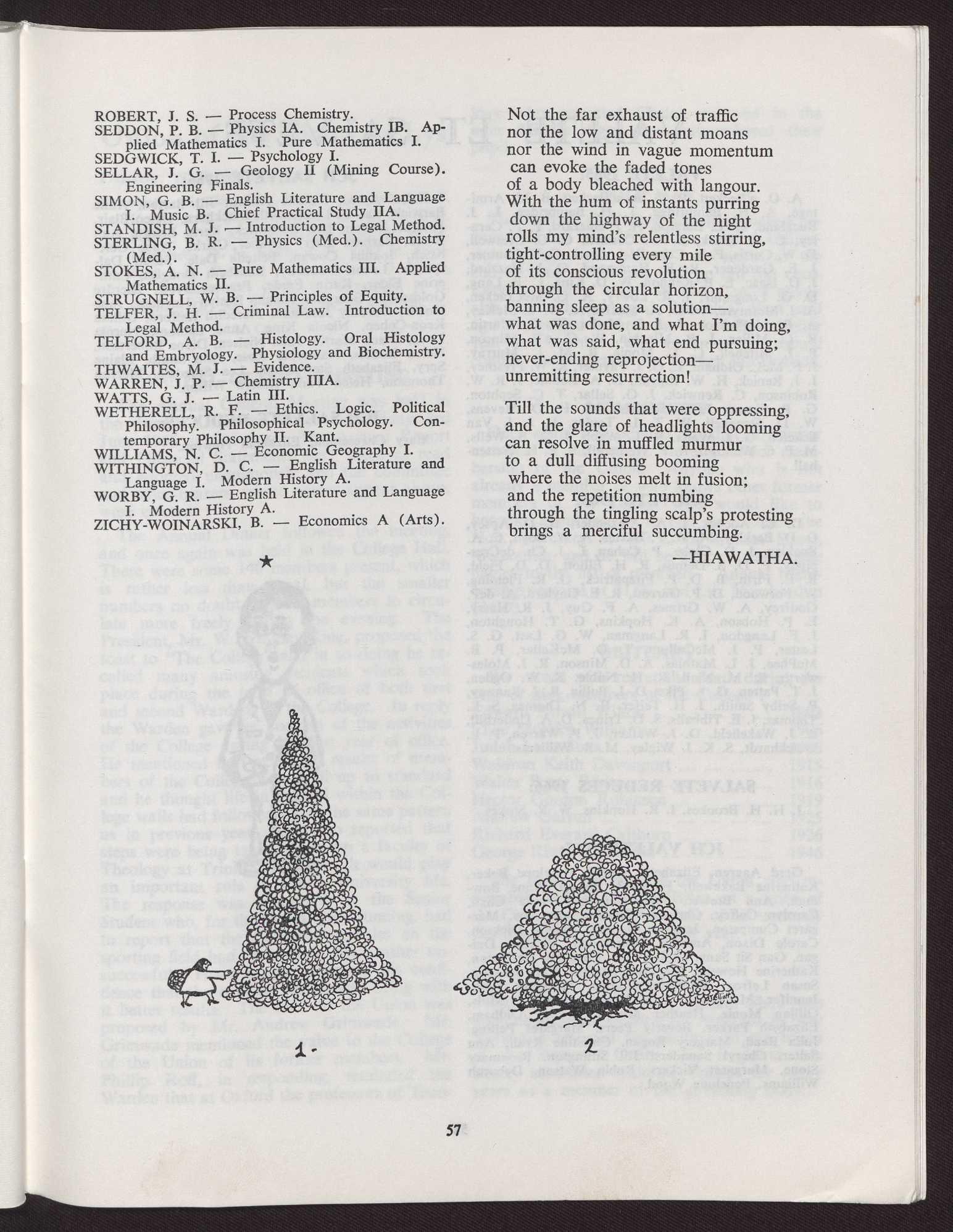
Not the far exhaust of traffic nor the low and distant moans nor the wind in vague momentum can evoke the faded tones of a body bleached with langour. With the hum of instants purring down the highway of the night rolls my mind's relentless stirring, tight-controlling every mile of its conscious revolution through the circular horizon, banning sleep as a solution— what was done, and what I'm doing, what was said, what end pursuing; never-ending reprojectionunremitting resurrection!
Till the sounds that were oppressing, and the glare of headlights looming can resolve in muffled murmur to a dull diffusing booming where the noises melt in fusion; and the repetition numbing through the tingling scalp's protesting brings a merciful succumbing.
—HIAWATHA.
VALETE 1965:
A. O. a'Beckett, R. G. A. a'Beckett, B. M. Armitage, A. H. Bainbridge, T. H. Bainbridge, L. J. Buckland, G. E. Burston, A. J. Buzzard, P. F. Carnley, C. G. Clark, R. W. Connell, C. C. Creswell, D. W. Curtis, F. N. Cornell, A. Clark, C. B. Gantner, J. E. Gardener, R. R. Hammond, C. J. Hazzard, J. D. Isaac, E. P. Kennon, W. D. King, C. P. Lang, D. G. Longmuir, I. R. Lowry, A. G. McCracken, A. J. McIntyre, W. D. A. Maclntyre, W. T. McKay, A. B. McPherson, J. J. S. Madin, W. G. Martin, R. C. Miller, J. B. Minchin, W. G. a'B. Minson, P. J. Mitchell, C. L. Monie, R. M. L. Murray, J. F. McL. Oldham, L. G. J. Paynter, R. W. Prestney, J. J. Renick, H. W. Riggall, D. A. Robbie, J. R. W. Robinson, C. Renwick, J. G. Sellar, T. C. Sephton, G. P. Simon, J. B. Somerset, C. H. D. Stevens, W. D. Strugnell, W. T. L. Taylor, L. J. J. Van Eckelen, G. J. Watts, R. L. Webb, J. D. B. Wells, M. P. C. Wentzell, R. F. Wetherell, R. E. H. Wettenhall.
SALVETE 1966:
D. C. Adcock, I. A. Alexander, B. D. Apsey, O. D. Barkley, M. W. P. Baxter, A. W. Boyd, C. A. Buckley, J. D. Cloke, P. Cohen, L. J. Ch. deCrespigny, P. D. S. Dennis, R. H. Elliott, D. D. Field, B. E. Firth, B. D. P. Fitzpatrick, G. R. Fleming, W. Forwood, D. P. Garrott, R. E. Gaylard, A. deP. Godfrey, A. W. Grimes, A. F. Guy, J. R. Harry, E. P. Hobson, A. K. Hopkins, G. T. Houghton, J. F. Langdon, I. R. Langman, W. G. Last, G. S. Lester, P. J. McCallum, T. D. McKellar, P. B. McPhee, J. L. Mathias, A. D. Minson, R. J. Molesworth, R. M. Niall, R. H. Noble, K. W. Ogden, J. T. Patten, G. L. Pike, D. I. Pullin, R. J. Ramsay, P. Selby Smith, J. H. Telfer, R. N. Thomas, S. L. Thomas, J. E. Tibballs, S. D. Trinca. D. A. Underhill, R. J. Wakefield, D. J. Walker, J. P. Warren, P. L. Weickhardt, S. K. J. Wigley, M. R. Williams.
SALVETE REDUCES 1966:
J. H. H. Brookes, I. R. Hopkins, W. R. Stokes.
JCH VALETE 1965:
Gerd Aagren, Elizabeth Arnold, Penelope Baker, Katherine Bakewell, Elizabeth Bishop, Anne Bowman, Ann Brewer, Jane Carnegie, Anna Chan, Carolyn Coffey, Christine Cowan, Jane Coy, Margaret Cumpston, Jennifer Daniels, Valerie Dickson, Carole Dixon, Amanda Drummond, Virginia Duigan, Gan Sit Sang, Gillian Guy, Elizabeth Herington, Katherine Howells, Meredith Hunkin, Kate Jackson, Susan Lefroy, Katherine Lubbe, Margaret Lush, Jennifer McLeod, Sylvia Meares, Jennifer Mills, Gillian Monie, Heather Munro, Bryony Oldham, Elizabeth Parker, Beverly Peers, Margaret Pelling, Julia Read, Margery Rogan, Christine Ryall, Ann Salter, Cheryl Saunders, Jill Sitlington, Rosemary Stone, Margaret Vickers, Robin Watson, Deborah Williams, Penelope Wood.
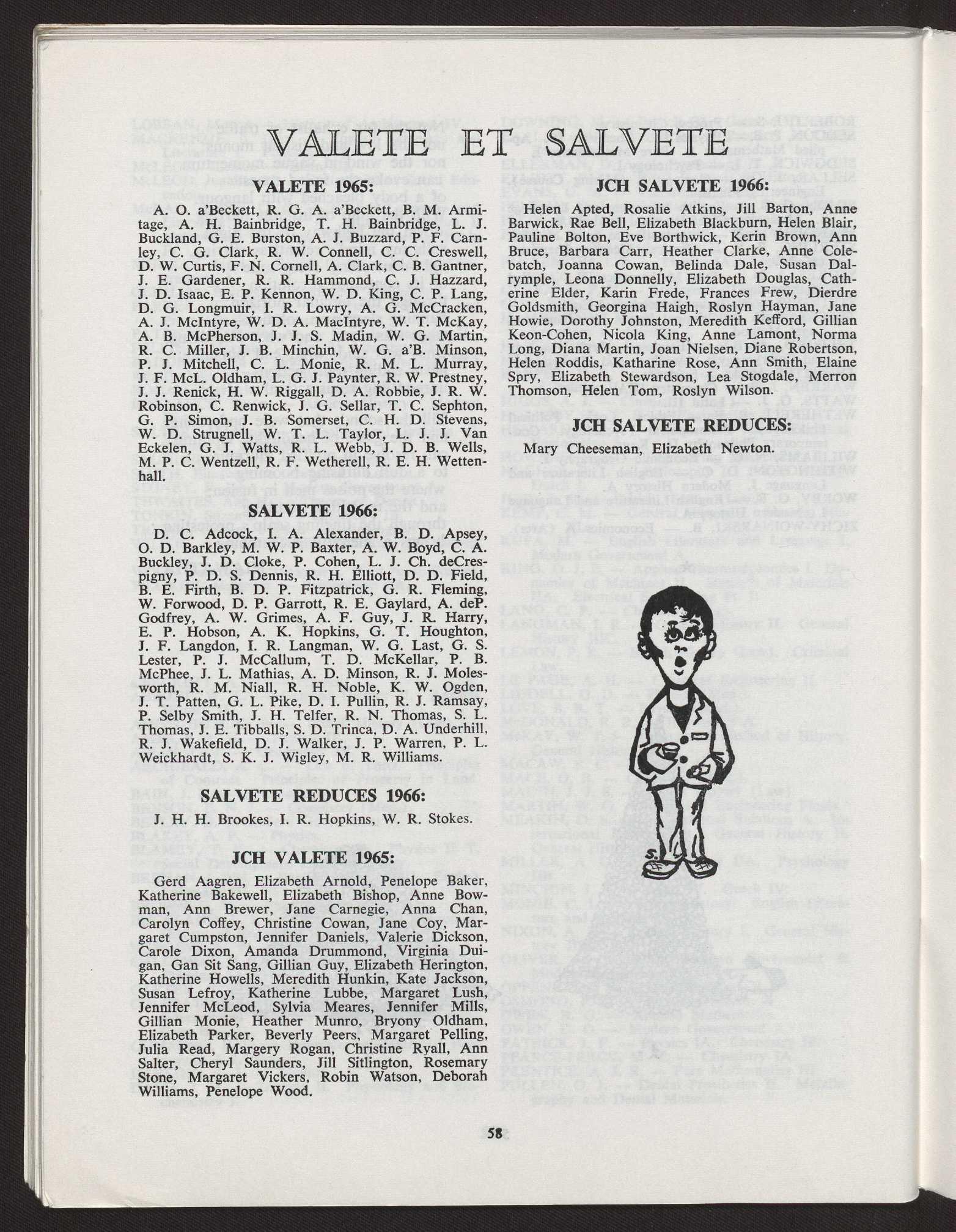
JCH SALVETE 1966:
Helen Apted, Rosalie Atkins, Jill Barton, Anne Barwick, Rae Bell, Elizabeth Blackburn, Helen Blair, Pauline Bolton, Eve Borthwick, Kerin Brown, Ann Bruce, Barbara Carr, Heather Clarke, Anne Colebatch, Joanna Cowan, Belinda Dale, Susan Dalrymple, Leona Donnelly, Elizabeth Douglas, Catherine Elder, Karin Frede, Frances Frew, Dierdre Goldsmith, Georgina Haigh, Roslyn Hayman, Jane Howie, Dorothy Johnston, Meredith Kefford, Gillian Keon-Cohen, Nicola King, Anne Lamont, Norma Long, Diana Martin, Joan Nielsen, Diane Robertson, Helen Roddis, Katharine Rose, Ann Smith, Elaine Spry, Elizabeth Stewardson, Lea Stogdale, Merron Thomson, Helen Tom, Roslyn Wilson.
JCH SALVETE REDUCES: Mary Cheeseman, Elizabeth Newton.
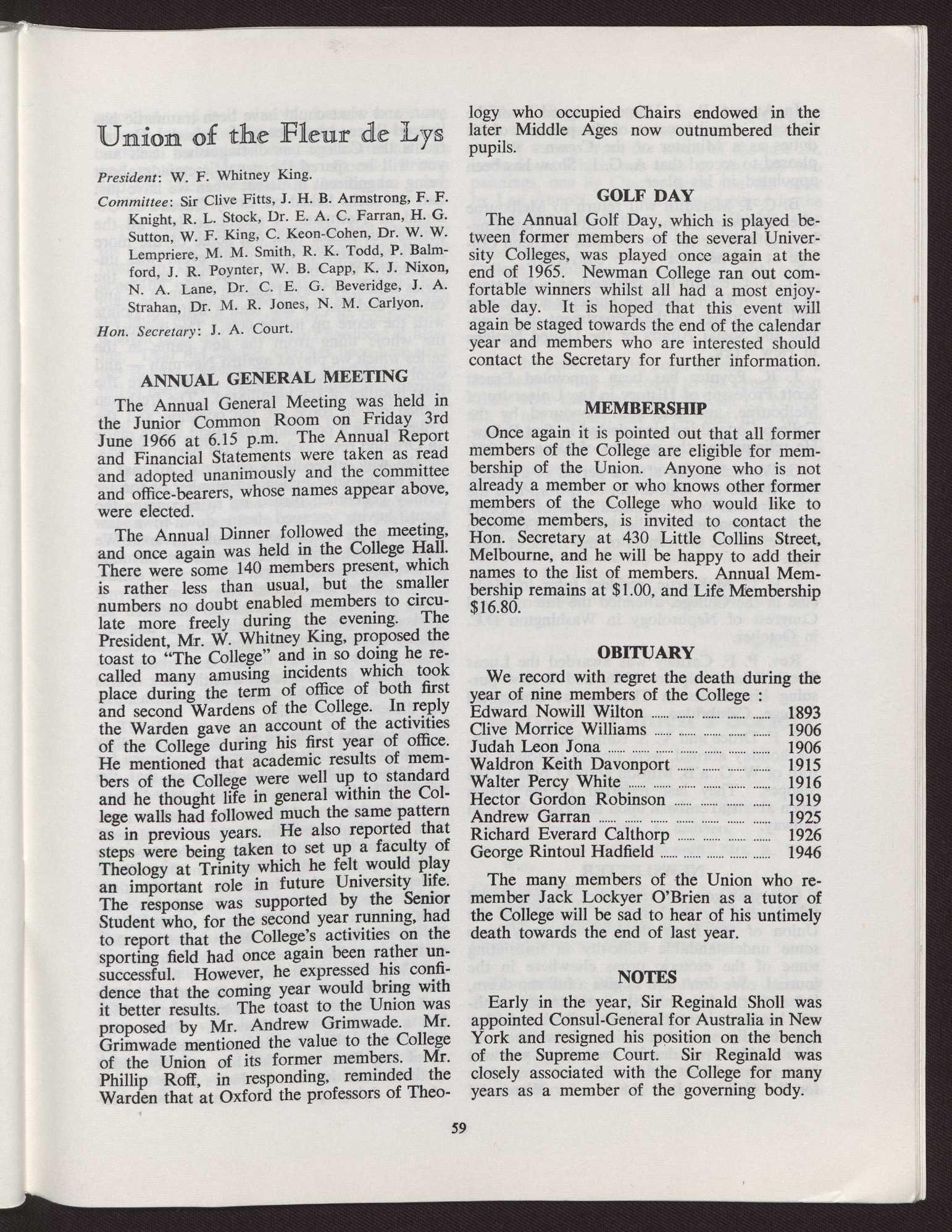
President: W. F. Whitney King.
Committee: Sir Clive Fitts, J. H. B. Armstrong, F. F. Knight, R. L. Stock, Dr. E. A. C. Farran, H. G. Sutton, W. F. King, C. Keon-Cohen, Dr. W. W. Lempriere, M. M. Smith, R. K. Todd, P. Balmford, J. R. Poynter, W. B. Capp, K. J. Nixon, N. A. Lane, Dr. C. E. G. Beveridge, J. A. Strahan, Dr. M. R. Jones, N. M. Carlyon.
Hon. Secretary: J. A. Court.
The Annual General Meeting was held in the Junior Common Room on Friday 3rd June 1966 at 6.15 p.m. The Annual Report and Financial Statements were taken as read and adopted unanimously and the committee and office-bearers, whose names appear above, were elected.
The Annual Dinner followed the meeting, and once again was held in the College Hall. There were some 140 members present, which is rather less than usual, but the smaller numbers no doubt enabled members to circulate more freely during the evening. The President, Mr. W. Whitney King, proposed the toast to "The College" and in so doing he recalled many amusing incidents which took place during the term of office of both first and second Wardens of the College. In reply the Warden gave an account of the activities of the College during his first year of office. He mentioned that academic results of members of the College were well up to standard and he thought life in general within the College walls had followed much the same pattern as in previous years. He also reported that steps were being taken to set up a faculty of Theology at Trinity which he felt would play an important role in future University life. The response was supported by the Senior Student who, for the second year running, had to report that the College's activities on the sporting field had once again been rather unsuccessful. However, he expressed his confidence that the coming year would bring with it better results. The toast to the Union was proposed by Mr. Andrew Grimwade. Mr. Grimwade mentioned the value to the College of the Union of its former members. Mr. Phillip Roff, in responding, reminded the Warden that at Oxford the professors of Theo-
logy who occupied Chairs endowed in the later Middle Ages now outnumbered their pupils.
The Annual Golf Day, which is played between former members of the several University Colleges, was played once again at the end of 1965. Newman College ran out comfortable winners whilst all had a most enjoyable day. It is hoped that this event will again be staged towards the end of the calendar year and members who are interested should contact the Secretary for further information.
Once again it is pointed out that all former members of the College are eligible for membership of the Union. Anyone who is not already a member or who knows other former members of the College who would like to become members, is invited to contact the Hon. Secretary at 430 Little Collins Street, Melbourne, and he will be happy to add their names to the list of members. Annual Membership remains at $1.00, and Life Membership $16.80.
We record with regret the death during the year of nine members of the College :
Edward Nowill Wilton
Clive Morrice Williams
Judah Leon Jona
Waldron Keith Davonport
Walter Percy White
Hector Gordon Robinson
Andrew Garran
Richard Everard Calthorp
George Rintoul Hadfield
The many members of the Union who remember Jack Lockyer O'Brien as a tutor of the College will be sad to hear of his untimely death towards the end of last year.
Early in the year, Sir Reginald Sholl was appointed Consul-General for Australia in New York and resigned his position on the bench of the Supreme Court. Sir Reginald was closely associated with the College for many years as a member of the governing body.
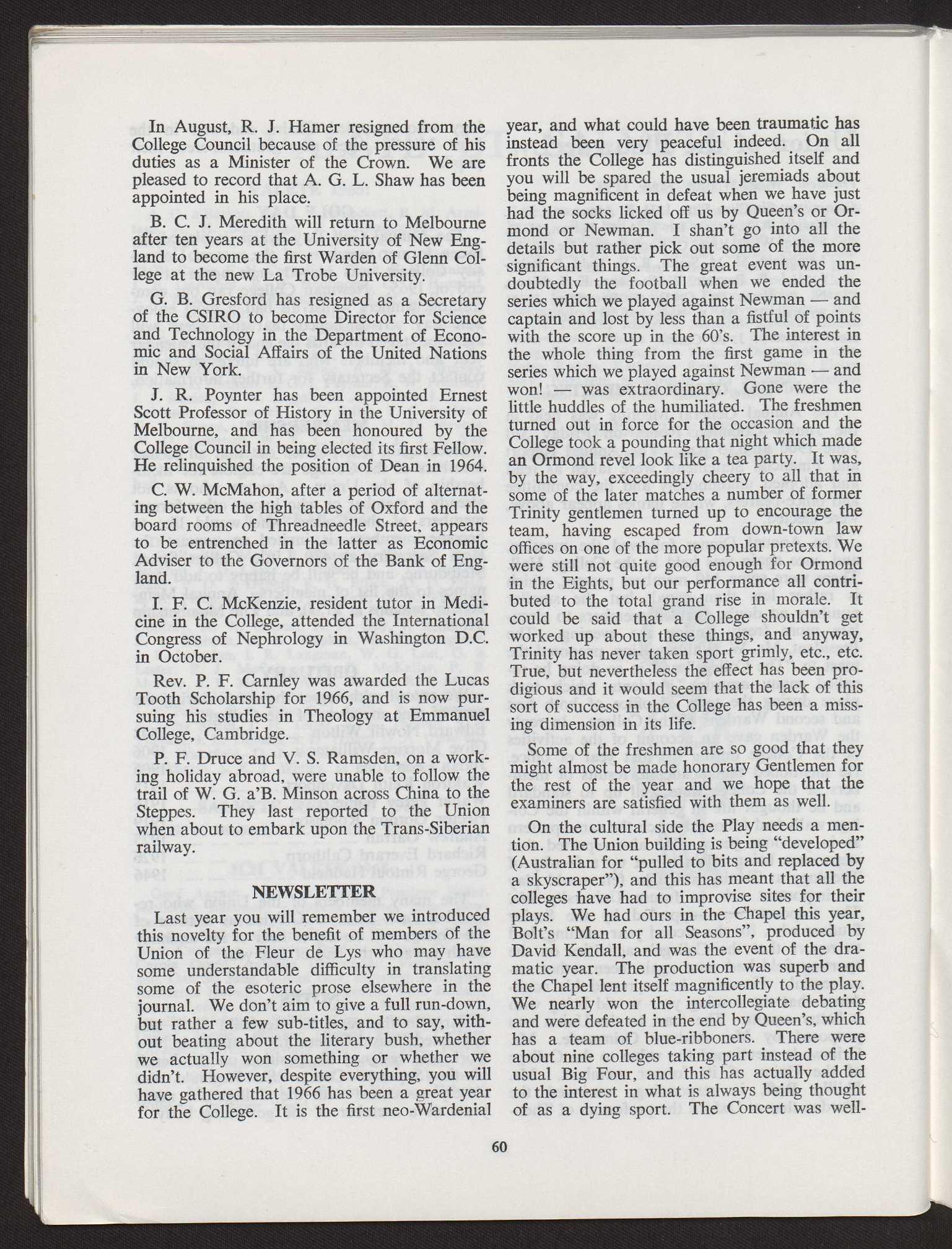
In August, R. J. Hamer resigned from the College Council because of the pressure of his duties as a Minister of the Crown. We are pleased to record that A. G. L. Shaw has been appointed in his place.
B. C. J. Meredith will return to Melbourne after ten years at the University of New England to become the first Warden of Glenn College at the new La Trobe University.
G. B. Gresford has resigned as a Secretary of the CSIRO to become Director for Science and Technology in the Department of Economic and Social Affairs of the United Nations in New York.
J. R. Poynter has been appointed Ernest Scott Professor of History in the University of Melbourne, and has been honoured by the College Council in being elected its first Fellow. He relinquished the position of Dean in 1964.
C. W. McMahon, after a period of alternating between the high tables of Oxford and the board rooms of Threadneedle Street, appears to be entrenched in the latter as Economic Adviser to the Governors of the Bank of England.
I. F. C. McKenzie, resident tutor in Medicine in the College, attended the International Congress of Nephrology in Washington D.C. in October.
Rev. P. F. Carnley was awarded the Lucas Tooth Scholarship for 1966, and is now pursuing his studies in Theology at Emmanuel College, Cambridge.
P. F. Druce and V. S. Ramsden, on a working holiday abroad, were unable to follow the trail of W. G. a'B. Minson across China to the Steppes. They last reported to the Union when about to embark upon the Trans-Siberian railway.
Last year you will remember we introduced this novelty for the benefit of members of the Union of the Fleur de Lys who may have some understandable difficulty in translating some of the esoteric prose elsewhere in the journal. We don't aim to give a full run-down, but rather a few sub-titles, and to say, without beating about the literary bush, whether we actually won something or whether we didn't. However, despite everything, you will have gathered that 1966 has been a great year for the College. It is the first neo-Wardenial
year, and what could have been traumatic has instead been very peaceful indeed. On all fronts the College has distinguished itself and you will be spared the usual jeremiads about being magnificent in defeat when we have just had the socks licked off us by Queen's or Ormond or Newman. I shan't go into all the details but rather pick out some of the more significant things. The great event was undoubtedly the football when we ended the series which we played against Newman — and captain and lost by less than a fistful of points with the score up in the 60's. The interest in the whole thing from the first game in the series which we played against Newman — and won! — was extraordinary. Gone were the little huddles of the humiliated. The freshmen turned out in force for the occasion and the College took a pounding that night which made an Ormond revel look like a tea party. It was, by the way, exceedingly cheery to all that in some of the later matches a number of former Trinity gentlemen turned up to encourage the team, having escaped from down-town law offices on one of the more popular pretexts. We were still not quite good enough for Ormond in the Eights, but our performance all contributed to the total grand rise in morale. It could be said that a College shouldn't get worked up about these things, and anyway, Trinity has never taken sport grimly, etc., etc. True, but nevertheless the effect has been prodigious and it would seem that the lack of this sort of success in the College has been a missing dimension in its life.
Some of the freshmen are so good that they might almost be made honorary Gentlemen for the rest of the year and we hope that the examiners are satisfied with them as well.
On the cultural side the Play needs a mention. The Union building is being "developed" (Australian for "pulled to bits and replaced by a skyscraper"), and this has meant that all the colleges have had to improvise sites for their plays. We had ours in the Chapel this year, Bolt's "Man for all Seasons", produced by David Kendall, and was the event of the dramatic year. The production was superb and the Chapel lent itself magnificently to the play. We nearly won the intercollegiate debating and were defeated in the end by Queen's, which has a team of blue-ribboners. There were about nine colleges taking part instead of the usual Big Four, and this has actually added to the interest in what is always being thought of as a dying sport. The Concert was well-
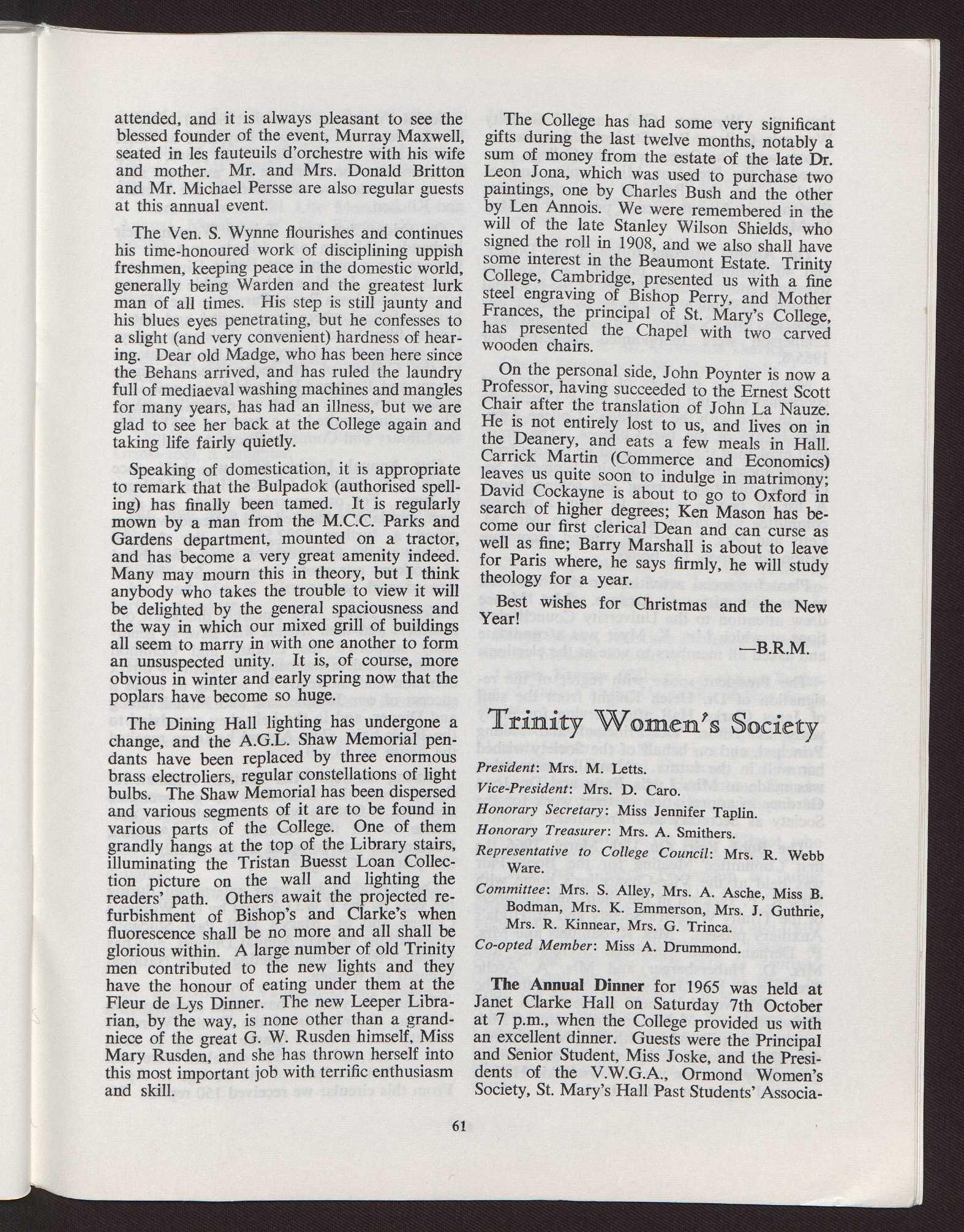
attended, and it is always pleasant to see the blessed founder of the event, Murray Maxwell, seated in les fauteuils d'orchestre with his wife and mother. Mr. and Mrs. Donald Britton and Mr. Michael Persse are also regular guests at this annual event.
The Ven. S. Wynne flourishes and continues his time-honoured work of disciplining uppish freshmen, keeping peace in the domestic world, generally being Warden and the greatest lurk man of all times. His step is still jaunty and his blues eyes penetrating, but he confesses to a slight (and very convenient) hardness of hearing. Dear old Madge, who has been here since the Behans arrived, and has ruled the laundry full of mediaeval washing machines and mangles for many years, has had an illness, but we are glad to see her back at the College again and taking life fairly quietly.
Speaking of domestication, it is appropriate to remark that the Bulpadok (authorised spelling) has finally been tamed. It is regularly mown by a man from the M.C.C. Parks and Gardens department, mounted on a tractor, and has become a very great amenity indeed. Many may mourn this in theory, but I think anybody who takes the trouble to view it will be delighted by the general spaciousness and the way in which our mixed grill of buildings all seem to marry in with one another to form an unsuspected unity. It is, of course, more obvious in winter and early spring now that the poplars have become so huge.
The Dining Hall lighting has undergone a change, and the A.G.L. Shaw Memorial pendants have been replaced by three enormous brass electroliers, regular constellations of light bulbs. The Shaw Memorial has been dispersed and various segments of it are to be found in various parts of the College. One of them grandly hangs at the top of the Library stairs, illuminating the Tristan Buesst Loan Collection picture on the wall and lighting the readers' path. Others await the projected refurbishment of Bishop's and Clarke's when fluorescence shall be no more and all shall be glorious within. A large number of old Trinity men contributed to the new lights and they have the honour of eating under them at the Fleur de Lys Dinner. The new Leeper Librarian, by the way, is none other than a grandniece of the great G. W. Rusden himself, Miss Mary Rusden, and she has thrown herself into this most important job with terrific enthusiasm and skill.
The College has had some very significant gifts during the last twelve months, notably a sum of money from the estate of the late Dr. Leon Jona, which was used to purchase two paintings, one by Charles Bush and the other by Len Annois. We were remembered in the will of the late Stanley Wilson Shields, who signed the roll in 1908, and we also shall have some interest in the Beaumont Estate. Trinity College, Cambridge, presented us with a fine steel engraving of Bishop Perry, and Mother Frances, the principal of St. Mary's College, has presented the Chapel with two carved wooden chairs.
On the personal side, John Poynter is now a Professor, having succeeded to the Ernest Scott Chair after the translation of John La Nauze. He is not entirely lost to us, and lives on in the Deanery, and eats a few meals in Hall. Carrick Martin (Commerce and Economics) leaves us quite soon to indulge in matrimony; David Cockayne is about to go to Oxford in search of higher degrees; Ken Mason has become our first clerical Dean and can curse as well as fine; Barry Marshall is about to leave for Paris where, he says firmly, he will study theology for a year.
Best wishes for Christmas and the New Year!
—B.R.M.
President: Mrs. M. Letts.
Vice-President: Mrs. D. Caro.
Honorary Secretary: Miss Jennifer Taplin.
Honorary Treasurer: Mrs. A. Smithers.
Representative to College Council: Mrs. R. Webb Ware.
Committee: Mrs. S. Alley, Mrs. A. Asche, Miss B. Bodman, Mrs. K. Emmerson, Mrs. J. Guthrie, Mrs. R. Kinnear, Mrs. G. Trinca.
Co-opted Member: Miss A. Drummond.
The Annual Dinner for 1965 was held at Janet Clarke Hall on Saturday 7th October at 7 p.m., when the College provided us with an excellent dinner Guests were the Principal and Senior Student, Miss Joske, and the Presidents of the V.W.G.A., Ormond Women's Society, St. Mary's Hall Past Students' Associa-
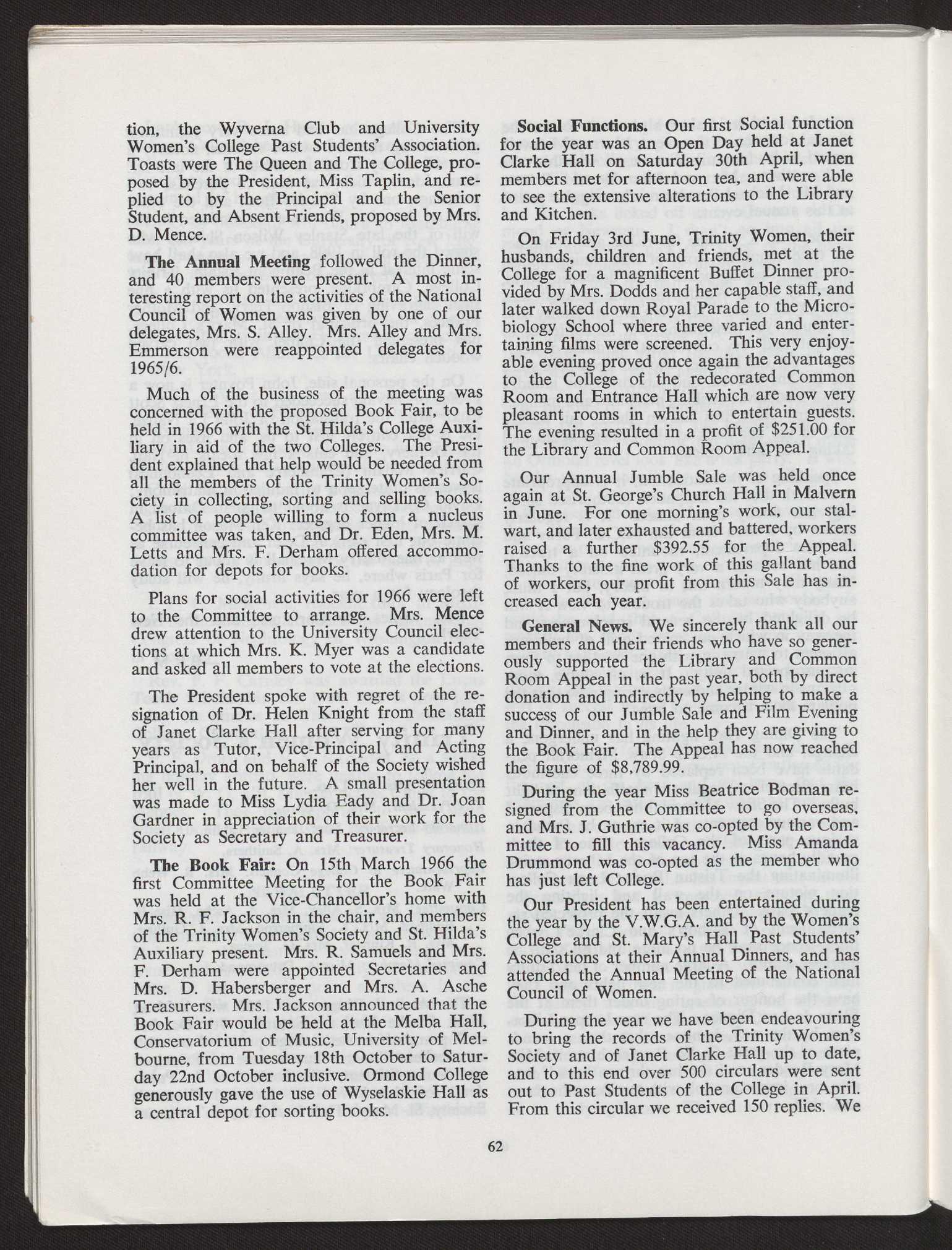
tion, the Wyverna Club and University Women's College Past Students' Association. Toasts were The Queen and The College, proposed by the President, Miss Taplin, and replied to by the Principal and the Senior Student, and Absent Friends, proposed by Mrs. D. Mence.
The Annual Meeting followed the Dinner, and 40 members were present. A most interesting report on the activities of the National Council of Women was given by one of our delegates, Mrs. S. Alley. Mrs. Alley and Mrs. Emmerson were reappointed delegates for 1965/6.
Much of the business of the meeting was concerned with the proposed Book Fair, to be held in 1966 with the St. Hilda's College Auxiliary in aid of the two Colleges. The President explained that help would be needed from all the members of the Trinity Women's Society in collecting, sorting and selling books. A list of people willing to form a nucleus committee was taken, and Dr. Eden, Mrs. M. Letts and Mrs. F. Derham offered accommodation for depots for books.
Plans for social activities for 1966 were left to the Committee to arrange. Mrs. Mence drew attention to the University Council elections at which Mrs. K. Myer was a candidate and asked all members to vote at the elections.
The President spoke with regret of the resignation of Dr. Helen Knight from the staff of Janet Clarke Hall after serving for many years as Tutor, Vice-Principal and Acting Principal, and on behalf of the Society wished her well in the future. A small presentation was made to Miss Lydia Eady and Dr. Joan Gardner in appreciation of their work for the Society as Secretary and Treasurer.
The Book Fair: On 15th March 1966 the first Committee Meeting for the Book Fair was held at the Vice-Chancellor's home with Mrs. R. F. Jackson in the chair, and members of the Trinity Women's Society and St. Hilda's Auxiliary present. Mrs. R. Samuels and Mrs. F. Derham were appointed Secretaries and Mrs. D. Habersberger and Mrs. A. Asche Treasurers. Mrs. Jackson announced that the Book Fair would be held at the Melba Hall, Conservatorium of Music, University of Melbourne, from Tuesday 18th October to Saturday 22nd October inclusive. Ormond College generously gave the use of Wyselaskie Hall as a central depot for sorting books.
Social Functions. Our first Social function for the year was an Open Day held at Janet Clarke Hall on Saturday 30th April, when members met for afternoon tea, and were able to see the extensive alterations to the Library and Kitchen.
On Friday 3rd June, Trinity Women, their husbands, children and friends, met at the College for a magnificent Buffet Dinner provided by Mrs. Dodds and her capable staff, and later walked down Royal Parade to the Microbiology School where three varied and entertaining films were screened. This very enjoyable evening proved once again the advantages to the College of the redecorated Common Room and Entrance Hall which are now very pleasant rooms in which to entertain guests. The evening resulted in a profit of $251.00 for the Library and Common Room Appeal.
Our Annual Jumble Sale was held once again at St. George's Church Hall in Malvern in June. For one morning's work, our stalwart, and later exhausted and battered, workers raised a further $392.55 for the Appeal. Thanks to the fine work of this gallant band of workers, our profit from this Sale has increased each year.
General News. We sincerely thank all our members and their friends who have so generously supported the Library and Common Room Appeal in the past year, both by direct donation and indirectly by helping to make a success of our Jumble Sale and Film Evening and Dinner, and in the help they are giving to the Book Fair. The Appeal has now reached the figure of $8,789.99.
During the year Miss Beatrice Bodman resigned from the Committee to go overseas, and Mrs. J. Guthrie was co-opted by the Committee to fill this vacancy. Miss Amanda Drummond was co-opted as the member who has just left College.
Our President has been entertained during the year by the V.W.G.A. and by the Women's College and St. Mary's Hall Past Students' Associations at their Annual Dinners, and has attended the Annual Meeting of the National Council of Women.
During the year we have been endeavouring to bring the records of the Trinity Women's Society and of Janet Clarke Hall up to date, and to this end over 500 circulars were sent out to Past Students of the College in April. From this circular we received 150 replies. We

appeal to all past students of the College to notify the Honorary Secretary of their change of name or address, or of those of any of their friends. This would help considerably with sending out our circulars.
There are now 281 Life Members and 63 Annual Members of the Trinity Women's Society.
Mr. and Mrs. E. Billson (Margaret McPherson), a son.
Mr. and Mrs. J. Burgess (Cecilia Steeper), a son.
Mr. and Mrs. M. Cook (Helen Ibbitson), a daughter.
The Hon. M. and Mrs. Cunliffe (Deborah Grimwade), a daughter.
Dr. and Mrs. D. Danks (June McMullin), a son.
Mr. and Mrs. K. Fizelle (June Lilley), a son.
Mr. and Mrs. H. Graansma (Sue Joyce), a daughter.
Mr. and Mrs. Z. Gruzauskas (Denise Odbert), a daughter.
Mr. and Mrs. F. Halbweidl (Jill Lobb), a daughter.
Dr. and Mrs. R. Hallowes (Elspeth Haydon), a son.
Mr. and Mrs. M. Hancock (Carol Jamieson), a daughter.
Mr. and Mrs. B. Lester (Harriet Cooke), a son.
Mr. and Mrs. G. Limb (Janet Cook), a daughter.
Mr. and Mrs. K. Macdonald (Anne Hallowes), a son.
Mr. and Mrs. N. Maclean (Joan Holman), a daughter.
Mr. and Mrs. G. Millar (Mhora de Kretser), a son.
Mr. and Mrs. J. Rolph (Sue Wallace), a son.
Mr. and Mrs. P. Standish (Lou Moseley), a son.
Dr. and Mrs. G. Vaughan (Jenny Billings), a daughter.
Jocelyn Bailey to Mr. John Anderson.
Jane Benson to Mr. Richard Begg.
Melody Buesst to Mr. Wallace Parker.
Margaret Doyle to Mr. Michael Plumbridge.
Jocelyn Gutteridge to Mr. John Grutzner.
Janet Hasker to Mr. John Guthrie
Barbara Hurley to Mr. Dan Linsten.
Sue King to Mr. Robin Gorton.
Jennifer Pullen to Mr. Peter Sherrard.
Sue Renou to Mr. Chester Keon-Cohen.
Helen Rose to Mr. Lawrence Derrick.
Cheryl Saunders to Mr. David Wells.
The Society records with deep regret the death of Harriet Yencken and of Cecile Miller (Maudsley), both of whom were members of this Society for many years. Miss Yencken entered College in 1908, and Mrs. Miller in 1920.
Our congratulations go to the following Trinity Women who have recently been ap- pointed to the rank of Associate Professor or Reader:
Elwyn Morey, Associate Professor of Education at Monash University.
Leonie Kramer (Gibson), Associate Professor of English at the University of New South Wales.
Mollie Holman, Reader in Physiology at Monash University. Mollie is at present on a short visit to Stanford University, California, and to Vancouver and Edmonton, Canada, where she is demonstrating her techniques for working with smooth muscle.
We also congratulate Dr. Betty Wilmot, who has been awarded a National Health and Medical Research Council Fellowship in Public Health. She leaves for the U.S.A. in August, where she will do a post-graduate course in Public Health, majoring in Maternal and Child Care at Berkeley University. Later, in Athens, she will study the care of deprived children, and finally she will go to Israel to study the kibbutz system of child care.
Our congratulations go to Sir Henry and Lady Somerset (Pat Strickland) for his knighthood in the Queen's Birthday Honours. Sir Henry is Chancellor of the University of Tasmania.
Dorothy Armstrong, who is living in Paris, was recently promoted to another Department in UNESCO. She has transferred from the English Translation Section, where she has been since 1948, to the International Education Projects Department.
Helen Cook (Ibbitson) is tutoring in English at the School of General Studies at the A.N.U., and holds a research grant to do an M.A. on a study of D. H. Lawrence.
Hilary Day (Oliphant) has returned from England, where she worked for a time at the Lister Institute in London.
Others who have returned to Melbourne after living overseas are Constance Barber (Beavis), Mollie Munson i (Travers), and Joan Powling. Gillian Madsen returned last year, and is now working in the Monash University Department of Medicine.
Dorothy Enderby (Leaper) is working at the National Library in Canberra.
Joan Gardner is on three months' leave overseas, and is attending the Society of General Microbiology's Congress in Moscow. She is presenting a paper at the Society of Applied Bacteriology's Meeting in Durham, and is returning via Mexico.
Olive Mence (Wykes) has been on study leave since the end of 1965. She was invited
by the French Government to be their guest in France for three months as a "personnalite invitee distinguee" to undertake further research on French education.
Mhora Millar (de Kretser) is still living in Bremen and has returned to teaching English at the Berlitz School.
Katherine Smith (Key) flew home for a short visit last year, but has now returned to Edinburgh where she is studying for her Ph.D. at the Department of Molecular Biology at Edinburgh University.
Mary Tait, after a short visit home, has returned to New Guinea, where she is working as a Welfare Officer with the Government Social Service. She is engaged in teaching the village women hygiene and cooking and is organising clubs for them. Mary is stationed at Kerema, which is west of Port Moresby.
Everil Taylor (Murray) is in Canberra working as a Librarian.
In April, Miss Constance Tisdall joined with Miss Dorothy Ross and Miss Elizabeth Brett to talk to the Southern Suburbs Group of the V.W.G.A. on "Three Eras of Education". Miss Tisdall talked on the education of girls in the past.
Beth Walpole is back with the Church of South India at Sholingur, and besides her many other duties has been busy with a survey of the Madras Diocese.
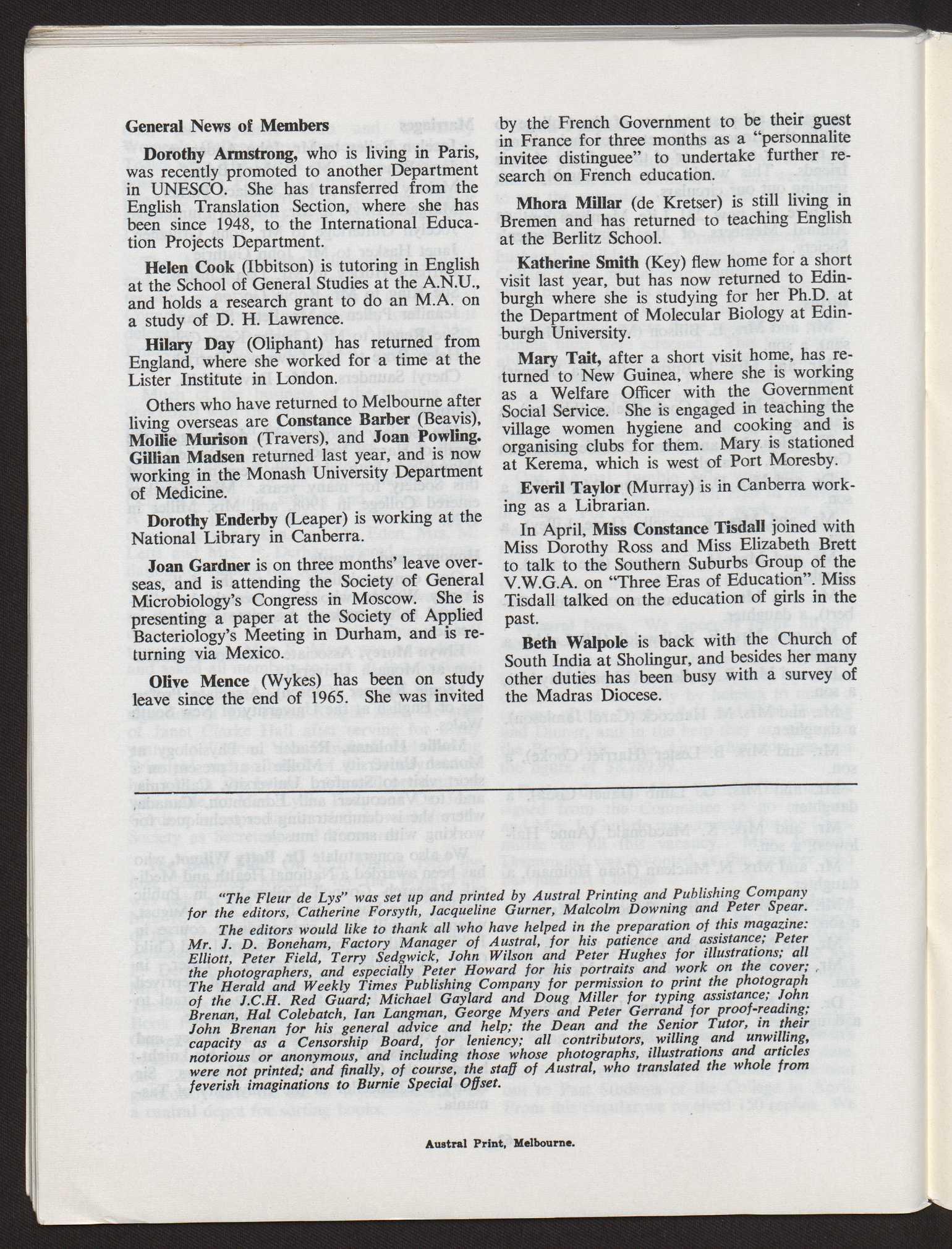
"The Fleur de Lys" was set up and printed by Austral Printing and Publishing Company for the editors, Catherine Forsyth, Jacqueline Gurner, Malcolm Downing and Peter Spear. The editors would like to thank all who have helped in the preparation of this magazine: Mr. J. D. Boneham, Factory Manager of Austral, for his patience and assistance; Peter Elliott, Peter Field, Terry Sedgwick, John Wilson and Peter Hughes for illustrations; all the photographers, and especially Peter Howard for his portraits and work on the cover; The Herald and Weekly Times Publishing Company for permission to print the photograph of the I.C.H. Red Guard; Michael Gaylard and Doug Miller for typing assistance; John Brenan, Hal Colebatch, Ian Langman, George Myers and Peter Gerrand for proof-reading; John Brenan for his general advice and help; the Dean and the Senior Tutor, in their capacity as a Censorship Board, for leniency; all contributors, willing and unwilling, notorious or anonymous, and including those whose photographs, illustrations and articles were not printed; and finally, of course, the staff of Austral, who translated the whole from feverish imaginations to Burnie Special Offset.
Austral Print, Melbourne.
Back Row: D. S. Houghton, D. C. Cowan, J. A. Renowden, L. J. Ch. de Crespigny.
Middle Row: R. H. Noble, C. A. Buckley, A. F. Guy, I. R. Hopkins, J. F. Patrick, J. E. Tibballs, M. R. Williams.
Front Row: J. R. Harry, J. S. Robert, T. S. Harris, T. Hasker (Captain), C. G. W. Mitchell, R. K. Watson, R. F. Haskett.

FIRST VIII

They swam and reached their destination while shouting, "Long live Chairman Mao!"
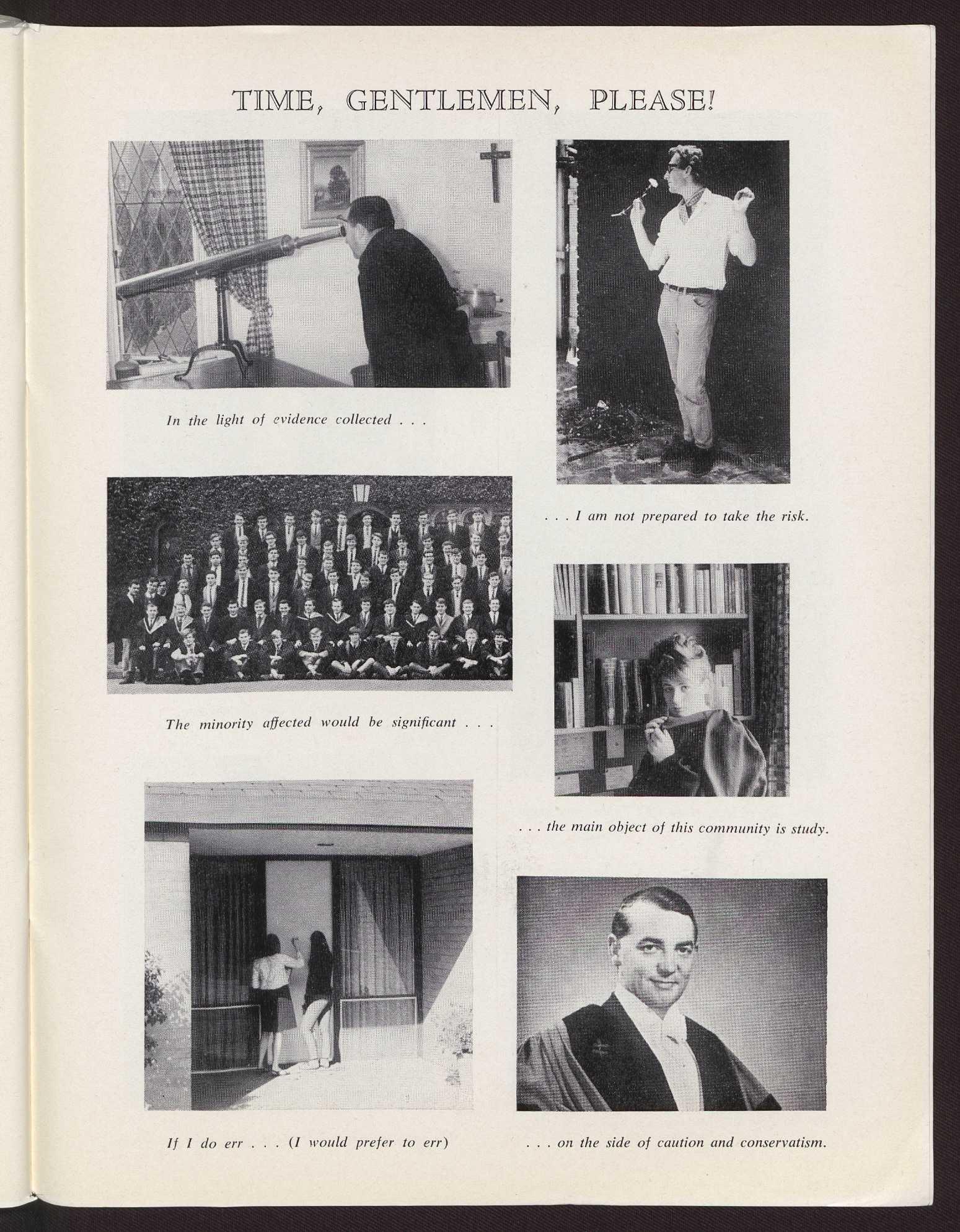
In the light of evidence collected . . .
... I am not prepared to take the risk.
The minority affected would be significant . . . . the main object of this community is study.
✓ l, ,Yi~,~pir
If I do err . . . (I would prefer to err) ... on the side of caution and conservatism.
Sir, he goes white when it's mentioned.
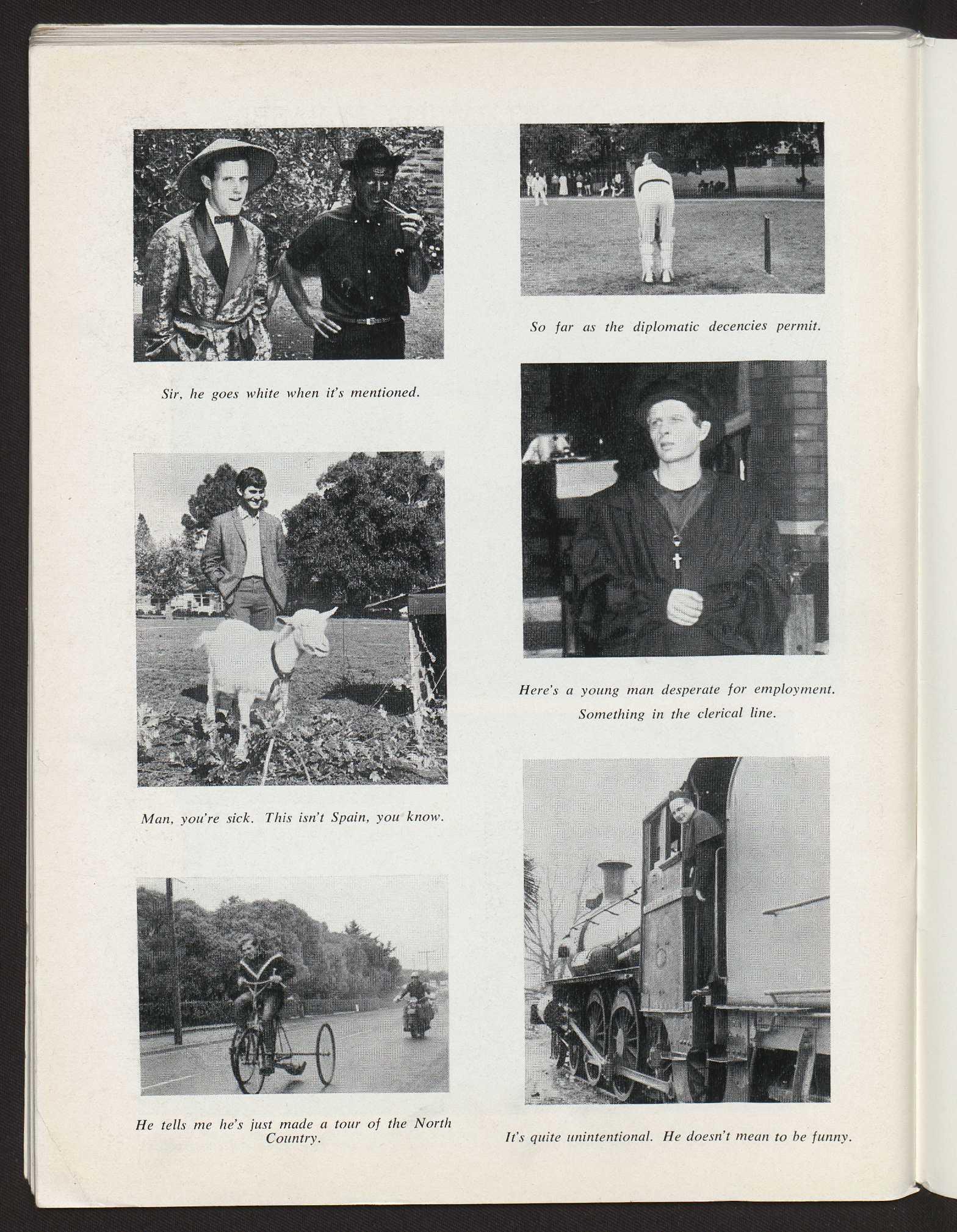
Man, you're sick. This isn't Spain, you know.
So far as the diplomatic decencies permit.
He tells me he's just made a tour of the North Country.
Here's a young man desperate for employment. Something in the clerical line.
It's quite unintentional. He doesn't mean to be funny.
